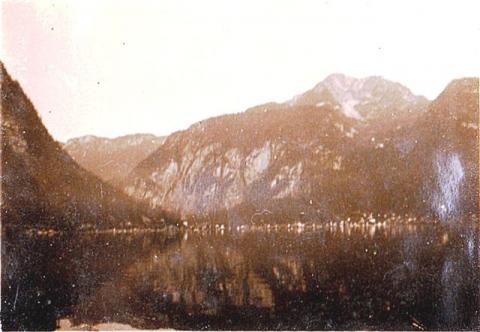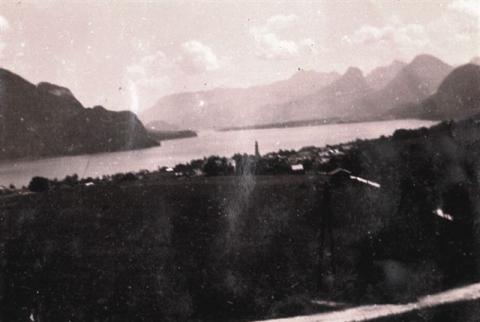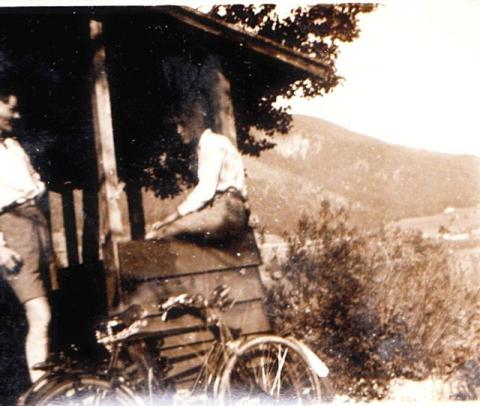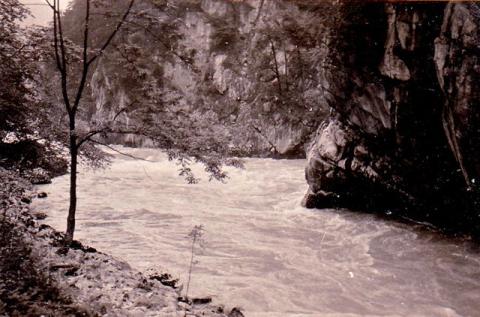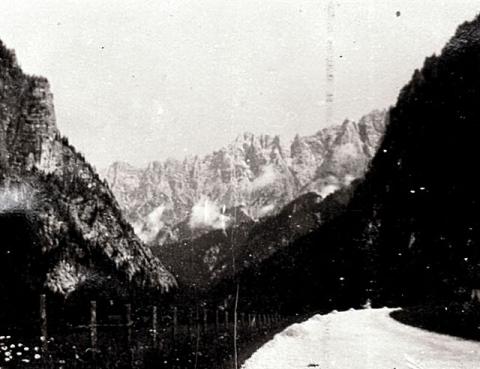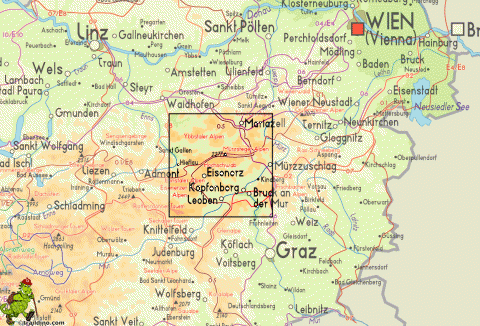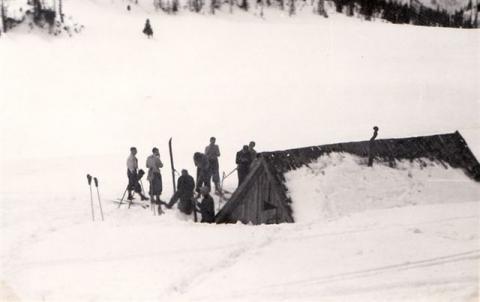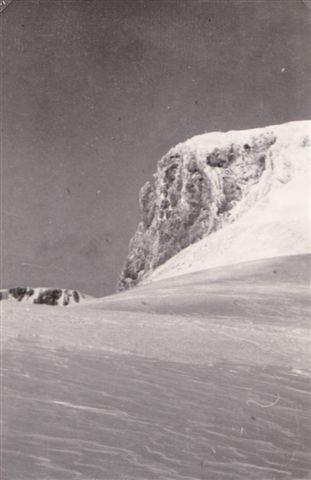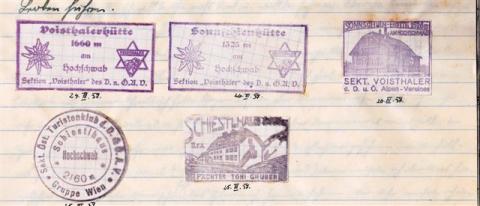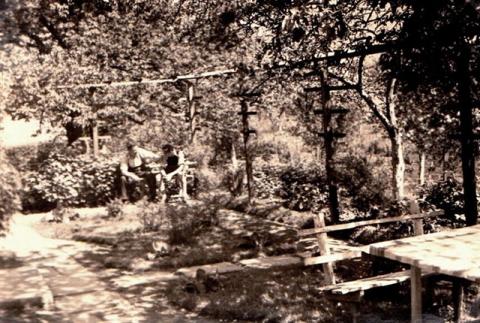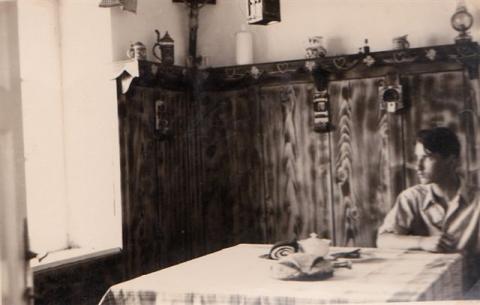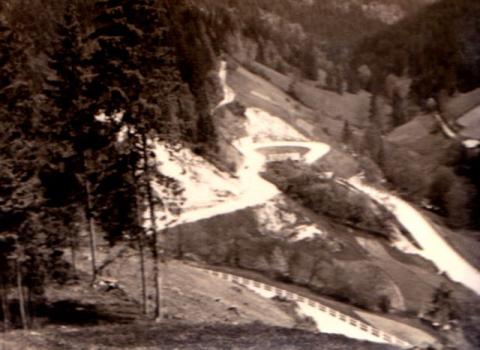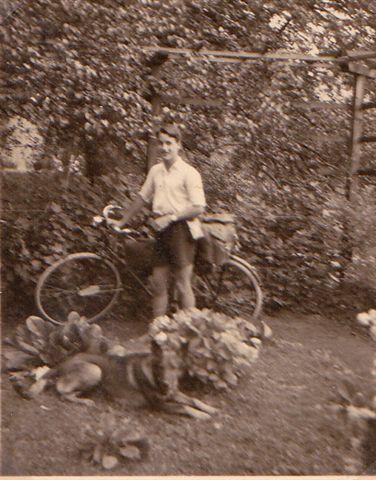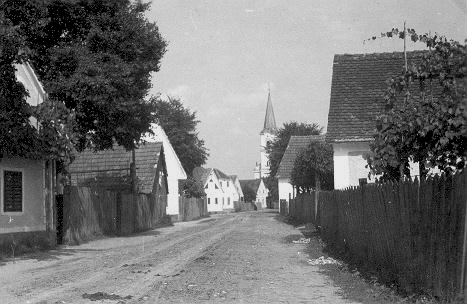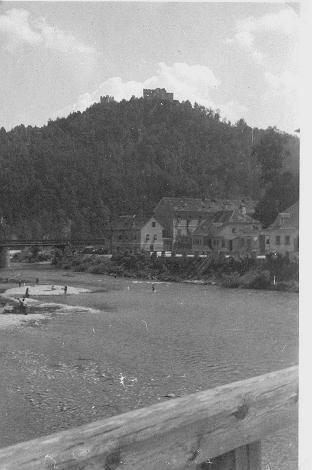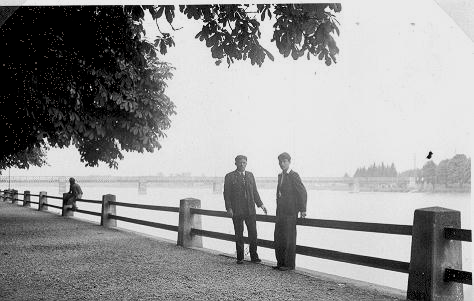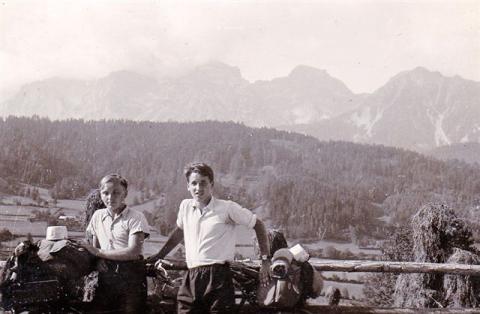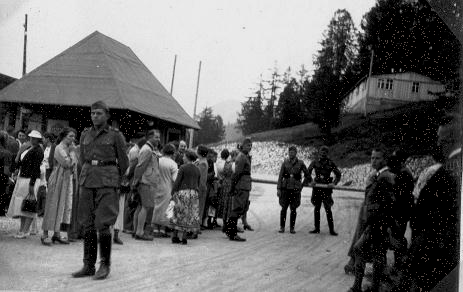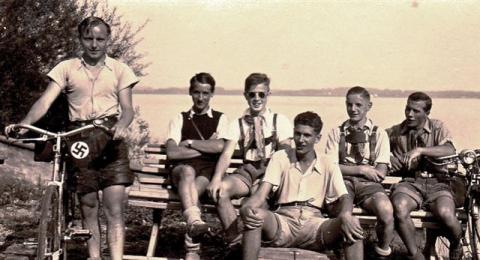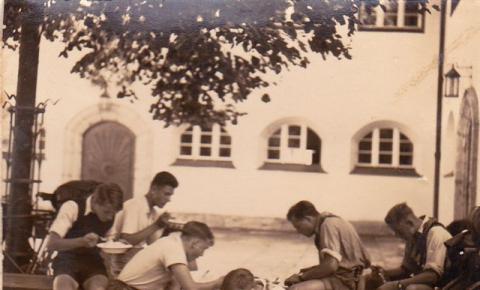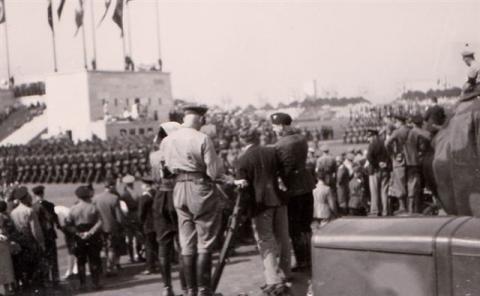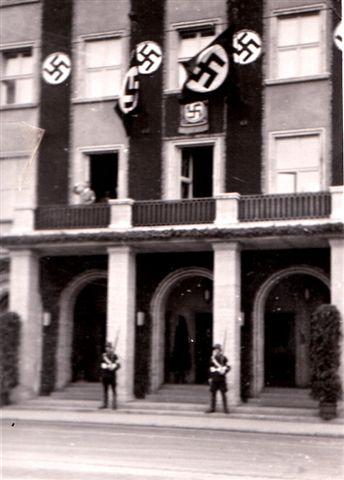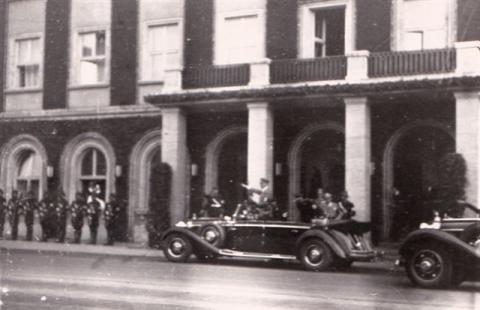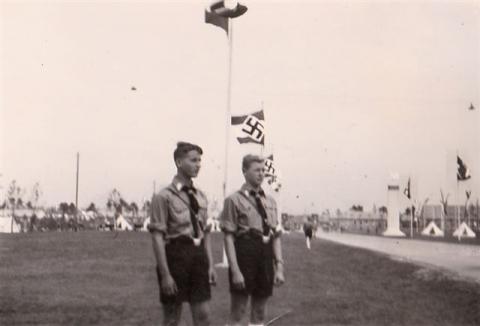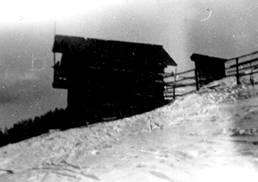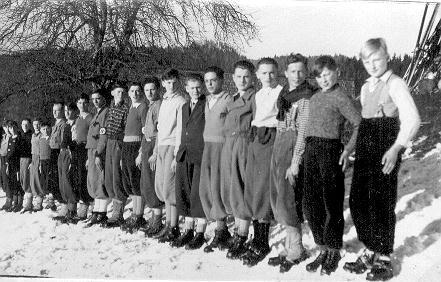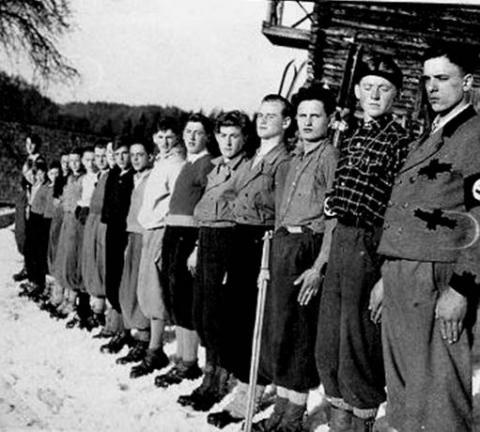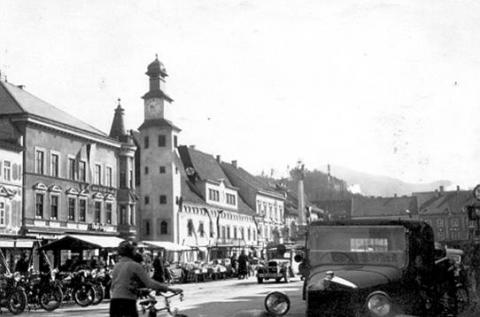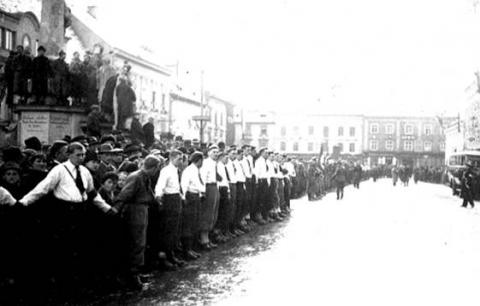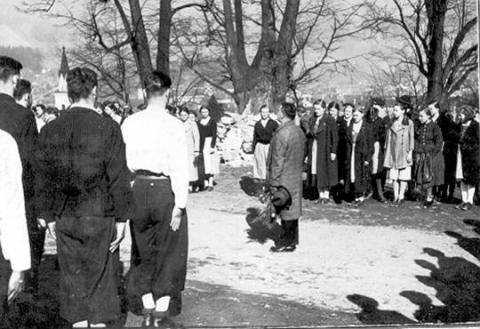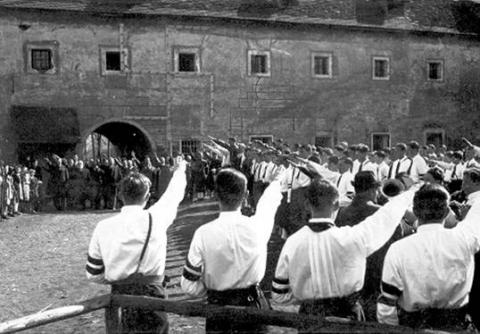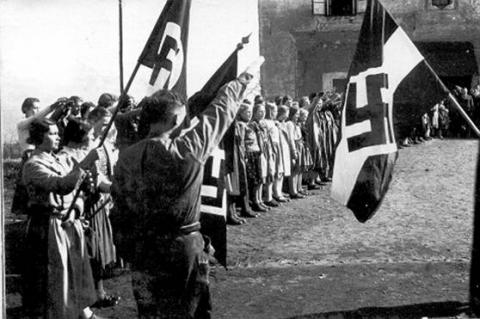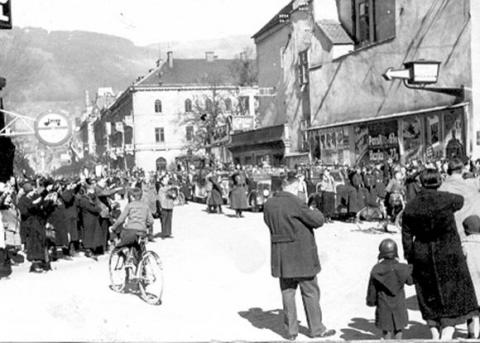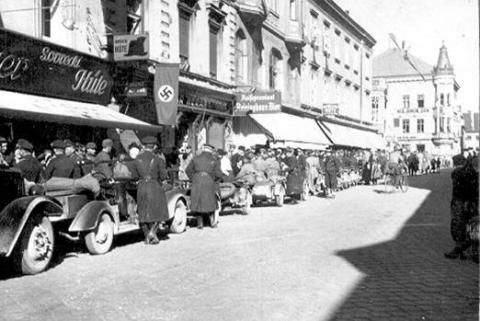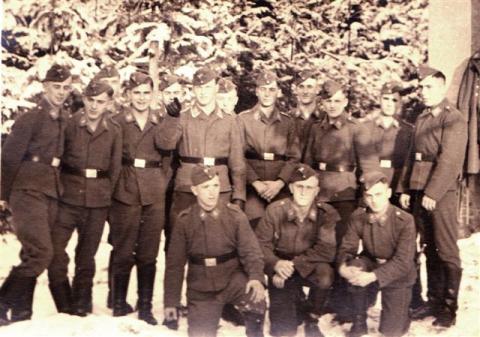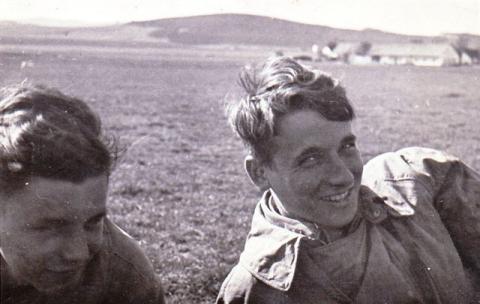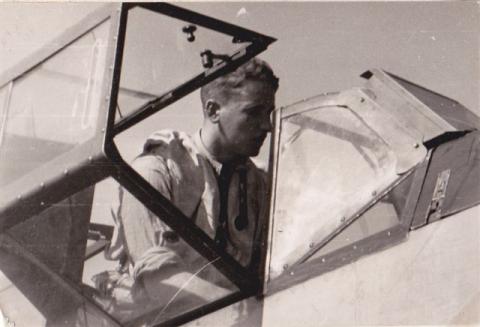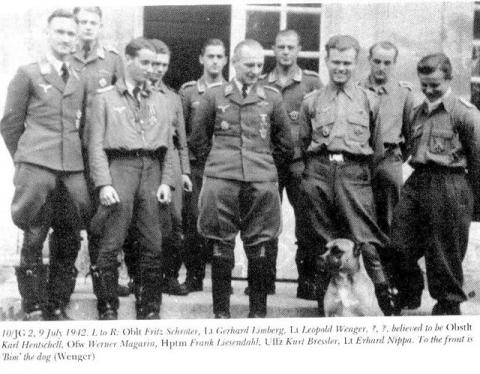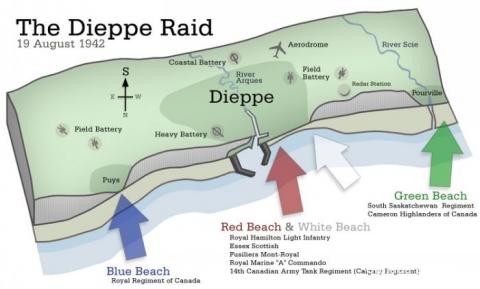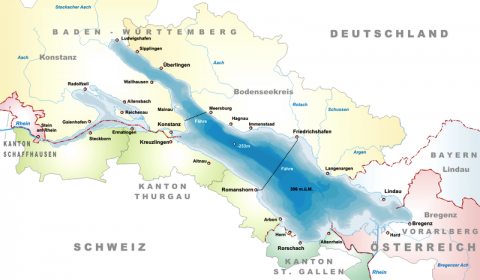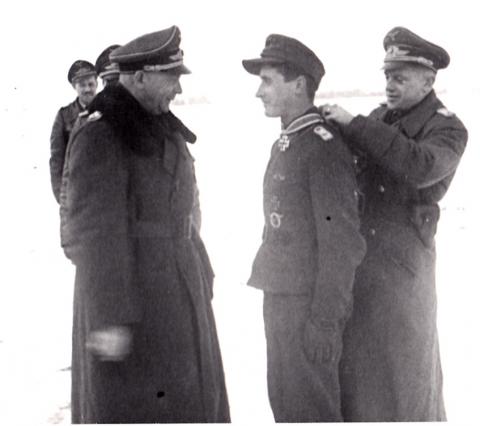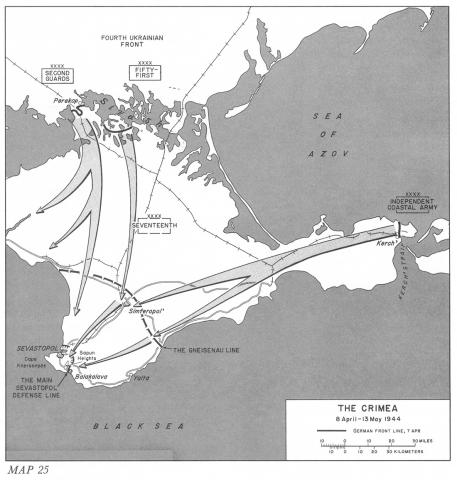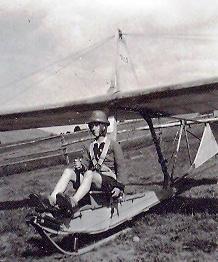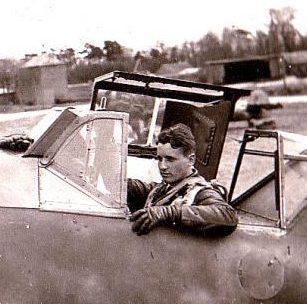Leopold Wenger
- 4470 reads
Hitler Youth
- 3182 reads
Bicycle Adventures of an Austrian Teen
- 5384 reads
From Leopold Wenger's Trip Diary
Out and About on the Bicycle
1936-1937
copyright 2013 Wilhelm Wenger and Carolyn Yeager
Translated from the German by Wilfried Heink
Leopold Wenger was born on Nov. 19, 1921; in July 1936 when his first diary-recorded bike trip began, he was only 14 years old. By the time of the rest of the trips recorded here (all of which took place before the annexation of Austria to Germany), he was 15 years old. Quite a responsible, resiliant, hardy and adventurous young National-Socialist "Hitler Youth" he was, who later became a valiant defender of the Reich. My thanks to Willy Wenger for sending these diary entries to me – along with the photographs taken by 'Poldi (called Bibi by family) – and to Wilfried Heink for translating it from the German original – a large undertaking.
While this may not interest everyone, I believe it is of great value for comparing our youth of that time with our youth of today. -cy
P.S. On 6-5-2016 I linked the images to the file view, so just click on them for a larger view.
The Salzburg Journey, May 5-8, 1936
Sunday, July 5, 1936. We were to leave Leoben at 5:30, but I slept in and was picked up by Prommer and Horvat; we left Leoben at 5:45. We traveled via Edling to Seitz. Between Kammern and Mauten, we had to stop for the first time, my canteen/flask, fastened to my rucksack had slipped between the frame of my bike and the hind wheel during a descent. It acted as a brake, and the felt encasing was severely damaged.
The first rest stop was at the Schober summit. We arrived in Liezen at 12 noon in time for lunch. It had been extremely hot all morning. Past Steinach-Erdning we left the main road, pushed our bikes for one and a half hour over the Klachau pass and arrived in Bad Aussee at 16.45. We rested for awhile and at 17:00 we started to push our bikes to the Koppe, a very narrow pass used as a shortcut to Hallstadt. At about the border between Styria and Upper-Austria the road reaches its highest point, to the right a canyon used by the railroad. The road was in horrible shape; a car could never have driven through here. There were also warning signs posted: "Bicycle riders dismount, very steep grade, avalanche danger!"
At 18:00 we arrived at the Hallstätter Lake and started to look for a place to camp. We asked a farmer and he showed us a spot. We cooked tea on a camp stove and ate sardines and sausages (from Hovarth). At dusk, we prepared our bed site, watched some ships on the lake all lit up, and went to bed at 8 o'clock. We had encountered a strong head wind all day, the day had been warm, there were no mechanical defects worth mentioning.
Town of Saint Gilgen on Lake Wolfgang
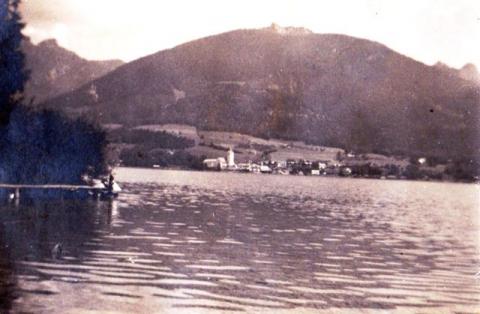
Saint Wolfgang on the Wolfgangsee
Monday, July 6, 1936: We woke up at 4:15, a short run took us to a well for washing. After preparing breakfast (lemonade), and cleaning of the site, we left at 6:30. The journey took us through Hallstadt, Goisern to reach Bad Ischl at 7:30, where we purchased camp stove fuel and bread. We did not stay long and at 8:15 we had our first glimpse of Saint Wolfgang Lake, but did not enter the town.
We camped across from the Inn “weissen Rössl” (The White Horse Inn, made famous in an operetta), went swimming and watched a great crested grebe for the longest time. At 12:00 we continued our journey to soon reach Saint Gilgen, atown with beaches, sailing as well as motor boats, steam ships, etc. Then we had to push our bikes again and, when we descended toward the Fuschl Lake, I lost Horvat’s jacket which had been fastened to my rucksack. At 3:00 we arrived at the lake and camped at the shore. Horvat and Prommer killed a snake, probably a grass snake which was just eating a fish. Some fishermen were fishing with nets.
We rented a boat and spent an hour on the lake, almost running into a woman’s head. She was wearing a big straw hat which we mistook for floating debris. We then again swam for a while, to later prepare supper (cocoa cooked with water and marmalade). We then tossed a few floating objects into the lake and aimed at them with rocks until it was too dark. At 9:00 we bedded down on the veranda of a nearby bathing hut, the floor was extremely hard but we were dead tired and slept well. The weather had been good again, just like on the previous day and no mechanical defects either.
Tuesday, July 7, 1936. At about 4:30 Prommer woke me, he and Horvat had been up for a while. I quickly washed in the lake and then cycled to a farmer for fresh water. We again cooked tea and left at 5:00. At first we had to push our bikes again, then downhill and up again. It was extremely hot and the sweat just poured from us, we of course had taken our shirts off a long time ago. We were very thirsty and drank a lot of water to help cool us down.
After pushing our bikes up the Gaisberg, we could see the city of Salzburg in the valley. A joyful descent started on twisting roads, passing a few cars to soon reach the bottom. At 9:00 we could see the Castle, we traveled through town, visited the house in which Mozart had been born, as well as the Cathedral. We then made a side trip to Hellbrunn to watch the trick fountains, view the Palace, the zoo, as well as the park of the Emperor. We then mailed a few picture postcards, and at 12:00 sharp we left Salzburg, following our three hour tour through the city.
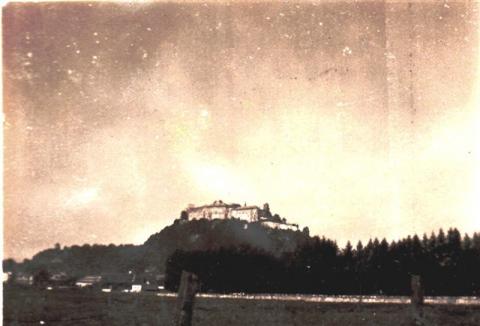 Right: View of Salzburg castle -enlarge
Right: View of Salzburg castle -enlarge
We stopped for lunch at the crest of the Gaisberg. We had just started going downhill when Prommer caught a rock in his rear wheel, it only took him fifteen minutes to fix it and we continued our journey. In Hof we turned north to reach Thalgau on a steep and bad road, to then reach Mondsee. A few kilometers on, the tire on my rear wheel suddenly went flat. I couldn’t find a nail in the tire; I therefore assumed that it was the valve, and exchanged it, but that wasn’t it. A thunderstorm came up, it started to rain but to our luck a farm was nearby. The farmer gave us permission to fix the bike in the barn, I finally found three holes in the tube and repaired it. The rain was coming down hard now, so all we could do is wait. It would have been a comfortable wait if not for the many flies.
By 6:30 the rain had stopped and we continued our journey, and we decided to make up for lost time by travelling at night. The road along the Mondsee was carved out of the rock; we often had to ride through tunnels, reaching See at 7:00. Then to Atter Lake and along its shores to Weißenbach, marveling at the size of the lake. After that through a forest to the Gmunden-Ischl road.
Right: We spent the night in a woodshed. enlarge
It was now getting dark, we needed to turn on our lights before we even reached Ischl. Horvath was in the lead, his light produced by a dynamo, then Prommer and me with our flashlights; we only turned them on when someone was on the road. It took awhile to go through Itschen, we got lost, but finally reached Goisern at 22:00hrs. We rested for a while, cooking cocoa. At 23:00 we continued and reached the foot of the road leading up to the Pötschen pass at 23:30. Here we found a wood shed, we entered, cleaned it up and bedded down, falling asleep almost immediately. The night travel had been strenuous. No wind during the day, the weather nice at first, then rain, and we also had some mechanical problems.
Wednesday, July 8, 1936. The Pötschen pass road was steep from the beginning. After a half hour pushing our bikes we were half way up and had breakfast in a restaurant, every one consuming a liter of milk. We had our first view of the Dachstein. When we reached the pass at 6:30 Horvat was stopped by a policeman; he had no stoplight. The road down to Aussee was in good shape, we made good time and arrived in Lietzen at noon. We were about to get off our bikes when Horvat was hit by another biker; the damage was slight.
We had our lunch in a restaurant, goulash from a can, sausage and bread, accompanied by apple cider, which made me tipsy. A thunderstorm with strong winds surprised us, we were sitting in the restaurant garden and had to seek shelter in the house. At 3:00 we could continue, the street was a mess, torn off branches as well as mud. We reached Hiflau at six in the evening, it had hailed. We arrived in Eisenerz at seven, tired, but we still had to make it up to the Pöbichl pass, a three-quarter of an hour climb we were told, wrongly.
We were half way up when a thunderstorm suddenly appeared; Horvath was behind but Prommer beside me. I yanked my jacket out, lost my hat and was drenched in minutes. We took shelter under some trees, and when the lightening stopped we looked for Horvath in pouring rain. He had found shelter in a wood shed, we changed clothing and decided to stay if the rain didn’t stop.
I just had taken off my wet shirt when we hear a motor vehicle approaching, my comrades jumped out to stop the van of a well known Leoben merchant. The driver agreed to take us, and we made it to Donawitz in reasonable comfort. Prommers landlord took him and our rucksacks, Horvart and I arrived back in Leoben at 20:30.
The weather had been lousy all day, delaying our journey, we also had a small mishap. I spent the most money, 6 shillings.
The kilometers traveled on each of the 4 days: Day 1, 36km; Day 2, 64km; Day 3, 132km; Day 4, 151km.
Rushing water and steep roads in the Gehäuse National Park, Styria
Präbichl-Polster, March 6-7, 1937
Saturday, March 6, 1937. I arrived home at 13:00, packed my bags, fastened my skis to the bike, Wurschitz was to pick me up at 14:00 but arrived late and we had to hurry to reach Präbichl before dark. At 16:25 we were in Vordernberg, snow was still on the road; my bike was defective so we shouldered our skis and started the climb up the Präbichl road. We were hungry and stopped to eat some buns. Not an easy climb, a strong wind blowing snow into our faces. We took a shortcut and reached the German and Austrian Alp Club youth lodge sooner than expected. A young man had already arrived, soon more came.
And we went to work, chopping firewood, building a fire to cook tea. More people arrived, 20 in all. We drank tea, sang songs, filled our bellies, to finally bed down at 23:00, covering ourselves with everything we could find.
Sunday March 7, 1937. I woke up at 7:00, the sun was shining through the window already.
After folding the blankets, we washed in an icy trough; the tea was delicious. We waxed our skis, each praising his wax. My shoes were still wet but I had no choice but to wear them.
The first boys who had taken the train started to arrive, and the first competition was to start before noon. The weather was nice, the snow conditions varied, with drifts. The downhill race was spread over two slopes, the first rather easy, the second steep. 5.3 min was the best time, 13 min the worst.
For lunch we had pea soup with sausages, then some of us rested while other engaged in a snowball fight. The sun was gone and in the afternoon a patrol exercise was planned: Downhill then cross country. Our group came in third. At four we were getting ready to leave, we skied down to Vordernberg, I fixed my bike and was home in little more than an hour.
Easter at the Hochschwab, March 24-27, 1937
Wednesday, March 24, 1937 Departure from Leoben at 7:30, when I arrived at the train station everyone was there already. We changed trains in Bruck an der Mur, then travelled to Au in a motor tram and all nine of us … marched to Seewiesen (7km). There we had a short break. We tried to purchase some bread but only found half a loaf.
Soon we were able to put on our skis, making things easier. We watched chamois (a goat-antelope species native to the mountains in Europe), some close by. It was overcast, snowing, the mountains in fog. We had lunch at the Forschel-Alm, then on to the French Cross (the French had allegedly advanced to here). Then downhill, again many chamois, and suddenly the Voitstal hut appeared from the fog.
Following another short lunch break we made a trial run down the slope; Scherabon broke the tip of one of his skis. A storm came up and we returned to the hut, the wind blowing strongly up here. We met Prof. Müller, had supper, sang some songs and went to sleep. I took a peek outside, it was very stormy, some men trying to reach Schiestl house had to turn back. We could hear the wind howl all night long.
Thursday, March 25, 1937. We had hoped that the storm would subside, but we were wrong. Right after breakfast we started our climb, the wind becoming stronger as we climbed. We experienced some equipment problems and if it would not have been for the long poles, placed along the way, we surely would have gotten lost.
We were covered in ice. I tried to drink from my canteen; I had filled it with hot tea but it was frozen. Shortly before reaching the high plateau, we almost missed a crack, but Prof. Porsche changed course just in time. At the plateau, the wind had reached hurricane strength, we had to stop repeatedly but I was blown over a few times just the same. Our faces were numb and at noon we reached the Schiestl-House (2,160m).
We spent the rest of the day playing cards; toward evening the storm subsided, the fog lifted and we ran to the Hochschwab-Western-Wall (400m high). After supper we bedded down.
Friday, March 26, 1937. The storm had subsided, and after breakfast we continued our climb. We had to climb some 117m, without skis, the snow was too icy. Finally some sun; an icy wind was blowing at the summit, freezing the ink in Prof. Porsche’s pen while he was trying to enter our names into the summit register. We walked down the icy southern slope, we were only able to put on our skis half-way down. We passed many signs with the inscription: “Frozen to death during a snowstorm.”
The snow conditions improved, we fell more than walked down a steep embankment and reached the Sackwiesen-Alm at noon. Fog had come up during the morning, but the high marking posts guided us. Now the sun was shining, the view was great.
Uhrmann and I dug a hole in the snow, found some brush, laid down and baked in the sun. But clouds came up and we continued our march, and at 16:00 we reached the Sunshine-Hut. After something to eat we decided to climb up to the Ebenstein (photo right), fearing that the weather would turn bad. Three remained behind, I continued of course, had some problems with my skis, took them off but caught up with the others again. Soon the others had to take their skis off also and we left them further up the slope, having secured them first.
The last part we did using our poles for support, not an easy task, the rocks were loose and covered in ice. An icy wind was blowing at the summit; we noticed a cross, a man had committed suicide here. All of us signed in at the summit registry, no one had been up here for weeks.
We met two people from Leoben - Dermutz and Domschütz - at the spot where we had left our skis; they suggested a wager, boasting to reach the hut before us, even though they still had to make it up to the summit. We waited until we could see them returning, and then left, skiing carefully at first but later on straight down. I lost control and crashed, the worst fall ever. Luckily I had given my camera to Prof. Porsche, or it would have been destroyed.
I caught up to the others again and made it down without further problems, and we did beat Dermutz and Domschütz who arrived shortly after us. We spent the rest of the day and evening in our rooms, only going out before bedtime to see a beautiful full moon.
Saturday, March 27, 1937. It was snowing, but we nevertheless decided to climb the little Ebenstein. We had to turn back however; it was snowing too much. About 10:00 we left for the valley. We had fun skiing down, all of it seemingly more dangerous than it was. We arrived in Tragös, had lunch at the green lake, with Prof. Porsche cooking tea. We then climbed via the Hiesl-Corner to the Rötz-Trench, a seemingly endless route. We just made the train in Trofaich.
The stamps of various Alpine-Clubs as collected by Bibi
The Pentecost Journey, May 15-18, 1937
Saturday, May 15, 1937. The morning was extremely hot already and since there was no school I went for a walk in the forest, returning at 12 noon. After lunch I packed my bag, fastened it onto the bike but discovered that the rear wheel was flat, a nail protruding through the tire. I fixed the flat and left Leoben in the direction of Graz. I had forgotten my map but did not return, arriving in Graz at 5:30pm. I had to push my bike up to Ries, then downhill to Gleisdorf and a little later I had to turn my lights on. I almost fell asleep and was hungry, so I decided on a short break, did some pushups and after a few buns and water I continued my journey. Again on foot up the Dachsberg, passing the big slide, then quickly through Klausen. The last stretch was slow going, gravel road and my tire was worn, the air almost gone out of the tube. I arrived home at 8:30pm; my Dad, who had arrived by train an hour earlier, was waiting for me.
Pentecost Sunday, May 16, 1937. I woke up late, I was still tired and since I had no plans for the day I helped Dad, resting in the afternoon.
With Dad in the garden
Bibi in the kitchen.
Pentecost Monday, May 17, 1937. I had to go to town hall in the morning, and on the way back my tire went flat in a few seconds; I had a hard time stopping. Because of the tire being worn, the tube stuck out on places, and a big hole was the result. I had no patches along, but found a used tube in a store and was able to continue. At 2pm, after lunch, I started for Graz and made good time but near Gleisdorf my tire went flat again. I exchanged the valve, that didn’t help and I finally noticed that the patch I had applied in the morning had come loose. After an hour I could continue, reaching Graz at 6pm, staying over night at Grandma's. My arms were sunburned and hurting.
Tuesday, May 18, 1937. At 6am, after breakfast, I left for Pack (a municipality in the district of Voitsberg -cy). It took awhile to find the right road. I liked the road from Graz to Tobel and the latter a nice place, a spa town. I purchased a few rye flour buns at Voitsberg and later rested a little. I got lost again at Köflach because I had no map and had to return. From here on I had to push the bike often, took what I believed to be a shortcut through a forest, a mistake as it turned out. It was extremely hot and the last stretch to Pack took one and a half hours, pushing my bike. At 11am I passed the big silver cross and a little later the border to Carinthia. I had to stay on the right side of the road now, but decided not to take the Pack road, as I would have had to backtrack.
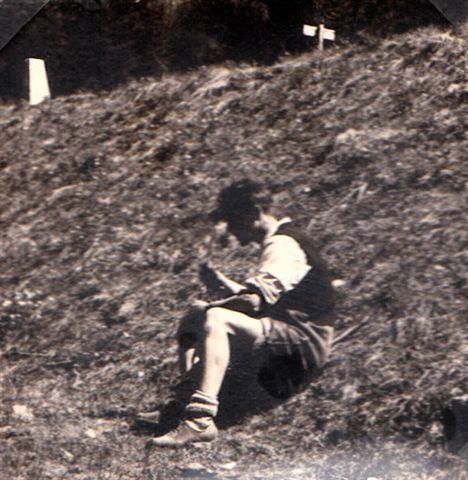
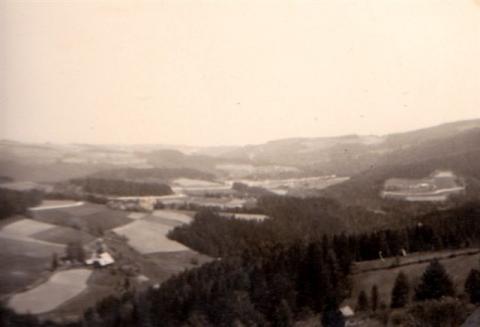
Left: Resting at The Pack. Right: A look back at the Styria side of The Pack.
The Pack road looking at it from the Carinthia side.
I took a break right at the border and then continued downhill, not used to traveling on the right side but I managed. The road was good and I reached Twimberg at 12 noon, but now the road deteriorated; it was also going uphill again. It was market day in St. Leonard and I passed Reichenfels. I again passed the border into Styria at 1:45pm. Soon after I had to climb the last hill, but the ride to Judenburg was great; I never had to peddle. Just outside of Knittelfeld, I ate my last bread; I had never been in this region.
The ride to Leoben went well, arriving just before 5pm. My front wheel came loose just before home, but I did make it. This was the only problem all day with the bike.
Daily mileage: Day 1, 130km; Day 3, 60km; Day 4, 166km
Summer holidays 1937
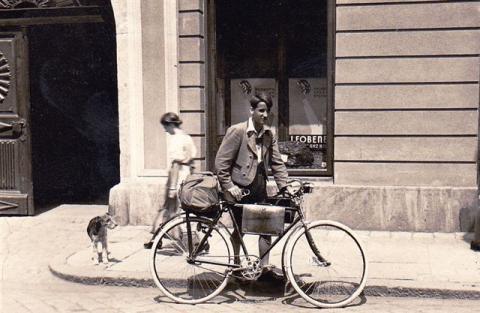
Monday, July 5, 1937. Mom, Willy and Gretl had already left when I readied my bike - the touring club banner on the handle bar, my backpack on the rack and a bag fastened to the frame, I must have looked quite adventurous. I left at 11am, Dad took a picture, stopped for a short time in Mühltal to chat with some boys I knew, and then away in a hurry. Dad passed me on his motorbike, waving, and at quarter to twelve I was in Pernegg, to stay with uncle Fritz. When I leaned my bike on the wall, I heard a loud hissing noise, the air leaving my rear tire.
Right after lunch I started to fix my bike, admiring the new tires Dad had bought, but then I found a large cut in the tube, the tire itself however was not damaged. I have no idea how this could have happened. At 4pm I was finished, too late to go swimming but, in spite of it all, I felt lucky that this happened at my uncle's place and not along the road somewhere.
Tuesday, July 6, 1937. I got up at 6am and left at 6:45, packing some potatoes and other goods for Grandma in Graz, received from aunt Leni. At a quarter to 9:00 I arrived in Graz to meet Mom and both of us went to the consulate. At 2pm Mom, Gretl and Willy left; I toured through Graz in the evening, viewing it by light. But my tire went flat again; someone might, while I was in the consulate, have pushed a pin into it.
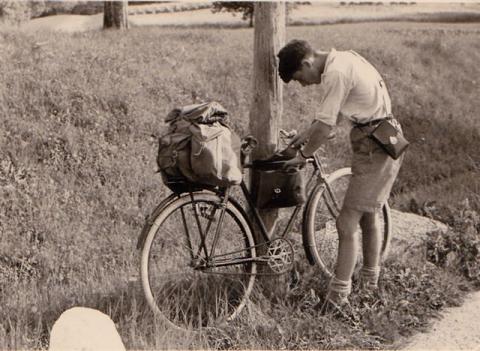
Getting ready for the downhill ride, after pushing the bike up the Riesenhöhe in eastern Styria.
Wednesday, July 7, 1937. I again got up at 6am to leave at 6:45, getting up the Ries was hard, but once on top I had fun. I rested for a while to travel to Gleisdorf; from there on the road was in bad shape (repair work). At a quarter to ten I arrived in Feldbach, from there over the Dachsberg to Gleichenberg, and at 10:15 I arrived at our house. It looked terrible, the grass high, no flowers to be seen, the floor coverings in the house moldy, the place had not been aired out since Pentecost. I borrowed a sickle from Great-Grandma, as well as some other garden tools, and went to work.
After lunch I continued, worked ‘till five, only then did the place look presentable again. At seven it started to rain, a thunderstorm, it did not last long. The day had been hot, but now I’ll quit, I need to study the maps yet, good night!
Thursday, July 8, 1937. Another thunderstorm at night, I woke up past six, cooked some cocoa, and after things were cleaned up, the key returned to Great-Grandma, it was 7:30.
Right: Leaving our Gleichenberg home after cleaning up.
-----------------------------
I left towards Straden, but circled around the town to not have to push my bike, the road to Mureck was in bad shape. From here the road was paved, I marveled at the arrangement of the farms, their cleanliness. When Straß came into view, the road branched off to Spielfeld. I had travelled along the border from Mureck to Spielfeld. A remarkable scenery on this side of the Mur in Austria - flat land with the occasional small forest. On the other side, in Yugoslavia, hill country. The Mur disappointed me, I had imagined it wider.
Then the border. First the Austrian customs - I had to hand my pass, as well as my trip itinerary over; I received a bike permit, along with other formalities and only then was I allowed to proceed to the Yugoslav side. The customs officer, an older man, spoke Slovenian but when I answered in German he also switched. In the station my pass was stamped, my itinerary checked, the baggage checked and that was it.
I was now allowed to travel on, but had to ride on the right side of the road, very confusing for me. The roads were bad; just before Marburg I had to climb the Leiterberg and then downhill. At the Marburg train station someone called out to me; it was Willy. He had waited for some time for me to arrive, to take me to Aunt Hilde’s new flat; I would never have found it. At five past ten I was home, only then I noticed that I had lost my flask.
No mechanical defects on the bike, all went well. In the evening we went to the movies, returning around one.
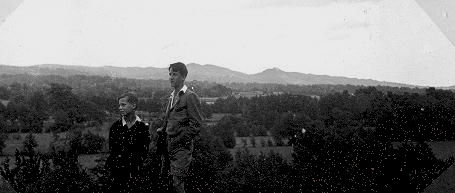
Willy and me, the Styria hills in the background.
July 9 and 10, 1937. Raining mostly, we stayed home.
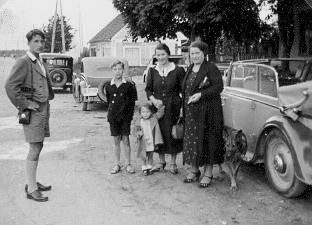
In St. Nikolai with siblings, mother and aunt.
Sunday July 12, 1937. Before noon the weather was not good, but improved later. Uncle Emil had rented a car and we travelled to St. Nikolai for lunch.
13th and 14th, 1937. Nothing special.
Thursday, July 15, 1937. At 2:30 I left our aunt's place, with no real purpose in mind, at first traveling along the same road as with the taxi a few days ago. The road was straight but in terrible shape, full of potholes. I passed through some small villages, the houses built of clay with straw roofs, poor peoples' places. At 3:00, I arrived in Pettau, the castle and church visible for a while already. The roads in town were paved with cobblestones, very rough going. I passed by the church with the free standing tower, allegedly built by the Romans - a watchtower with figurines carved in, some thousand years old. I left at 3:30 and arrived back in Marburg at 4:30.
Friday, July 16, 1837. I left again at 1:30, this time toward Windisch-Feistritz. I left the main road In Hoce, peddled and pushed up a hill, to then turn back to enjoy the downhill journey. Down below I could see Marburg. I then turned toward Windisch-Feistritz and had to push my bike up two hills before reaching the village. I had lunch in a restaurant, returning the same way I had come, arriving back at 5:30.
* * *
Thursday, July 29, 1937. I again travelled to Windisch-Feistritz, but turned off before I reached it to make my way toward Pragersdorf. I had to wait for a train to pass, and when I started out again I realized that I had taken the wrong turn, but I finally reached Cirknice. Leaving the village I entered the flat Pettau field and could vaguely see the Boc and Donati mountains in Croatia. I had to cross the rail line Pragersdorf-Pettau several times to finally make it back onto the main road. A nice ride to Pettau, forests on both sides of the road. Going through Pettau to look for the road to Warasdin, I had to stop to tighten a nut on my pedal, only to later turn around. Going back on the same road I had taken on July 15, I returned to Marburg.
Right: The Drau River near Cilli
With Dad on the shores of the Drau near Pettau
Thursday, August 5, 1937. I left Marburg at 9:30 on the road to Windisch-Feistritz again, then towards Ganobitz. I caught something in my eye, unable to remove it I was able to only see with the other. I witnessed a cavalry maneuver by the Yugoslav forces, then over two hills. The road went almost straight up, making it hard to climb, and downhill one had to be extremely careful. I made it to Gonobitz and after I had passed it, uphill again. I rode at first, but it was too hot, so I dismounted and pushed the bike. I rested under a tree and after reaching the crest it was steady downhill, passing many sawmills. At 1:00 I was still 9km from Cilli, but made it in half an hour. I crossed the Sann river, it looked like a bathtub, full of people. I noticed the ruins of the Cilli castle, then passed the Hotel Union, a beautiful structure, formerly the “Deutsches Haus”. I spent half an hour, then started the return trip. Half way up the hill it started to rain, but I just kept on going and was soon out of it. A short rest in Gonobitz, then to Marburg, home at 6:00.
Sunday, August 8, 1937. At 6:15 I left Marburg, this time with all my luggage, the Turner lake in Carinthia the destination. It was cold, I travelled the Rau upwards, passed castle Wildhaus to Zellnitz. Then along the Drau, uphill, downhill, I stopped for a rest before reaching Mahrenburg, then to Drauburg. Here I left the main road in the direction of Prävali, the dust on the road was inches deep. At noon I reached Prävali, but did not stay there but travelled on to pass the Petzen for the second time.
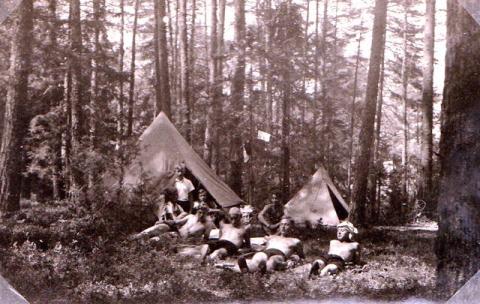
Illegal Hitler Youth camp at the Faaker Lake in Carinthia.
Past Prävali I had to push my bike up a hill and suddenly I was at the border, but the inspection was very relaxed, I did not even have to open my rucksack. Then through Unter-Loibach, past Blechburg and St. Stefan to Eberndorf. I noticed that all signs were in two languages, German and Slovenia, in the middle of German territory!!! I had to search for the Turner Lake, but found it, the shores all swampy and in the background the Karavanks, breathtaking.
Saturday, August 14, 1937. I stayed for almost a week in this beautiful region and met a few young men I knew. One of them joined me on my way back to Leoben. We left at 6:00, passed the Klopeiner lake on a lousy road to Kuhnsdorf. The road conditions improved and after a short climb downhill to the Drau, quite narrow already.
Past the bridge we had to push our bikes uphill, to Völkermarkt, reaching it at 7:45. We viewed the war memorial, then to Griffen, the ruins of a castle glued to the mountain side, visible from the distance. Past Griffen, up a steep, seemingly endless hill, and it was very hot, then carefully downhill to Tabakfastl and uphill again. A truck passed us slowly, we latched on to it and reached the crest with relative ease. Downhill again to St. Andrä, passing through at 10:00.
Now our stomachs started to growl, we had nothing to eat since 6:00, aside from a few apples. We planned to do some shopping at Wolfsberg, marveling at the castle from afar. Through a park-like setting, we entered the city at 11:00. We purchased some bread and marmalade, peddled on for a while to then stop for lunch. We just layed in the grass and ate, the water in our canteens was unfortunately too warm to drink. We moved on at 12:30, the Lava valley very narrow - river, train tracks and road close together. A steady rise and, because of the heat, my head started to hurt. We made it to Twimberg and now the road to Leoben was familiar to me. In St. Leonhard we stopped in an Inn to cool down a little, then to Reischenfels (809m), up to the Obdacher saddle (945m), pushing the bikes. At the summit we rested for a while, then down to Obdach, a short rest at the fountain, then to Zeltweg, the tailwind helped. Finally a paved road again and we made good time to Leoben, arriving at 5:15, and I was glad to be home again.
Tuesday, August 17, 1937. It had rained for a few days, but now I started out again, at 11:00am, in the direction of Graz. I could not have left any sooner; my bike was being repaired. I carried hardly any luggage and reached Bruck after 25min. A small repair on my bike delayed the journey some but the tailwind helped and I arrived in Graz at 2:00pm.
Wednesday, August 18, 1937. I left at 1:00pm, pushing the bike up the Ries again ... A shower while going downhill, the road from Gleisdorf to Studenzen under construction in places. At 4:00 I arrived at our house, the place looked desolate again, but not as bad as on my last visit. I started to tidy things up and at 7:00 Mom arrived, as well as aunt Hilde, Willy and Greterl.
Friday, August 20, 1937. I left at 3:00pm for a little tour. Past some road construction near Straden, then pushing uphill again, sweating. At the top I looked for the road to Mureck, downhill with a view of Straden, then through a beautiful forest. I chased up some grouse, magpies and stellar jays along the road to Gleichenberg.
* * *
Thursday, August 26, 1937. I left Gleichenberg at 8:45, it was cool after a week of rain. The road looked the part, but I made good time and drove through Feldbach at 9:30, to arrive in Gleichendorf at 11:00. Paved road again, but one of the pedals broke off, forcing me to return to Gleisdorf to have it repaired. A half hour later I was mobile again and reached the summit of the Ries in one hour. From up here, I could see a rain shower hit Graz, I waited a while before going downhill, but the road was still wet when I left. The rain had stopped and I arrived in Graz at 1:00.
Friday, August 27, 1937. I left Graz at 8:15 this time, encountering a strong headwind right from the start, making travel difficult and aside from that the gearing in my bike was loose again. At 9:15 in Peggau, a half hour later in Frohnleichen, doing a steady 20kmph. A motorized army unit came towards me, at 10:30 I arrived in Pernegg and after a short visit with uncle Fritz I moved on. The headwind was still strong, at 11:00 I traveled through Bruck and 50 min later I arrived back home in Leoben.
Continue to Part Two: "The Great Ride to Nürnberg" for the 1937 Reich Party Convention
Tags
Leopold Wenger, Hitler Youth, bike tripsCategory
Austria, Leopold Wenger, National SocialismBicycle Adventures of an Austrian Teen - Part Two
- 4863 reads
From Leopold Wenger's Trip Diary
The Great Ride to Nuremberg
for the N-S Party Convention of 1937
copyright 2013 Wilhelm Wenger and Carolyn Yeager
Translated from the German by Wilfried Heink
Day one - passing the Dachstein mountains on the way to Schladming.
Sunday, August 29, 1937. My buddy Franz and I left Leoben at 6am. When passing the train station I suddenly discovered that I had left my canteen, full of tea, at home. I had no choice but to turn back.
We then continued. It was still cold, and also foggy; our clothes were soon damp. But the fog lifted and at Mauten we stopped for breakfast. Then a headwind picked up, making travel up the Schober Pass difficult. At the top we stopped at a farm to drink some milk; Franz encountered a little mishap but at 11:30 we arrived in Trieben. We did not stop, passed the Wörschach airport and at noon we were already passed Steinach. We rode through an open forest; later in open country with the sun beating down and stopped at an Inn in Diemlern for lunch. The ride from then on was boring, up to Gröbming when I noticed that the houses were different, almost flat roofs with boulders on them. We had climbed quite a ways up and now traveled downhill, the road condition changing. Passing Haus, we had our first glimpse of the Dachstein, with the peak hidden in clouds. At 4pm we arrived in Schladming; the town was celebrating the completion of a new church tower and we had problems getting through the crowds. Uphill from there, and at 4:30 we passed the border between Styria and Salzburg. We already had the Mandling pass behind us.
In half an hour we made it to Radstatt, having to push our bikes up a hill along the way. We looked for the hostel, found it outside the town and registered at 5:30. The pool was a welcome addition and in the evening a youth from Vienna joined us.
Monday, August 30, 1937. It took ‘till 9:30 for us to get our things together so we could finally leave. Downhill to Kreuzberg, then onto the road to Bischofshofen. The wind was from the side, better than headwind, and on towards Salzach. The Werfen castle could be seen from a distance. It then started to rain but soon stopped again. Passing the Luegg train station we noticed that the road was closed.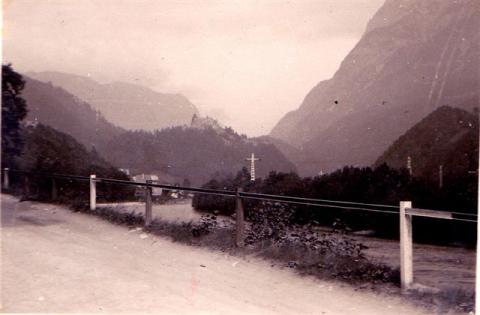
Salzach with the Werfen Castle
Tuesday, August 31, 1937. We met a Sudeten German in the morning, and since he was also heading for Nürnberg, we decided to travel together. We left early, Franz staying behind but planning to catch up. Thus I continued with Wilhelm Bechmit, whom we called “Charles with the Ark of the Covenant,” because his luggage was contained in a crate. We soon reached the Austria-German border, and after some formalities were allowed to move on.
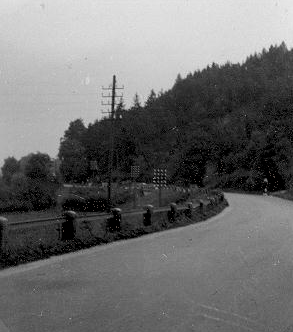 Right: The road to Reichenhall
Right: The road to Reichenhall
----------------
The international territory stretched on, the road following the border, but finally we entered Germany! At the customs we received receipts for our money and were allowed to travel on, no other formalities. We entered Bad Reichenhall and continued to follow the river Salzach, later resting beneath a colossal aerial cableway. Moving on, we passed two Hitler Youths and asked them if they are also on their way to Berchtesgaden. They laughed and told us that we were going in the wrong direction. We had no other choice but to turn back to Bad Reichenhall. Finding the correct road we continued, uphill, and along the border we could see an SS border guard. We had to dismount, it was hot and at the Hallthun train station we had reached the top. From here we could see the Watzmann and knew we were getting close.
At the Obersalzberg
Directions to the hostel were posted along the way; it was located outside the village - a brand new “Adolf Hitler Hostel”, the best I have ever seen. We registered and, since it was noon, ordered lunch. We sat on the terrace, amidst a group of people from all over: One from Hamburg, from Bavaria, two Americans, my Sudeten German friend and I, the Austrian, four nations together. After a lunch of potato pancakes and cabbage, we stayed together and called ourselves the International Club. In the afternoon, we climbed the Salzberg with the Bavarian in the lead, a 1000m climb, which took us an hour. Up there, I saw minister Hermann Göring by chance and on the way back a rain shower surprised us. We ran to the train station and since a train was about ready to leave we purchased tickets (15 Pf.) and rode to the hostel--the International Club returning to base. Franz had arrived. We spent the evening playing games, also singing. The Hitler Youth Radio Chorus stayed here also.
Wednesday, September 1, 1937. It had rained the evening before but now it was nice. After a short breakfast, we were getting ready to leave but when we picked up our bikes we discovered that a bunch of others were also traveling our way, so we all rode together. We said good by to the International Cub, then back to Bad Reichenhall. We bought groceries, which would last until we reached Munich and then continued in the direction of Teisendorf.
Traveling group assembled at the Chiemsee
Along the road we noticed a number of large Reich labor service camps, housing the men needed to build the Autobahn. We stopped at a larger farm and all seven of us received some buttermilk and bread, free of charge. We then passed through a tunnel, the Autobahn above us, to later view the straight line of this gigantic Autobahn as we climbed. We reached Traunstein at noon and were very hungry. We again rode to a farm, six of us now (one had left) and purchased a big jug full of milk. We continued, almost bursting, but still raided a few fruit trees, the ripe fruit begging. Then the Chiemsee. We rode along its shores to Seebrück, but unfortunately signs were posted all along: “No Swimming.” We continued and were able to go swimming when we were outside the village.
The water was cold but we swam to a structure erected by army engineers. We climbed up and chatted with a guard, with the island and castle Herren-Chiemsee in the background. We then swam back and it didn’t take us long to get to Hamhof, where we left the road and found a nice hostel. We placed luggage on our beds to show that they were occupied and then returned to the village to spend some time at an Inn, bowling. We returned at 8:30 and were read the riot act by the hostel Mom, who had become famous as we later found out. A few more songs and to bed.
Thursday, September 2, 1937. Next morning we rose early and left without breakfast, the packing of the bikes by now routine. But soon we again stopped at a farm to purchase bread and milk. We crossed the river Inn at Rosenheim; the town was festively decked out - some exhibition. We then passed an air force base, stopping to watch planes taking off and land, then continued raiding fruit trees again and at noon we were 27km from Munich.
We were hungry and one of us, from Augsburg, told us that there is a monastery close by, he had stayed in it, and surely we would get something to eat there, free. Around 1pm we arrived, but were told that nothing to eat is left over but to wait, something will be prepared. Fifteen minutes later two nuns appeared, carrying cutlery and a large pot of soup. We ate with relish and believed that this would be it, but no, we were then served meat, vegetables and salad. This really surprised us; we ate what we could but could not manage it all. A big jug of fruit juice finished the meal. We were stuffed, unable to continue our journey.
Served lunch at a Bavarian monastery
Franz lay in the grass, moaning. We were then allowed to view the beautiful rooms and finally continued, late. Heavy going at first, but we were nearing Munich and 15km outside the city the bicycle path started. We again passed an airport, a plane flying overhead, got lost but finally reached Munich. We passed the Maximilianeum, an imposing structure, then across the river Isar, bypassing the Church of my Lady and city hall to the train station. We were given directions to the hostel and arrived at 5pm. A little tour through town, then to bed at 9pm.
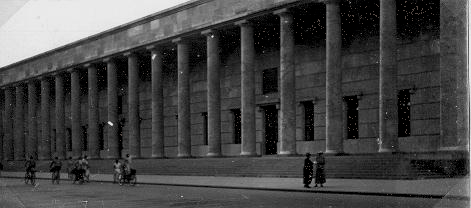
Above: The House of German Art in Munich; below, Victory Gate
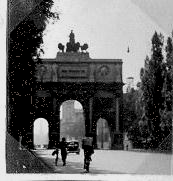
Friday, September 3, 1937. No bicycling on this day; we tried to take in as many of the places of interest as possible in a short time: The Temple of Honor (Ehrentemple), The Brown House, The Hall of Heroes (Heldenhalle), the War Memorial (Kriegerdenkmal), Victory Gate (Siegestor), the exhibition of “deranged art,” the English Garden (Englischer Garten) and the House of German Art (Haus der deutschen Kunst). We went to bed in the evening dead tired.
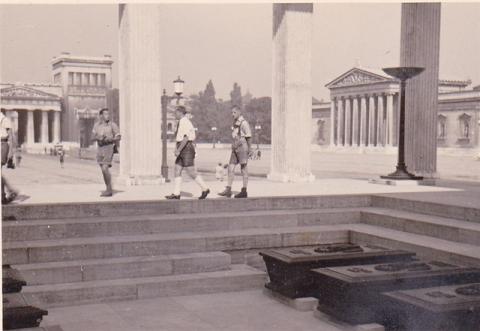
The Temple of Honor (Ehrentemple), Munich
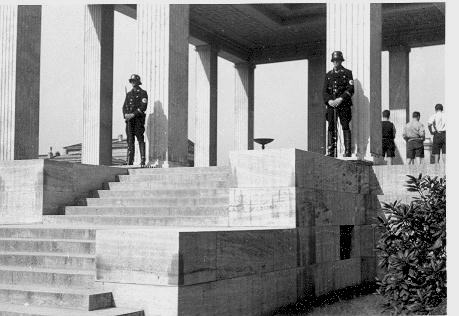
The Eternal Guard (Die Erwige Wache)
Saturday, September 4, 1937. The nicest wake-up call in all of the hostels: At six, the warden of the hostel played his flute, then called out “Get up, comrades.” The last to rise had to sweep the whole place. I slept on the fourth floor. It was 8 am by the time breakfast was over and we were packed; time to say goodbye for Franz and me. Our comrades, the lad from Augsburg, the one from Magdeburg as well as the Sudeten German “Charles with the Ark of the Covenant” (also called minister of finance, as he always managed to find something to eat for little money) planned on staying in Munich, but we had to travel on. As mentioned, we left at eight, and at the army barracks I had my only mechanical defect: a screw had come loose on the fender. The bicycle path was in great shape, we continued through a tunnel and a lad joined us. The road to Pfaffenhofen was almost straight and even. We saw troops, and just outside of Pfaffenhofen we entered hilly country and had to push our bikes at times.
Just outside of Ingolstadt it started to rain, but we continued and arrived in town at 3pm. The town gave the impression of a fortress, and rightly so—castle moats, bastions, walls with gun portals. We found a nice hostel near the Holy-Cross gateway, for now being the only occupants. After a late lunch we walked through town, first to the post office, finding my first letters from home. Market day at the town's square, people everywhere. At the hostel others had arrived, among them a youth from Westphalia, Heinz Borgmann. We visited the tourist information office to pick up some brochures, looked at churches inside and out, the Danube gate—the river still quite narrow here, and to bed at 9pm.
Sunday, September 5, 1937. It was already 8am before we rode off, four of us, and at 9am we were in the old Bishops residence, Eichstätt, having traveled at an average speed of 24kmh. The famous landmarks of this old town were everywhere; Willibald castle on one side, ruins on the other, the Monastery as well as many old Churches. Uphill from here on, not steep but impossible to ride. Markings in the stone showed how the river Altmühl had carved his bed, many holes in rock, with tunnels, easily viewed while pushing the bike. As we climbed, the view of the city, the castle and the monastery became more pronounced. No sun, therefore not too hot, and after a 200m climb we could ride again, but it was not a downhill ride but up and down all along. We rode through Weißenburg; we were in the center of the Franconian Jura. Up on a hill, then down again, not the most pleasant ride. We could now see banners strung over the roads and decorated with flags reading: “Welcome to Nürnberg.”
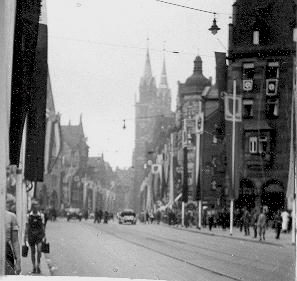
At 2pm we were in the city, saying good by to the others. We rode through town, old streets decorated with numerous flags (shown at right), past the Hotel ‘Deutscher Hof.’ Suddenly a loud roar from above, 450 heavy and light planes practiced the flyover, very impressive. We passed the Zeppelin meadow and ended up outside of Nürnberg, finding a place to stay in a farmer's hay barn because the city was filled to the brim. There we met two other boys, Rolf and Paul, who had also not found a place to stay in town and we made ourselves comfortable, planning on a lengthy stay. The farm was about 9km from town. In the evening, all four of us visited the Reich labor service camp and supper was served to us.
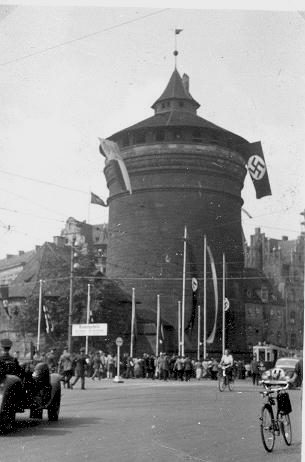
Right: One entrance to the Old Town (Die Altstadt) of Nuremberg.
------------------
Monday, September 6, 1937. We had slept well in the hay, got up at 7:30 and cooked our breakfast in the farmer's kitchen. After tidying up our place, we were ready to leave. On the street, we flagged down a car which took us into town, with one police check along the way. We were dropped off at Langwasser; we still had a long march ahead of us to reach our destination. [This is all that was recorded for this day. According to Willy Wenger, the boys surveyed the tent camp of the 38,000 RAD (Reich Labor Service) young men.]
Tuesday, September 7, 1937: We now decided on a day of rest, laying in the grass all day long soaking up the sun. In the evening we witnessed the practice for the light display, searchlights had been placed around the perimeter of the Zeppelin meadows.
Wednesday, September 8, 1937. Back to town in the morning, a truck driver gave us a ride. This was the Reich Labor Service day; from where we were we could see all the dignitaries of the Reich pass by in cars. A staff officer, who noticed us, gave us two tickets for the events; problem was, there were four of us, so we had to purchase two more. In the meantime, at 10:00, the columns of men were arriving, 38,000 of them marched past the Führer who was standing under the grandstand. We had climbed a light pole and could take it all in. When the parades were over we found a place in a stand at the Zeppelin meadows.
Now the shirtless young men from the Führer school marched onto the meadows – then the Führer spoke. The crowd erupted in cheers. The men from the Labor Service settled down on the meadows, their leaders passing out sweets and oranges, etc. Then the march through town. We, of course, got lost and only met up again in the evening at home—Paul and I not having eaten anything all day.
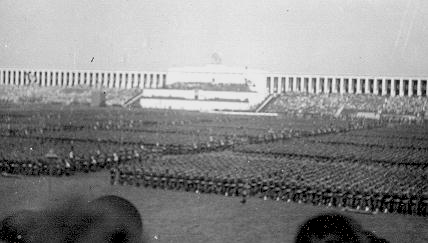
The Reich Labor Service assembled on the Zeppelin Field
Watching the RAD march on the Zeppelin meadow
Thursday, September 9, 1937. Today we left at noon for town, Franz and Rolf were to follow with something to eat. At 6:00pm we were to meet at the post office. There was a lot of commotion in town; huge masses of people were crowding the streets wearing uniforms not from Nürnberg. We walked passed the Deutscher Hof hotel, the place where the Führer was staying, the colors of the Führer flying in the breeze on the roof. The Führer was home. Impossible to imagine the crowds around the hotel; I almost lost Paul. One just had to go where the crowd did, no turning left or right freely; all were waiting for the Führer to appear.
Right: Hitler appears on balcony.
----------------------
I was extremely lucky that after only 10 minutes one of the balcony doors opened and the Führer stepped out to greet the crowd. The four thousand or so present broke out in cheers, the hail shouts not ending even after the Führer had left. When the crowds dispersed I was able to make my way right up to the barrier that was cordoning off the wide walkway between the hotel and the street. I had to wait for quite some time—political dignitaries passed by at times, the two SS honor guards saluting smartly. The SS guards were relieved every hour, an impressive ritual, the two of them marching by in cadence.
At 3:00, the Führer appeared again on the balcony, a repetition of the first, with again loud cheers from the crowd. We heard that the Führer was to leave at 4 o’clock for the Congress Hall; all waited with anticipation.
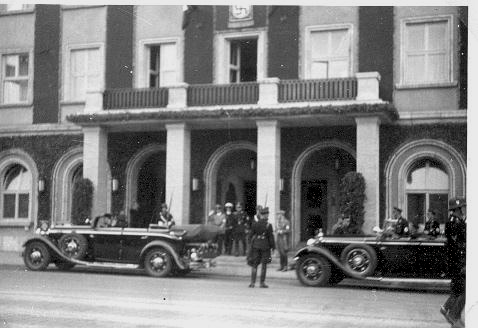
Dr. Joseph Goebbels leaves the hotel for the Congress Hall at the rally grounds
An additional honor guard was deployed—12 men, two officers as well as a drummer. Several leaders of the Party (Goebbels, Baldur von Schirach, Heß, and others) left in their cars, greeted fanatically by the crowd when they appeared. Then a motorcycle with a side car, a big yellow flag attached to it, left and we all knew that the Führer would come out in ten minutes. Everyone was tense; close to me a lady from Vienna fainted, SS men had to carry her away.
Hitler leaving the hotel with honor guard and drummer standing at left
A drum beat, the guards saluted and the Führer stepped out, greeting the crowds while stepping into his car, the right arm stretched out in the German salute. The car left slowly, and while the crowds had cheered when the other dignitaries were leaving, there was no comparison to the noise now. For a long time one could hear the shouts from people along the way as the car was passing. Only now was I able to get away from the crowd, and since I had two hours to kill before our rendezvous, I went for a walk in the old part of town. I had seen the castle from afar, apparently closed because of the crowds, and at 6pm precisely Paul and I were at the post office, but no sign of the other two. We were ravished and decided to leave for home, but it was hard to make any headway; the crowds already gathering for this evening's torch parade honoring the political leaders. Only later were we able to flag a car down to take us to our quarters. No sign of Franz or Rolf here either; they returned late. We found enough to eat in one of our old suitcases, turned into an “icebox.”
Friday, September 10, 1937. Getting up in the morning I didn’t feel well; but believed that it would pass. It didn’t. I was dizzy, weak, cold and not even hungry. Then we heard a loud noise from the road, we ran outside, saw a truck and about 50m away a car with its front grill stuck in a creek, but no one was injured. The car, doing 120kmh, had rammed the truck, jumped the ditch, drove onto a field, ran over a tree to finally come to a halt in the creek. Luck was with them, and with a joint effort of 10 SA men and us, the car was again put onto the road, a tire changed and it was able to drive off. I became ill from all the exertion and had to lay down. I had nothing to eat all day save for some unsweetened tea but in the evening I felt better.
Saturday, September 11, 1937: I was fit again, but it was raining and we decided to stay inside. In the afternoon Franz and I rode into town to visit Albrecht Appel, who a few days ago had returned from Palestine. (I had met him at Marburg/Drau for the first time). He had much to tell, had experienced a whole lot. At dusk, Franz and I rode back to Langwasser to watch the fireworks at the Dutzendteich lake; it was very late when we returned home.
Sunday, September 12, 1937. The day of my departure had arrived. I said good-by to Franz, Paul and Rolf, thanked the farmer for his hospitality, and at 7am I was on my bike on a foggy and cold morning. Not very pleasant, especially when traveling alone. At first, I wore my regular trousers, but changed into shorts later. The ride was not very nice, uphill, downhill, and on steep inclines the road was not paved, just sand and still wet from the day before. I got lost once; one car came toward me with minister president Hermann Göring the passenger.
In Neumarkt, a chap asked me where I was heading and then accompanied me. When I told him that I wanted to make it to Landshut, he replied that in no way would he go that far and this ‘super biker’ left me at Hemau. Near Oberwintzer I entered the Danube valley, traveled along the river and arrived in Regensburg at 1pm.
I passed the gorgeous Cathedral and stopped in an inn outside of town, and even though it was late, past 1pm, they served me a pork roast. I also ordered a liter of beer, not even asking the price. The hostess asked if she heard right, and that I wanted a liter. When she served it I knew why, but I managed to finish all of it, not wanting to chicken out. I still had 60km to go, not an easy task. I left the Inn at 2pm, a little unsteady, my feet heavy as lead. And to top it all, it started to rain, but I continued. I don’t remember much of this, but time just flew by. I was aware, however, that because of the fall maneuvers soldiers were billeted everywhere.
At 4:45 I arrived in Landhut, drenched, and I had to look for a long time to find a youth hostel. I then picked up a letter from home at the post office. Only four other guys shared the accommodations, and being dead tired I went to bed early.
Monday, September 13, 1937. After having made some enquiries I decided to take a different road than planned. I originally wanted to ride to Salzburg via Wasserburg but was told that the roads were bad, so I chose a different route and two chaps joined me.
It was 8am when I had my things together and I could leave, the other two had left already. The roads were very wet, it had rained all night, it was foggy and overcast. I soon caught up to the others, but the going was tough because of a head wind; it was also uphill/downhill again. It rained often. I had my raincoat at the ready, draped over the handlebar. We arrived at Vilsbiburg, a nice town where I purchased bread and butter. Finally the weather changed for the better. Metal windmills are everywhere in this area. The road leveled out and a tail wind helped. A thunderstorm came up behind us, the sky pitch black. We peddled like mad, crossed the river Inn just before Ötting and then the rain started. Now we parted company, the two going to Traunstein.
I was alone again, facing a strong headwind and on a gravel road. Noon had passed and I started to look for a restaurant. At about 1pm I stopped in a village but all I could get was a sausage and half an hour later I moved on. Just before Tittmoning, I reached the main, paved, road again. Far down I could see the river Salzach, the border between Austria and Germany. Then the river up to Laufen and from here I could see the Austrian mountains, already covered in snow. In the border town of Freilassing, I stopped to buy some chocolate and cookies and at 5pm I passed the border. This did not take long and I was soon on the way again. The Salzburg castle came into view and at 5:30 I arrived at the hostel I had stayed in two weeks prior. My clothes were drenched, as well as my shoes. Not as many guests this time and Salzburg was also not crowded, the festival being over.
Tuesday, September 14, 1937. I was ready to leave at 7am, but had to wait ‘till 8:30 before the host appeared to return my hostel passport. I was finally able to leave, it was cool and I wore sandals, my shoes still wet from the day before. I used shortcuts, pushing my bike up the Gaisberg and was then joined by a soldier from Salzburg. I had traveled this road a year ago and remembered it well. We advanced only slowly because of a headwind, the wind subsiding a little in the forest but only to then hit us again with a vengeance. Because of the conditions we did not get very far that day. At the Fuschl Lake, I re-discovered the bath hut I had stayed in before. Up a hill, then full speed down to the Wolfgang Lake - the first glimpse at the lake with Saint Gilgen was beautiful, the air clean. The bath huts were of course empty, the season over. Outside Strobl, we rested, raiding an apple tree with the consent of the farmer. My companion was a young, pleasant fellow. The head wind increased in velocity, we hardly moved but in Ischl it suddenly stopped. We now entered a new bicycle path, which followed the river to Traun. Past Goisern, we turned off to circumvent the Pötschen pass, I had bad memories about it from last year. At 1pm we bought some milk from a farmer, to then travel along the shores of the lake to Obertraun. I had also stayed there before. Then we had to push the bikes over a hill.
It took some effort to make it up the steep hill on a gravel road. But at 2:30 we arrived in Bad Aussee sooner than we would have going over the Pötschen pass. Then on the Mitterndorf, also not an easy task but from there we could see the Grimming, mostly covered in snow already. When we arrived in Klachau I took a deep, relieved, breath, then downhill, but steep; my companion dismounted. I stayed on the bike but had a few scary moments, and at the bottom of the hill had to wait some time for my companion to arrive. We now increased our tempo, because it was getting dark. In Wörschach the soldier left me and I continued, having to turn on my lights. Past Liezen it started to rain but I hurried on, hoping to catch a train in Selzthal.
I asked for directions and arrived at the station at 7pm, but then was told that the next train would not leave until 9pm. I used the time to catch up on what I had neglected: to eat. The rain now really came down and I was glad not to be on the bike anymore. It had also turned cold. The train left at 9pm, it rained continually. I tried to sleep but was not successful. I dozed a little and just before midnight I arrived in Leoben, my home town. In pouring rain I mounted my trustworthy bike for the last time and arrived home a few minutes later. My 1937 school holiday was coming to an end - a nice, if strenuous, time. Two more days and school would begin again.
A year later 'Poldi was in Nürnberg again, but this time as a legitimate Hitler Youth member. Shown here with friend Gilbert Giesendorfer at the Reichspartitag in 1938.
Category
Adolf Hitler, Austria, Germany, Leopold Wenger, National SocialismThe Days of Our Revolution
- 6990 reads
From Leopold Wenger's Trip Diary
The Days of Our Revolution
copyright 2013 Wilhelm Wenger and Carolyn Yeager
Translated from the German by Hasso Castrup
Following are the stirring events that took place in Leoben, Styria from February 12 through March 20, 1938, preparatory to the Anchluss (Austria becoming part of the German Reich) as recorded at the time by 16 year-old Hitler Youth member Leopold Wenger. Courtesy of Willy Wenger. -cy
12 February 1938 On our old campsite, at our cabin on Kraubatheck, there was for quite a long time already plans for a Hitler Youth camp again and it was scheduled to open this evening ... and as our term vacations were ending on 16 February, we were to spend four full days. Everything was already prepared and the food was already up there. I apologized that I could not come before Sunday because we had to sit in the police prison of Leoben and Wurschitz - 12 hours for a bicycle offense. (The fine was too expensive for us, therefore I had to endure the sentence). These 12 hours felt like an eternity. We were there together with all kinds of criminals: One of them told us that recently a Nazi was sitting there too, was then sent on to the district court but first he hid his revolver, cartridges and a swastika armband with the stamp of Donawitz in a wastebasket. One of the crooks found it and, with pleasure, handed it to the police.
Below: Our cabin in Schladnitzgraben; Right: Illegal Hitler Youth meet for skiing.
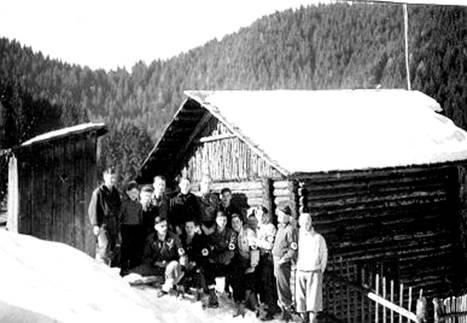
Group picture of Leoben illegal Hitler Youth, Feburary 1938
He asked me if I ever had anything to do with the police. Surprised, I denied it. Then he told me that our comrade Tiefental was brought to police HQ (hauled directly from his job) and interrogated by Major Zenz. He was shown a list, comprising all members of our [Hitler Youth] group in Leoben, including our group leader Marek. All the Scharführers, etc. were listed exactly. We were shocked. No one could imagine how the police got this information. That was the reason why the Hitler Youth camp had to be canceled immediately on account of the risk of a razzia [raid].13 February 1938: By chance we heard over the radio that Schuschnigg met with the Führer. We were very surprised by the humiliation, but did not get our hopes up because we did not want to be disappointed again. During the morning, some comrades were urgently looking for me. When I inquired in the afternoon what they wanted, I learned that I should have come to our hut.
14 February 1938: Early in the morning I took the train to Kaiserberg and went from there to our hut on Kraubatheck. My backpack was very heavy because it contained, besides the food, a brick. As we needed a new stove, everyone had to bring a brick. In the hut I found Ebner, Ebert, Klahr, Obermann and our camp cook. The day passed with skiing.
15 February 1938: I had apparently overeaten. I was not well, so I went home today. Earlier, Tiefental came by. He was sent from Leoben before midnight to fetch Ebner for a meeting with an associate of Scharführer, who had come from Graz. They came before dawn. Ebner with skis, but Tiefental still in his Sunday clothes; He looked great! I went home with the afternoon train. I was tired like a dog.
18 February 1938: At eight in the evening I had to go to a Führer roll call in Guenther Boehm's apartment. We were told that we should not expect anything from the meeting [of Hitler and Schuschnigg] in order not to be disappointed. Otherwise, our work goes on as before.
19 February 1938: At two o'clock in the afternoon I bade farewell to a group (under the command of Sepp Eberts) at the Dreihufeisenkreuz - they go with skis to the cabin of our group (Schar) in Schladnitzgraben. They took a swastika flag too. Then their leader, Walter, comes to me. He stands in front of me, pulls his right arm high and shouts: "Heil Hitler, everything is permitted again!" I told him he was crazy and asked if he could not shout louder. He is almost offended. Then we go to the main square. There are some German nationals with swastika flags there; otherwise only green-white and red-white-red flags are hanging. Then we see two men whom we knew had been locked up. Communists who were liberated by the amnesty are there, too. In the evening I meet Unterbannführer Ebner and ask him if I should not call Ebert with his group, who knows what may happen. But he tells me nothing will happen – I should let them stay in the camp.
Mom and Dad come in the evening with the little one (Gretl) from Graz (Dad was on leave). They say there will probably be a torchlight evening in Graz, with flags. The German travel agency is full of flowers, in revolutionary mood. In the evening edition of Tagespost it says: ... a hooligan fixed a swastika flag on the Town Hall, but it was then removed. In Graz, communists shot at the SA carrying flags. Some people were injured. In Leoben, it is the lull before the storm.
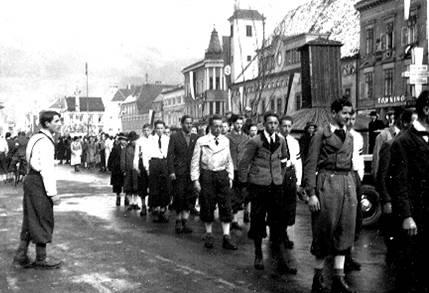
Poldi with his Hitlerjugend on main square, Leoben
The Town Hall of Leoben - calm before the storm
20 February 1938: Today is Sunday. We find out that the telephone offices are overloaded with calls. In the city all is still quiet. More or less. Towards noon the rumor appears: torchlight evening! I inquire if it's true. Yes, it is. At lunch there are already swastika flags in some windows. Everything is very excited, but in the city there is strange calm. Right after lunch I get the final command from our unit: "6 o'clock torchlight parade. The HJ gather at the corner Langgasse-Josef Grafgasse! Bring banners!"
I quickly send the messengers. Everything goes like clockwork. That reminds me of Ebert - naturally they will not come back until after dark. But that would be too late. Guenther Böhm was in the camp already this morning; now he goes again by bicycle, which he had adorned with a swastika pennant, to the Schladnitzgraben.
Meanwhile the city came alive. All have heard the Führer on the radio talking in the Reichstag. Everyone is delighted. On the streets you can see boys and men running. Everything is moving. Guenther Böhm is already back. He informs me that Ebert with the boys are already marching back. During the whole of Sunday they had the swastika flag hoisted. At 5 o'clock Ebert has still not arrived, so I'm going to meet him. I meet all the camaraderie behind Gör. One has the swastika flag on a ski stick as they ride down the mountain on skis towards me.
When we came back to the city, even the whole square was full of expectant people. Many brought the torches. Before dusk it's impossible to procure a torch. Then it was 6 o'clock. All the streets were full of people, not a policeman to be seen far and wide. We gathered in the Langgasse, the HJ from Donawitz were already there. Not one was missing of my flock, all 30 boys, some barely 14 years old. Also a long column of BDM [Bund Deutsche Mädel] girls were ready. Then the order was given: The leaders march in the middle of their unit so the orders will come from the middle, not from the front. Then we got the torches and it started.
As we reached near the main square, the vortex formed there. In Timmerdorfergasse we got stuck and had to wait to join the endless columns of marching units of the SS, SA, PO, civilians and the Women's League.
Behind us marched BDM and Jungvolk, then the SA units with their old storm flags, the sight of which made our hearts beat faster. We marched and sang and cheered through the main square, in the direction to Donawitz. The streets were lined with mostly women and soldiers who cheered us so much that it is impossible to describe.
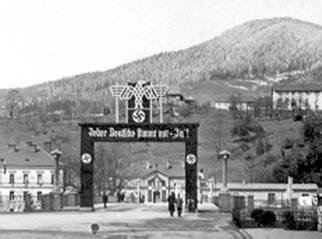
In front of the Waasenbrücke (railway bridge) in Leoben [this picture taken at the time of the April 10 plebiscite].
At the Waasenbrücke we saw a policeman on duty. We called at him, but he did not move. Then we passed the Jewish shops. There we sang the Song of the Storm Soldier (Lied vom Sturmsoldaten) and shouted "Judas perish! Heil Hitler! Who is our leader? Adolf Hitler" and so on until we were hoarse and could shout no more. In Donawitz I saw some of our high school professors shouting “Heil Hitler;” it was a joy. Then we marched back to Leoben, this time the HJ (Hitler Jugend) and DJ (Das Jugendvolk) alone. At the barracks we stopped, we approached the front of the barracks and sang. "In the East, a new day has begun to glow ... We are sons of the Ostmark, our country, the beautiful, our struggle and the victory!" The soldiers opened the windows, but they dared not sing with us yet.
Then we marched to the floodplains on the Jahn-meadow, formed a large, open square, on one side of which all the flags were displayed. Then the leaders inspected their units because during the march many boys whom we didn't know joined us. Then Unterbannführer Ebner made a report. It was the most beautiful ceremony I had ever seen. Ebner spoke to us of the importance of this moment and that our fight was not yet over, but that we only now were entering the decisive phase in the history of Ostmark, and called us again to prepare ourselves for the decisive battle. With Deutschlands and Horst-Wessel-Lied and the Song of the Youth the celebration came to an end. Then we were handed over the flags for safekeeping. These were a little small for our current criteria, but for us they were a symbol. Through deserted streets, late in the night, we went home. An eventful, beautiful day was over.
21 February 1938: When I came to school, people were greeting everywhere with the Nazi salute. Prof. Schröckenfuchs could not teach, but ran around in the classroom and ordered us to read aloud from the book "3 times Austria."
I later learned that in Kallwang he got a spanking from the local Hitler Youth under the leadership of Kaiblinger as he tried to provoke with the VF (Patriotic Front). In the afternoon I learned that in Trofaiach a torchlight march was to start and on this occasion a whole unit of SA (Unit 13) was marching there. I told this to the unit leader Marek and made the proposal that HJ go to Trofaiach on bicycles. That's what we did. Everybody who had time agreed and off we went.
Meantime my flag got a nice pointed end with swastika of sparkling brass. This item was crafted in the afternoon in dad's workshop by the workers; everyone was feeling the enthusiasm. Wherever we passed we were greeted by the residents.
Just before Troiafach we passed the 13th SA Unit, whose men also welcomed us warmly and enthusiastically. There we dismounted the bicycles and joined the Hitler Youth from Donawitz. We marched together in Trofaiach and then began a torchlight procession. Along the roadside there were hardly any people, for the entire population marched with us. On the main square there was a speech and then we rode back home. We had flags on our bikes. As we walked in the Donawitzerstraße, a few Communists taunted us, but when we stopped they quickly disappeared. Late in the evening I came home dead tired.
22 February 1938: In the morning at the school we were told that we were forbidden to salute with the Hitler salute, to shout Sieg Heil or to wear the swastika. But we cared very little about these bans. We not only wore these badges, but we made them ourselves. We already had great practice in it. We gathered five penny pieces, wherever we could find them; we honed them square, polished and sawed with a hacksaw the contours of the swastika. A pin was bent into shape and soldered on, and the badge was ready. I then let them sell through my boys so we got a bit of money for our common fund. At 8 o'clock in the evening was a planned Führer roll call at Seidler Emil's apartment. At 7 o'clock in the main square began a strolling demonstration against Schröckenfuchs, Gorbach, Pichler etc. Large posters read: "Down with the German-haters Schrockenfuchs, etc." I had left the demonstration earlier to go to the roll call. Here we got new guidelines from the Unterbannführer Ebner and the liaison to the division in Graz, Seidler. A members barrier for the HJ was imposed and only HJ aspirant groups could be formed. In view of the perilous times, we were allowed to carry weapons (only the leaders). 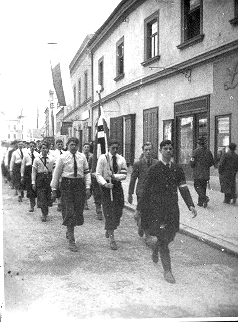
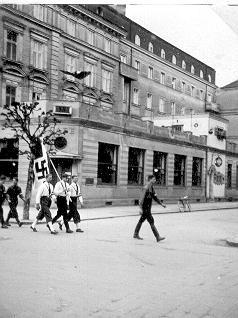
Above: Marek leads the Hitler Jugend past the Grand Hotel and along the street.
23 February 1938: At noon Gefolgschaftsführer Marek called me to his apartment. He handed me a heavy Walther automatic pistol (9 shots) and 90 rounds of ammunition. Then he told me about the gun and its use. For the evening he scheduled two Horst Wessel celebrations: the first at 6 o'clock for 15 younger comrades and the second celebration should start at 8 o'clock. For this purpose we had guarded all roads during the entire ceremony (The celebrations took place in the woods above the hunting house) – so we were protected from any insidious attack as had indeed occurred repeatedly. Both celebrations were well prepared and were not without effect on the boys. I spoke briefly about the life and death of our freedom heroes and I ended with a call to emulate our models. All were enthusiastic and sang the song of our dead heroes.
24 February 1938: At 8 o'clock in the evening a Führers' roll call at Günther Böhm. At the same time Schuschnigg begins to speak from Innsbruck. When I get home, I hear Schuschnigg call: "Men - it's time!" We are to vote, and that on the13th of March – we are all greatly outraged.
25 February 1938: Our dear VF took the speech of Schuschnigg as the occasion to hold a rally at the main square. Leoben has always been a hot spot, so the police from the whole of Upper Styria came to the town and were billeted in the youth center (Major Fey home) in Gaswerksstraße. If you went onto the street, every fifty meters you met police sentries with fixed bayonets and helmets. Then, in the evening the Fatherland Front (VF) marched. In the early afternoon, the main square was cordoned off. The HJ had opened its first office in “paradise hall” of the Hotel Post. The entire hotel was the headquarters of the party, district leadership, SA Brigade, SA Standarte – it was all here together. In the corridors, SA men in uniform stood on guard. During the day there was already high tension in Leoben and everyone felt that today it might be discharged.
And that's what happened. From all over the Upper Styria our SA had gathered here and already before dark the main square was completely filled by the Nazis before the half (in front of the City Hall) was cleared by the police and cordoned off. Then began the parade of VF or rather of organized KP [Communist Party]. The result was that half the square was filled with VF, the other with our people. In between were the gendarmes. Then some HJ leaders, including myself, got an order to look for a car with a certain registration number. We have been told that it would have a machine gun installed in a headlight. We got a lot of other reconnaissance. In the meantime, the whole HJ of Leoben and HJ Donawitz led by Toni Bauerfeind had placed themselves between the marching columns of VF, shouting "Heil Schuschnigg." No sooner than they were among the blacks, they started to sing, unfurl the swastika banners and their shouts changed. It became clear that these boys had a tough time with the black-red band – torches were thrown in their face, women beat them with chains. They were insulted and spat upon with wild shouts. The black-reds wanted to snatch their flag, but Bauerfeind himself held it firmly in his hand. He dealt a couple of hits so that no one dared to touch it. This went on until the rally was over and the national anthem was played. Of course, all sang the Deutschlandslied and instead of the VF-youth song (your boys close the ranks well …), the Horst Wessel song.
Crowds are filling the main square
However, the HJ was hit hard. Some were beaten and wounded. They had been hit in the head with chains or kicked in the abdomen. Two, Richter and Milchrahm, our inspection service dragged from the inn "Vienna" where they were put temporarily, through the main square to the Hotel Post. We then had to make patrols throughout the city, armed with a pistol, until 2 o'clock in the morning.
26 February 1938: In the morning there was of course school, in the afternoon I marched with a few boys in my troop to our cabin in Schladnitzgraben to prepare everything for the big downhill run and the patrol run. Evening, Gefolgschaftsführer Marek came to us. It was a fine evening, except the oven was smoking heavily.
27 February 1938: The day began as usual with morning exercise, etc. Then all participants arrived successively. My troop was almost complete (with 16 men). Maschek was represented by only 6 and Göß (Geisendörfer) was completely absent. The day passed with downhill skiing and patrol run where my troop took the first places everywhere. For that we were awarded the first HJ-flag.
28 February 1938: Start of the ski week in Leobner Gymnasium. I am the ski instructor in the 2nd Class.
1 March 1938: morning ski lessons in the lowlands. 20 o'clock roll call of camaraderie (Günther Böhm).
2 March 1938: Morning the ski course on Massenburg, 17 o'clock roll call of camaraderie 2 (Sepp Ebert) in our apartment. 20 o'clock roll call of camaraderie (Blasl Bertl) in his room at Liftl.
3 March 1938: Because of rainfall the ski course was called off. 20 o'clock and 20 o'clock 30 two appeals by two camaraderies.
4 March 1938: We got a stack of Führer pictures from Graz and sold them all. I alerted my troop and in the afternoon almost all the pictures were sold. Although this was forbidden by the police.
5 March 1938: New pictures had to be sold. Since Unterbannführer Ebner had to leave for a camp, I had to conduct the entire sale for Leoben. Shortly before, the Hotel Post had a house search - but here they found nothing.
6 March 1938: 3 o'clock afternoon a roll call. Over the week, I had 10 roll calls.
History Professor Peintinger speaks to us on the Massenburg
Above: Ceremony held at the Massenburg in Leoben by the Hitler Jugend, in March 1938
Girl's unit of the Hitler Youth, Bund Deutscher Mädel, participate too.
8 March 1938: In the evening I held a Führer roll call. On the way home I heard screams, "One, two, three! Down with Hitlerism", "red-white-red, Hitler dead", etc. VF [Vaterlaendische Front - Schuschnigg's Party] wanted to demonstrate. Gendarmerie stood in front of the Hotel Post. In a moment, everybody was out of the hotel. The policemen wanted to reassure us and said "do not provoke, let the KP [Komunistische Partei] scream all they want!" I made an astonished expression and asked where were the KP. The policeman pointed to the VF and replied: "That is no different than the organized KP." The other policeman agreed with him. Obviously, this is a new inspiration for the raging storm troopers around. And as the Blacks [the clerical party linked to the Catholic Church] were screaming on, the fight began. In Krottendorfergasse they were attacked from two sides and beaten so long that the SA Brigade Commander, Wolf Bauer, came running and gave the order to stop. The Blacks felt lucky to be able to break away with bleeding skulls.
11 March 1938:[Leoben] Trucks continuously drove through the city and dropped leaflets: "Vote for Schuschnigg," etc. But as soon as they lay on the ground, the HJ [Hitler Jugend] picked up the papers and threw them in the river Mur. This lasted all day. Also aircraft threw off leaflets and everybody was in a boundless rage. To make matters worse, the people's militia was armed, marched out and by 3 o'clock afternoon all public buildings (post office, train station, district court, etc.) were occupied by these scoundrels. But their dream did not last long. By 5 o'clock I met Mr. Ebner of the DAF [Deutsche Arbeiter Front] who called out to me: "The vote is postponed, tell everybody to fly flags at all houses."
That was good news! I ran straight to the HJ office, which was in Vorderbergerstraße for some time. Here I was ordered: "Tonight a great torchlight procession, venue Josef Grafengasse. Alert everybody!” And then it started. The whole square was full of people. We all got the “rubber sausages“ - just in case. The first time we went with our troop flag. We marched with lighted torches on the main square in front of the Town Hall to the rally. The whole place was full. Under the Town Hall balcony [Austrian] SS stood with helmets and flags. All around stood gendarmerie with bayonets.
Then, from the balcony spoke the chief of staff of the SA Brigade, Steindl. As he shouted down, "German troops have crossed the border and stand in Austria," everywhere sounded a joy, as you can hear it only once. Then he set all our opponents free to leave the city immediately and insisted that no blood should be shed. Afterwards the illegal Kreisleiter Kristandl spoke. Then the columns marched towards Donawitz by where the cinema was (...)
As we were being dismissed, we still had to attend the Führer roll call where we received guidelines for the next days. Then, we strongly believed that in the course of the night the German troops would march into Leoben and we did not want to miss the occasion.
Even as the rally in the main square was going on, all gendarmes suddenly disappeared from the police station and when they came back again, they all had SS armbands. We could not believe it at first, and it seemed almost like living in a dream. Of course no troops could come so quickly. At this time they were not even in Salzburg, but I had really no desire to go to sleep. It started to rain and the crowds disappeared from the streets. I saw how the SA was being armed with the guns of the People's Militia. [PM was a Schuschnigg organization.] I was there at 1 o'clock [a.m.] as the House of VF, the Chamber of Labour, was occupied. By 3 o'clock in the morning Lieutenant Vinek got a swastika flag from Hotel Post and let her fly over the barracks. Only then I went to sleep.
12 March 1938: The home of the Austrian Jungvolk was occupied by the gendarmerie. It belonged to us. By 14 o'clock [2 pm] we occupied it, stuck up a sign that Dad had painted, NSDAP - HITLER JUGEND, and treated the police as our guests. In the evening we were called away from a meeting in order to requisition cars of known anti-Nazis. Massenburg was occupied by HJ.
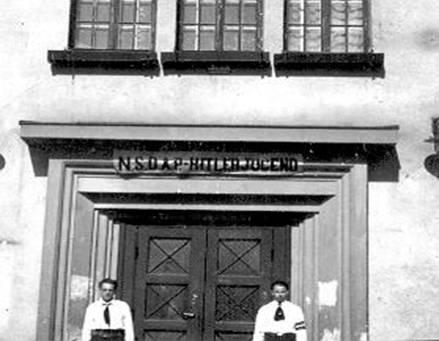
First Hitler Jugend home in Leoben
13 March 1938: In the afternoon all our followers marched to Tollinggraben where the big Jungvolk home was. It was occupied and I had to stay up with 5 men. Towards the evening an order came by the telephone that we should immediately come to Leoben, as we should be then moved to Graz; the Führer was in Graz, it said. When we were leaving, I could not help but to shoot a series at the big board of the home with my revolver.
In Leoben, we were loaded onto trucks the side planks of which almost burst. It was freezing cold. Of course the Führer was not in Graz. So we went back again. Since most were wearing only shirt and skirt, the girls who rode in buses loaned us their coats. Nevertheless, it was almost unbearable. At midnight, we arrived in Leoben and then we had night duty. During sentry duty the gendarmes loaned us their coats and helmets.
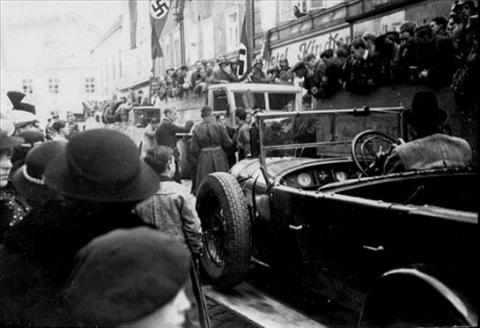
Ready to go to Graz
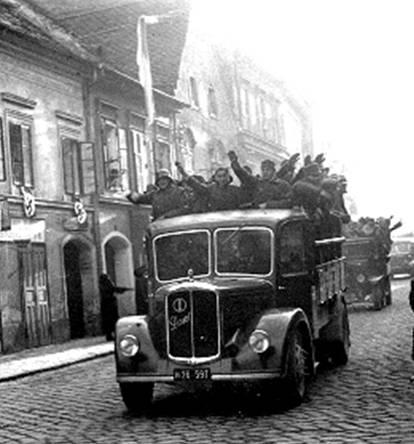
Enthusiastic departure for a rally in Graz which never took place
14 March 1938: The garrison troops were sworn in [to] the Führer. The first German police come to Leoben. In the morning my Dad led me to Bruck on the Mur. There, already the German military had come from Vienna.
German police troops welcomed by the population
German police seen in Leoben after March 13
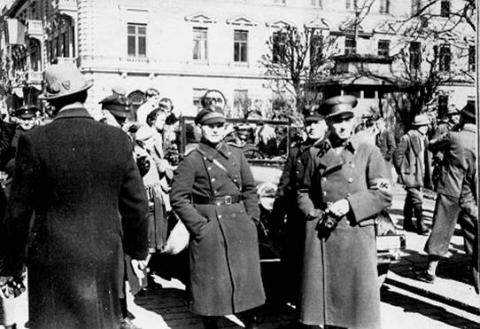 German (left) and Austrian police officers,now with swastika armbands, greet cordially
German (left) and Austrian police officers,now with swastika armbands, greet cordially
15 March 1938: Wieder and I had guard duty. Throughout the night.
16 March 1938: The service became more regular
17 March 1938: We needed uniforms, but we never could find them. In Bruck we got two brownshirts. Everything else was sold out. On the castle square at the Massenburg there was a brief celebration of the school under the new director Prof. Peintinger.
18 March 1938: the Bannführer of Styria was visiting Leoben.
20 March 1938: Finally the first German troops, already expected so much by the whole population, came to Leoben.
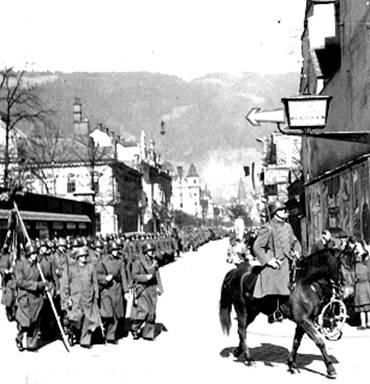 Above: The Federal army marches on the main square, Leoben
Above: The Federal army marches on the main square, Leoben
Category
Adolf Hitler, European History, Germany, Leopold Wenger, National SocialismNapola Letters
- 3163 reads
Leopold Wenger's first letters from Napola Köslin, April-May 1939
- 6296 reads
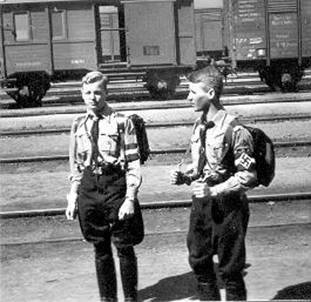
Leopold Wenger (right) and Gilbert Geisendorfer in their Hitlerjugend uniforms at the train station in Leoben embarking on a new adventure.
Background: Leopold Wenger and his best friend Gilbert Geisendorfer read in a newspaper that there were openings for young men in the National Political Educaton Institute at Köslin in Pomerania. They talked about it and decided to apply. Together, they reasoned that if they did not pass the entrance exam the world would not end and they would have seen Berlin, the capitol city of the Reich.
They traveled by train from Leoben to Berlin-Potsdam, where the evaluation and testing took place. Both did pass and were then transported from Potsdam to their new school at Köslin. Leopold was 18 years old at this time. In the following letters to his family, he describes his first month in this new and different environment. More of his letters, up until November 1939, will be posted here as they are translated.
copyright 2013 Wilhelm Wenger and Carolyn Yeager
Translated from the German by Wilfried Heink
Letter of April 20, 1939: Based on my excellent performance in science and sports, I was admitted to NAPOLA (National political education program) in Köslin. Only 230 of the 800 applicants were admitted for testing; 60 youngmen (jungmännen) were selected for grades 7 and 8 and, because of my test results, I was accepted into grade 8 even though I had never completed grade 7.
The tests were not what I had expected. They were regular classroom lessons and each one of us was evaluated based on performance. High-ranking SS officers were present, as well as a General of the Luftwaffe. Medical examinations were performed three times: a general assessment; fitness for flying (a turnstile and a catapult); and suitability for the SS (racial).
I travelled to Berlin a few times and was able to visit the Garrison church in Potsdam, the grave of Frederic the Great as well as the castle Sanssouci. On the 18th we drove to Berlin via the Avus, then on the Autobahn to Stettin [close to the Baltic Sea], and to Küstrin, and our new home.
Die Anstalt (the campus at Köslin)
The institute is an old cadet facility, very nice in appearance. We are five to a room but all of us sleep in a hall. The food is palatable, but one has to eat a lot to get filled. Yesterday we received our clothes, some would laugh seeing me in uniform. Grayish blue as the uniforms of the Luftwaffe, long baggy pants, a blouse, black stiff high boots and a cap of the same color. We will later receive a brown shirt, shorts, bathing trunks, towels, etc. What is not supplied is: handkerchiefs, and sleeping wear; those are personal articles and will not be washed by the staff. The clothes I no longer need – we have to always wear uniform – I will send back.
Jungmann Leopold Wenger in his new uniform at the institute at Köslin in Pomerania.
I do however need a suitcase; Willy’s would be fine, because I have to travel to Munich for a personal introduction. So as to not send an empty suitcase, please enclose:
1. My travelling cutlery
2. A few pages of paper, writing utensils and postage stamps
3. A few needles and black thread (we have to attach our name plates)
4. My sleeveless pullover
5. The leather gloves (an extremely cold wind blows from the Baltic Sea)
6. A few handkerchiefs
7. My physics folder
8. My math formula-folder (black cover, I gave it to Willy for him to study formulas)
Other than that, I can’t think of anything.
Today we marched to Köslin (the institute is located about 2km outside of town) to celebrate the Führer’s birthday. Following that, a parade past the head of the institution. My fingers almost froze.
Die Jungmännen march in a parade through the downtown of Köslin on April 20, 1939--the Fuhrer's birthday.
A social gathering. To the merriment of the townfolk, a game in which the school instructors try to snatch pieces of wurst (sausage) with their mouths, from a string held by students.
All of our instructors are very young, strict, but good comrades. Today we will climb 140m at the Gollenberg (Gollen hill); tomorrow school starts. Some Austrians are among the instructors; only seven of the young men [jungmännen, as the students were called] are from Austria. During summer holidays all of Germany's NAPOLA’s move out on maneuver, this year taking place in Carinthia [in the Ostmark, formerly Austria].
But I forgot something: On the 17th we visited the Luftwaffe school and the airport Berlin-Gatow. We saw a lot, other than that nothing to tell. I just heard the whistle for lunch: cotlettes, potatoes, compote (preserved fruit), coffee and Danish.
How are you? Did Willy finish his Latin studies? How is little Gretl? I hope she is better. Please keep me in the know, and if Dad takes pictures, send some. Did something arrive from Munich? If so, please send it.
Enclosed is a pamphlet from the Napola Köslin. I won’t need any pocket money, the lead instructor implied that each of us youngmen will receive a certain amount. There are no school books available, not even for sale, because Rust [Bernhard Rust became Minister of Science, Education and National Culture in June 1934 -cy] has ordered that they must remain personal property for life. This would be it then. Please write often; we are cut off from our surroundings, holidays will be a rarity and studying will take up most of the time. I will therefore have very little time to write to you in the future.
Don’t forget to give my love to little Gretl, Willy should get with it, he could then join me, there are small kids in the first grade. Say hello to Flocki (Latin teacher), he can shove his Latin…
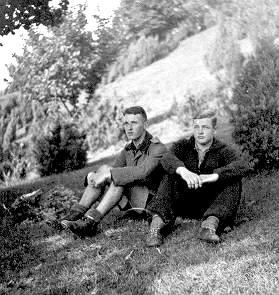
We are back from the Gollenberg climb. One can see the Jasmund Lake from the observation tower, as well as the Baltic Sea 5km away.
Pictured right: Bibi and Gilbert on the Gollen
--------------------------
Please sell my uniform, I’ll not need it again. The epaulet and the coat I have from Sepp Koiner--Willy should take them back to his brother in Goess.
Letter of April 27, 1939:
5:45 wake up, then a run through the forest (a real bother), then wash and get dressed.
6:30 morning roll call, presenting of the flag
6:35 1st breakfast
6:55 to the classrooms
7:00 school starts
7:00 – 9:35 school and 2nd breakfast
9:45 – 12:30 school
12:40 roll call, then lunch
14:30 – 16:05 duties as determined (gymnastics, work duties, sports, swimming, etc.)
16:30 coffee break
16:45 – 18;45 studying for school
18:55 evening roll call
19:00 supper
19:45 entertainment (togetherness, singing, gymnastics, swimming, fencing)
21:45 bed time
The institute is run like an army barracks, with wake up too early for my taste. But running through the forest helps to clear the cob webs. You probably are also interested in our menu:
For breakfast, coffee or cocoa, bread, marmalade, butter and honey. But since I don’t like warm milk I receive a ¼ liter ice cold milk from the dairy (quite something).
For lunch it varies, we only had fish once, normally meat, lots of potatoes, bread, pudding, coffee and cake. For afternoon break marmalade, bread, butter, coffee or tea. For supper much the same as lunch…I was in fact pleasantly surprised.
School is different from what I am used to from Leoben; every subject, be it ever so boring (like music and art), turns into a happening. No geography, it is called "study of struggle," and deals with current political and economic issues of the various states. In the few lessons so far we were convinced that Poland is the next problem to be solved.
Looks like class is finished. Leopold, who was still called Bibi at the school, is seated at front table
In leisure time we have the huge library at our disposal, along with the reading room, and are allowed to peruse to our heart's content. Thus we are able to familiarize ourselves with early German history, but because of little leisure time can not make complete use of what is offered. In short, this facility is marvelous. I would love to show it to you.
The chairs are upholstered, everyone has his own table lamp, etc., one feels like…I don’t know what to say. Then we have a reading room with only newspapers provided, as well as a radio. Too much homework, in my opinion, and only two hours to do it in. But I take an extra hour, I need to catch up, and go to sleep at 23:00hrs.
Letter of April 28, 1939: We have here a variety of groups; youngmen with similar interests work together. Swimming, for instance (we have of course a pool), boxing, gymnastics (the gym is still filled with grain and can not be used), sailing, motor sport, hand and football, riding (we have a riding school and many horses), shooting, fencing, track and field. Shooting, swimming, track and field and motor sports are mandatory. Tomorrow we will go to our nearby glider field to fly. I have chosen fencing as an additional discipline; it is supposed to enhance the reaction.
Motor bikes available at the Institute
A fleet of automobiles too.
We now have to study motor sport issues, because come end of May we will probably go to a special school to obtain, in two weeks time, all driving licenses for motor bike, cars, all terrain vehicles and diesels. So you see, it is not easy, but we like it; it is never boring.
On Tuesday, a tailor measured us for our dress uniforms, they are supposed to be ready in a month. We are to receive: light blue uniform jacket, long pants and coat. I am not thrilled, just more stuff to clean and it can only be used on Sunday, in any case. But this is when we have flying lessons [on Sunday], therefore just a luxury item. I’ve already talked about our march to the Baltic Sea.
Letter of April 30, 1939: I have one more favor to ask: I have been registered as a recruit at the Leoben muster station and, since I don’t know if my duty here is recognized, it is possible that I am called to Leoben for training. Could Dad please make some inquiries?
Yesterday we had a seminar about Sudeten German poetry; we were also again visited by representatives of the SS, NSFK (National Socialist Flying Corps) and the Luftwaffe. They seem to have something planned for us, according to our leader, but we don’t know what. From our second floor windows we can see the sea, as well as one of the lakes and the air strip.
I now need to buy my books: a logarithms book, history and also a slide rule, whatever that is. I also need to get some notebooks, but please send me my old ones I already mentioned in my first letter. For little money I can have my private clothes washed, and this makes the most sense since it is only a matter of a few pennies.
That’s it for now, many thanks for the nice pictures. Tell Willy not to exert himself, and to ask Prommer for help. Till now I am unable to find any pictures of our abode but as soon as I get ahold of some, I’ll send them. All the best, Bibi.
Letter of May 4, 1939: On June 26 our maneuvers in Carinthia will begin, lasting to July 13, and hopefully we will see each other then.
Following that, we are going for motor sport training, then on a tour of a foreign country. The following countries are under consideration: Poland (we will without doubt have it by then), Yugoslavia, Finland, Sweden or Spain. Not bad. Those who live close by will go home during Pentecost; the rest of us are in flying training.
I don’t know if I told you already that our group of one hundred is comprised of youth from the whole Reich. This makes for fun, for when each of us speaks in his dialect no one understands anything. It is seldom that two of the youngmen come from the same place. Thus, when we talk about our places of origin we get to know all of Germany. Any news from the Hitler Youth? I didn’t hear anything from them, did anything arrive from Munich?
[Summer] Holidays are from the start of the maneuvers: June 13 to September 1, more than at home but we do need to study during the time off.
Letter of May 5, 1939:Just briefly, did you send the suitcase already? If not, please add my physics-and-math exercise book, the math book from Roland Stowasser and my mathematical instruments. I desperately need them. Up till now I had to borrow this from a comrade, but since time is short I receive it late. So please send it promptly, it’ll take four days to get here. If the suitcase has not been sent, please also add my briefcase, nothing else.
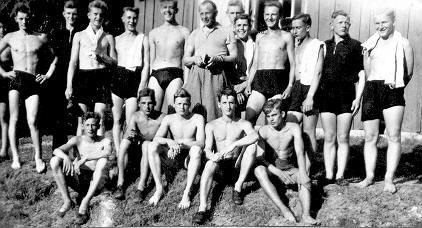
Swimming is a time for fun: Gilbert and Bibi in front row, seated in center.
I still have a little time; in half an hour we have to assemble for swimming, that will again be fun. Yesterday afternoon we had work duty at the sporting grounds. Dad, did you go to Gleichenberg, or will you go for Pentecost? Grandma writes that all the trees are in bloom. It is a little colder here and only a few trees are blooming.
Willy should be able to manage geography and music, but he should pay attention in school. As far as Latin and English goes…he should consult Prommer. And the little brat [Greterl] should not get used to sitting by the table, when I’m not home, looking out when I get back. Please tell her that. And furthermore, her handwriting is terrible, impossible for me to decipher what she adds to Mom's letters.
Now you are up to date again, but I’ll wait ‘till tomorrow before sending the letter; I am expecting some pictures that will no doubt be of interest to you.
* * *
More to come -
Category
Germany, Leopold Wenger, National SocialismMore Leopold Wenger letters from Napola-Köslin, May-June 1939
- 6151 reads
Leopold (Bibi) Wenger on left, his home-town best friend Gilbert Geisendorfer on right, taking in the sun on the Köslin campus.
copyright 2013 Wilhelm Wenger and Carolyn Yeager
Translated from the German by Markus (Letter of May 6-18)
and Hadding Scott (Letters of May 27 to June 29)
Letter of May 6-May 18, 1939: I will now answer your questions: My birth certificate is in the middle drawer of my desk, in the back. You have hopefully by now received the disclaimer and sent it back.
I was not asked any questions at the exam in Potsdam; it was like regular school and whoever participated regularly was rewarded. The emphasis was on swimming, diving, platform diving, broad jump, 100m sprint, 3km walk, shot put, gymnastics, horse jumping and floor exercises. I was totally numb afterward, and whoever could not handle it was dismissed.
For other assignments, I had to write a letter to my English friend re. Bohemia and Moravia; for math and physics we had to calculate the speed of flight and fall and also describe the car and diesel engine. Plus a written test in Latin, [and] a dictation in English.
I was asked to list some Austrian poets in German. I said Rosegger, Klöpfer, Springenschmied, Itzinger - the educator didn't know them; whereupon I was like, what? You don't know these men of whom some were in possession of the German literature prize? After that, I finished my exams.
I sincerely congratulate Dad on his promotion to foreman. If Dad doesn't want to wear all his badges of rank at the same time, I suggest he take them all off and put on a platelet with SK on it (Siehe Katalog – See Catalog). Hermann 'the Iron' should do it like this!
Well, my sore throat always heals fast. If it hurts in the evening, I wrap a wet towel around my neck and the next morning, I am fine again. In the evening we will be sent back to the Gollenwald (Gollen forest), which is only 20 meters away from our barrack. We are supposed to relax there. I am going to wait with my teeth because I am not in the mood nor do I have the time to do it right now.
There's no censorship of letters. We can write whatever we like, and to wherever we like (also abroad). I'll send my report home again; too bad a C in History and Math!
Thank you for the tissues, sewing kit and laundry tags. I have to sew white textile strips onto every laundry item, and write on it the full name in marking-ink. The package was on the way from May 5th to the 11th.
Horseback riding is only for those who enjoy it and have the time. We, the 3rd group of a Hundred, are busy with other things. Fencing, shooting, swimming, topography, the study of engines, exercises at the wind tunnel, seminars about this and that, so that we are happy if we are just able to observe. Here we see the little cubs (Pimpfe-boys within the Hitler-Jugend) falling off the horses and jumping over the hurdles, which is a great joy.
Today, some young men participate in the great riding and driving show of the Gau Pomerania for Köslin. Yesterday, we got a big Junkers engine in our workshop (the former gym hall); it is a visual model that is split in half so every process can be precisely viewed inside the cylinders, the carburetor, etc. Also a big car winch-tow and a number of airplanes arrived. A bigger hall has to be built yet.
All of us are very excited about our practical lessons. We have digested enough theories already. Now I believe I have answered Willy's question thereby, as well. Who beat Willy? He beat straight back, I hope. He ought to watch his eyes. After all, eyesight is the most important thing. Something I forgot - I spent half an hour alone with the eye doctor, during the aviation exam, at which he, after a sequence of experiments, finally diagnosed that my pupils close too slowly after bright glare. I could see fabulously without glasses though, and nothing with glasses on. The entire examination in Berlin took from 7am to 5pm. And after that, I had to lead a group of 15 young men from one doctor to the next (Schlachtensee, Potsdam, Berlin); although I wasn't at home in the subject either.
Let's go back. All young men who wish to become airmen at sea must learn how to sail now. Two in my barrack room do this. They sailed in very strong winds and great cold in the Jamundersee a week ago. Two boats (a cutter and a faltboat) keeled over and the young men and educators had to swim in the ice-cold water. There is a sea-airport nearby, so the boats, including the occupants, could be towed to land within two hours by aviation control boats. It must have been a keen picture to see an educator in his uniform jacket, shirt and dagger, standing by the mast because he was covered in water up to his belly.
Now, I want to tell you a bit about the institution and my teachers. Our educators (housemasters) are also our teachers and between 22 and 35 years old. None is older. The head of the institution is 33. Most of them look older, though. All of them live together with their platoons and groups of hundreds in the same house. One platoon always consists of 30 young men. 12th Platoon = Class F 8b. 11th Platoon = Class F 7b, 9th Platoon = F 8a; (8th Platoon = Class 8, those are the old Napolans, all others are aviation platoons). Those five platoons are put together in the 3rd group of Hundreds. The uniforms of the young men and educators are different. (You can see them in the bundled booklet “Four Years Greater Germany" as well, in the right writing-desk drawer.) This uniform may only be worn within the institution while on duty, otherwise only HJ-uniform.
The educators wear caps like the political leaders (black plate, dark-brown stripes), brown uniform jacket (like HJK-leader) with silver shoulder board, SA-armband, black breeches and boots and SA-dagger on a chain pendant. Now you can imagine them somewhat. All young men fit for military (older than 15 years old) wear bayonets, which are handed over to them ritually on November 9th, each time in relation with a plight. On our uniforms, we wear black shoulder boards with white fringes and white font (NPEA). You will gape at how much time I have to draw all this thoroughly, but today I am off for the entire afternoon. Well, now I am at my wits' end. But I will still ponder. Yeah right: I also got an account book, nothing in it yet, though.
Besides our fitness assessment, we have to pass the aptitude (psychology) test. So, I am barely spared the trip to Munich. I delay sending away my boots, belts, socks etc. from one day to next. I just don't find the time to do it. Dad's last letter with the pictures made me very happy. We must resemble that, when we wear all of our cotton-twill overalls. I gave Gilbert one picture.
The entire roomate-group, from left: Heise, Glasmachers, Bibi, Nemitz, Siemeister, Zelsacher
To answer Mom's question, how many are we in one barrack: six young men, three of them Ostmärker, but only in the morning getting dressed, in the afternoon for work, and in the evening to undress. (Shoes, belt stuff, cleaning clothes and sewing). I sleep with three other young men in a small bedroom. (There are no beds in the barracks.) Now they also told us why so many were rejected. Most of them because they asked questions in their petitions or demanded conditions. From Styria, only we two [he and Gilbert] were admitted to the examinations. I already reported on the diverse composition.
An old physics booklet offers invaluable service to me. I am glad that you sent me those booklets.
About the grub, I'd like to add: we get so much in the morning—coffee, honey, butter, marmalade, bread, so that we are not able to finish. For brunch we get a snack. Lunch is diverse, mostly potatoes, meat, stewed fruit, seldom soup. Most of the time, I can't eat the stewed fruit, way too spicy. Salad is warm and sugar-sweetened (inedible). So I don't eat that and double on the other dishes. If you're full, you loosen your belt and continue until the command rings out: 3rd group of Hundred, stand up! If you are still able to get up, you're lucky. In short, all that we guzzle is amazing. Our afternoon snack has been doubled and I think, if we did not exercise so much, we would have gained several kilograms already.
On Sundays and two times a week, we have snails. That is difficult to describe, a kind of cake, flat, looks like a curled up snake and is heavily sugar-coated. Tastes fabulous, and if you eat two pieces you are saturated, and with a couple of cups hot coffee, one can say one is pigged out. We once had salted herring. I ate three. First, I tried to remove the fish bones, with a knife and fork of course, for the educators pay attention that everyone eats in a proper way. I became hungry doing this so I ate them including the fish bones. That tickles in the throat like grandmother's rice. We get bread and butter with almost every meal. So, with every sandwich I am having a whopper of butter. We don't economize at all when it comes to food.
Furthermore, the little cubs cannot eat as much as they get, and so they bring us, the gluttons, half of their portions. We get along very well with those small guys. They come over to us often and we play soccer or they show us their acrobatic feats. They are little dare-devils. They do headstands or handstands easily. They will become great guys one day.
The news was broken gently: the 3rd group of Hundred's maneuvers would be cancelled. During this time, we should make up for the lack of ability to glide. Many young men already passed the A, B or C-examination for gliding. I have a lot to catch up with here. I believe the planned great-crossings will be similar.
There are big negotiation talks about us in the Ministry of Education between the 21st and 24th and the curriculum will finally be set. The afternoon sessions are to be reformed as well. That's amazing! They always tell us, we do not do emergency-Abitur (final exams), but we need to know as much as an educated person in the fields of science. German language classes, therefore, are added, too. Latin lessons constrain us to read only those writers that report on the (ancient) Germans (all Germanic tribes). It is way more interesting than Flocki [Leopold's Latin teacher in Leoben]. In mathematics, I am really missing Demel [his professor in Leoben]. In English class we speak more German than English but we read a lot of English literature. Half of the newspapers in the reading room are in English.
Gilbert was just here. He shook his head as he realized how long this letter was. He is doing homework, which I have to do myself, as well. You know our scenery already. There are many windmills here. There are storks nesting on some houses. A very unusual spectacle. Sometimes, a few seagulls come to us. I often had the opportunity to observe sunset, that is in the evening between 8:30 and 8:45. Wunderbar! It is said that it is even nicer directly on the beach. I want to say something else about the weather here: Sometimes it is very hot. Like today. When the onshore wind blows, it is ice-cold. And if only a land breeze, it is warm.
On the 15th, it rained like crazy, afterwards it was very foggy. On the 16th, we went to the East Land Hall again for a great concert of Wagner and Beethoven. Pretty steep! Especially the conductor.
I am writing in a confused way, just what comes to mind. Whenever the mail is handed out to us, it is the most gratifying moment for us and the mailman the most liked man that we see. So, like last week, it was nice when mail came from home almost every day. But I know that you haven't time to write, neither do I.
We don't have Whitsun break and holidays because we are off duty now for four days. Any news in Leoben? Is Dad wearing his dress uniform? Did Willy come to an agreement with Prommer? Did Willy bring the shoulder boards of his coat to the Koiner? Has my coat been sold yet? Is Mom a member of the party already? Here, we all filled out applications for party membership, but for me it is rather unlikely to be permitted at my young age.
From Rügen to Köslin is not far anymore; to Kolberg by steamship, then to Köslin by train. So now I have written enough. If you find Austrian stamps, please send them. An educator asked us for them.
PS. You see the four platoons of the third group of Hundred in the picture. In front is Wolf, the leader of the group of a Hundred. In the right wing, our educators (platoon leaders). The second or third from the back on the right wing of the forwardmost platoon, that is me. The right bannerman (left in the picture) carries the old standard of the NPEA. All the way in the back, you see the market square, where the military rally took place. This picture looks like it was taken in Leoben in the Sauraugasse.
Letter of 27 May 1939:(Sent then, begun earlier) Tomorrow and the day after tomorrow, our entire group of a hundred, except the people who went on vacation, is involved in roadworking - Köslin to Gross-Möllen (the beach).
19 May - Up at 3:45, leave by motor coach to the road construction post, then head out to the road site armed with shovels and spades. We were 30 youngmen with the academy leader who shoveled with us, with his shirt off and mud up to his ankles. On this day we moved 150 lorries (dumpcarts) of soil. We were done at 4 p.m. and went home as dirty as pigs. We cleaned our clothes and shoes, bathed and were treated for blisters on our hands.
20 May - Wake at 4 o'clock, to the workplace 10 kilometers away in pouring rain and this time we finished almost 180 lorries. That was naturally an enormous pleasure for us, because whenever such a caravan of 10 lorries was full, we all sat on top and rode along; in any case we made it completely comfortable for ourselves, although it was a dirty job and once again we sat dog-tired in the bus on the way home.
Young men doing roadbuilding at a coastal village Gross Möllen, near Köslin.
We were not the first to build streets here. (We laid more than 50 meters of street about 150cm deep.) The county party-director (Kreisleiter), the SA, SS, political administrators, and local party-directors (Ortsgruppenleiter) already worked before us. In our case, the educators and also the mayor and so forth, all had to help us to create the shortest connection from Köslin to the coast, since of course all available laborers in the west or the east are occupied. The money that we earned there went to a family with many children.
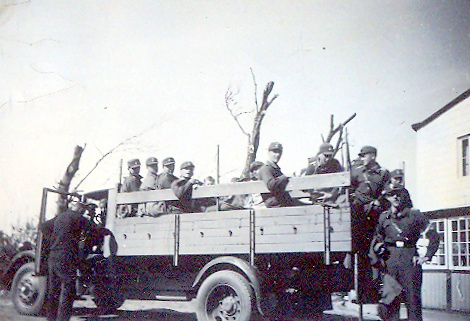
On the way to their recreation home "Vineta"
21 May. Wake at half past 7, load onto a diesel, and the 12th platoon is on its way to Vineta. I want to explain to you briefly what this Vineta is. A resort of the NPEA located immediately on the coast, right on the beach on a small hill. So, that was really something! The last time I saw the sea it was not storming so badly. And here it was completely windless, such an amazing blue that it was almost impossible to make out the horizon.
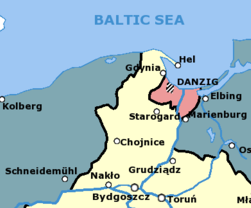 After a short stay we drove on to Kolberg, into the harbor-area, of course. Unfortunately no warships were there, but instead big steamers. As we thus go through the harbor-area a fisherman asks us whether we want to go out to sea with him; of course we immediately assented, and we went on a diesel-powered fishing boat through the harbor, past the jetty and lighthouse onto the open sea. What that meant to us you can certainly imagine.
After a short stay we drove on to Kolberg, into the harbor-area, of course. Unfortunately no warships were there, but instead big steamers. As we thus go through the harbor-area a fisherman asks us whether we want to go out to sea with him; of course we immediately assented, and we went on a diesel-powered fishing boat through the harbor, past the jetty and lighthouse onto the open sea. What that meant to us you can certainly imagine.
Map at right shows where Kolberg is situated relative to the German-Polish border in summer 1939. It's easy to see why the Germans had a righteous cause in demanding a corridor (protected highway). Click for larger map.
The cadets enjoy a chance outing in a fishing boat from Kolberg Harbor; Bibi seated at far right, rear, with Gilbert directly in front of him.
We were without educators and only our chauffeur was there, but he did not want to go along. ( The educators told us that they had to trust us to the extent that we would behave properly and not do anything stupid.) So we went out one hour, on out until the coast became quite small. We were only 18 young men, since most of us were at home on vacation. We were then allowed to sit at the wheel and steer, and into the machine-room, and we eagerly had everything explained to us. When we got back into the harbor again the fisherman told us he would gladly take us along on a 24-hour trip sometime when we wanted. Naturally, we wanted to do it but precious time did not agree. Then we see the city of Kolberg some more and after that we drive back to Vineta. Some very daring ones bathed, but the wind was blowing harder and harder, and the terrible thing about it is that even with the slightest wind my hands turn blue and I have to put on gloves. So the day compensated me and really all of us for many things.
22 May. Classes again.
23 May. English dictation.
24 May. Afternoon swimming and diving in the hall, always a riot! In the afternoon a lecture about the old cadets by the leader of the standby-troops.
25 May. Fencing; afterwards a film-presentation about the German navy by a captain of a frigate. At the same time he was also trying to promote the navy.
26 May. Your letter came of course. Before that we had roll-call by the lockers.
28 May. We had German schoolwork on the theme of sports. Today the first swallows arrived. Now I also want to answer the many questions that you asked me:
Here the graduation test is just as back home, only in April or March. Immediately afterwards, Labor Service (RAD) in Pomerania, which is also called West Siberia. And then it goes to the soldiers.
The main assessment was on Sports, but also on a cozy conference in a small circle with the institution leader and the educators. There I was asked, besides other things, if I would be captured, would I give my word of honor to the enemy not to flee, and if I may break it or not. I told the examinations commission on my word of honor that I would never give that up and would dare any possibility for flight. Then I was done.
On the spinning chair I was given thick-lensed eye-glasses, through which I saw nothing, but through which the physician could always observe my eyes. After spinning, a stopwatch was used to measure how long it took until someone was no longer dizzy, because it was possible to see in each one that his eyes continued twitching for some time in the direction of rotation.
Dad seems to be especially interested in how our outings are regulated. We are allowed in the city Saturday afternoons, and evenings into the moviehouse. Sunday the whole day, except in the evening. Some coffeehouses were recommended to us, but where soldiers are not allowed to go, we too are not allowed (dance halls etc). Whenever we go into the city or, off-duty, outside the campus of the institute, we have to put on our aviator uniforms (with Hitler Youth armbands); on Sunday in dress uniform (long pants and tunic) but they are not all available. No educators go along then.
Previously we had to learn to do the greeting exactly right, but that has now, of course, already passed into the flesh and blood of each of us. I believe, in general, that the workshop is similar to what Dad enjoyed in machine-school. There are no newspapers from Ostmark here, unfortunately, so that I am very thankful to you for the newspaper clippings that you sent me.
I am not the farthest away from home, since there is one in our office who comes from Villach, and in the 11th platoon a young man from Sofia. Also, one has come for testing, a young man, who is a German refugee from Madrid.
Of course, only relatives of educators and relatives of young men from Köslin [Koszalin] were able to participate in the company picnic on Mount Gollen [Góra Chełmska]. That the houses were inadequately decorated is to be ascribed to the dourness of the Pomeranians, who are moved to enthusiasm only with great difficulty and have experienced no period of struggle. The picture that I sent you was made by the young man from Villach from my dormitory. I have only very few photos of the young men.
Our educators have the same qualifications as other high-school teachers; in addition they must be good youth-leaders, and those that lead flying platoons are mostly reserve-officers of the Luftwaffe. The educators have to be with their youths throughout the entire day in the institute, and sleep here too, but their families live in the city.
When it rains here duty usually continues; as soon as there is free time it’s quickly into the library or into the reading room. I am already very happy about working in the shop, but it is only once a week. We are apparently supposed to have one of the best and most experienced workshops in the Reich.
We also have a radio, but we listen very rarely, mostly Sunday.
We see no excursionists other than Hitler Youth groups.
Mom asks why we had confinement to quarters. This is quite simple, since all it takes is for someone to go on the street without a cap or to be seen shopping in the city just once, and then it happens: confinement to quarters for all.
Apart from our parades I was in the city only four times: (1- to get books, 2- at the barbershop, 3- May Day, 4- to send a package). Please, no unnecessary worries if I cannot write for a longer time now, but sometimes there really is not enough time. Aunt Greta wrote from Bruck, from Prommer, but I could not answer.
Today at noon we also received our bottle of milk, and two jam-rolls; then I arrange two more for myself, and then I have something to do the whole afternoon while writing. But you need not worry that I will end up fat; our education in sports and field-training already takes care of that.
I can vividly imagine that so many girls ask about me, although only Dad and Willy can write it.
Willy asks whether we have vacation in the summer. Of course we have summer vacation exactly as back home. So, hopefully all questions are now answered.
On our uniforms:
[1. & 2.] These two uniforms may be worn only while on duty in the institute.
3. Hitler Youth summer duty uniform; short pants.
4. Hitler Youth aviator uniform, long pants, shirt, cap (like Willy) but all light blue-gray.
5. Aviator’s dress uniform – still not ready, 3 pairs of shoes, track-suit, etc.
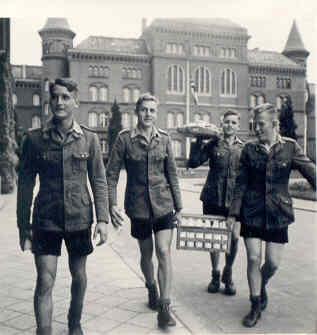
The cadets delivering supplies in their short pants uniforms; Bibi in front on left.
Gilbert let me know that his parents were informed that he received a free spot and so had to pay no tuition. How about us?
Isn’t it possible that you can come here sometime with KDF? I have apparently forgotten my application number at WL; please send it to me; it has to be on all the papers from Munich. My number is, I believe, M/307/40.
Sunday morning we have a big all-day field exercise on Mount Gollen. Then it will be right jolly again. Pentecost is not celebrated here and the vacation that we had during the census (road-construction) now has to be brought in again. One guy called our dormitory a bunker and since then it is officially called Bunker 17, while all the other dormitories are named after famous airmen. Regards ...
Neumühlenkamp: the glider field used by the Napola students for flight training.
10 June 1939: Because I brought home three ticks on 5 June, we went by bus to our glider field, which is 32km away from the institute. It’s called Neumühlenkamp. Now I can also tell Dad how it went for me during my first flight.
On the first day as a beginner I got two takeoffs, in other words two quick hops during which I almost didn’t even leave the ground. It was only an unpleasant rumbling and yet I had almost flipped over during that. I careened immediately with the point into the ground, as if I wanted to drill for oil.
On 6 June right away I got 6 takeoffs; that is an enormously high number for a flight-student. During that I got 10 meters high off the ground. I can’t even describle the feeling that I had the first time I heard the rumble in the machine stop and I floated above the team standing below. It was simply amazing. Also Gilbert got 7 takeoffs, but he overturned the machine once; he slid off to the right and crashed from about 12 meters. Of course nothing happened to him; the machine seemed to be okay too.
Then I came for takeoff immediately after him, and as I got underway I noticed that the whole seat-back was missing. And yet this was my first faultless flight. Then I was no longer strapped to the back wall but the back wall to me. The flight-instructor told me that the flight was very nice. But then I was overconfident and landed in a creek twice. The first time I lucked out and I remained dry. But during the second landing the yaw-rudders were stuck in the water and it splashed up under the pilot’s seat.
In the creek!
Then on 7 June, no longer were we all allowed to take-off; instead the flight instructor chose the six best from the previous day and I was among them. Now we had to go down from a higher hill in a fairly strong wind. And now I made 6 smooth landings one after another. The flight-instructor wanted to train us as much as possible and had the other two excluded. On this day, Gilbert got only one easy take-off. Thus, in the end, only four young men were still flying.
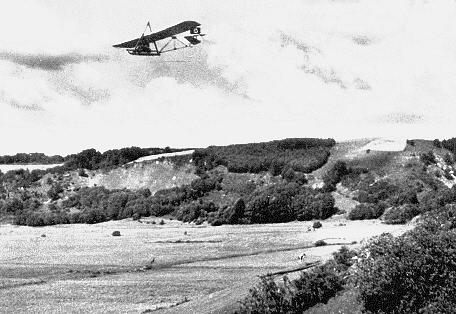
Gliding down from a higher hill for a smooth landing.
In the evening we were notified that out of the 650 beginning students, one young man had made 4 qualification-flights; two young men had made 3 qualification-flights; and then a couple with 2 and 1 qualification-flights. I am one with the 3 qualification-flights. In other words, I must make 2 qualification-flights then I am allowed to make my AS-flight and with that the A-test. Of course, I was very pleased.
In these short flights I was never able to observe the surroundings. Only once have I seen the team from the plane. I can’t even remember ever seeing anything. Afterwards I only know every movement of the joystick and the yaw-rudder. I certainly know to the smallest detail which hand-movements I had made. That certainly has to be the case only in the most serious flights where one concentrates so much that one has no eyes for the surroundings.
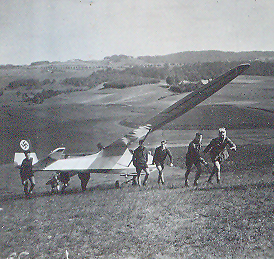
The sailplane "Grunau Baby" is hauled using muscle-power to the launch site on the crest of the hill.
But the labor that gliding requires, one imagines it to be too easy. Twenty men must labor without limit most of the time so that one man can fly (take-off team with rubber strap, stop team to bring the plane up, to haul the rubber strap back to the mountain); it’s not at all easy. And we were all dead tired when we crawled into bed around 8 o’clock in the evening. Six o’clock in the morning was reveille; then we bathed in a nearby lake, and then flew until the evening. Meanwhile it was very hot and we have become brown like American Indians.
On the 7th in the evening we went home again. So now we are going every two weeks for a couple of days to the airfield, then one and a half weeks of instruction again, and so on. Thus 19-21st June we have flight-duty. 15th to 31st July motor-sport school at Tramburg. Then vacation until 1st September.
Now I don’t know what I am supposed to be doing.
1. The army would pay for the trip home from Tramburg to Leoben. Consequently the trip home would cost me nothing.
Or
2. During vacation I am going to the Agricultural Service (Landdienst), because people are sent there.
I am asking you to write to me what I should do, since our platoon-leader already informed us that the trip home from Tramburg was requested.
Meanwhile I was handed over from Munich to Berlin and received the processing number 1373. I am not pleased about that.
Recently, we again received a whole package of name-tags and laundry-labels, which now have to be stitched to all pieces of clothing. I have been working on it two days already and always when I believe that I have finished there is yet another piece.
Enclosed I am sending along a couple of pictures. One from the road-construction (the man in the bootcut trousers is the director of our institute); the other is our trip to Kolberg.
11 June 1939: I just read in the Völkischer Beobachter that the civil defense organization (Technische Nothilfe) by a law of the Reich became state auxiliary police. Then I will probably have to write to Herr Hipo Wenger. [Leopold Wenger Sr. is a member of that organization in Leoben -cy] Today most went to the sea, but I have to learn the traffic-signs for the driving test because I have no experience there. Please send me right away a (certified) copy of my baptismal certificate, which I have to send to Berlin. Also ask about the blue waiver; I need it for my flight-book.
18 June 1939: Is Mom driving to Gleichenberg during the vacation? And is Willy coming to Salvore? When does vacation actually begin for Willy? Tomorrow we have the end of school, then there’s flying. This week the 1st and 2nd Hundreds are going to Carinthia for maneuvers. Some platoons will travel over Leoben; perhaps you will see something of that. The big maneuvers take place at Villach.
Rositten 29 June 1939: I was able for the first time while dragging the glider up the hill to observe the surroundings, and then I also saw for the first time the giant elk as they strolled out from a small patch of woods. It was great!
Whether I will be able to come home is doubtful, because it is uncertain whether the cost of the trip will be covered for us. There is flying tomorrow at 7am; consequently we have to be asleep already around 9 o’clock. Most of the young men already go to sleep around 8 o’clock. So regards now and kisses as well to Gretel, Gerhard Adolf, and Willy.
Category
Germany, Leopold Wenger, National SocialismLeopold Wenger's final letters from Napola-Köslin, July-November 1939
- 5062 reads
On Sept. 26, 1939, Leopold's group of soon-to-be-graduates pose with their educator Ltn. Geissler who, like others, had been drafted for military service. Younger educators arrived to take their place. Leopold is 2nd from the left in the second row.
These letters from July to November 1939 are the last ones written from the NPEA (Napola) school in Köslin, Pomerania (Northeast Germany). The young men's schooling ended a bit early; if their grades and demeanor warranted, they were granted what Americans would call the High School diploma and were inducted into the Luftwaffe as officer volunteers in training (cadets). They still had to complete the A, B and C flight training in order to earn their basic pilot's license.
copyright 2013 Wilhelm Wenger and Carolyn Yeager
Translated from the German by Markus
July 1939: Yesterday, we had theoretical lessons followed by a test. I passed my theoretical A-exam. Because we will probably go back to Köslin tomorrow [from flight training in Rossiten -cy], we have our goodbye evening today with the other flight students and flight instructors. We will probably receive our A-certificate and badges.
I'll answer dad's question now. Gilbert and I were in Köslin for the military physical. We were checked for aviator suitability before, but everyone has to go through the aptitude test and is then assigned to an armed service branch (Air Service, Flak, Weather Company, Aviation Spotter, Av. Intelligence, Av. Sciences, Av. Engineer, etc.) In the end, everyone arrives at the branch of the Luftwaffe for which he best qualifies.
Motorsports school in Dramburg, July 15-31, 1939.
All of the 120 young men of the Aviator group of a hundred were divided into subgroups. Some stayed in Köslin (including Gilbert), others went to Hornberg in Swabia, others to Dramburg (Motorsports-School), others to Neumühlenkamp in Pomerania, and we went to Rositten [home of the "Deutsche Forschungsanstalt für Segelflug (DFS) -, the German Research Society for Gliding. We are 23 young men. I'm one of them and the only Southern-German. Most already had passed the A-exam and continued right away with the B.
An engine towing winch works as follows: A specifically designed car is set; in front of the wheels, break pads are tucked and one rear wheel is dismounted and a coil with wound-up wire rope is mounted on. The wire rope is then construed to a glider one kilometer away and hooked up at the beak of the machine. Upon certain wave signals, the engine of the car is started, as if you would get ready to drive, and the wire rope is being rolled up at 50-80 km/h speed (towing only in the second gear). Thereby, the glider gets into motion and rises relatively steeply. At a certain height (ca. 120 meters), the pilot has to bring the machine into its normal position and unhook the wire rope. This most difficult part is done and the actual gliding begins. I was towed for approximately 250 meters, and after unhooking, I flew about 400-500 meters.
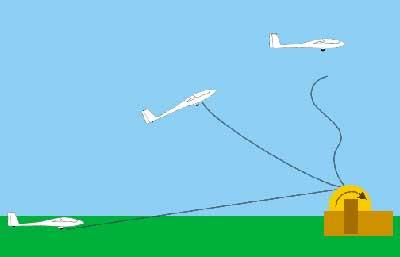
Above & below: The winch launch is the cheapest and most common form of launch. Winch launching involves hooking the glider to a long cable; this cable is wound in by a powerful engine at the opposite end of the field, pulling the glider into the air. Once the glider is airborne, the cable is released allowing the glider to fly away.
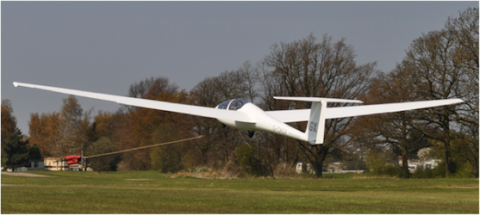
The B-pilots, who are already advanced in flying, may do a traffic circuit. There is always high traffic at the airport. Two motor winches drag and [also] one tow airplane. There are often two to four airplanes in the air at the same time. And then, every other moment, NSFK [Nationalsozialistisches Fliegerkorps] leaders land in their machines.
In the very beginning, a young man uncoupled too early at 5 meters high. His machine turned upside down and bore into the ground. Everything was destroyed but the pilot remained unharmed. It was horrible. Later, I saw another plane crash. That time they had to transport the flight student to a hospital in Königsberg.
A local doctor flew with our NPEA-group. When he passed the A-exam, he donated a barrel of airman-beer. That is another of the alcohol-free stuff that looks like beer. It foams a lot but tastes like, I don't know – but everyone was delighted by it. Well, country-service is such a thing, after all. [Service of one's own free will, not a duty -cy]
It is not mandatory and not necessarily recommended, but I figured the trip home would be expensive, at least RM 30 – and if passing through Prague is now possible, that I don't know. Our vacation off-time is about at the same time for all of us. We just have to go to Köslin and get everything done. After that, the institution would be inaccessible throughout the vacation until September.
14 September 1939:
Because of your application to the receiving office 1, Berlin, you can expect to be drafted as a volunteer to the Luftwaffe on December 1st, 1939 (applicant for officer's career). You will be sent a conscription order, thereover.
Upon the decree of the Reich-Minister of Science, those students who completed at least 6 months of 8th grade in a higher learning institution receive the certificate of eligibility for university entrance without special examination if their conduct and performance justifies awarding the certificate, and if they present an acceptance slip or induction order as volunteer to the Wehrmacht at their schools. They are called, upon delivery of the certificate by the school administration, immediately after receiving the induction order.
Promotion to officer ensues now only after previous probation in a front unit during war. Later takeover of up-and-coming war officers into the active, reserve or Landwehr officer corps is decided after the conclusion of the war by the commander-in-chief of the Luftwaffe.
Well, I can expect my induction order in December, but hopefully earlier. All arrangements for the war-matriculation are being made. The educators reckon four weeks. Next week, we are having flight service for the entire week in Neumühlenkamp. Many educators are absent; therefore, we have new young ones. Our institution is still partly occupied. Right next to us is a big sickbay. The red cross is publicly displayed.
The same educator, Geissler, says goodbye as his students flock around him, wishing him well. In two months time, the young men are all soldiers too. That is Bibi at the upper right.
Other than that, only a few things have changed here. We sense the food is somewhat different than before. Our bunker even has a phone connection to next door. The educators reason with us. They say, they can understand if we were not in the mood to learn right now, but some things had to be taught to us.
I will also send the film home, for I don't want to develop the film here. I also have to write my statement. You have to hand over my ration card for food and must not use it for me. Please don't send on the notebooks which I put on Willy's desk. That's all that I know to report today. There are probably a lot of other changes going to happen in the next few days. I couldn't say good-bye to little Gerhard and Schwesterchen (little sister), but I am doing it in this way. Greetings Bibi
“Chamberlain, oh Chamberlain. How your England will decline!”
Someone wrote that on the board. We all share the same opinion. I am so unfathomably angry about these damned gentlemen. And now the megalomanic Yugoslavians are becoming cheeky. Well, they are right on time, they couldn't wait long. Unfortunately, it is so cold here already. That's it. Hearty Greetings. Bibi
9 November 1939: Today, we got the news about the [attempted] assassination of the Führer in Munich. We are so outraged about this infamy. The people in town are ranting so much! We will hear the Führer speak tonight. I am very excited. I have been to town a couple times today—because we are dismissed already, without furlough. It's a very unusual feeling when you see others going to class while having already graduated. So, I achieved my first partial goal for which I have been working for twelve years. I can't really express how happy I am that I have the certificate. It wasn't easy because there is some difference between the common secondary school and our institution.
I am confronted with a problem at this point; that is my departure from here! I will probably leave on Tuesday the 14th in the morning to Berlin and then further on Wednesday morning. I obtained ration coupons (travel coupons) for a week.
"Bibi" and some of his roommates relaxing in their bunker while still students, before the reality of war broke into their lives.
The film has been developed and prints have been made. My pictures are gradually becoming better, therefore, I will send them to you. One more thing: Please bring my HJ-ID card to the Bann [a Hitler-Jugend jurisdictional office], it will be required for the transfer from Köslin. I am taking my notebooks and books, my magazines "Adler" (Eagle), to Oschatz in the meantime. From there, I would either send them home altogether or simply bring them, once I am going to go home. I am looking forward to the day when I show up at home as a soldier for the first time.
I have told you enough for now and would like to know more about your stories. Mom wrote that Gerhard could already stand. He must be walking by now. Is little Bonzo also going to be like little Krot had been? [Teasing names for baby Gerhard and sister Gretl] I can't imagine Gerhard with a bald head when he had such dark hair before. What is our wicked Weibi doing? She will soon be able to go for a walk with her little brother.
And how is Willy doing in school? He must take care to keep up with the tasks from the beginning on because when one is the representative it is doubly difficult, as far as I know. And he should go to the dentist; it is just a matter of overcoming. How is Dad and his business? Are there still enough workers? How is TN-Service [Technical Emergency volunteers]? Have you seen the film on the Polish Campaign yet? It ought to be very good! How are Mom's hands? It has been a lot of trouble. Will diaper washing end soon?
Finally, many greetings and kisses to you all, Weibi, Gerhard and Willy. Yours Bibi
11 November 1939: We will probably get the results in 14 days. For almost 4 weeks, we had no English lessons whatsoever. The other lessons with two platoons together—sixty men in one class for there are so few educators. Furthermore, one day per week is now off. Yesterday, there were a few officers and leaders of the Reichs-Aviation Ministry here. So, coming home is scrubbed. I will remain in Oschatz [air base in Saxony] for a month, and then spend seven months at an aviation flight school. Hence, I am satisfied for now. One educator was also in Oschatz in garrison.
We are already counting the days to get out of here. I have got a number of rings and counters, and every day one ring is deleted. Today, there are only 47 left and everywhere is the slogan to be seen (also in the classroom) “It sounds like a saga, only 47 days left.” By the way, what is up with Temmel and Müller? They surely have to enlist on December 1st, no?
Greetings and kisses to you all, Schwesterl and Brüder, from Bibi
"Bibi" at shooting practice during his time at Napola-Köslin.
This concludes the letters from Napola. Coming next will be Leopold Wenger's letters from Ochatz and aviation flight school, that he mentions here.
Category
Germany, Leopold Wenger, National Socialism, World War IIWartime Service
- 4531 reads
Leopold Wenger's letters from flight training in Ochatz and Pilsen: 1939-40
- 5854 reads
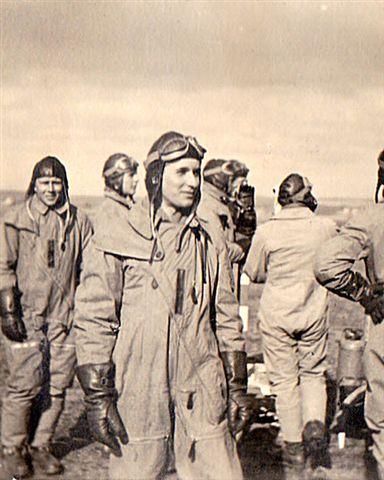
'Bibi' Wenger enters the Luftwaffe flight service training and drops the Bibi to become 'Poldi from now on.
copyright 2013 Wilhelm Wenger and Carolyn Yeager
Translated from the German by David Coyle
Oschatz, November 18th and 26th 1939: On Wednesday November 15th I set out from Berlin and was at the airport by noon. I’ve swapped Pomerania for Saxony as my new residence. Our accommodations are set in the woods, very nicely surrounded by the pines. We are five to a room, an agreeable number, and we have parquet flooring. None of us recruits is older than twenty-one.
Gilbert Geisendorfer learned of his success in his school finals at the very last moment in an inspection. At first it seemed his schooling was done, but that turned out to be deceptive for there is always more to learn, although of different sorts of things. During this time all the other soldiers and I have learnt a great deal in new areas. Naturally no one is flying yet. I’m doing well for cash: we’re on wartime pay like all soldiers and get 1 RM per day.
The recruits at Oschatz, 1939 (looks like 'Poldi in front on left -click to enlarge)
December 2nd 1939: We have been given the dates for our first leave. Christmas is out. This is the first Christmas I will celebrate far from home and family. But we've been promised that unless there is some unforeseen problem we will be on leave from December 29th until January 6th. No complaints, we recruits must be happy and thankful that we get any leave at all. Our fares will be paid.
We’ve put up Christmas wreaths in all the rooms and even in the corridor, so the barrack has taken on a festive look. We have now spent half of our conscript training period here on base, which naturally leaves us out of sorts. Tomorrow we'll be allowed off base for the first time. I’m not tempted and will likely stay at home, for I like it much better on the airfield than in the town, which is almost an hour away by foot.
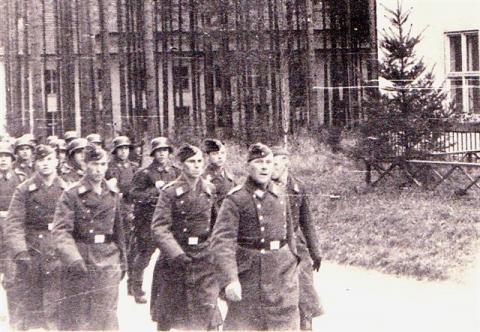 Marching the recruits at Oschatz, 1939
Marching the recruits at Oschatz, 1939
On Thursday the whole company saw Franz Lehar’s operetta Der Zarewitsch. We liked it very much and found it a pleasant surprise. At one point our group leader arranged an evening party for us in the canteen. Of course, I don’t much care for these evenings of chat and beer guzzling, but you mustn’t isolate yourself. Besides our NCO is a sensible man, and the other groups can really envy us. An example: I was issued a brand-new topcoat, which one of the instructors tried to force me to trade for an older one; our NCO heard about it, and I kept my new coat. We all find him agreeable. About the locals: These Saxons! What a people! I like the Prussians much more, but men are creatures of habit.
My room-mates consist of another two officer cadets, a cabinet maker, a baker and a locksmith. A few days ago we officer cadets started wearing red stripes on our epaulettes, so we must be careful to put on a good show. I like our living quarters very much, except for the horrible amount of smoking. This is something I shall never get used to for it nauseates me at once.
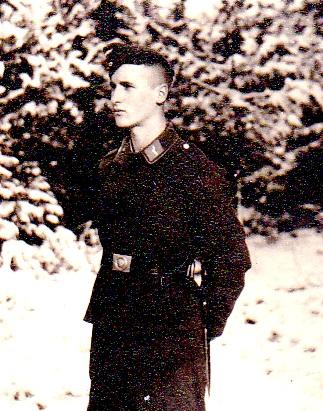
Leopold in full dress as cadet pilot in 1939, Oschatz
December 9th 1939: Right, so I’ll be home on the 29th. Until then we shall be following a tough routine with no time for the celebrations. Besides, in these parts we shall be having recruit inspections over Christmas, and so there are daily preparations. My old classmates from Leoben sent me a card. It's hard to imagine being back at school again, and I don’t envy them. Here we have a fine life, even though the pace is “quick step” from morning to night.
Tomorrow we are again allowed out until 11 pm, and perhaps I will overcome my disinclination and go into town. Of course I'd much rather have my Sunday rest to sleep myself out. There is a big Christmas celebration planned for the company, but I think that if there is to be beer without limit it could turn out to be a booze-up.
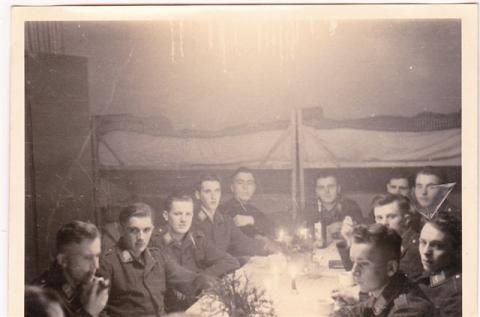
Special Christmas party set up in the barrack - those definitely look like bunks in the background. We see 'Poldi 4th back on the left.
December 20th 1939: Now my recruit training time is done. On Monday we had our recruit inspection and it turned out very well. We are all happy that it is over and done with. Now we are having a quiet time of it, and it is such a strange feeling, as if every day were Sunday. Aunt Leni sent a Christmas package from Pernegg, and Grandmother sent a packet with apples from Gleichenberg. In addition the company made a fine Christmas celebration in which every soldier got apples, nuts, and cigarettes as well as a great Christmas stollen [a bread-like fruitcake]. And so my locker is as stuffed full as a hamster’s storeroom. I also have had my first trip off base, which was only good for more saluting than on the airfield.
We were all deeply shaken by the fate of our battleship “Admiral Spee”. This was certainly no minor loss for the navy. Here the candles burn every evening on the Christmas wreaths, and increase the anticipation for the holiday. I hope there is plenty of snow at home. In any event Willy should keep himself ready for ski outings. I am very glad that I can at least get home for the New Year. I am also very curious to find out what my little brother Gerhard looks like.
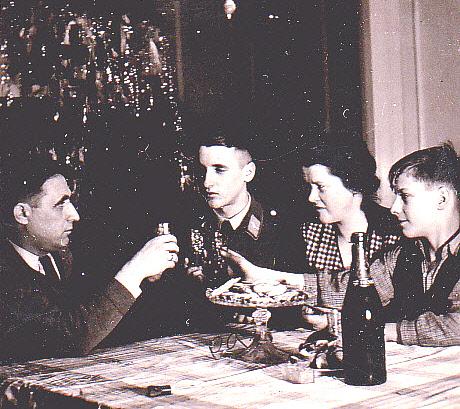
Poldi is home on leave for the New Year Holiday. The nation is at war; the faces of Dad and Mom show their concern as they toast the new year, along with younger brother Willy.
At the Pilsen Pilot School
Yesterday, January 21st 1940, I was the first to arrive in our room at about 8 pm. The last occupant arrived at noon today. The train was well heated and I got some good sleep. The barrack was much less pleasant . . . during the thaw, water had got through and some of the beds, chairs and flooring were covered with ice. Luckily, my bed was better positioned and spared. I turned up the heat at once and things improved before the first of my new roommates trundled in after midnight, one of them with a radio.
February 8th 1940: We have had a hard freeze and quite a bit of snow. But yesterday there was a sudden thaw. The miseries changed correspondingly: earlier feet were cold, now they’re wet. Today it was into the flight suit and furlined boots for the first takeoff, and then straight up. This is quite a different thing to flying a glider; now I’ve got to know Pilsen and surroundings from the air. It’s funny how small people and houses appear, almost like toys, quite unreal. I found it especially difficult to locate myself on the map, but it’s supposed to be hard in winter. I hope the weather stays as good as today for a long time; there’s no takeoff in bad weather. From 6,000 down to 1,000 meters you have such a wonderful, unobstructed view; couldn’t be bettered from any mountain-top. The first flight was in a Stieglitz FW44 and lasted 21 minutes; the second was in a Heinkel He 72.
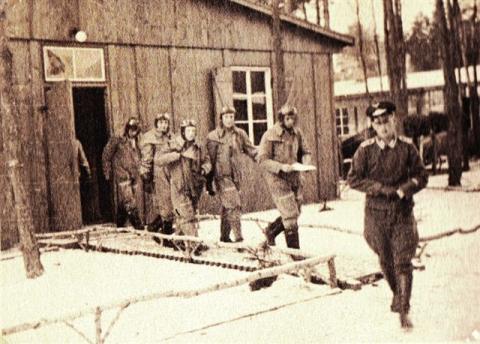
Kicking off the first flight service
February 13th 1940: There’s a mass of news from home. More than anything else, I’m glad our boys from the west front will be spending their leave in the Untersteiermark [Styria] . . . I don’t know what I would give to be able to help. There’s not much to report here. The wonderful thaw stopped as suddenly as it started, and has turned to a shitty cold with slick ice everywhere under a dusting of snow. You cannot imagine the cold when flying; you must take care not to land with frostbitten cheeks or nose. By now I’ve been in the air quite a bit, and also been thoroughly bounced about. Every day must be used for training, so now even Sundays must be spent on the base while there is good weather. But we do as we please off-duty, so tomorrow I hope to visit the cinema. “D III 88” is playing. [A German film about pilots-in-training with a dramatic plot -cy]
There’s a story to tell about the canteen, for although our pay has gone up we also spend significantly more. Sadly, in this canteen there is everything to tempt a soldier’s heart, and we go past it every lunchtime—there’s beer, milk, spirits, eggs, sausage, etc. When I think how little milk you get at home, while there’s no limit for us here, I can only shake my head.
I hear that the school finals will everywhere now be held in February, which surely means the school year will also end early: Willy must make sure to finish in good order. The next time I get home on leave I hope my little sister will be less skinny, and Gerhard will be able to run to greet me.
Pilsen February 18th 1940: Yesterday afternoon we had fine weather, and I went up six times. Willy seems to think I’m flying a Ju 52. Quite the contrary: I’m flying a little two-seater biplane.
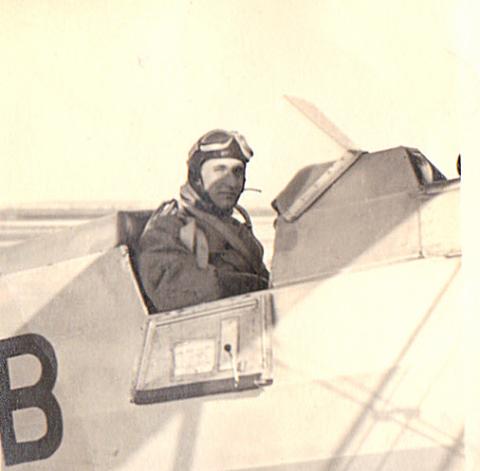
Poldi on his first take-off in a Stieglitz FW 44
Apparently a cold wave has descended on the entire country. Sometimes, the temperature is only -20º in the mornings. In spite of the fur-lined boots I have chilblains on both feet, which is not much fun. But we have been issued thick pullovers and warm scarves against the cold, and so far there are no cases of hypothermia.
Odds and ends: We have now also been issued walking-out dress and flat caps, though I prefer my old uniform. My thanks to Willy for the Condorlied, but as we sing it a couple of times almost every day I already knew it fairly well. I saw the film "D III 88" that Willy likes so much.
Heise [the friend from the Napola Köslin] is now stationed in Potsdam. I learnt from him that our Latin master at Köslin, Lieutenant Adam, has died on the Western front. I don’t know at all where Gilbert Geisendorfer is located. Neumitz from Steyer is in Mähren, and is also flying regularly.
I had to break off this letter as we still had flight duty this afternoon. I made five more take-offs. Visibility was poor today with considerable ground mist. It just now occurs to me: we will probably be able to choose whether to take our leave at Easter or Pentecost. If so, I'll choose Pentecost, I think that would be best.
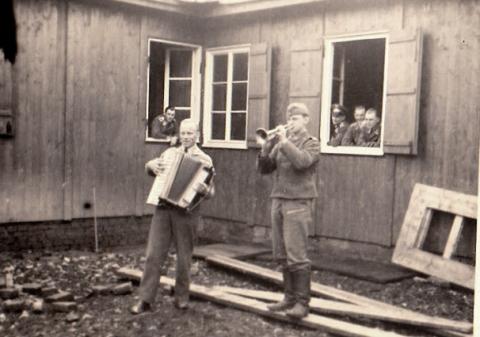
At Pilsen, soldier-musicians entertain the living quarters
Pilsen, March 3rd 1940: On Luftwaffe Day we were off-duty in the afternoon, so I was able to get into town fairly early. I took the opportunity to shop for some items that are becoming scarce. Just about everything is available here, naturally not everyone has this chance, so please write and tell me what what you might need. For example, shoes, socks, shirts, yarn, etc. I’ll send the whole lot home as soon as the customs barrier is lifted. For myself, I picked up a flying shirt, socks, darning yarn and handkerchiefs; we had just got our pay. So write as soon as you can, so that I have time to get everything.
The weather here is now first rate and the snow almost gone, so that we can hope to put in a really good amount of flight duty. I flew eight times yesterday, and today we have our first free Sunday. A rumour is going the rounds that we shall be posted to another station. Well, well! We shall see.
Now to quickly answer Willy’s questions. Whether I also control all motion of the joystick? Willy will be excited to hear that we hope to be making our first solo flights by the end of the month. How many times I have flown? A huge number of times. And our flight suits are not heated. I hope that satisfies him.
Pilsen March 18th 1940: Last week I was on sentry duty Thursday and Friday, on exactly the day when there was a great parade of the troops through Pilsen celebrating the anniversary of our occupation. I was only able to see the fly-past in the distance. The weather was wonderful, yes so wonderful that the field thawed completely and men and machines were stuck fast in the muck. But now it has snowed again. It makes you sick. We were already celebrating the end of this rotten weather.
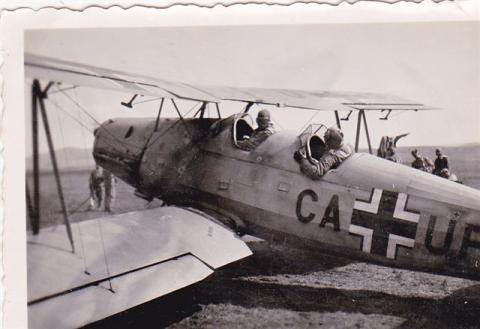
An early morning start in an AR 66. This shows the student pilot seat behind the instructor's seat.
Father asked if I was flying solo yet. This is the way it is—on the first flights the instructor sits in the front observer’s seat and we students sit behind him in the pilot’s seat. For some time now, I believe I can say that it’s quite as if I were flying solo. If the weather were only halfway decent, and the field a bit drier, then there would not be much missing to feel as an independant “lord of the skies.”
When my instructor wanted me to practice dealing with dangerous conditions, I flew above the clouds for the first time—we flew around, over and through the towers of cloud. That was quite undescribably beautiful, and we were also quite high. And then, pactice for emergency landing, a crazy business. The instructor cuts off the fuel and shouts, “Emergency landing!” At about 1,000 feet one must already have one’s eye on a likely surface. You come down any way you can, and get aligned for a landing. But as soon as the wheels touch the ground, the fuel is switched on, and up you go again. And this is repeated somewhere else from the beginning. Of course, the funniest thing is to catch a couple of people in a field, and then watch them tearing away from the machine roaring down at them.
You can see what fun we have at our work. Yesterday, Sunday, was Armed Forces Day. The local German population were allowed onto part of the airfield, and a couple of the instructors did some low altitude stunt flying. One of the hangers was cleared out and turned into a sort of beer pavilion. You are quite right, our machines are open crates, with just our heads peeping out. Willy would never see a thing without a couple of pillows packed under his parachute.
Pilsen, March 26th 1940: Easter is past, it was quite lovely. Of course I was lumbered with sentry duty on Good Friday and the following day as well, but on the Monday we took a very early bus to Karlstein, and from there on to Prague. Our Lieutenant treated us to this wonderful trip, and acted as our guide. First we looked over the Karlstein castle, the old repository of the Reich insignia. We also took our luncheon there and then went on to Prague, where we were given a fact-filled guided tour of the city. Partly by motor, and partly on foot we were led through the historic sites. We were in Hradschin in the coronation chambers under the care of the Reichsprotektor. Through the window of the Fenstersturz ["Defenestration" - Also see here], we gazed at a marvellous panorama of the city. Next we were in Wallenstein’s palace.
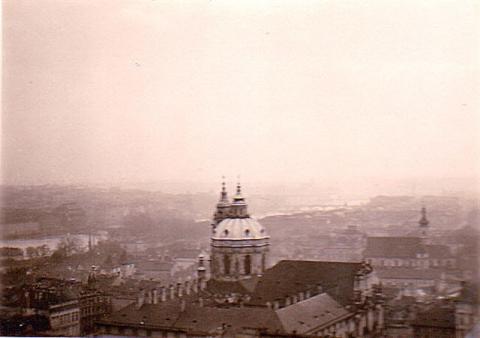
"Looking through the window of the Fenstersturz we gazed at a marvellous panorama of the city."
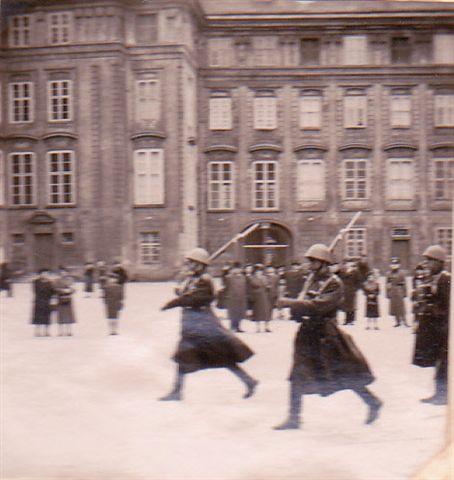
And watched the Czech Guards at the Hradschin (Hradcany) - Prague Castle
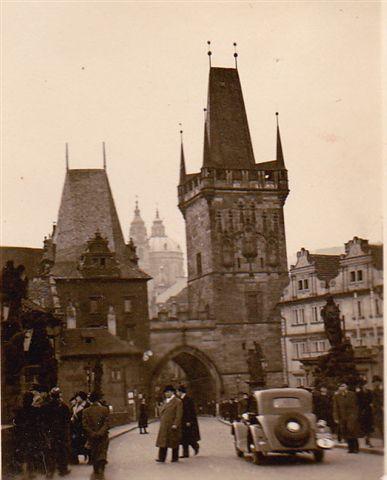
'Poldi took pictures at the famous Charles Bridge in Prague
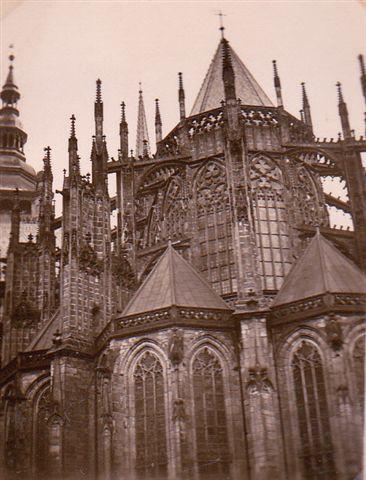
and the St. Veits-Dom (Cathedral)
We had seen so much that we could scarcely retain it all. In the evening we still had two hours to spare, so we settled into a cafe in Wenzelplatz and looked out at the lively bustle in the streets. One would never see such a commotion in the streets of Pilsen. We returned to Pilsen during the night
The trip was a complete success for what I believe was our lieutenant’s plan, namely, as they say, to expand our artistic and historical horizons. For all of us, it was especially beautiful. In addition we were also given a holiday package: two cigars, 20 cigarettes, and two pounds of apples. They could have passed me over for the smoking supplies, but smokers among us were very pleased.
Pilsen, April 3rd 1940: Today was a very special day for me. After three weeks the weather was finally good enough for flying, and on top of that I was able to make my first solo flight. My dear Parents, I think it may entertain you and Willy to know how it turned out for me and how I felt.
Well, everything went quite quickly. First two flights with my flight instructor, then one with the instructor for the group, and then the front seat was empty. There were two little red flags marking the machine as containing someone “dangerous,” and warning all other machines in the air to keep their distance. At last I had the signal to start, and off I went at full throttle. Through it all I was not excited or unsure in the least: it was simply a repetition of the hand movements I had practiced so often, and for the rest I relied entirely on the feel of the plane. All through the flight I could feel the effect of the reduced weight it was carrying – all on it’s own the machine climbed up and away, and so I flew over Pilsen’s suburbs. And then came the landing. I had surely practiced enough, what could go wrong?
When I rolled back to the starting line, the flight instructor was the first to come and congratulate me, and then came all the others, all of them one after the other. With us, the first solo flight is a great occasion. Two others managed their first solo flights today so that this evening everyone is in great spirits. Altogether I was up five times solo.
So that’s the latest news. I’m sure you’ll share my pleasure over this first successfully completed test. I hope the good weather holds for a few more days so that we can thoroughly exploit this happy time. According to what we have been told, we may be reposted as early as next week, but so far nothing is certain.
The customs barrier into the Reich has still not been lifted. A request for Willy: could he kindly dig up Gilbert’s address for me? Willy flatters me when he asks if I am already a lance corporal. I’m afraid we will have to wait just a little bit longer.
To be continued -
Category
Germany, Leopold Wenger, World War IILeopold Wenger's letters from training to active duty in France: April-December 1940
- 3527 reads
copyright 2013 Wilhelm Wenger and Carolyn Yeager
Translated from the German by David Coyle
Continued from "Letters - flight training 1939-40"
Pilsen, April 12 1940: We are in for a change again, and it starts tomorrow. The bags are already packed; we are to spend two months entirely on our own at a camp in the Böhmerwald [Bohemian Forest]. It is supposed to be first rate living there, and we are already celebrating. For the pilot's license, I must train for at least another six months; the first solo flight is only the beginning. In the overland training I intend to cover long distances, as a sort of survey of Germany. But this is still a couple of months away, for we must still learn a great deal about navigation, and without navigation there is no flying. Most failures do not come from a lack of flying skills, but rather from inadequate ability in navigation, and with that everything stops at once. Really Willy, how are things? I am surprised that he didn't join the Flier-HJ if he was able to.
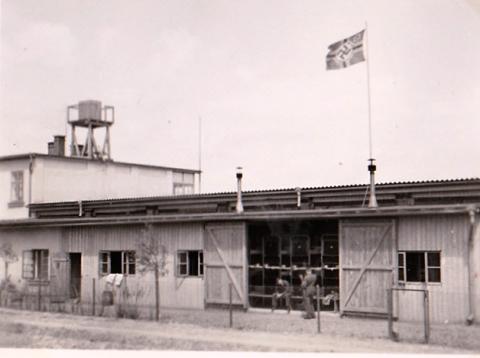
"Our Klattau cottage"
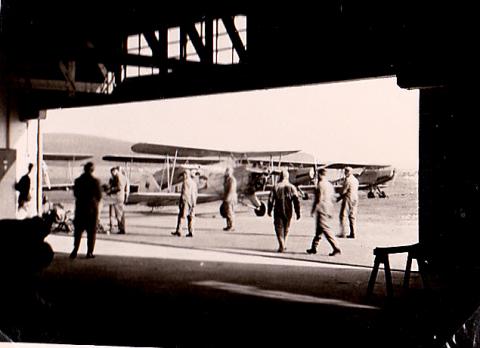
Early morning just before start of service - Klattau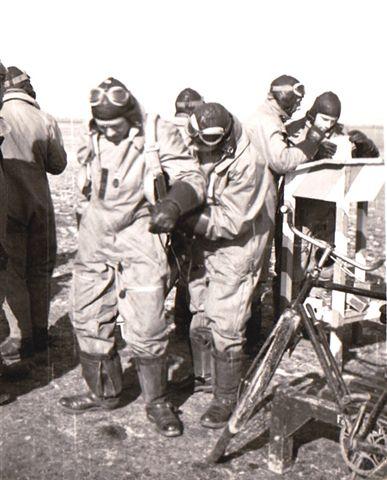
Adjusting the parachutes
Klattau, April 17 1940: We've had half a week here in Klattau, and I like it even if everything is fairly primitive. We are located about 7 km outside the city. There is only our group and a few people from technical personnel. Here, drill is greatly reduced, while duty periods are very tough. But here flying takes first place, which is quite to our taste. We get our post daily from Pilsen by a postal airplane. Yesterday was taken up with solo target landings from 2200 feet with the engine switched off. That was great fun.
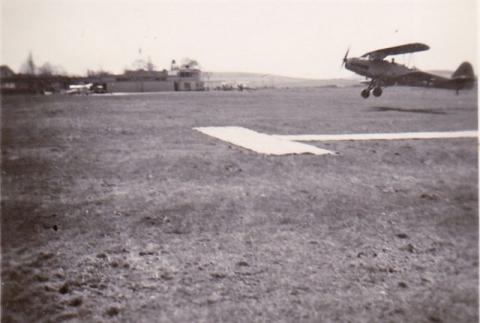
Practicing target landings
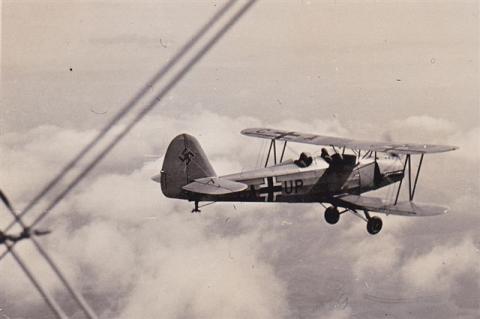
High altitude flying "above the clouds" in a Go 145
Klattau, April 25 1940: I haven't written for a long time, but that comes from the fact that for the last while we've had continual flight duty from 6 am until 8 pm. In addition, I've had sentry duty, and on the 20th an inoculation which left me shivering with a bad fever.
On the 21st I finally made my high altitude flight. One and a half hours at 6,300 feet above ground level. I used the opportunity to fly over Pilsen and the Böhmerwald, until the time was up.
On the 23rd we visited a village Neumarkt in our own special way, which is to say we made a rough landing on a village meadow, which made a sensation all about. The schools were closed, and so all the town children came running. The people were pressing so much against the airplane that we had to bring in border guards to control them. For us it was a treat to see German civilians again, for the people in Klatttau [Czechs -cy] are especially horrible and loutish to the soldiers.
We have now completed the first part of our training, Class A, and have already started training on the heavier B machines. Today I shall make an overland flight in a machine of this sort. [Overland refers to landing in a different location than you started from -cy] Navigation in the Protectorate of Böhmen and Mähren [Bohemia and Moravia] is difficult because there are no distinctive lines or locations.
You already know that I am promoted to lance corporal, retroactive to April 6th. The theoretical A2 examination now awaits; there is a lot to learn, and the load is especially heavy because we are on duty until dusk and have no electric lighting. We shan't be here much longer; after the flying skills, which we've already begun, we go back to Pilsen.
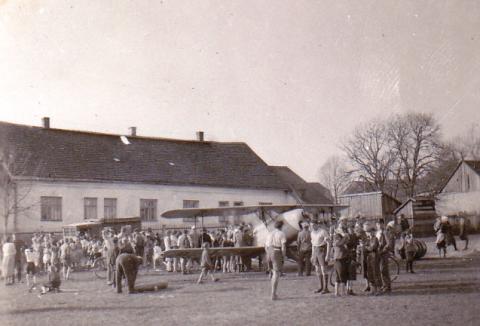
"We visited a village Neumarkt in our own special way ... all the town children came running."
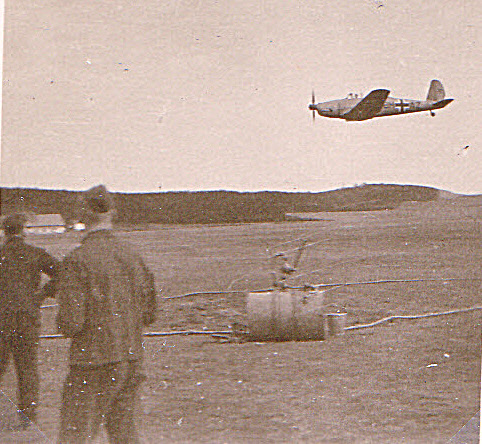
"We have already started training on the heavier B machines." Here the Ar 96.
Klattau, May 4 1940: It is of course hard for one of my old leaders who is still in Leoben. The most important man is Marek. Willy knows him. At the time, he led the illegal Hitler Jugend in Leoben. He also presented the first confirmation that HJ musters were held at our house.
It had been raining for the last few days which naturally means no flying; in its place we drilled like demons. But we didn't let it get us down, and looked forward to flight duty all the more.
We are currently training for solo flight skills. I really storm up into the air. Most people always enjoy this: spins, looping, sudden turns, etc. at 5000 feet in a Bücher-Jungmann. Formation flying with the heavy machines is less fun; one must be so careful to maintain formation that it is impossible to take in the scenery.
Next week our theoretical examinations are due, and so far we have had no time to study. I doubt that anyone has ever been trained as quickly as we have been trained. Until now the B 2 training took an entire year, and even then one was still far from flying a Ju 52 ... that was something for a C school.
I have still not flown an enclosed plane.
My chilblains are quite cured, but the skin has all of a sudden started scaling on my ears leaving sores. It must be the result of some mild frostbite.
In a recent comic event, I was flying an Ar 66 at speed, and wanted to hand-adjust the rear-view mirror on the upper wing. I reached up from the pilot's seat without thinking about the slipstream, which was so strong that my hand was struck backwards instantly. I have learnt to be more careful.
Gilbert has written that he is also flying solo.
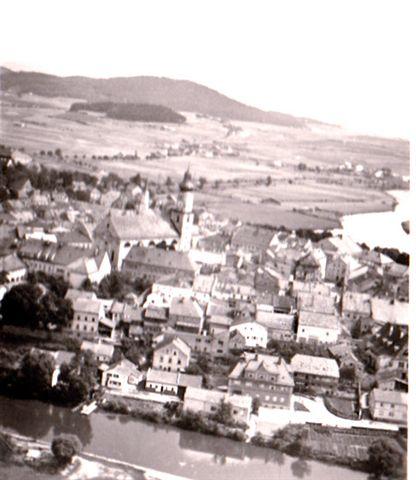
Poldi took this picture while flying an Fw 58 over Klattau.
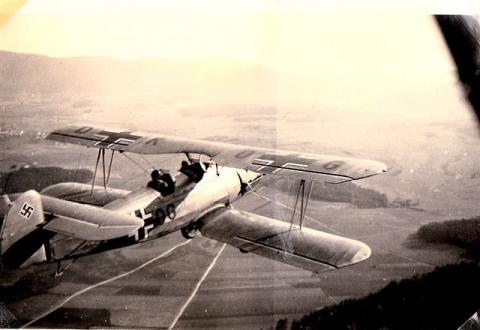
Klattau flight training
Pilsen, May 24 1940: Another week has gone by since we returned to Pilsen. It is so lovely here that our airfield is hardly recognizable. Must also say that our beautiful 1-A flying days at Klattau are also past. When we got back we had a few theoretical examinations to get through. A flying technique examination is in the waiting. And I am not done with formation flying. For the moment the routine is one day flight duty, followed by one day of theory. You will have noticed that in all of this I am to cover the requisite overland flight kilometers.
I flew with my flight instructor over Marienbad and Eger to Cham in the Böhmerwald, and then through the Fürth depression back to Pilsen. While flying, I had to show that I was able to continually track our progress by position and time. And as everything went well, on Wednesday I was given the job of flying a machine from Aigen to Pilsen. I was so happy to be back in the Steiermark again. Three of us were taken to Aigen in a W 34.
There each of us took charge of a He 72 and off we went over the Alps. It was a beautiful but very cold flight over the Pyrn Pass, Wimdisch-Garsten, and Wels to Pilsen.
That time I was in the air for two and a half hours, and yesterday I was sent up again, this time in an Ar 66 from Pilsen to Plauen in Vogtland, then over Ascha/Straubing to Ainring. This is the airfield which the Führer always uses on his way to Berchtesgaden [still today an important smaller airport in Bavaria -dc]. There I met others from our group who had also landed there. Unfortunately we had only two hours together as a storm was brewing over the Alps.
Today I flew to Ainring over Braunau am Inn [Hitler's birthplace], then over the Böhmerwald, past the Großer Arber [highest peak in the Bavarian Forest] and over Klattau to Pilsen. I was quite tired, and had eaten hardly anything the whole day. Since we get a special issue of rations for every hour of flying time, and because, so far, out of simple haste I have left behind the on-board rations, today I was issued more than I could reasonably eat alone: a liter of milk, two eggs, chocolate, biscuits, 10 rolls, a double ration of butter, glucose and cream slices. In just two days I've covered 1100 km; if this continues I'll reach the target number all too quickly.
We hear daily of the successes of our troops with enormous happiness and excitement, but are annoyed that in all likelihood we will not be sent into action, because it will still take some time to finish up here and then to go through our specialization training.
Pilsen, June 7 1940: Unfortunately I was not able to write sooner. We have now all completed our overland kilometers. In the process I have traveled a lot. I've been in Breslau, then in Brünn. On May 28th I flew to Straubing (on the Danube), from there over the beautiful Thüringer forest to Gotha, then over Bayreuth, and finally from Gotha over Saalfeld back to Pilsen. Then the weather was so bad that we put in a few days of infantry duty.
On June 1st I flew to Weimar with my instructor over Marienbad, Eger and Plauen in quite miserable weather. While I was there I met a flier from the same time at Köslin [Napola], who is stationed with Gilbert in Berlin. In the evening we went into Weimar together. The next day we flew back to Pilsen in the afternoon. On June 3rd I flew to Straubing, and then to Braunau am Inn, and back over Klattau to Pilsen.
On June 6th after putting in a four hour flight, I had my examination in flying skills. And now we are to learn radio-navigation. When I use the radio, I work very slowly and carefully which reminds me of our days as recruits. I hope to complete the B 2 school during the summer holidays, but everything will need to work out well. If so, then perhaps I can get a couple of days' leave.
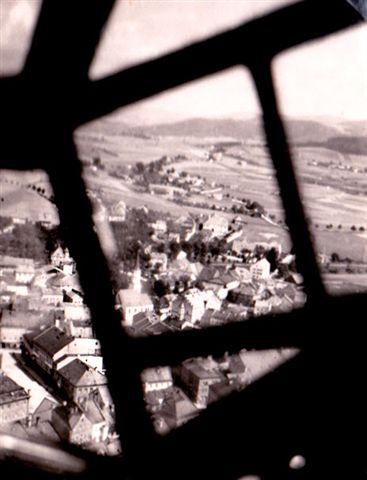
In a W 34 over Cham
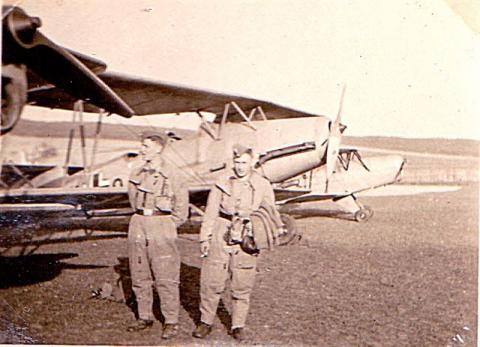
Poldi (on left) and fellow airman returning from a cross-country flight
Ainring, July 7 1940: You will be surprised that I am writing from Munich. I was very surprised myself to be sent here today, especially as we had been told that we would only be flying on tomorrow. So I have time to write, but I am without my fountain pen, hence the pencil.
From June 20 to 30 we trained at an airfield in Cham in the Böhmerwald. Here we flew the whole day through, from morning 'til night, once even flying through the night until 4 am. This continued in Pilsen, with the difference that overland flights were added. One day my instructor and I set out for Klagenfurt, but the fog over the Alps grew so thick that we got thoroughly lost in our great two engine machine until we were able to make out Windisch-Garsten after the Pyrn Pass. From there we turned towards Wels. Once I made a very boring bad weather flight to Markersdorf near St Pölten. There we were grounded for three days by the weather. Flying these days is more fun than it was in the small machines; we now fly with a crew of four.
The latest flights to Prien, Cham, Bayreuth and Munich have been “instruments only.” Naturally we always have an instructor on board with a radio. It is, of course, not very cheering when we are curtained in and can see nothing of what is happening outside. But according to our time table, we must take off in just this way. In this way we leave Pilsen in the early morning, make three or four stops through the day and usually get back to Pilsen about 8 pm. Then we quickly wash and eat, and fall into bed to be ready to repeat the performance in the morning. All the same this can't continue much longer; time must be set aside for theoretical instruction.
Pilsen, July 1940: I should be very interested to know how things turned out for Willy in school. Today completes half a year since I returned from leave; Gerhard must have grown a lot. We are done with the flying part of our training and haven't flown in the last fortnight. Next week the theoretical examinations begin. Only there is no time for study, because we are always drilling; we even spent today, Sunday, racing about the countryside.
On Saturday we were on duty until just before 10 pm. Any comparison between school here and Oschatz is laughable, but that's the way it is for officer recruits. We are to be finally posted on August 13th. Unfortunately we completed our training three weeks early, and now must wait until the time is up, consoling ourselves with drill. It used to be always so, that when the group finished up early, we could go on leave, but we officer recruits make a special case, we call ourselves the “penal colony.” We are happier about the the new posting where we shall at last begin our specialised training.
Pilsen, July 1940: Today I took my two last oral examinations (airplane engines and meteorology), and with that our group has completed its studies. That is to say, we are now the Luftwaffe's youngest military pilots. Over the next few days we shall be issued our pilot certificates. Naturally, I have already ordered a pilot's dagger from a firm in Berlin, and I shall be very happy when I can wear it for the first time. Now that we are done with the schooling we drill from morning to evening, longing for our marching orders and new postings (but these may take another two or three weeks). I am very anxious about where I shall be posted. I have applied for Stukas or fighters. I should much rather be able to spend the time at home, if the whole family were gathered together.
[During the holidays, our mother took the children to our summer house in Bad Gleichenberg.]
Also, I was taken aback to read that Willy cycled the entire 130 km from Leoben to Bad Gleichenberg in a single day. That's a fine achievement for the young rascal.
Pilsen, August 3 1940: Dear Dad, I write in great haste before going on duty. Thanks for your letter which came in yesterday. Except, to my horror, I got the letter as a personal delivery by the sergeant major himself, instead of through the post as usual, and got a tongue-lashing into the bargain. The point was that you addressed the letter to “Military Pilot ...”. Now that we are at war, there must be no written identification of anyone as cavalryman, rifleman, or airman, only the strict military rank, in my case lance corporal. So please, dearest Papa, write only to Lance Corporal L. W. etc.
Pilsen, August 15 1940: Today I can share a pleasant bit of news. After 4 weeks of quite hard drill we had an inspection today and we have also been promoted to NCOs, and this, retroactively to June 1st. I can't tell you how happy I am about this, even though we had been counting on it. Now we are going about with our new uniforms, and it is an amusing feeling to suddenly become a superior of the other ranks.
Together with the promotion, we have been told where we shall be posted next. I am to go to an airfighter school at Schwechat near Vienna, where I shall get my specialised training. Sadly nothing has come of the Stuka dreams. In spite of that I am glad to be sent a bit closer to home. Besides, it is perhaps possible, dear Papa, that you can come to Vienna with Mom, where we can meet.
This evening we shall be stepping out with our officer supervisor to a bar in Pilsen for a farewell celebration. It will be our first evening outing on which we are allowed out with limits set according to our new rank: until 2:00 am. And tomorrow it is off to Schwechat. I am already curious to find out how my new quarters will look. Hopefully I shall not be disappointed. From now on, besides the regular pay, I shall be getting a professional soldier's salary. It is supposed to be generous; I shall let them surprise me.
Special Training in Schwechat
Schwechat, August 17 1940: (to Mom in Bad Gleichenberg) I don't know whether or not you already know that I have been transferred to Schwechat. It is still not certain whether we (I am here with 11 other officer recruits from Pilsen) are to stay here, will go on somewhere else, or even be able to go home on leave. I have been granted my first outing to Vienna: Sunday until 2.00 am Monday. The airfield is here in Schwechat, quite a distance away, with a station on the line from Pressburg to Vienna, and from which station I shall be most often travelling to Vienna. I am very glad to be out of Pilsen's wooden barracks. Here we have lovely stone buildings again, and I share my room with three others. I was in Vienna on Sunday and saw the Technical Museum there.
(Dad and Willy met with Bibi in Vienna.)
We have been assigned a Fähnricht [Ensign] supervisor. He has talked of a steamer trip on the Danube, over Saturday and Sunday.
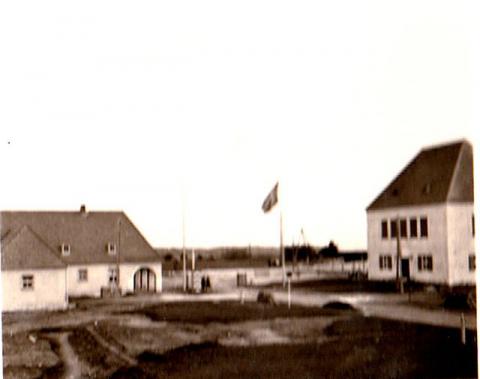
Schwechat Fighter Pilot School with "lovely stone buildings."
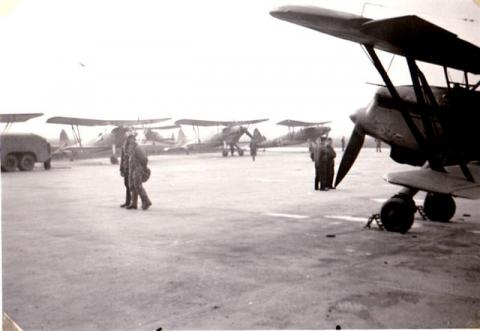
In front of the hanger at Schwetchat
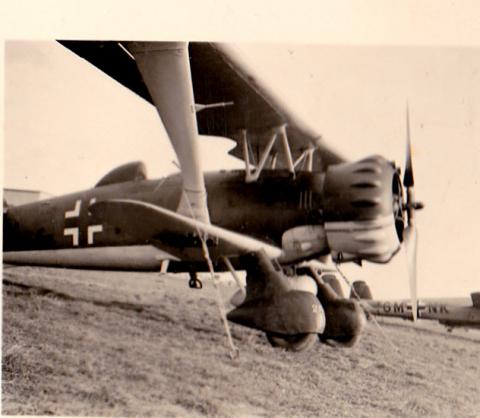
A Stuka Hs 123 at Schwechat
Schwechat, September 30 1940: Yesterday and the day before I was in Vienna again. And Saturday evening I was at the Staatsoper to see “Madame Butterfly.” It was wonderfully beautiful. The opera itself and the staging alone were wonderful. I liked it very much. I had quite a good seat for only 3.50 DM, the price of course reduced by 50%. We got our tickets so very inexpensively through our Wehrmacht care station. Otherwise the best seats cost 40. DM
I am now promoted to Fähnrich [lowest grade in the Prussian officer hierarchy -dc] retroactive to the first of the month, and can now wear a portepee [part of an officer's kit in the form of a decorative looped cord with a large fob, intended to be attached to his dagger -dc]. I had been an NCO scarcely a month and so the promotion came as a great surprise. This time the order was announced directly by Reichsmarschall Hermann Göring and so was made effective a bit faster. It is really something the way so many of our instructors from Pilsen, who were still our superiors two months ago, must now produce stiff salutes for us. In the coming month we must be as good as done with our specialised training. Then I hope that we shall finally get a few days leave. It would certainly be good for all of us. I have already been retrained for the Me 109. This is a very fast bird.
Schwechat, October 9 1940: Last Sunday there was a military concert in the city in front of the Johann Strauß memorial. That was another one that I made sure not to miss. On Saturday I shall probably go to the opera again for Verdi's “Don Juan.”
Schwechat, October 30 1940: Imagine my rotten luck: Saturday morning I get tickets for a Sunday evening performance of “die Meistersinger.” And now we are ordered back to base by 10 pm. Annoying because it would have been my first Wagner opera.
On Monday, that is, tomorrow, we shall practice firing from the air with the Me 109. This is a marvellous thing; I am already very happy about it.
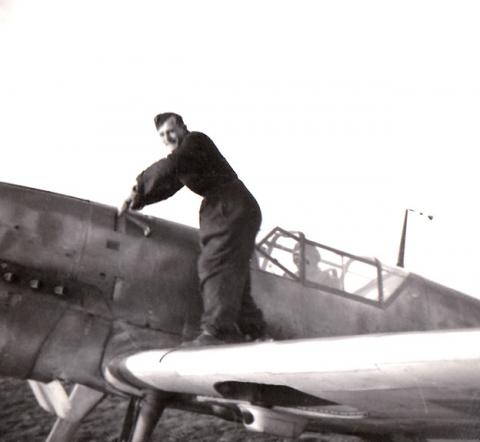
Cranking the engine of an Me 109
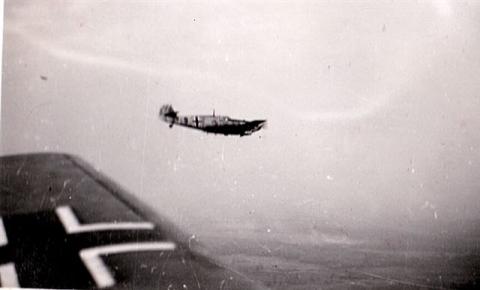
Flying the Me 109 - "a very fast bird."
Schwechat, November 3rd 1940: On the 15th, on my first military anniversary there is to be a final inspection. What happens with us after that, no one knows. The three months in Schwechat have gone by so quickly, and I can scarcely believe I could find such a pleasant life anywhere.
Schwechat, November 11 1940: On Wednesday November 10th I was given my pilot's badge. No need to say how happy I was about it. I wore it for the first time yesterday in an outing to the Burgtheater (“der Kanzler von Tirol”).
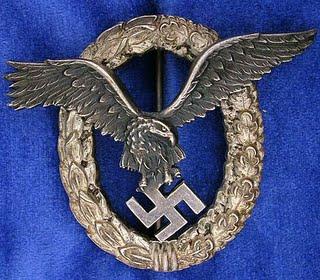
Luftwaffe pilot's badge
Schwechat, November 13 1940: On Friday we set out for foreign parts. I am to go to Merseburg an der Saale near Halle. For what reason, I have no idea, and neither have I any great desire to be annoyed by my dear friends, the Saxons.
Merseburg, November 17 1940: We arrived after a trip of almost 24 hours. The arrival reminded me very much of Oschatz, and also we were all unpleasantly disturbed when we saw the internal arrangements here for the first time. In Schwechat we had divine peace and quiet. Towards the end we were only two to a room, which was very pleasant in itself. The only thing that has pleasantly surprised me, is the casino which is grown very large. There is no hope of leave from here. It is also unclear how long we are to stay here; depending on circumstances, it may be for several weeks.
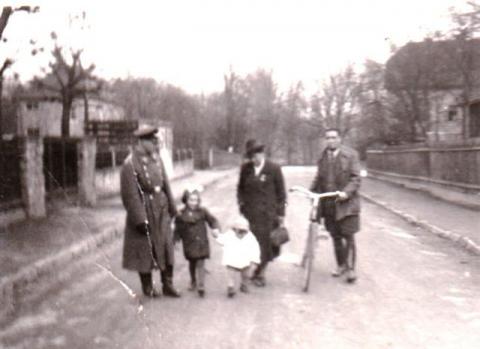
The family enjoying Poldi 's two-day November leave in Leoben: little sister and brother, Gretl and Gerhard, and Mom and Dad (with bicycle). Photo probably taken by Willy.
Merseburg, November 24 1940: [Surprisingly Bibi was, all the same, given another two days leave.] I arrrived here early, just after midnight. The trip went very pleasantly. I was only obliged to change trains once, and that was in Nuremberg. From there I caught an express. There was only two hours waiting time in the entire trip, and so I arrived here 15 hours early. It is a great annoyance that there is no later train to Munich. The NSV [National-Socialist people's welfare] was distributing sweet coffee and soup to the soldiers. So I started to eat my sausage buns, and to nibble at Mom's cake. Things have also changed a little here. Although I was only two days at home, it feels as if I had been with you just as long as last time.
Active Duty
France, December 5 1940: [The final location could not be disclosed, but was surely in the environs of Le Havre. -dc] Our journey that began in the early hours of Sunday morning came to an end this afternoon. As you can imagine, I saw a great deal in this time. When our rations were distributed in Aachen I sent a quick note. I hope the card was also received. From there we went to Maastricht, then through Belgium, Liège and countryside. Here I saw the first traces of the war.
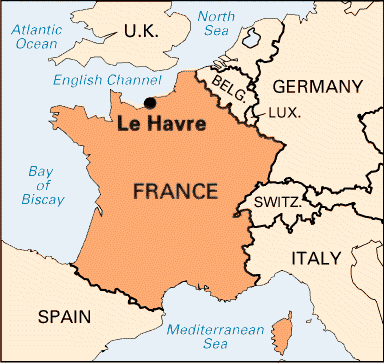
The little I saw of Holland was very nice, while I didn't care at all for what I saw of Belgium. Then we traveled on through the night arriving in St Quentin at daybreak. One area of this city is entirely destroyed. Then it continued at an unbelievably slow pace -- mostly because so many bridges were out -- on to Compiegne, where we arrived at 4 pm and got fed. Here, the entire area about the station was completely destroyed. Naturally, I took photographs whenever I could, but the weather was almost always bad.
I was happy when we got into Paris at 10 pm (December 3rd); we had all had quite enough of the train travel, even though we were in a 2nd class compartment. Sleep was scarcely possible. I spent the first night sitting; the next night I climbed into the luggage rack at once. In Paris we finally got proper beds and food from the Red Cross. On December 4th our train was only to leave in the afternoon, and, even though Paris is off-limits for soldiers, the Wehrmacht treated us to a thorough tour. So I managed to take in the most important sites in the little time we had: Napoleon's tomb, Place de la Concorde, Eiffel Tower, etc.
We travelled through the night, and reached our unit at midnight. I stayed the night in a country house. We waited through the morning sitting over an open fire in the living room; in the afternoon we were travelling again. I am now located in a small town in Normandy in provisional, i.e. quite miserable, quarters. ...I have already been into the town this evening. It is in any event more agreeable than Merseburg. I don't know whether or for how long I shall be stationed here. As I write we can hear the bombers overhead, rumbling on their way to England.
As far as the people here are concerned, they live fabulously well. This evening I ate, in what is called an “hotel,” a great roast of lamb, white Bordeaux and oysters. Everything was quite inexpensive, although prices are supposed to have gone up significantly. I am very glad to have been able to have one more time at home with you, even though briefly, for otherwise I should have had to spend more time on the train, even with good connections. I have nothing else to tell: I am doing well, like “God in France,” and I am in good health. [So as not to misunderstand, “like God in France” is a proverbial metaphor meaning to live luxuriously without cares -dc]
France, Dec. 20th 1940: My Dear Parents, The Christmas celebration is getting nearer, but we have not noticed it much here, for neither the weather nor the surroundings produce any sort of Christmas mood. It is still relatively warm here. The temperature stands at about 10° (centigrade) for days on end, so naturally there is no question of snow. We put some effort into finding a Christmas tree, but there was none to be had anywhere. We have been told that a few are still being sent from home. Duty is very agreeable and varied; most commonly we are on watch, waiting for the Tommy who never appears. Day by day I like this room better. Now I even have heating in three forms: hot water [radiators], warm air [ventilation] and an open fire. So the room is as cozy-warm as a bakery. The food is equally superior. Every day we even have as much wine as we please. One needs some restraint to avoid becoming a drunkard.
I wonder if you've received all my letters, as I've written a good deal lately. Well, it's past midnight, so I must close.
Dear parents, I wish you and my brothers and sister the merriest of Christmases; I shall be with you in spirit.
Heartfelt greetings and kisses from Bibi.
France, Dec. 28 1940: The Christmas festivities are over. We used a pine for our Christmas tree as nothing else could be found. I was the one who hauled the tree from 60 miles away in my truck. Now our Christmas Eve: our celebration was just for our unit. We started with our roast hare and the usual side dishes, then the famous Christmas stollen, and lots of apples, nuts, etc. There was wine, sparkling wine, beer and spirits until we were senseless, more accurately falling-down drunk. We also hired a band composed of men from the air-defence. “Father Christmas” appeared and distributed presents. Naturally I was thinking of you the whole time.
We are a hour behind you so that as your tree was burning it was still broad daylight here. In general there was not much in the way of Christmas spirit.
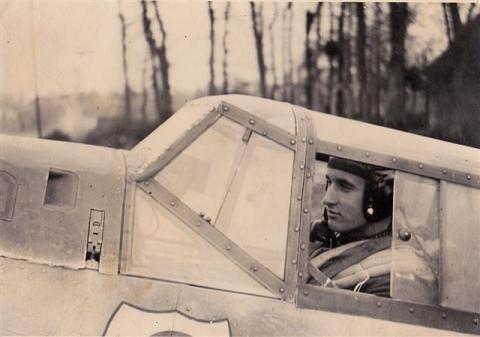
On Christmas Day 1940 Poldi is in the "Sitzbereitschaft" (readiness seat).
On the 25th I was on observation duty again, which means being in position at first light, and staying outdoors the whole day. On the 26th I was in the military cinema ... and that's the way time goes by. As far as I can tell the French don't celebrate Christmas at all—I found a single shop stocked with cakes.
Wine on the other hand can be had everywhere. So there have often been days—I confess it to my shame—that I've fallen into the feathers with a fuzzy head.
As for everyday life and doings which Dad asks about: Basically I still have a lot to learn here, and must get used to the new surroundings.
I had my first enemy contact on December 10th. This is how it came about: I was on observation duty and complaining because lunch was late, then I heard motors, and thought it was the truck bringing the food. I looked out at the window and suddenly saw bombs exploding. I was told that I said, “Those are really bombs.” At that point everyone was under cover; but then we raced out to the machines to “scramble” after the Tommy. But he immediately disappeared into the clouds over the Channel. We hunted him over the water for a long time, but he must have raced off like a poisoned ape.
On the same day we chased another one, but it grew dark so quickly that we had to feel our way along the coast to get back to our airfield. Today I had another contact which had been spotted by a submarine. Naturally they didn't wait for us to catch up with them. Every night our position gets shot up, and the air-defence puts on a fine display of fireworks.
It is unbelievable how much the people took Major Wick's death to heart. I was so happy to have been posted to his wing directly, and now I shall never see him again.
End of letters from 1940 -
Category
Germany, National Socialism, World War IILeopold Wenger's letters from France: January-April 1941
- 3189 reads
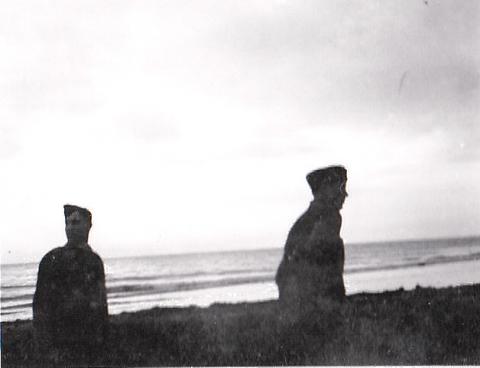
"I am on the beach almost every day," writes Leopold Wenger to his family from his location in France on the English Channel coast.
copyright 2013 Wilhelm Wenger and Carolyn Yeager
Translated from the German by Hasso Castrup
10 January 1941: Today I flew for the first time in the new year and have seen England's coast for the first time. About the false alarm in Leoben on Christmas Eve, I had to laugh.
So far none of us can fly! And for us, there are no more air-raid alarms; there is no time for that—bombing starts immediately.
20 January 1941: Today, all the snow has melted away. It's positively unpleasant—you can hardly believe it. The soil is just bottomless. It looks like Spring wants to begin already. I am almost every day on the beach, watching the sunset again and again, a truly wonderful, impressive experience. Today, however, there came up a very violent storm and I had to think of Mom whose desire has always been to experience a storm at sea up close, with lashing waves. Our guards, however, are less enthusiastic about it.
8 March 1941: [After returning back from a vacation] I came back to my hotel half an hour ago, at 20 hours, and since I am a worthy son, I write immediately. I had a long stay in Trier. This morning, I arrived at 11 o'clock in Rouen, and I stayed there till 17 hours. I looked around in the city and saw what was there to see. The cathedral, harbor. Finally, I went to the soldier cinema. I came back with the last tram just before the front door closed for the night.
9 March 1941: I've been back for a whole day here, but I cannot accustom myself to the routine. I have not done any real service today, so am enjoying the Sunday. I have met a few people and had to report everywhere that I'm back. This afternoon I brought my place in order and then I paddled in the park lake. While I was away, a few of our men found somewhere two old paddle boats with which we now paddle in our "lake" and stage great naval battles. Only it's rather embarrassing if you fall into the water and are then soaking wet.
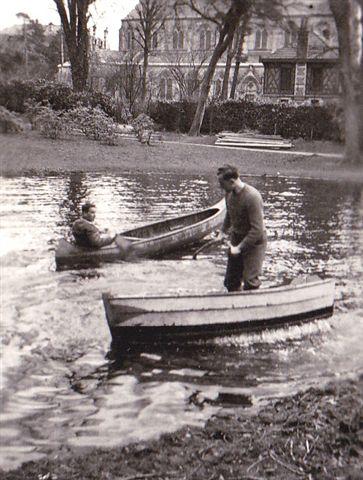
"This afternoon ... I paddled in the park lake ... it's rather embarrassing if you fall into the water..."
Incidentally, today was a wonderful day, a real Sunday. At first I took a walk on the beach and then went to the soldiers cinema, and then again at the beach. Everywhere was choking full of people. I met a few friends who were going to take a ride with their motorboat. I was happy to join them and it was a wonderful boat trip. Finally, we docked at the pier in the middle of the night. Anyway, it was very funny.
Some terrible news today: On March 1st ration cards were introduced for all sorts of things. And I was going to have a suit made. I hope it will still be possible.
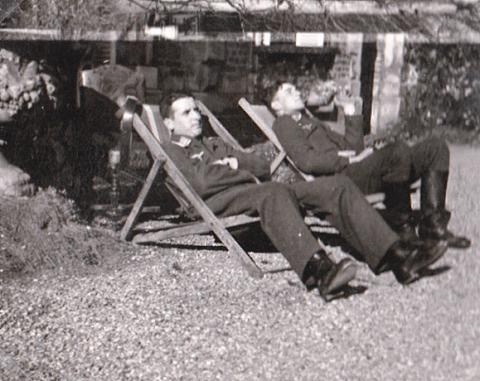
Poldi and fellow pilot enjoy the early Spring sun at their lodgings in Le Havre, March 1941
13 March 1941: Since I got back I have not flown even once. But we have to do all kinds of nonsense.
Here I will hardly get to fly because I have to go somewhere else, here in the area. I'm curious if it will be less stiff. I have not yet been to the city before closing time. I have bought only vanilla; was not able to buy anything else. I will hardly get any shirts, etc., precisely because the ration cards have been introduced and it is forbidden for us to buy fabric. I will try my best.
On Monday, March 10th, we experienced a fairly loud midnight concert of flak and bombs. This time, Tommy had come with several machines. Sometimes we could see quite well when our anti-aircraft gunners caught them with the searchlights. You can imagine the hellish concert. One machine was hit, then tipped over and it probably plunged into the water. The next day we visited the bombed location. It all went wrong for them (the Brits). A whole lot of duds were lying around everywhere. The streets were littered with flak splinters. It has literally rained with splinters.
17th March 1941: The only thing I could find to date, as regards Mom's wishes, was vanilla. [French vanilla is famous -cy] While I cannot imagine what you can do with this black stuff, I hope Mom finds some use for it.
The chocolate is for my dear sister for the hair-cutting. And as to the iron: the large fragment is from a bomb that I saw strike on 20 December last year, the small ones are from anti-aircraft shells, which rained down on the night of 10 March. Please keep all of this for me!
For Mom, I got this fabric. I've already sent a similar one. If Mom can not use this stuff for herself, then use it for Greterl. I've also caught a starfish, cooked it, eviscerated and dried it. I think I did quite a good job.
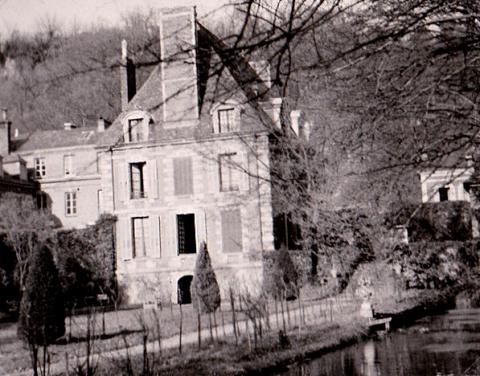
Our new pilot accomodations, Beaumont le Roger
21 March 1941: Beaumont le Roger Now I have again changed my location and lay no longer by the sea, but in a small town. The journey here with the truck took a whole afternoon. In this nest, you can buy nothing at all. There is no decent restaurant, pub or cafe, nor a department store. Thus, one is forced to be thrifty. We look like pigs, dirty from all the dust. Our first question was, of course, where is the bath. We are now two ensigns, a senior cadet (at the moment) and lead a great life. We live in a very nice, pretty garden.
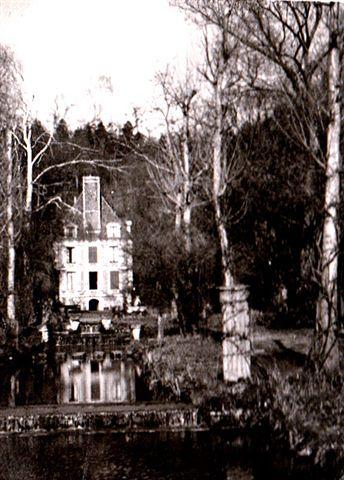
Beaumont garden, above, and Laundry, below
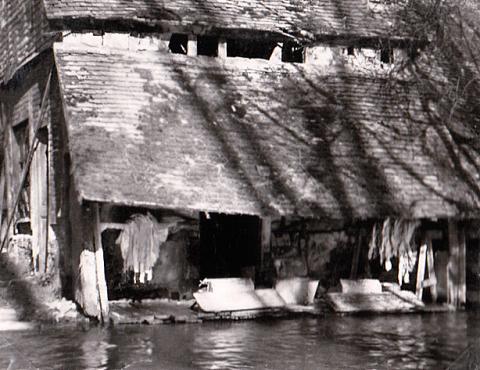
On the first evening we were all greatly welcomed. In the morning, and by 2 o'clock, we had to stop the attempt to drink us under the table. At the welcome evening we were also asked who was the youngest and it turned out that I am. A packet was handed to me, to my surprise, which said: to the youngest pilot of our unit. This [treatment] is not hard to put up with! Incidentally, I have just sent 3 packets to Leoben.
1 April 1941: Well, I've been waiting eagerly for Dad's report on the reorganization Gleichenberg. In the summer I would quite like to come and see it for myself.
I have a lot to learn and it buzzes in my head—only tactics and more tactics! But it's all new to me and very interesting. Of course, I do no flying here. Our Mom will be somewhat calmed by that. But for me it is a disadvantage, since I'm out of practice. Willy should learn English properly because, if he wants to become a pilot, he must bear in mind that one can use this language in many places.
11 April 1941: Effective from 1 February 1941 I was promoted to Oberfähnrich [corresponds to sergeant first class]. Within a few minutes, this occasion started an evening with booze since we celebrate everything that comes our way.
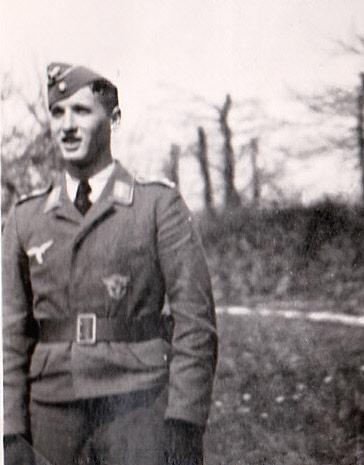
"Effective from 1 February 1941 I was promoted to Oberfähnrich..."
13 April 1941: I have been on duty at the command post in the afternoon and, to our surprise, we had to leave the base, so that our festive Easter lunch got cold. Our orderlies, crafty guys, had purchased chicken for us pilots and let the cook roast them for us. We have been looking forward to it for days and then suddenly there was an alarm ordered (readiness). When we returned, the food was cold of course, but still very good.
Our squadron's insignia, which is painted on our machines on the snout, shows a sword lying perpendicular and the inscription: "Horrido." A hunting call. This squadron was once led by squadron commander Helmut Wick. The hit list of the squadron is very high.
Now almost every night we have seen and heard our night bombers fly to England. Tommy comes very rarely, and only in case of unfavorable weather, with low clouds—only then they fly. But if even one of us comes up there, he runs away, dropping his bombs no matter where.
19 April 1941: We are still having a lot of fun. We are once again on the move. Today we have moved and early tomorrow morning we are to proceed further. How much I like that, you can imagine. But it's also great fun to see something new all the time. As a result of an error, I am again without my luggage; it is a few hundred kilometers further, somewhere in a column which I will meet in a few weeks.
25 April 1941: (probably Cherbourg) I was for all this time away, as part of the advance party, and now live in a city in a hotel. It would be quite as nice here, but we must stand in readiness from daybreak to dark, and that is from 5 hours in the morning until 22 hours. That we are really tired then can be imagined. You will surely see our lieutenant in the newsreels, because he has just scored his 20th air victory (Lt. E. Rudorffer). I'm now back to flying after quite a long break. Incidentally, two days ago I became a Lieutenant. Now I must go to Paris to procure the most necessary items.
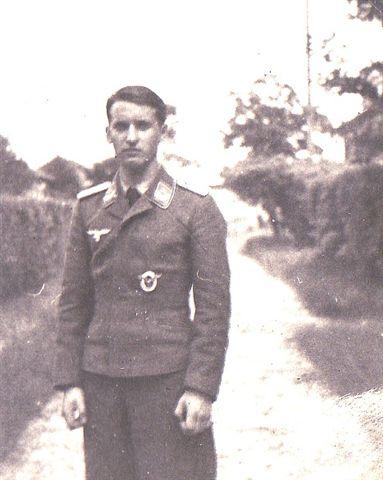
Poldi becomes a Lieutenant!
29 April 1941: Today I returned from Paris. I was like a pack mule. I now have all the accessories and materials for breeches, long pants and a tunic. Now I just need a place where I will stay longer and where there is an uniform tailor. I have also bought a leather coat. It is perfectly designed, sits wonderfully and has a warm lining. Only it is unusually heavy. It is, of course, Luftwaffen blue. I could not find suitable boots. I still have the ration card. Now I only lack the dagger, but I did not want to buy it in Paris. For Willy, I could not find any other slippers than those from a Moroccan store.
Yesterday I was at the Eiffel Tower for the first time. The railway travel is pleasurable because I now get tickets for the second class.
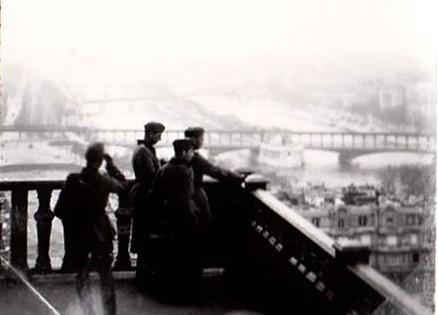
Poldi's group taking in the view from the Eiffel Tower in Paris
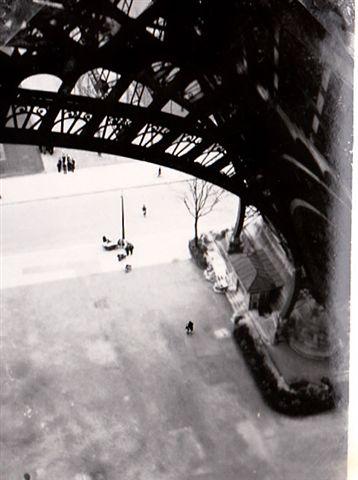
Looking down from the Eiffel Tower
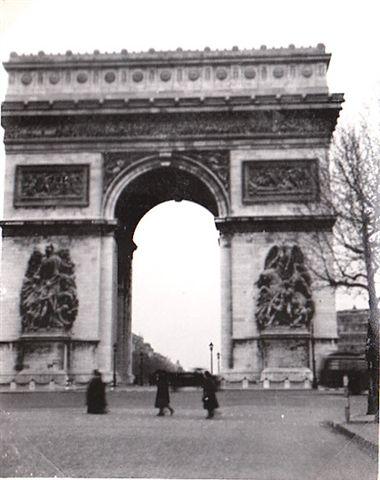
The young airmen viewing the Arc de Triomphe, Paris, April 28, 1941
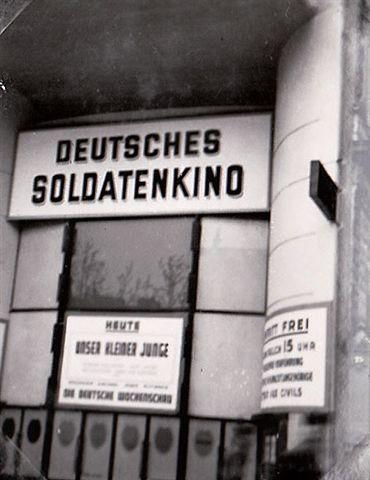
The German soldiers' cinema in Paris
To be continued ...
Category
Leopold Wenger, World War IILeopold Wenger's letters from France, May-December 1941
- 3303 reads
'Poldi in Brest, France, 1941, in his Me 109
copyright 2013 Wilhelm Wenger and Carolyn Yeager
Translated from the German by Markus
Continued from Jan-April 1941
1 May 1941: [Still in the city of Cherbourg] Drunk sailors are found in all corners today because it is a common holiday. I used this free afternoon to thoroughly sleep myself out because where we live, and get up at 5 a.m. for emergency service which lasts until 10 p.m., drastically gets on one's nerves. Then the commuting from the city to our squadron location takes another half hour. I will be happy whenever I can go back to my squadron, which is heading further West.
How are my two little siblings doing? Is Gerhard still so terrible? [2 years old] Or has he gotten better? And Greterl [6 years old] ought to get her hair cut again, for then I will send her chocolate.
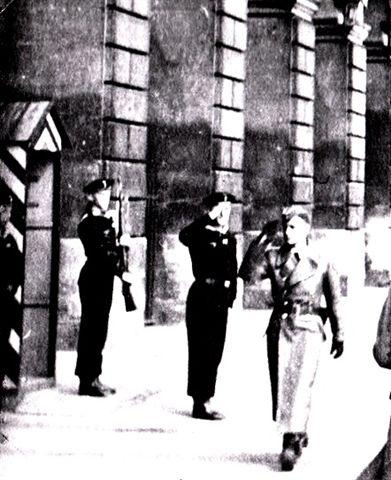 What did you say when you heard that I got promoted to lieutenant? It went quite fast. I was Oberfähnrich for only 12 days. I didn't even get a wage increase for being Oberfähnrich; a big lump sum will be paid all at once.
What did you say when you heard that I got promoted to lieutenant? It went quite fast. I was Oberfähnrich for only 12 days. I didn't even get a wage increase for being Oberfähnrich; a big lump sum will be paid all at once.
Right: Someone snapped this picture of Lieutenant Wenger being saluted as he walks past sentry guards on May 7, 1941 in France, wearing his long coat.
2 May 1941: On a recent night, I was surprised by a bombing while walking home from the cinema. I heard seven bombs howl and fall. They banged terribly and I had a bad feeling when one bomb after the other exploded closer and closer to me; You can imagine how I ran!
Today I was resettled into another hotel and have got a very nice room. I live right in the middle of the city next to the beach. [Cherbourg-East?]
9 May 1941: Yesterday, when I came back from Paris, I had received a lot of mail. Today I returned to my old squadron on a very slow train that took 11 hours! We are now even further to the West, but still on the Channel. I have again a nice hotel room with a bathroom (but there's no running water at the moment).
The landscape and town are more beautiful than I'm used to seeing so far in France. On the coast of Normandy it looked similar to how Dad had always described Dalmatia. Every small garden is walled in, for up there a steady wind blows. Here in Bretagne [Brittany], it rather looks like Eastern Styria from what I can tell from the train ride. Hilly, small valleys and streams, blossoming orchards. There's just one thing I don't like, and that's the cold. It just doesn't get really warm. Even when the sun is shining high in the sky, there is this cold breeze off the sea.
When I was in Paris I visited all kinds of attractions. I had already seen the Triumphal Arch in April, but I went up onto a roof from where I had a panoramic view of the whole city. I also flew over Versailles and landed close by. [Le Bourget?]
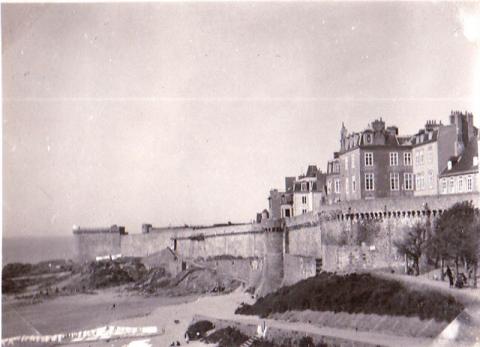
The beach at St. Malo in May, 1941
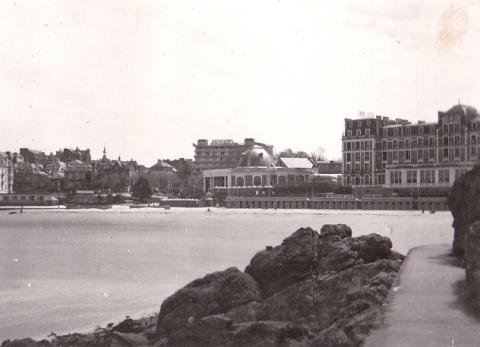
The close-by seaside resort of Dinard, May 1941
May 10th, 1941: Yesterday evening, I went for a little walk in the city [probably St. Malo], and I have to tell you, this is the nicest place I have stayed in France. It seems to have been an ancient fortress with old city walls, military towers, ring ditches [moats] and marvelous parks with beautiful plants. The chestnuts are blooming now and so are most fruit trees.
Yesterday, one of our sergeants shot down a Spitfire. Our Lieutenant Rudorffer, who just scored his 20th air victory, was mentioned in the Wehrmacht-report a few days ago. On May 1st he received the Knight's Cross.
25 May 1941: [Theville?] Two days ago, we moved again. I received Willy's outraged letter:
(I had already started with the SG38, the training glider, that is. I was in the seat, was instructed, and all of a sudden an incoming rain prompted the flight instructor to take me off the plane. My 130km bike ride to the airfield was in vain, and I had the same distance to go back. Note from W. Wenger)
I felt sorry for him because of his misfortune, but at one point he will get his turn flying also. Maybe he has already done his first starts by now as I'm writing.
I, as well, complain about bad luck lately, for firstly the tailor bungled my uniform so that I can't really wear it now. Because we had to leave so suddenly, I was forced to just take it with me and have it repaired by another Frenchman, if that is even possible. During a flight, something broke in my engine. Fortunately, I was very high over the Island of Jersey and able to glide back to my airfield. Only a few days later, I had an engine falure during a test flight. And yesterday, I had to land on an alternative field due to bad weather. There, a mechanic steps onto the wing, slips and trashes the landing flaps. It's not getting any crazier than that.
Over the last days, one of our squadrons sank a submarine and a 2.5 ton steamship. The submarine goes to the account of Lt. E. Rudorffer.
11 June 1941: After I came to Cherbourg from Dinard, I am in now in the westernmost West of France [Brest]. I've now flown over the Atlantic Ocean. I'm in a nice lodging again, right next to a park with palm trees and agaves, close to the shore. We have a small sailing yacht with an engine. But we don't use all this to its fullest, for there is just not enough time and motivation for it.
In the meantime, we've experienced more bombings. They dropped three right in front of our house yesterday. I saw one machine crash and burn. The Flak always gives us a nice fireworks display.
I am well enough; it's just that my bad-luck streak continues. I damaged the engine of my machine when rolling it; then a suitcase got lost during my last transfer [relocation].
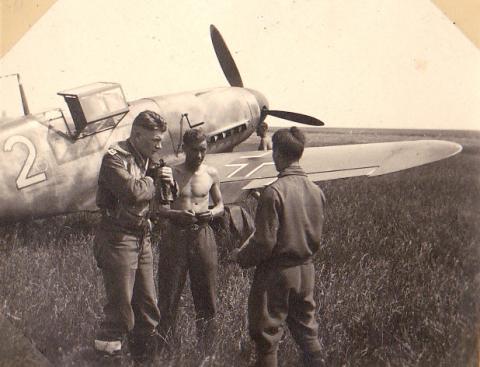
Lt. Wenger, on stand-by at Caen in early June, talks with Obergruppenführer Limberg (the big guy).
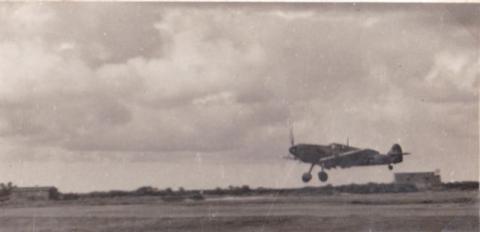
Landing an Me 109 - the most produced fighter aircraft in history with 33,984 airframes from 1936-April 1945
29 June1941: (Cazaux) Recently I was in Paris again and from there we drove on to Bordeaux the next day. I'm having a great time here at the moment. We are in an isolated place, close to a large lake. All around, there are only woods. The nearest village has a population of about 300. Nevertheless, it's very hot where we are, measuring 50-60° C daily. All the men were given tropical helmets. I had a tailor make a light uniform jacket out of tent fabric. Today, it was especially hot and so I'm running around in tracksuit pants almost the entire day. Our guards wear cloth-suits and white tropical helmets.
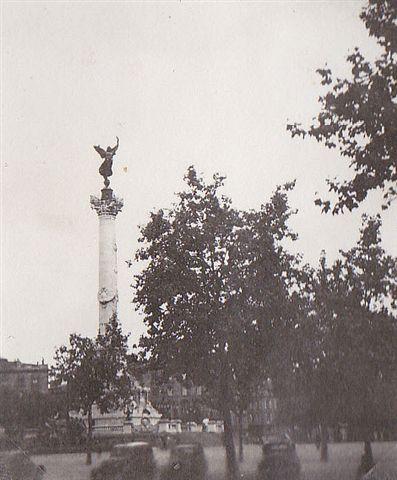
Bordeaux, France, June 1941
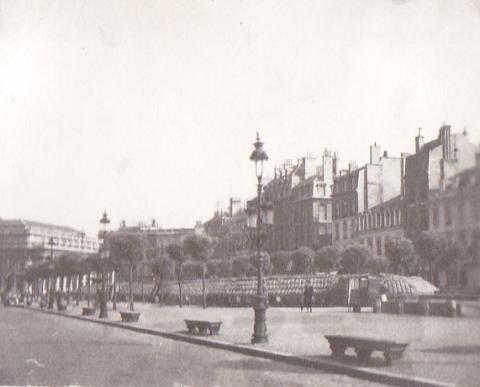
Place Gambella, Bordeaux 6-41
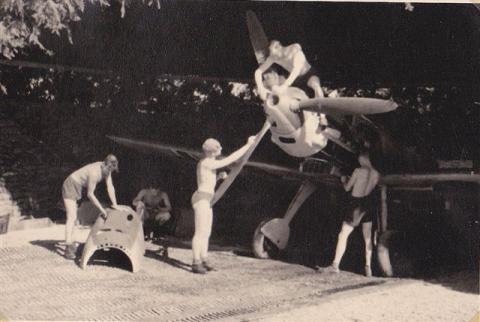
"Ground staff" at work in the intense heat at Cazau in Southern France, July 1941
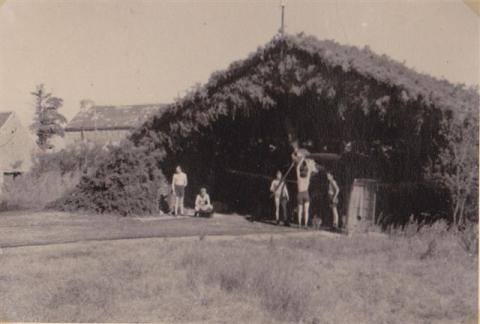
Technical service carried out under camoflaged hanger at Cazau
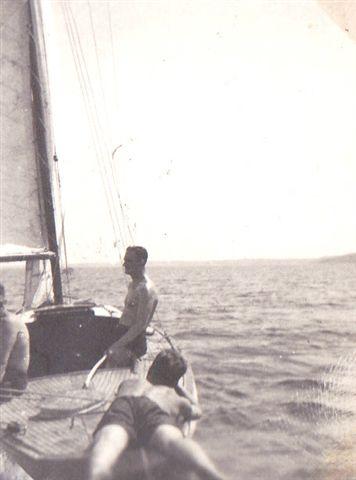
Right: There is also time for cooling recreation in Lake Cazau in their own sailboat. Temperatures reached between 50 to 60 degrees centigrade in July!
I was unlucky again yesterday! I wanted to take a sunbath after bathing. I laid down on the sand beach; a fresh breeze came from the Bay of Biscay and it was even pleasantly cool. I fell asleep and after about two hours woke up in pain, all burnt by the sun. It's difficult to walk today, so much does it hurt everywhere. There is no drinking water either. Brushing teeth is best done with bottled water. If we run out of that, then we use wine which we have in abundant quantities.
There is plenty of flying here, again. Our Commodore, Hauptmann Balthasar, has now made his 41st victory, for which he will probably receive the Oak Leaves.
This afternoon [a Sunday], a lieutenant and I from Horstkommando borrowed a pleasure boat and sailed in the fresh breeze. We had great fun, you just have to be very careful that such a big boat doesn't keel over in a strong wind..
July 3rd, 1941: Yesterday, I was at a seaside resort. At least there were more people. You should have seen the houses there; you would laugh! All of them are built very low, not one has a second story and everything is as small as toys, with all around little fences, or gardens with a few flowers in the sand. The streets with houses look like these comical half-Spanish houses that you have seen in pictures of Mexico. In general, an influence from Mexico is quite visible here. You notice this in all kinds of ways like the music, dwellings, lifestyle. For example, you will see bullfights. It's just not quite as flat as in Spain, according to the elderly matadors.
7 July 1941: Tonight, I am officer on night duty, and I sit in an office with a desk, a rug, a bunch of chairs and typewriters, telephone and cabinet. In a corner, there is my bike. It is still 35°C and I'm still sweating despite all of the easements. I have removed my tie but the thin canvas jacket is still too warm. It's 23 hours [11pm], I put some bottles on the water pipes to cool them, they are still lukewarm but nothing can be done. Today was very warm again, even though the record heat of 62°C was not beaten, thank God. I spent two hours this afternoon in the lake, then at the beach. There, the sun is not so unbearable.
If Willy really wants to fly by commercial airline, then he can happily have 50RM from me.
Yesterday, I had another wonderful excursion on our sailing yacht. It's great fun and it cools one off in this heat.
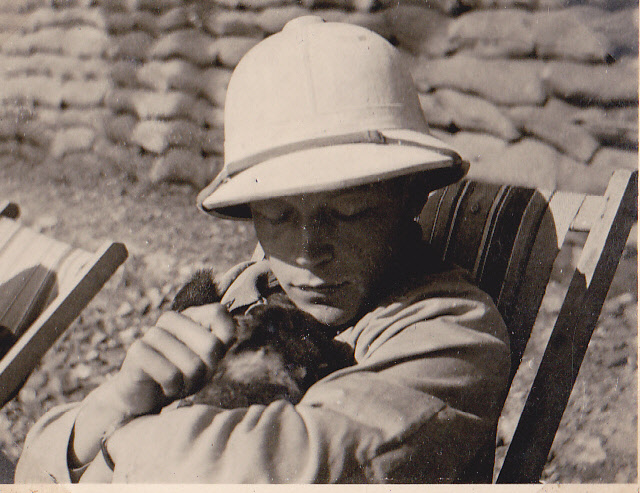
Unteroffizier Deinzer with a puppy, and wearing the white tropical helmet issued for the heat of southern France
19 July 1941: (Cherbourg-East) Yesterday, I took off from Southern France, Cazaux to Tours, 370km. Later from there to Le Havre, 240km and in the evening back to Cherbourg-East, 120km. I have lately been flying a lot through France. I was in Paris twice, and in Le Havre, Tours, Romilly, partially by train, or with my Me [Messersmitt].
July 28th, 1941: A few minutes ago, after an alarm, I had the wide expanse of the Atlantic Ocean in front of me and the Channel beneath me. Unfortunately, as so often, there was no contact with the enemy.
I saw aerial combat for the first time since getting back to the Channel front. Unfortunately, I wasn’t with my squadron, but I’m back with them again now. I’ve only been in two large-scale attacks, in
which I got into a few dogfights and came under anti-aircraft fire. Together with another plane, I flew straight into a swarm of enemy planes, where there was a lot of confusion and everybody was shooting at everybody else. I inflicted some serious damage on a Spitfire from a far distance, just as he was getting ready to shoot up one of ours. The Tommy started smoking very badly, and when I landed I could still see the splashes of oil from the Tommy machine on my own; he also splashed up the cabin of another plane of ours. The Englishman was long gone in a steep nosedive: I went after him as doggedly as I could, but I couldn't get close enough and so he escaped. But he certainly never reached home in that plane of his, because it was all shot full of holes. I didn’t have a single direct hit on my machine.
We have now got a little coati ("hog-nosed raccoon") from the Berlin Zoo. It's really fun to watch what this little fellow is doing. We also have a few dogs here now, it's a pure menagerie.
31 July 1941: This afternoon, we got quite elegant cakes and even a real torte as a snack. We have a driver who is a professional butcher, but he can bake delicious tortes with the most beautiful ornaments. The rations have become much better since the time of deployment has started. So we are all very satisfied now. If we got a few hours more sleep, we would be completely happy. We pilots moved from our castle to a corrugated steel hut [Nissan] a few kilometers away, just so that we could get more sleep instead of communing back and forth. It's not as nice out here, but while sleeping you don't realize that anyway.
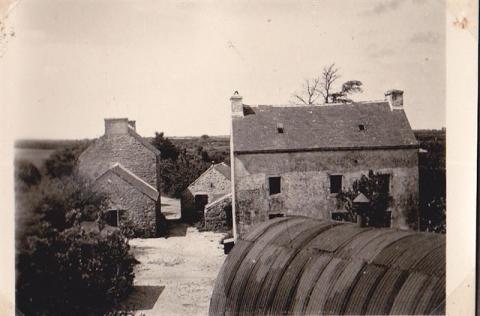
The squadron's location at Brest
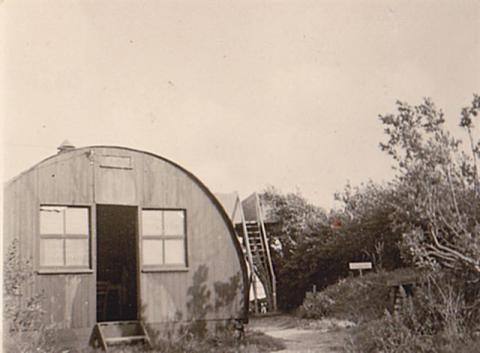
"We pilots moved from our castle to a corrugated steel hut [Nissan] a few kilometers away, so we could get more sleep."
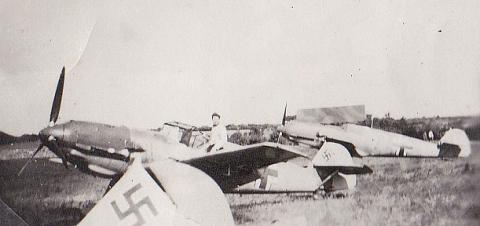
The Me 109's in readiness (Bereitschaft) at Brest, July 1941
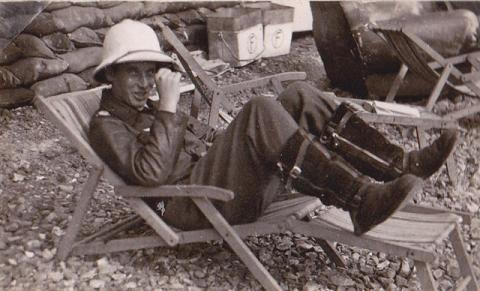
'Poldi on standby duty at Brest in August, wearing his tropical helmet
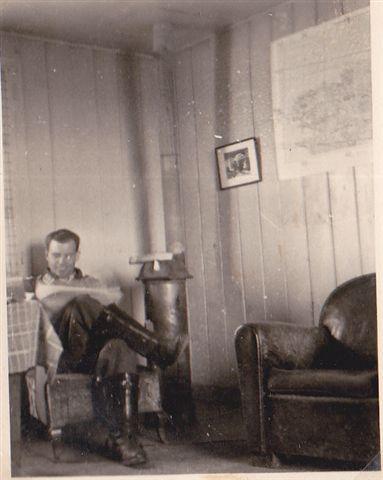
Inside the standby barrack at Brest, a pilot takes a rest
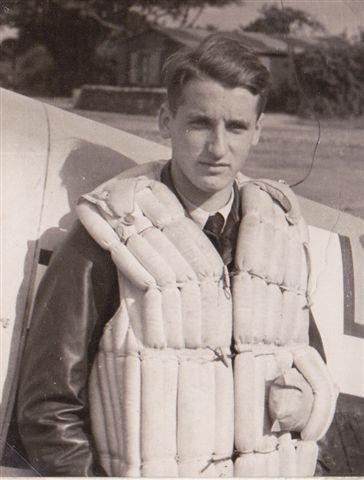
'Poldi in lifejacket, prepared to fly out over the Atlantic from Brest, 1941
22 August 1941: The day before yesterday, a few Tommies were shot down again. I flew escort for the emergency services at sea: shortly before dusk, we recovered an English lieutenant out of the Channel. He was very happy to have been saved. It was 50 kilometers off the coast, after all.
11 September 1941: Yesterday, I saw and talked to our new Commodore, Hauptmann W. Oesau. His predecessor Hauptmann Balthasar fell in aerial combat in July. Oesau now has the Oak Leaves with Swords.
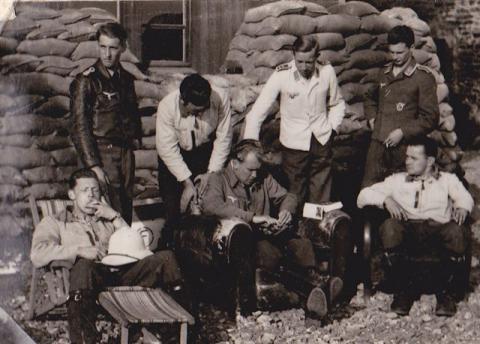
Pilots of 3 Staffel; 'Poldi standing left - August '41
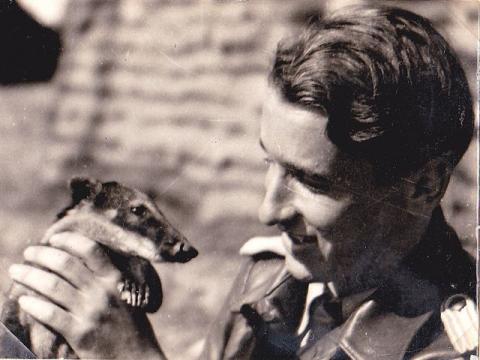
'Poldi plays with the squadron's pet Nassenbären (racoon)
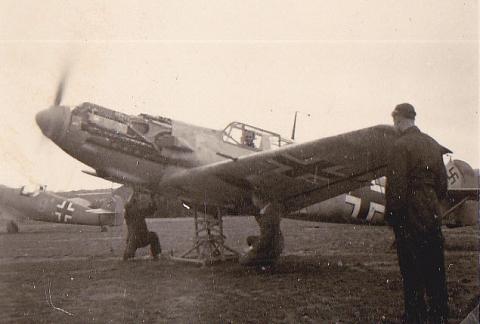
Chassis-control check in September 1941
11 October 1941: After long and serious dental treatment - I could not fly for a long time - I am now since last Sunday back overland. I flew to Caen. I am pretty well familiar with the region by now, but a flight along the coast is still the most wonderful thing, especially around Dinard. St. Malo is terrific. And then the castle Saint Michel, standing in the middle of the lake, is an impressive sight. The same afternoon I flew back with an Me 108.
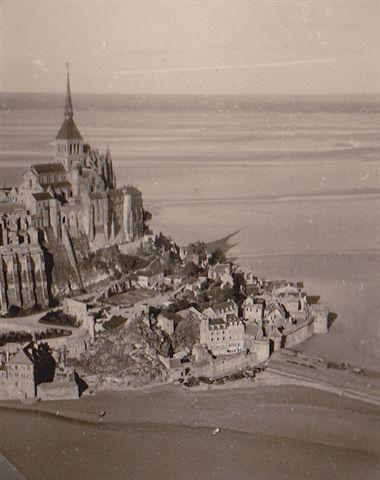
'Poldi's flyby shot of Mont St-Michal in Normandy
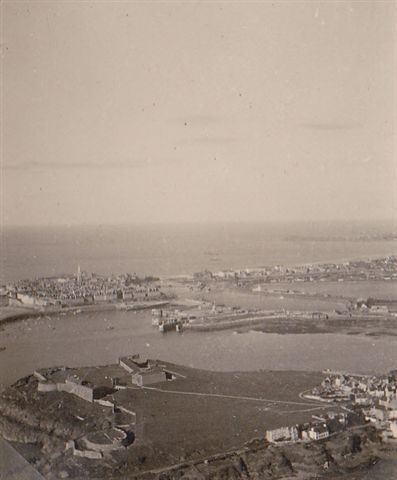
...and over the coastal town of St. Malo in October '41
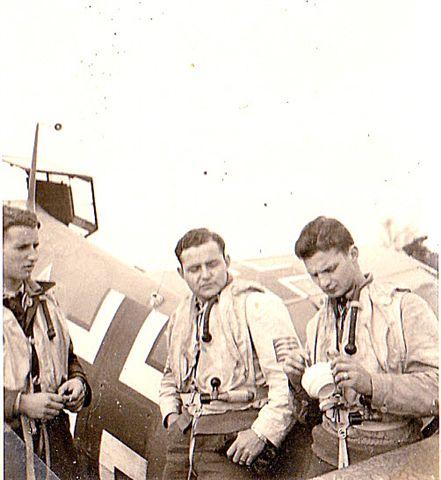
On standby at Brest, October '41
29 November 1941: In the last days, the English attacks have strengthened somewhat. But this is good because the more Tommies come, the more Tommies go down. And so, every night a few need to come and the bombs keep missing their targets. A few days ago, for the first time, I saw a U-Boat from the inside. Looks pretty restrictive in there, inside this steel tube. Those men conducting war from in there are to be admired.
13 December 1941: Two and a half hours ago, we had an English dawn bombing attack in very bad weather. We shot down two bombers. By chance we made contact with six machines over the sea, at the same time saw a Handley-Page Hampton [British medium bomber]. Can you imagine what a scrimmage that became? We fell one after the other on the Tommy and with fast, combined attacks the rest were shot up, and then the engine was on fire. For us, it was a wonderful picture. The whole thing took place at low altitude over heavy seas. The survivors are said to have escaped by parachute. When the machine was all on fire, it reared up once again before it crashed into the water. The fuel exploded and it burned quite some time on the water surface. As it was pretty dark already, the drama offered a wonderful scene for us. First the tracer of the weapons, canons and MP's, then the flames of the burning machine and the flaming waters. A pity so many of us shot the Tommy.
We experience night attacks more often now; it's always a mighty shooting spree, and naturally you can't sleep.
End of letters from 1941-
Category
Germany, Leopold Wenger, World War IILeopold Wenger's letters from France, February - July 1942
- 4114 reads
Celebrating a victory with a champagne breakfast in Caen, July 9, 1942, left to right: Schröter, Nippa and Poldi wearing his newly awarded Iron Cross 2. (Picture taken by a war reporter) Enlarge
The letters from 1942 begin with Operation Cerberus, for which Leopold "Poldi" Wenger's squadron (Jagdgeschwader 2 "Richthofen") played an essential role. This is the first of two major operations in which he was to take part in 1942, the second being the Battle of Dieppe in August. In between these two, we read of continuing dog-fights over the Channel. Poldi's first letter home was not until after Cerberus was successfully completed.
copyright 2013 Wilhelm Wenger and Carolyn Yeager
Translated from the German by Carlos Whitlock Porter
14 February 1942: Everything has been happening at once over the past few days, as you have, of course, heard from the Christmas news bulletins; and this time we are involved, too. We flew fighter support for the German fleet and were present at precisely the most exciting moments shortly before the breakthrough at the narrowest point on the Channel and in the evening air and sea battles. It was a bold undertaking and a surprise attack right in front of the Englishmen’s own front door, so to speak, with the two battleships “Gneisenau” and “Scharnhorst”, as well as with the heavy cruiser “Prinz Eugen” and many convoy ships, torpedo boats and destroyers in the front line. [Poldi is describing Operation Cerberus that I wrote about here.]
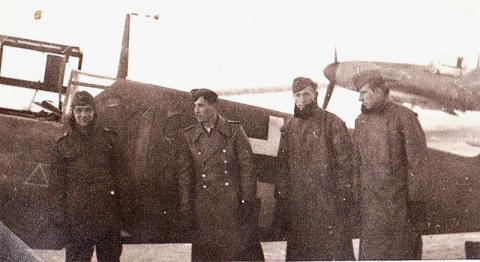
Poldi second from left on the airfield at Katwyik, Feb. 14, 1942
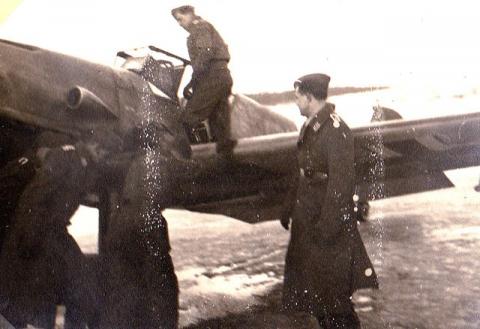
At Katwyik for Operation Cerberus
When German long-range guns attempted to destroy the English coastal artillery, all the houses on the square where we were trembled, and the floors vibrated at the rumbling. This day was the first time I saw aerial combat from the ground. When we started back towards the safety of the ships, we just managed it when a British destroyer attack was defeated by our ships. There was rather misty weather and the flare of the muzzle fire from the guns was getting more and more dazzling and frightening. Once we confused two ships and found ourselves suddenly being strafed by flak from one of the British destroyers. Then the Tommies tried to blow us through the heavy use of Spitfires. That failed, too. Since we absolutely had to maintain radio silence, it wasn’t possible to communicate with each other in the normal way. For example, we could only fire tracers in front of a comrade’s [plane] to let him know that he was being attacked by one or more Brits. We protected the ships in such a way that each squadron had to fly a certain sector to prevent hostile aircraft from getting anywhere near our big ships. Most of the enemy bombers were swept away from the outer ring of our fighter squadron and we seldom even saw them with all the bad weather. It was really beautiful aerial combat.
Yesterday I flew what was up until that time my northernmost flight in the maritime territory of the Friesian Islands. In the evening we were in The Hague. That is the first time you notice the difference compared with French muddling.
In Albertville I had two days off with QBI [bad weather]. Albertville is a city of ruins, in which only the church is still standing.
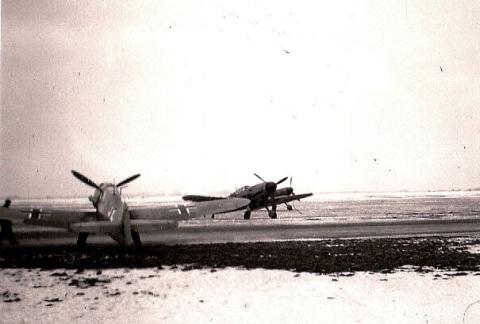
Icy Leuwarden airfield, Feb. 19, 1942
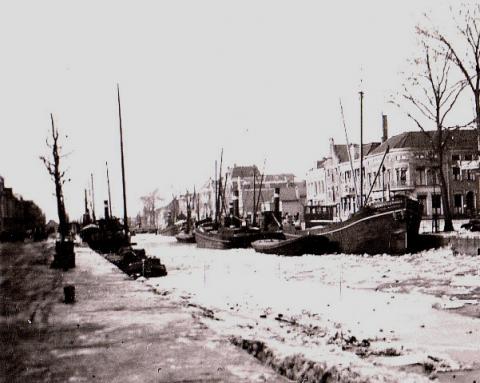
Photo taken by Poldi in Leuwarden, Holland 2-19-42
19 February 1942: I’m further north now, in the vicinity of Leuwarden. So much snow and ice is something new to me, it’s the first we’ve met with this winter. So I’ve quit flying in the English Channel and I‘m flying in the North Sea now. But there’s a big difference, apart from the cold. But it won’t be long until I can fly again. We all like it better here in Holland than in France; here, you can almost speak of a second Germany. (At least compared to the usual conditions in France.) Everything is clean and neat, every house is friendly, the windows are all full of flowers, now, in the winter; even relations between soldiers and the civilian population cannot be compared with France at all.
One problem, though, is the Dutch money. Nobody can make out the guilders yet. I had a couple of hours furlough today, and was able to see the city of Leuwarden during the daytime for once. Over and over again, all I could think about was the big difference between here and “La Grande Nation".
____________________________________
Sudden furlough with the family in Leoben in early March.
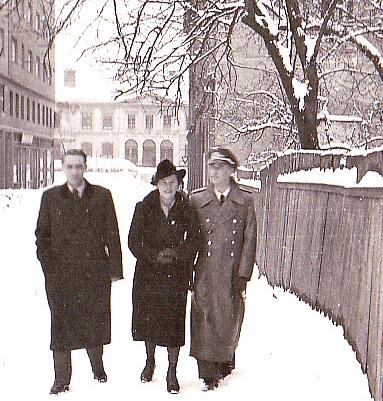
Poldi on holiday with his parents in Marburg, a historic city in central Germany, March 6 ...
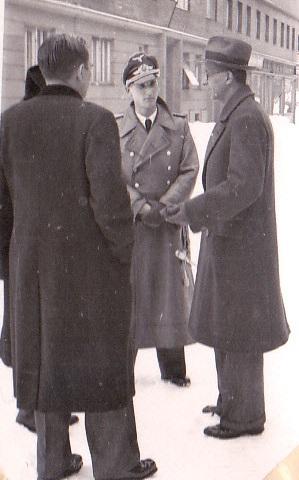
...where they met up with Prof. Matzl.
16 March 1942: This morning about 6 o’clock I was back in Morlaix again, a whole day too early. I couldn’t know that I would have such good connections all the way through. I was already in Linz that same afternoon and waited an hour for the commuter train from Vienna, upon which I travelled through Nuremberg and Metz to Paris, where I arrived at 6:30pm yesterday, on the 15th. My stay in Paris was also very short and I was able to travel by train direct to Morlaix the same evening, where I was happy to arrive this morning. The trains were very full!
23 March 1942: My last letter was written from Morlaix. At that time, I wanted to fly to Holland, but that was impossible due to the bad weather. So I took the train by way of Paris, Brussels, Antwerp, Rotterdam and The Hague. Then I had to wait a couple of days and was finally able to fly back to my unit (Katwijk-Leuwarden). But it was still a whole week until I was back with my comrades again. This time, I travelled by train during the day, so I was able to see something new. Yesterday we were transferred again and now, after a long time, I’m back in France where I flew for the first time (according to the flight log book: Le Havre, after a relocation flight from Leuwarden to Calais and following a layover, on to Le Havre, that is, 710 km overland).
28 March 1942 : I just received the photograph of my family, taken by the photographer Fürst in Leoben during my furlough; [it was] posed just right, but the main thing is, everybody is on there!
Everything is happening at once here. Recently, we’ve been waiting for a big offensive almost any day now. All seems very normal at night now, but, at the same time, the English have had big losses. Tonight they tried to play a trick on us. You‘ve certainly heard the special reports on this. We were happy to be able to fly a few low level attacks on them, but the Tommies got hit so bad during the night that everything was all over by the early hours of the morning, around dawn.
4 April 1942: For the moment, there’s nothing really going on here (Le Havre), so it’s really the calm before the storm. But at night there’s a lot happening. The last few nights, I was able to watch the entire air attack from my window, which gives me a good view of the whole city and the entry to the harbor. Once a bomb hit the water about a hundred meters away from me, so that I was pushed gently away from the window. But the Brits score so few hits, that it’s a shame to waste so many bombs. Most of them fall in the water.
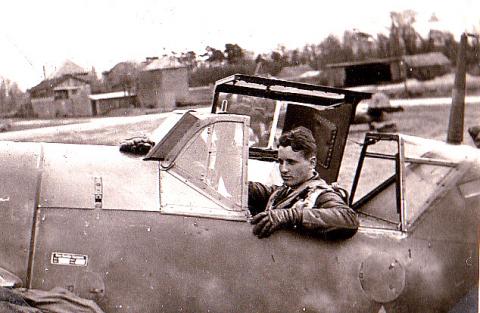
Poldi in the "readiness seat" (Sitzbereitschaft) in Le Havre
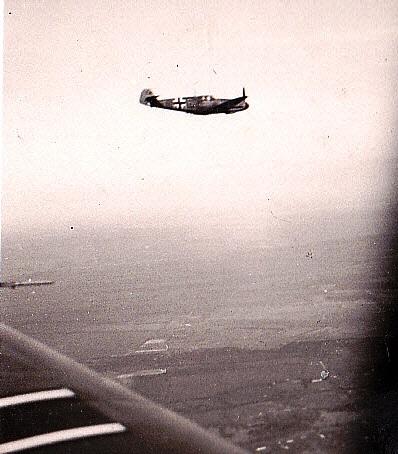
Transfer flight to Triqueville in a Me 109 on April 10
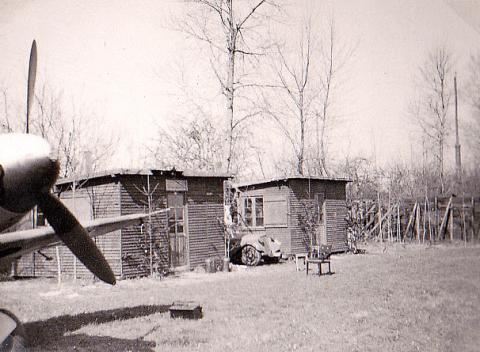
Triqueville living barracks, April 12, 1942
11 April 1942: We’ve been transferred again [Triqueville]. Although not particularly far away (40 km), there’s the usual confusion. I’m on the left bank of the Seine now, on a small square [presumably Beaumont le Roger], in the middle of the countryside. It’s a big meadow. We live in a place seven kilometers away, with about 7,000 inhabitants, in the best hotel in the region. I don’t believe we could find a bigger hotel anywhere. We’re all glad to be out of Le Havre, since the nightly bombing attacks didn’t allow us to get any sleep. On Easter Sunday night, they dropped 12 bombs on the square without damaging anything but the grass.
Now I’m sitting in a deck chair in front of my plane and “helping them wait.” None of us can understand why the Tommies no longer come over by day. Apart from the daily combat alarms, we hardly fly any more.
It’s all wonderfully green here; we have the feeling that summer is just ahead.
19 April 1942: Today I’m sitting at my command post, on duty. I was sitting here a few days ago, when there was quite a hubbub: A large of number of incoming flights and an aerial combat, with about 150 English fighter planes and bombers... and I had to sit around down here. Today, my plane is right in front of the door and there’s really nothing going on. It’s Sunday today and the Tommies aren’t flying, after all; only a few Poles and other Legionnaires.
Day before yesterday, we had some incoming flights again and, once again, no move on the part of the enemy: Spitfires were playing blind man’s bluff with us, and us with them. The cloud towers had something to do with this, since they all flew around behind them, but, on the other hand, there was no shooting. We all flew quite a bit, which was, of course, another morale booster.
25 April 1942: The English have now started yet another offensive on the Channel and came off second best for the most part. What that’s all supposed to mean is not clear. The bombs never hit their targets and are mostly simply jettisoned. But the fighter protection is very strong. Today, I couldn’t even count the number of Spitfires swarming around the bombers. They were estimated at 150 to160. Six were shot down in our sector yesterday. It was an exciting time. There were no losses on our side.
6 May 1942: It is very hot, cloudless, almost no wind. We’re sitting around in deck chairs in battle-preparedness. Strangely, it’s been completely quiet for two days. Day before yesterday, we flew two missions. We had some serious aerial combats in the morning. We chased the Tommies right back to the Isle of Wight. In the afternoon, during our second mission, there was aerial fighting all the way to the French coast. The English were more numerous than we were. There was a lot of excitement north of Fécamp and the air was full of tracers and smoke. Well, we’ll even the score next time around.
9 May 1942: For the moment, everything’s quiet around here. This doesn’t usually last more than a couple of days, though. So we can calculate fairly accurately when something is going to bust loose again. The last attack was on 6 May, that is, it will be time soon. There was a big alarm yesterday, and we all took off, but the enemy wasn’t stirring. On the 6th, though, there were big dog fights. There were about 100 to 120 English fighter planes up there. The whole sky was full of planes [Geigen]! We flew right over into the thick of it and it worked: the whole formation dissipated and the Tommies disappeared, flying away downwards away from us. Just off the English coast our squadron got into another dog fight, but the English wouldn’t really be drawn into a fight. There was wonderful weather and we had a marvellous view of both coasts from the middle of the Channel. It was so beautiful and such clear weather that I could see the Isle of Wight in great detail and the whole coast of Dover quite exactly.
One time we attacked a whole bunch of 30 Spitfires. There were only three of us, they saw us too soon, we were forced back, and our lead plane got shot down. But we got even during the next English large-scale attack: we dove right into a whole pack of them, all Spitfires, blew them up and 5 Tommies went down in flames.
21 May 1942: I’m still lying around on the same meadow as before. I was first quartered in the house of the village bank director. Now we’re in a beautiful house. There was an almighty ruckus around here in the past few days. On the 15th, we flew to Portsmouth, over Brighton and back, in the twilight, in very bad weather. We stayed there for a long time and only landed as it was getting dark... no sign of the enemy at all. The next day, our “English comrades” were kind enough to pay us a visit. There was a lot of aerial combat with a lot of Spitfires. At one point, our leader [according to the flight log book: Oberleutnant Meinberg] shot down a Spitfire in front of the whole squadron. It was something to see, the plane all aflame and the Tommy bailing out with a chute. Then our squadron flew over the Channel and we attacked an English fighter unit near Hasting. They withdrew in a hurry, though, only the last one stayed there to fight for a few moments. Our squadron leader (according to the fight log book entry Oberfeldwebel Heinzeller) shot the Spitfire down. The Tommy bailed out with his chute and landed in the water off Hasting.
To the fighter bombers:
The Red Fox emblem for the new fighter-bomber squadron
NOTE: In the early months of 1942, Hptm Frank Liesendahl (scroll down) was ordered to build a new squadron within the JG2 “Richthofen” that would go by the name 10/SG2 (Schlachtgeschwader - specialized for ground attack). In other words a new fighter-bomber squadron. This he did. Lt Nippa had the idea it should have it's own emblem representing “the red fox.” Hptm Liesendahl's new bride, a designer at the Messerschmitt airplane company, designed the fox with a ship in it's mouth (pictured above). In late May, Poldi made the change from the fighter squadron JG2 to the new squadron 10/JG2 when the aircrafts changed from the Me 109 to the new Fw 190.
25 May 1942 I’ve been transferred to another unit. It’s very beautiful here in Beaumont le Roger. Our lodgings consist of a little castle in green surroundings. Since I already know all the other people, I don’t feel like a stranger.
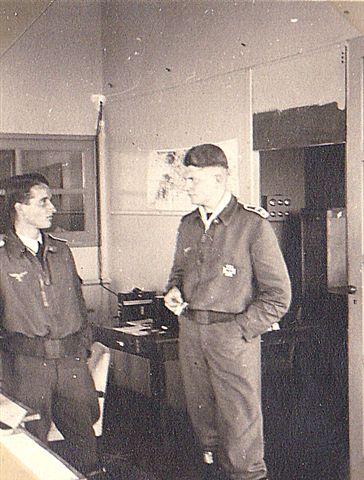
Poldi and Obergruppenführer Limberg on standby, June 4, 1942
13 June 1942: (Le Bourget-Paris) I’ve been travelling a lot recently. I once flew from Caen to Wevelghem and drove to Lille at night. The next day I went to Paris and back to Caen by train. I’ve been assigned to a new type of plane, the Focke Wulf Fw 190 (A-2) and after flying in, I made the ferry flight to Caen.
29 June 1942: Yesterday evening I flew my first combat flight with my new Fw 190. We did some reconnoitering flights on the English seacoast between the Isle of Insel Wight and Selsey Bill.
7 July 1942: Today I half-way participated in the sinking of a 10,000 ton submarine mother ship [the letter with the report has unfortunately been lost!]
9 July 1942: Today we attacked an English convoy of ships west of Portland [Dorset]; we shot out of that convoy ships that were all together in tonage 20,000. In one attack we sank one 2,500-ton ship and severely damaged three more. I had to break off my first approach because my position was unfavorable. During a second attack I was shot at from all barrels at once and at the last moment they shot a rocket barrier right in front of my nose, so that I was still able to drop my bombs and yank my plane around. My bombs, of course, fell right next to the target. When we landed the fighter squadron leader came over; short briefing, in which, among other things, he said, “On behalf of the Führer, I award you, Lieutenant L. Wenger, the Iron Cross 2nd Class, for your decisive participation in the sinking of a 10,000 ton ship” (on 7 July 1942 in the Solent, off the Isle of Wight). Then there was a breakfast with champagne. Everybody had great fun anyway. Another formation at the same time had attacked an English airfield and hangar and destroyed a plane on the ground. We were in a really great mood. A war reporter was here, too, and took photographs. I’ll send you the pictures. [see picture at top of this page.]
12 July 1942: This afternoon I flew another mission and sank a watch ship of about 800 tons in the harbor of Brixham (Bay of Torquay) with a direct bombing hit to the starboard side of the ship. The other plane damaged a 4,000 ton freighter so severely that I must assume that it sank, too. This time, there were two of us. It wasn’t easy to approach the ship, since the harbor was full of barrage balloons and flak and very strongly protected. So we struck all at once, by surprise, out of a beautiful blue sky, flying through the barrage balloons, firing at the ships with everything we had. My ship sent up jets of flame from the superstructure after being shot at using my guns, that’s all. The bombs did the rest.
My ship capsized in half a minute, breaking in half right in the middle, while the other ship began to sink stern first. There was so much flak that we had to give up hope of being able to observe much of anything else. At any rate, I was very happy over this success, since it was the first ship I ever sank all by myself. Yesterday, my superior officer (Hauptmann F. Liesendahl) and another lieutenant also sank a destroyer in this area, that is, everybody got one. Unfortunately, the ships aren’t always where we’d like to have them.
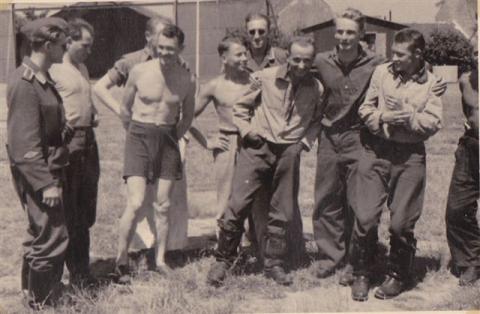
Celebrating an air victory by Deinzer and Vock
15 July 1942: I flew my last mission on the 13th. I really wanted to attack a port. But the English coast was under clouds. So I flew towards an isolated watch ship and attacked it, with the wingman [of] my squadron. My bombs hit the ship, which was running towards the English coast at high speed, amid ships, right before the stern. My wingman’s bombs also landed right in front of the stern. Then everything happened very quickly. There was a gigantic explosion – the boilers must have blown up – and when the steam and smoke cleared away, all we could see was a trail of foam, with a whole load of ship’s parts (planks and a rubber dinghy) floating around at the end of it. There was nothing to be seen of the crew. At the same time, I got a direct machine-gun hit in the wing. The watch ship was about 800 tons and looked just like the one I sank in Brixham the day before. It all happened so fast, that I hardly had time to shoot at the superstructure when I was attacking, and what’s certain is that no more radio signals were received from the ship afterwards. This was about 5-10 kilometers southeast of Dartmouth.
A few days ago, the squadron slaughtered two pigs they had and gave a party. Everybody could eat as much as he wanted, and there was still something left over.
July 9, 1942, front row from left: Oblt Fritz Schröter, Lt Leopold Wenger, Obstlt (Lt. Col) Karl Hentschell, Hptm Frank Liesendahl (squadron leader), Lt Erhard Nippa. In front, Bim the dog. (click to enlarge) This picture appeared in a newspaper.
21 July 1942: Unfortunately, I wasn’t there during the last two missions, since I had to turn around and break off my mission due to a technical problem, and during the next to last I was on duty at the command post. That is really the most uncomfortable thing there is, just sit there and wait. Now and then you get a radio message and you look at the clock and realize that the attack must be taking place at that very moment. And then you wait for them to return and get a shock when they’re not all there.
No, I’d rather fly every mission than wait at the command post. And during this mission, our leader [Liesendahl] wasn’t there afterwards. We simply couldn’t grasp the fact that our leader was no longer with us. A few weeks ago he sank an English destroyer and now he had probably been shot down by flak. I flew my best bombing missions with him as squadron leader and learned everything from him, so to speak. He already had the German cross in gold and should have gotten the Knight’s Cross in a few days. We all hoped that he had just been captured. That wasn’t ideal, but it was better.
My suitcases are all packed again, since we’re being transferred again tomorrow. Yesterday and day before yesterday, I was still far out overland. The day before yesterday I was in Bordeaux, Vannes and Lorient. I flew from southwest France along the Atlantic coast to Caen (1170 Km.). Yesterday I arrived in Albertville and then flew to Amsterdam-Schipol and back again in the eveninng (another 1070 km).
28 July 1942: A couple of days ago, Oberleutnant Schröter asked me whether I felt like flying a mission. I’d like to see the guy that would say “no” to that. So we flew quickly to our home port and off we went, my wingman and me, with a 500 kg bomb. We had to fly some armed maritime reconnaissance in the maritime region of Start Point (east of Plymouth). We couldn’t see any ships clearly, so we flew over the land. That way we could see exactly what our bombs did to our terrestrial targets first. In the evening we flew back to our port.
- To be continued -
Category
European History, Germany, Leopold Wenger, World War IILeopold Wenger's letters from France, July-December 1942
- 4703 reads
Poldi (on right) with squadron buddies having some fun for the camera showing off their new sweaters with the "Red Fox" squadron emblem.
copyright 2013 Wilhelm Wenger and Carolyn Yeager
Translated from the German by Carlos Whitlock Porter
29 July 1942: Today I’m back at our home port with my squadron leader and a small staff of technical personnel in readiness. I still have to do three days standby service and then I’ll be flying back to our home port and will be relieved by another squadron there.
Today I flew my first mission again. We attacked the port of Brixham again, where our leader was lost on 17 July. It was 16 hours 19 minutes when I flew through the harbor barriers, which consisted of 20 to 30 barrage balloons, with my wingman in a low-level attack, shot up a few small ships and aimed a direct bomb hit at the stern of a 4000 ton freighter. Unfortunately, I couldn’t see what effect it had, since their defenses kicked in quickly and the flak was being aimed very precisely. They made a lot of noise during the night when their bombs went off. As we flew off, we were pursued by a few Spitfires, but we were faster. On the high seas, I saw still another small tugboat. Our cannons spoke very clear language. We left it there, letting off a big column of smoke. So I was in the same harbor twice in the same day, today, in which I had already sunk one watch ship already. Today’s freighter was also seriously damaged, that’s for sure.
2 August 1942: I already know my way around the Brixham area pretty well, and the surrounding area. On 31 July, I was unlucky again. I flew from our home port (Caen) to St Andre, which is 125 km away, and forgot to lower the landing gears for both wheels when I was landing. So I landed on one wheel, that is, on the right wheel only, and the left wing. I was very angry with myself for making such a stupid mistake. So my plane is laid up for a couple of days for this piece of stupidity.
4 August 1942: Yesterday, I flew another mission that knocked me out like no other. First, I flew with my wingman in the vicinity of Falmouth on the western corner of southern England. The long stretch of water is already enough to wear you out. Then we ran into a lot of really bad weather, which got so bad over the English mainland that you could hardly see your hand in front of your face. Then we smoked a couple of small towns as reprisal for the terror attacks on small German cities.
On the return flight over England, we ran into the thickest fog; for good measure, a couple of electrical instruments conked out, so that I could no longer control my altitude, and I even saw a few telegraph poles go sailing right by my cabin window. Instinctively, I pulled back the control column and then, suddenly, I saw a couple of barrage balloons in front of me, which I was luckily still able to avoid hitting. What’s more, I had lost my wingman and was sure that he had flown into one of the mountains. He thought the same about me. When we landed again in our home port, we were happy to see each other again. After eating, we flew back to our usual home port. But I was shook up like never before.
12. August 1942: Yesterday I flew off with two planes to attack the city of Salisbury and destroyed the gas works, while my wingman destroyed the railway station. We got chased by a lot of Spitfires; they followed us to Portland, but everything was all right. I got the Iron Cross Ist Class for this mission, which I flew with an NCO, who flew the second plane. My wingman got the Iron Cross 2nd Class. The mission against Salisbury was carried out in strong wind, and a heavy swell at sea, too. We flew past the western tip of the Isle of Wight flying low, and then back again, surprisingly, in a big ring around the north of the city. So there were no air raid alarms going off in Salisbury and the streets were full of people and cars. There was a lot of traffic.
(From personal conversation with my brother, I think I remember that they were supposed to fly attacks against English cities as well from now on, in reprisal for the English bombardments of German cities, in which valuable cultural monuments were destroyed. Approval was even issued to damage Salisbury Cathedral if necessary, but my brother hadn’t the slightest intention of actually doing so. -W.W.)
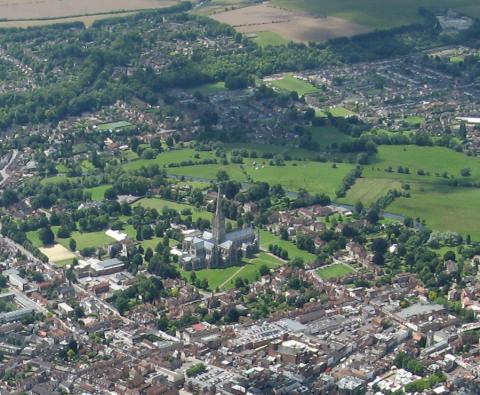
View from the air of Salisbury Cathedral and all that is built up around it.
I already recognized the city by its magnificent cathedral, where most of the English kings are buried; it’s an English national shrine. I also saw a big gas works, and immediately shot up the gas containers with my cannons, it was very easy to follow the tracers from my machine guns and could see exactly where they were going. It began to burn, then the bombs exploded behind us. My wingman attacked the railway station. He shot up the locomotive of an incoming train and aimed a direct hit on the train with the bomb. The whole city was completely surprised, there was no air raid alarm. The numerous barrage balloons were lying around the city on the ground. It all happened so fast. Flying low, I flew over a few flak positions and avoided them; it was all a little bit too quick for the chaps on the other side.
16 August 1942: I flew back over England again yesterday, too, and attacked the city of Worthing with my wingman, at around 18 hours. The flak was very accurate this time, they were already shooting as we approached. But that didn’t prevent us from finishing off a couple of big business complexes with our bombs. The weather over there was bad.
By the way, as for Dad’s question: my tonnage proportion amounts to 6200 tons (warship tons), up to now. This is equivalent to 17,360 British tons, but so far I’ve only had warships in my bombsights.
21 August 1942: On the 18th, we flew an attack against the Isle of Wight and bombarded the city of Ventnor. The row houses received a direct hit. They didn’t have time to set off any air raid alarms, either. So there was a lot of traffic in the streets. The flak only started firing when we had already turned around to fly off.
Click on image for enlarged view.
At dawn on 19 August, we got an emergency report that English were attempting to land. I was supposed to take off immediately with three planes on an armed reconnaissance mission. Since I figured there would be ships worth shooting at, I loaded my plane with especially heavy bombs. But I was very unlucky, as well as lucky at the same time. In rolling along to take off I broke the landing gear, and I slid across the grass right on my bombs: not a very pleasant sensation, when you think of the explosive power of those bombs or what they’re capable of doing during an attack and you can watch it, too.
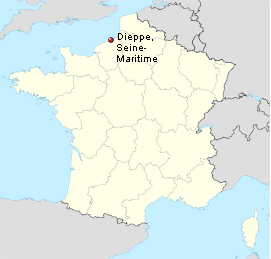
So I missed the first mission, took off from my second service port in a Messerschmitt 108 Typhoon to St. André to pick up my Focke-Wulf Fw 190, and then back to Caen. I was already afraid I’d get there too late, and the whole scare might be over by then. So my first mission began at 11 hours 30 minutes. When we reached Dieppe, the combat zone was completely befogged, cloaked with dust, smoke and dirt. The English fleet had fogged itself over completely. Muzzle flashes could be seen all over the place, there were fires burning all over the land from planes that had been shot down. On the beach lay burnt-out tanks which had been destroyed hardly 20 meters from the water right after the landing.
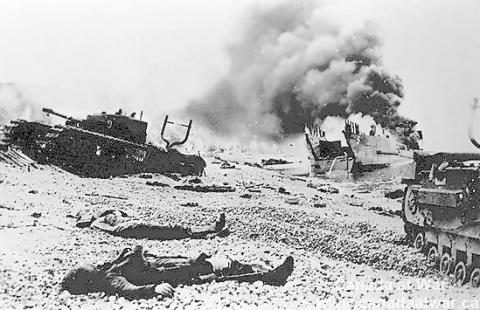
What Poldi Saw: Destroyed landing craft and tanks, along with dead Canadian troops at water's edge on Dieppe Beach.
There were a lot of fliers swimming around in their inflatable dinghies. At precisely 12 hours I set off with my unit on a low-altitude attack. At the same time, a German bomber just in front of us crashed vertically into the sea, not far away from us. That certainly wasn’t good for our morale! We went straight on ahead in the fog and suddenly, without seeing it, found the cause of all this fog, a very big English destroyer. We shot at it with all our machine guns and cannons, and dropped bombs on it at the same time. The heavy bombs detonated exactly underneath the stern of the destroyer. But then I got shot at with flak, all calibres. Too bad I wasn’t able to hang around and watch this fiery magic show any longer. The three other machines flying with me, damaged a couple more ships and shot down a Spitfire. In low-level attacks, we shot up the landing craft, which were stuffed with men. The effect was devastating, everywhere.
When I flew my second attack at 15 hours 30 minutes, the English had already "victoriously" withdrawn. The artificial fog was no longer much help to them. I attacked a second destroyer and, flying at low altitude, planted a very heavy bomb on the ship in the middle. During my attack, I was shot at very heavily, flak from the same ship. But when the bomb went off, there wasn’t a gun left firing. There was ONE detonation, simply magnificent! A black cloud followed the explosion and cloaked the entire ship. I then got chased around and shot at by many Spitfires and was unfortunately unable to observe any more of the final sinking. I got a lot of scale off the flak. Surface areas, motor plating and landing gear were all shot through. The cabin had two direct hits, but they got flattened out against the overhead armor. The mission was well worth it.
At around 17 hours, I started off on my third mission against the fleet, which was still trying to escape. Just before we got to Brighton, we finally reached a group of large landing craft, which had also set up barrage balloons. We attacked immediately. My bombs unfortunately bounced right over the ship and detonated about 10 meters from the ship’s side. Then I shot up the superstructure until it caught fire.
After this, the sea fight at Dieppe was over for us. Our squadron sank two destroyers, two big landing craft of 2000 BRT each, two watch ships and one Spitfire was shot down. One of our planes had to do an emergency landing near Dieppe. The squadron leader came to see us today and told us how it looked to him. The English were said to have been mowed down in heaps in front of the barbed wire entanglements by machine gun fire and killed by mines, which had been planted all over the place. The armored vehicles were mostly shot to pieces when they were still in the water. In any case, it’s a big defeat for the Tommies. Exactly what got sunk, will become clear over time. Let’s hope the English treat us to a repeat performance sometime soon, so we don’t get out of practice!
30. August 1942: I was over there again a few days ago, in the vicinity of Falmouth in Cornwall. You couldn’t see any ships, so they must have been keeping to their secondary targets. We blew up a few fine houses according to the motto “Never miss an opportunity”.
6 September 1942: On the 2nd, we bombarded the city of Ventnor on the Isle of Wight. They were shooting flak like mad. On the 3rd, I had to interrupt my service on the English coast, since the weather was too bad. That was near Dartmouth.
On the 4th, I flew with four planes in an attack on the West Channel. We flew over the city of Torquay, which had already been given a good thrashing by us on another occasion, and showed the city of Paignton a thing or two, demolishing trains, railway station and large houses, under heavy and accurate flak. One of our planes was shot down in flames (according to the casualty report, Uffizier Walter Höfer). At sea, we were attacked again, but without success.
On the 5th, we flew back home to our place, but on our way we came into sudden contact with the enemy, with 43 English four-motor bombers. Unfortunately, we saw them too late, and could no longer get into attack position, so there was nothing we could do -- after which we flew back over Rouen at 7000 meter altitude.
18. September 1942: Yesterday we flew a mission which unfortunately ended quite tragically. Together with my wingman, an NCO (according to the casualty report, Uffizier Walter Wandschneider) we were attacking a gas works in Worthing, low altitude flying, and exploded the bombs between two gasometers, which caused the whole thing to blow up. My wingman was busy bombarding the city. At exactly the same time, we came into contact with English planes. We were able to get away from them and reached the open sea despite heavy flak. In the middle of the Channel we were suddenly surprised by Spitfires, which attacked immediately. That’s how I lost my wingman. I saw him fall vertically into the sea, where I saw it hit the water, after which they started banging away at my machine, but I succeeded in getting away and reached home safely, although a 2cm shell projectile tore a hole in my gas tank, which caused me to lose so much oil the whole plane was like a sardine in oil. It was ghastly to see how fast it all happened and I couldn’t do anything about it.
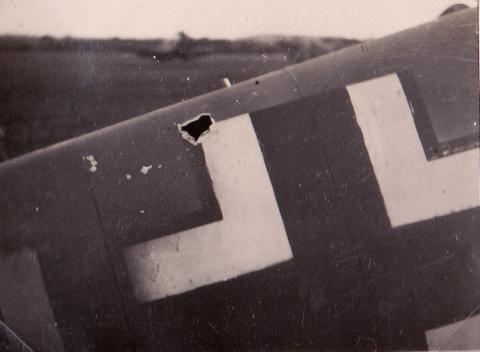
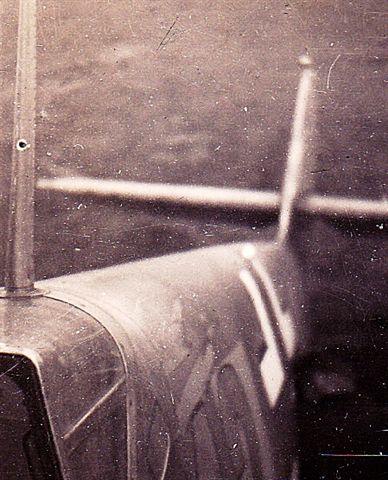
Damage to Poldi's plane -- holes in the wing and in the antenna
I was unable to fly in an even bigger attack with my squadron today, four ships were sunk at one time.
* * * * *
* In April 2001, I received an email from a Canadian Spitfire pilot, Barry Needham, who shot at my brother in aerial combat 59 years ago and caused the bullet hole in the gas tank of his Focke-Wulf FW190. His information is perfectly consistent with my brother’s log book entries. Later, I found a remnant of the 2 cm projectile removed from the fuselage by the mechanics which our father kept as a souvenir, even engraving the exact date on it. -W. Wenger.
* * * * *
20 September 1942: It’s Sunday today and we have nothing to do. So I’m just sitting in my room in the castle where we live, where we already lived one time before. Even Louis XIV is supposed to have stayed here (a lot of things must have looked different then). [He means it's not all that comfortable in 1942 -W.W.]
We flew a mission in the West Channel yesterday. I flew with an NCO, who appears in the photograph enclosed with this letter. We flew together once before, at Salisbury, where he got the Iron Cross 2nd Class. We flew armed reconnaissance near Start Point. Off the city of Salcombe I sank four landing craft. I then shot up a group of tents, probably flak positions, and other buildings, with cannons and machine guns. The flak was very heavy and quite accurate. We flew through the valleys, at very low altitude, to make sure the clouds of smoke from the explosions were on top of us at all times. At the same time, my squadron leader put an anti-aircraft gun that was firing at us out of action in a direct approach attack. Two men fell dead, the third man ran away.
Yes, our squadron won recognition from all over the place for our successful defense of Dieppe. Our squadron captain (Oberleutnant F. Schröter) received the German Cross in gold; soon, he will probably get the Knight’s Cross, too. He’s already sunk and generally destroyed a whole lot of different types of ships, I can tell you. Our captain (F. Liesendahl) has now won the Knight’s Cross, somewhat late.
Pilots of the Squadron - 1942
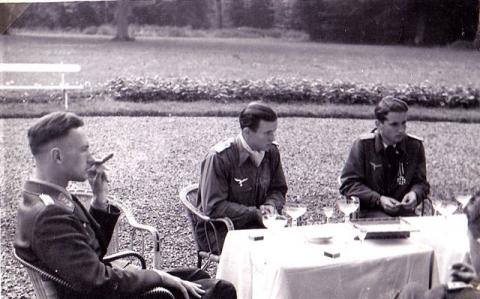
30. September 1942: The picture where I got the Iron Cross 2nd Class also shows our Squadron Commander (Oberleutnant F. Schröter) on my right [far left, with cigar, in the picture -ed] – most recently, he got the German Cross in Gold and the Knight’s Cross only a few days later. During my last mission in Bembridge (east coast of the Isle of Wight) we destroyed a couple of houses for the second time. We had the worst sort of weather over the Channel that you can imagine, had to fly around a couple of showers.
I was back in northern Europe the other day: in Belgium and also Paris, in a Messerschmidt Typhoon 108. Each time I had to pick up a Focke-Wulf FW190 and fly it back here.
6 October 1942: I flew another mission yesterday in bad weather. I wanted to fly to England near St. Albans, but the land was completely beclouded and so we bombed military objectives near Swanage. I hit an artillery position and damaged it very badly and my squadron leader sank 4 landing craft. Since it was pretty dark the red of the flak tracers looked very strange, really ghostly. The clouds over the sea were often only 20 to 25 meters high; but it was a trim little mission nonetheless!
9 October 1942: These two photographs, taken during yesterday‘s mission show Dartmouth in the evening time, where I attacked a number of landing craft and damaged several with my wingman. We attacked the area – as you can see from the second picture -- flying very low altitude. There was no flak.
It was quite a different story this morning. This time, we went further south of Dartmouth towards Salcombe. Our target this time was landing craft and I sank two of them. (We‘ve sunk a total of 6 of them). Apart from that, we destroyed a stone bridge and a building. We didn’t have the usual 500-kg bomb with us, for the first time, but, rather, four 50-kg bombs. But they weren’t asleep at the anti-aircraft batteries today. There was a lot of lead flying around. During our flight back we got into a dog fight with two Spitfires, who were kind enough to accompany us all the way to the middle of the Channel. Then I landed on the former English island, Guernsey. It’s quite a beautiful country and we’d really like to have time to see it without so much excitement.
15 October 1942: Day before yesterday I was back in England again. This time we attacked the city of Shanklin on the Isle of Wight. I looked for something like a big four-story house and dropped my bomb very exactly, flying low, then watched the effect from a backward curve. I never saw anything like it before. First, nothing happened, then it was like somebody had turned on all the lights in the whole house. Then the walls slowly collapsed outwardly and a gigantic dark red column of flame burst out upwards from the rubble. I think there must have been something highly explosive stored in the house. My wingman also aimed a very beautiful direct hit, but the effect was nowhere near the same.
Yesterday evening, we were over there again, but in mid-Channel my wingman had to turn back due to motor damage.
11 November 1942: I‘ve already been away from our home eyrie for a week now and I’m sitting in a beautiful palace, which must have belonged to really rich people, in the region of Lille. (According to the log book it must have been Merville). After a little preliminary practice, we started out on a concentrated reprisal attack on Canterbury yesterday afternoon. It was like a Reichs Party Day! I’ve hardly ever seen so many machines in the air at the same time. We flew over the Channel flying at low altitude, northeast of Dover, and quite low straight to the city of Canterbury; in some places we had to fly through barrage balloons and then a pretty concert began. We dropped many thousands of kilograms of high explosive on the city at low altitude and shot up the houses with everything we had. The city was pretty much already destroyed anyway, but as we were flying away all we could see was a great, big, smoking, dusty area. Once again, the red and white of the flak and the tracers from our machine guns and cannons looked downright ghostly. On the flight back, anything that looked like a house or a haystack was attacked by many machines.
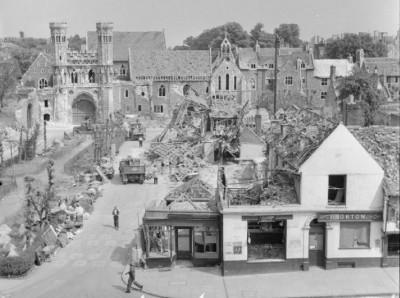
This looks like a painting, not a photograph, of some of the damage in Canterbury around the Abbey in 1942. The Germans did not bomb the Cathedral, which would have been a huge morale blow to the British, yet the Brits show no appreciation - only calling it "a miracle" [as if it were due to God, not the Germans] and saying "10,445 bombs dropped during 135 separate raids destroyed 731 homes and 296 other buildings in the city."
Wherever you looked, you saw fires everywhere. The anti-artillery positions were silenced after the first fire storm. In the meantime, other machines shot down the barrage balloons over Dover, in flames. It was a picture you don’t see very often. There was no sign of English fighter planes anywhere. I guess it was just all too much of a good thing for them. We landed at our home port just as darkness was drawing in.
From the Channel to the Mediterranean - Poldi barely survives crash landing due to engine failure
21 November 1942: (Istres) I’ve been sitting here on the Mediterranean coast for several days now, and I’m trying to get myself together. I didn’t get here by plane, but by train, since there’s nothing left of my plane except for a few bits of rubbish. During a flight over the French uplands on the 17th, my motor suddenly failed and I had to perform an emergency landing.The terrain was naturally no better than in other mountainous areas and the chances of success were not very high.
Nevertheless, my belly flop would have almost been successful if the mountain meadow hadn’t been surrounded by a stone wall 2 meters high. Since I had no other choice, I had to go ahead with it. It was a bit nerve-shattering, but at least it was exciting. I lost consciousness immediately, but came to just as the machine or the piece of it I was still sitting in, finally came to a stop. To my great astonishment, to my right, next to me, 10 meters away, I saw the entire tail section of my beautiful plane standing upright, stuck in the ground.
Now, I wanted to get out as quickly as I could, but the cabin wouldn’t break open. So I had to eject the cabin roof with the help of the explosive charge built in for that purpose. Then I climbed out, but could not climb onto the wing, as is usually done, because there was none there; it had broken off. I was slowly running out of strength.
Fortunately two Frenchmen came along, who grabbed me underneath the arms and dragged me to a car standing not far away. They took me to the Gendarmerie in the next village. The French officer drove with me to the nearest hospital. There I was held down on a table and a strange sort of doctor began to wash, and stitch up my head. Finally that was over, and I had to spend a night in this odd little hospital. All my bones were hurting and the mosquitoes wouldn’t let me rest during the night.
You can imagine how happy I was when a German doctor came to pick me up the next morning and took me to Lyon, where I was lodged in a hotel, since there was no military hospital at that location yet. So I was naturally anxious to get back to my unit as soon as possible and see our military physician. I got my wish during the night of 19 November (Poldi‘s 21st birthday -W.W.). In Lyon, my personal property was returned to me after being held for safekeeping by the French Gendarmerie. Only my briefcase looked the worse for wear, all torn up, with all the most valuable items missing: camera, fountain pen, Combat Honor Roll Clasp, a few tablets of chocolate, irreplaceable souvenirs. I miss these mementos, which can no longer be replaced.
Now I’m sitting on an express train, with the rest of my things, travelling to Marseilles. I arrived at around 22 hours, and was immediately picked up by our special deployment officer, an Oberleutnant, since I had been able to inform my squadron of my arrival; this was the beginning of an endless overnight journey. This drive, under a full moon, would have been certainly very beautiful under normal circumstances, but all my limbs were hurting and I couldn’t move. We arrived early in the morning, at about one o’clock, and I finally got to bed.
During the next day my headache got so much worse that I suddenly had to visit the doctor. When he removed the head bandage, he saw that the skin on my forehead was full of pus, so back we went again, in the car, 60 kilometers on bumpy French roads, to the nearest military hospital. There my forehead wound was opened again and the stitches were removed (I’m getting used to it!). Then began the skull-throbbing trip back to our new billet.
Today, my skull is all right again, at least so far. My wounds have all crusted over and my ear is growing back together in one piece. My eyes are still a bit red, but I can see all right. The only thing is that, now, other parts of my body are hurting that I hadn’t noticed in the first few days after the accident. The pains in the small of my back have gotten so bad that I can hardly move. But in the end, even that will disappear.
Where we’re stationed there is a airfield with a unit of the French Air Force stationed on it. Relations between the two units are very cool. We don’t trust each other at all. The region is on the coast, and something entirely new for me. There are steep, rocky mountains and everything looks like a stone desert. There is almost no construction on this terrain. A few vineyards and fairly large olive groves are all you see. Everything the French do is one huge pigsty, including the lodgings. The sanitary installations are in a catastrophic condition. It is certainly no accident that this country lost the war. Among the French, soldiers are considered second-class citizens, and are treated like it. I can’t understand this attitude.
The weather here would be good, if it weren’t for the wind. I think they call it the mistral. So far, I’ve only seen blue skies, but nevertheless it is surprisingly cold, even in the sun.
I’m doing everything I can to get my poor bones back in shape again, to see the region around here from the air. Unfortunately, it will take some time before this is possible. I’m glad the doctors haven’t told me to keep to my bed, that was what I feared most.
28 November 1942: There’s been a small change where we are concerned. The disarmament of the French troops. They were completely surprised when the announcement was made—at dawn. Most of them were relieved, since it meant they would be released from service and could remain in France. To us, it is rather a comfort not to have these fellows hanging around in our vicinity. As for my physical condition, I’m getting better—so far, so good. My right ear has healed. The scabs on my face are gone now, thank God. My forehead wound is not entirely healed yet. The doctor told me today that I must be patient for a while. They also washed my head. I couldn’t stand it anymore. My skull was itching all over from being bandaged up all the time. Now at least that’s over; the bandage is considerably smaller now. I don’t have to go to be bandaged up every two days any more, either.
2 December 1942: We’re moving about again. I got a medical attestation, which was issued—thank God—after a few formalities. Magnificent, I can fly again! So we’re leaving the Mediterranean coast. After an interesting flight through the Rhone valley we landed in Dijon after eighty minutes, but we had to stay put for three days due to the bad weather. I went to the doctor today and my head bandage was finally removed. I only have to wear an adhesive plaster for a while yet. All that remains is for my hair to grow back and for the red specks in my eyes to disappear. The main thing is, that flying is no longer a problem for me.
5 December 1942: I’ve been back at my old home eyrie for two days now. Since we couldn’t take off from Dijon because of the bad weather, I had a chance to see the city and was very pleasantly surprised. The city is very clean and doesn’t really look very French. Compared to the other places we’ve seen in France so far, for France it’s a rarity. We flew here from Caen. The situation in southern France was very changeable, but since no real combat missions could be flown the change wasn’t much to speak of, perhaps a chance to rest. In any case, we’ve seen something new, and that is worth something, after all. It sounds like a joke when I say that it is warmer here than on the Mediterranean coast, but it’s really so (influence of the Gulf Stream). I had to wear my sweater, it was so cold I couldn’t stand it.
I saw the doctor again today, it seems I’m now completely well again. The scrape on my head looks better already, almost completely healed and I can take the plaster off in three days. It’s just that the doctor doesn’t want me to fly any combat missions. But in a couple of days it will be all over. I’m only glad I haven’t missed anything important in these three weeks. We made an advent wreath that looks really good today. Now we’ve got to go looking for a fir tree or a spruce, since these trees are rather rare here.
10 December 1942: I’m feeling well again and I’m completely cured. Don’t need any more plasters. This is the first time I’ve seen things in proportion, since it all seemed more serious than it was. The scrape on my head is minimal. You can’t even see that my ear was injured at all any more. That I can fly without restrictions now is the best proof that I’m 100% OK.
Only an answer to your question: I didn’t have my other things with me during my emergency landing, but, rather in my luggage, which was in a transport vehicle on the ground. Naturally I was flying all by myself, but in this case nobody could have helped me anyway. It’s not a question of negligence or poor flying either, it must have been a motor fault; that can happen. Of course, nobody is criticizing me for anything. The commander (Major Günther Tonne?) also thought that I should have bailed out immediately, but I was flying so low I couldn’t.
It’s quite impossible to get a rest and relaxation furlough and I wouldn’t even think of it. I feel quite healthy, too. And then, I wouldn’t want to take a father away from his family at Christmas time by taking his furlough, although I can’t imagine anything more beautiful than spending Christmas with you.
15 December 1942: I’m feeling well, only the left eye is red. I still had my ring and my pistol with me. Nobody’s taking those two things off me; they’d have to kill me first. I flew again today and dropped some practice bombs, so as to keep in practice.
25 December 1942: Our Christmas Eve went a little bit like this: first I sat by the radio and at about 20 hours I celebrated, together with the whole squadron. They put a little music together, the mess hall was decorated really nicely. There was a murderous big piece of pork roast for everybody and drinks, so enough talk about my luggage.
30 December 1942: It’s gotten a little bit colder now, but the weather has gotten better. One of our squadrons carried out a foray against the English coast yesterday and shot down two Spitfires after dropping some bombs on an English city. Unfortunately, I couldn’t be there with them. We also chucked a couple thousand kilos of bombs on them this morning. Their anti-aircraft defenses were taken completely by surprise; they were shooting very badly. Then we flew over a stretch of English countryside and shot up a few houses on the way back.
End of 1942 letters -
Category
Germany, World War IILeopold Wenger's letters from France, January-June 1943
- 5212 reads
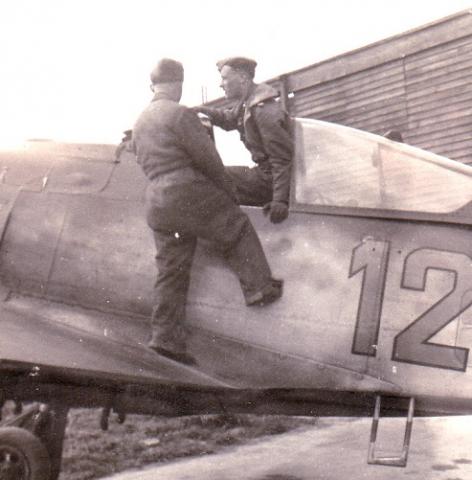
Leopold Wenger, Jr climbs into the cockpit of his plane as he talks with his mechanic. In April '43, Poldi was made squadron leader.
copyright 2014 Wilhelm Wenger and Carolyn Yeager
Translated from the German by Carlos Whitlock Porter
4 January 1943: We had some very strong wind and monstrous sea swells in the past few days. Heavy surf on the coast, like you hardly ever saw. I didn’t even celebrate New Year’s Eve at all this time. I was already in bed by 22 hours, since we wanted to convey our New Year’s Best Wishes to the tommies really early in the morning. But once we got outside on New Year’s Day, you couldn’t fly at all, the weather was so bad. So on the 2nd we bombed a small town, Knightbridge, until there was not much left of it. I took really good photographs during this attack. We were over there again yesterday. This time it was Shanklin’s turn to get it, a city on the Isle of Wight. The flak was quite accurate, but too late. Once again, we got good photos of the attack.
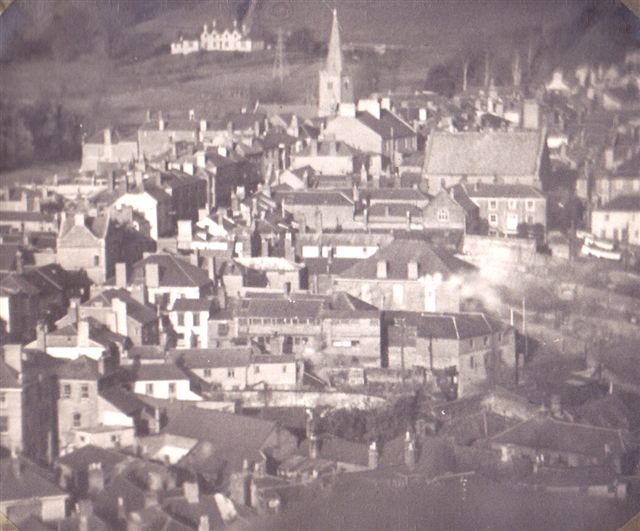
A deep attack was made into Knightbridge on Jan. 2nd (above) and on Jan. 3rd, Shanklin (below). Photos from Poldi's on-board camera.
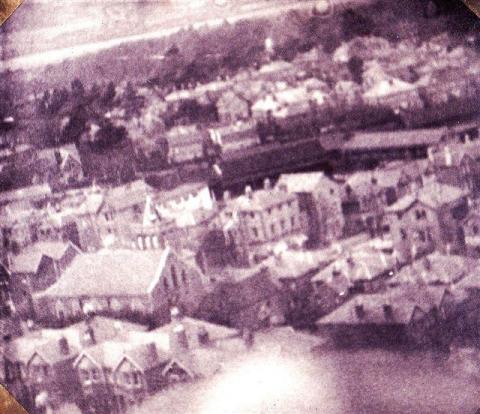
11 January 1943: Yesterday around midday, we attacked Teignmouth, a city on the southern coast of England, with heavy bombs. The effect was enormous. Whole rows of houses flew through the air. Unfortunately a good comrade of mine failed to return from this combat sortie. We hope he ended up in captivity. (According to the casualty list, it must have been Feldwebel Joachim von Bitter, shot down by a Typhoon of the 266th Squadron).
9 February 1943: Back from furlough. I got here about 5 hours and hit the sack right away, slept until breakfast. Although they roused me, I overslept. This trip was more comfortable than the last. I got a connection in Linz right away and a good seat. I kept watch in Schallerbach and actually saw the Hotel "Austria", where Mom stayed last summer. I also got a connection in Paris right away and went on to Rouen by fast train; but there I had to wait three hours. So I was able to call Caen and there was already someone waiting for me there, at the railway station. So I got back just exactly on time, three hours before I was supposed to start service. Not much has changed here. A few new faces and a few of the old ones stayed away. They’ve got a beautiful plane for me, so everything is all right.
14 February 1943: So I’ve got a new plane now (Fw 190 A-5 ). First I had to break it in for myself and drop practice bombs on a target area. Then it was back to work, over there. Yesterday I delivered my “business cards” on my official visit there. This time it was Dartmouth’s turn. We surprised them so much that the tommies never even had time to sound the alarm when they saw us. So the streets were very lively; very active anti-artillery fire and barrage balloons.
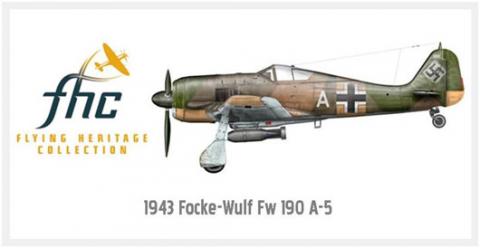
17 February 1943: Yesterday afternoon I flew back to England and gave Kingsbridge another good bombing. While I was doing it, I could very easily see the destruction left over from our last mission. There wasn’t much flak. This morning, we followed suit with a bigger squadron towards Shanklin on the Isle of Wight and gave them a good beating. They seemed to be very surprised, but their flak was very accurate during our approach.
23 February 1943: We had thick fog a few days ago, and our military activity was restricted to exercises, sports and education. In the evening, we sat down together as usual and chatted about all kinds of things. As I often do, I went to the cinema yesterday evening. I bought the book "Anilin" at the Front bookstore in town. I was on radio on the 19th, during the Front Reports. I also got a phonograph record from them. I’ll play it when I get back home again.
23 February 1943: Today, I’m sending Dad the first small package with a ½ kg of solid glue. Will that be enough for Dad? I’m already looking around for some silk for Mom. I’ll buy it when I get back in town again.
28 February 1943: Since the weather is still so bad, we haven’t gotten a lot of flying done! We only got active again on the 26th. We attacked the city of Exmouth; it was a hard mission. I’ve seldom seen such accurate anti-aircraft fire as this time. But the city got a really good “Thank “You” message. At the same time I blew up a gas tank and shot up a moving train, hard. I was able to take some really good photographs while doing it.
However, once again, we unfortunately had some losses in the dog fights that followed the attack. (According to the casualty list, Feldwebel Hermann Rohne and Unteroffizier Kurt Bressler were shot down in aerial combat with 2 Spitfires and 4 Typhoons from the 266th Squadron, 80 km south of Exmouth).
12 March 1943: After writing to you yesterday morning, I again take up my pen to let you have the latest news of the events of the past few hours. We are now a few hours away from our home port. We flew a very heavy attack with many planes yesterday against the city of Hastings. It was a large-scale attack with all the trappings. The English flak was especially active. There were a lot of fireworks and finally some hard aerial combat.
Today, this morning, at dawn, we started at 7 hours, on the dot, to carry out a reprisal. I saw the roofs of the English capital city for the first time. But London was clouded in fog, so that you could hardly see a couple of kilometers at low level. Their anti-aircraft batteries weren’t even firing at all, but there were a lot of English fighter planes. Just as we were flying back, the sun came out, red-red, and rose high over the ocean; what a beautiful sight, but we had relatively little time to enjoy this natural wonder in its full glory, since we had some very hard aerial combat.
16 March 1943: On the 14th, I flew a mission against the [south] eastern coast of England, attacking the railway station of the city of Clacton-on-Sea (north of the mouth of the Thames), destroying it with a direct hit. (According to the flight logbook, taking off from Vizernes, approximately 50 km from Coxyde).
The attacks we’ve flown in the past few days were some of the heaviest these English cities have experienced lately. Even the tommies admit this. Of course, it wasn’t child’s play for us, either, since their defenses were extremely heavy. You can’t describe the results of an air attack in words, so I won’t even try. You can see just how tough it’s getting by all the bullet holes in our planes and our own losses.
Willy already thought we’d have a tougher time of it over there – as even Little Moritz [slang for “a child”] can understand – but just leave everything to us. For the moment, he’s already happy to see the flak of our own defenses, and he wrote to me that he wanted to join the Air Force Auxiliary Personnel and be stationed in the Rhineland or somewhere around there. When I read that, it makes me mad. How often have I told him – and he can see proof of it all around us, wherever he looks – that he has to finish school first. A few days later, he got the idea that he wanted to join the infantry and be stationed on the Eastern Front. Let’s hope he gradually gains a bit more sense and will decide once and for all, what he really wants to do. I’ll write about something else now, otherwise I’ll get even madder!
19 March 1943: Our squadron commander (Captain Heinz Schumann) got the Iron Cross today. He earned it a long time ago and we’re all happy for him.
24 March 1943: After a few days of very unfavorable weather, it finally cleared up so as to allow to fly a heavy attack against Ashford, the most important railway junction northwest of Folkestone. It’s not very often I get to observe the effects of the bombs going off the way I could today. They were all direct hits. I was flying second string and received some heavy flak, too. One plane exploded next to me in the air. A light artillery piece fired a shell right in front of my nose as I was diving, and tore the sheet metal off my engine, leaving a hole in my wing. Butber, my wingman, was right there on the spot and knocked out the gun in an instant. Then a gas container exploded and so much debris went flying through the air that it was a pleasure to see. As we flew away, one single cloud of smoke hung over the entire city.
___________________________
Poldi becomes squadron leader ...
The captain has since become group commander, was granted a furlough and wrote the following letter to my brother while on furlough -WW:
Dear Poldi,
I assume that Bunny has now reported for duty as an adjutant with Peltz (at 28 years of age the youngest general in Germany) and that you’re in charge of the whole she-bang now, that is, on the condition that the Reichsmarschall has approved the exact plan with the group that Peltz wanted to suggest to him. But I assume that anyway. As Major Grammas has probably informed you, you would then get the whole squadron.
Although you’re a little bit young for it, I recommended you anyway, and I assume that you’ll run the whole show forcefully and efficiently; lieutenants as squadron commander are no rarity these days. I also did it in the interests of the squadron, since I’d like to see a new man in charge for a change. The squadron has been decimated by this deployment and your big job, and Nippa’s, too, will be to obtain replacements. But with Radlewski, Eschenhorn, Pfeiler and maybe Basil, too, of whom I'm not informed yet, remaining – that should be possible. As a flier, you know better than I what it’s all about, and you have more experience than I do in fighter-bomber warfare. The main thing, in my view, however, lies somewhere else. What good is a squadron with fantastic pilots, if they lack a certain something. And that certain something, Poldi, is something that only the squadron commander can supply, if they can’t supply it for themselves. You have to make the men understand that it doesn’t matter to a soldier whether he dies or not. Maybe this is putting it a bit crudely, since we all like to live, of course, but you have to have at least a willingness to die. But I don’t want to try to give you too many lessons, since I’m entrusting you with the squadron I’ve grown so fond of, precisely because I assume that you have that attitude.
Apart from that, I’m having a damn good time on furlough and I’m enjoying my family. I still have a few favors to ask of you, Poldi: please send a voucher for a shirt and trousers for my uniform.
2. some cigarettes
3. some onions and butter and maybe something else to eat. There’s not much to eat around here.* And let me hear from you soon! Please thank Müller especially, who is probably taking care of Strolchi [the Squadron dog]. Is Eckleben back yet? [He had been on furlough.]
Best wishes and good luck
Yours, H. Schumann
*The food situation is already critical in some parts of Germany.
______________________________________
4 April 1943: It’s Armed Forces Day today, and for this reason, even the English paid us a visit today, trying to drop bombs on our heads during lunch. Two English bombers got shot down.
I’ve flown two attacks since we got back here (to Caen): on 1 April we attacked Ventnor, where again, I took a couple of photographs this time, and yesterday, a big attack on the city of Eastbourne. Although we caught them napping on the 1st, we came under a lot of English anti-aircraft fire yesterday. On the 1st, I shot up a moving automobile travelling along the country road until it caught fire.
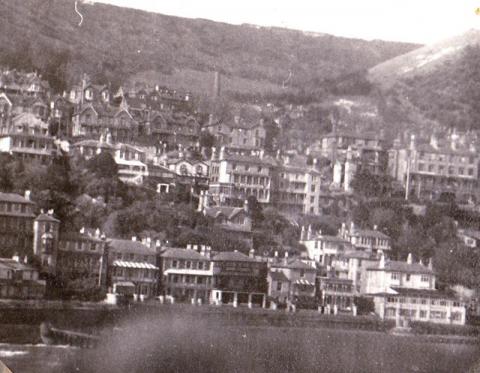
Ventnor immediately before the attack, April 1, 1943, and after the attack (below)
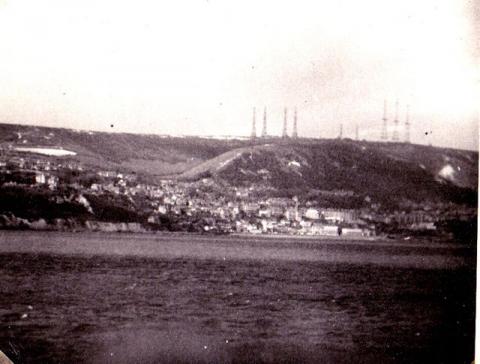
Yesterday, we had to put some of the anti-aircraft positions out of action with our cannons and machine guns before we could attack the city. In doing so, I received three direct hits in the the fuselage and tail of my plane. These must have been the last three shots that gun ever fired, though, since my cannons did a nice piece of work on it. Our bombs were very effective. Very shortly after the attack, the whole town was cloaked in smoke and grime. Unfortunately, my plane was so badly shot up that it crash-landed in the sea shortly before we reached our own coastline.
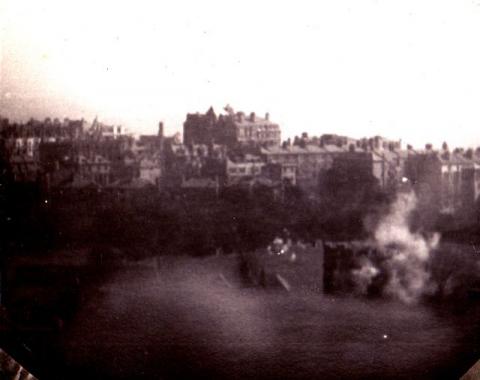
Eastbourne on April 3, 1943 (above and below)
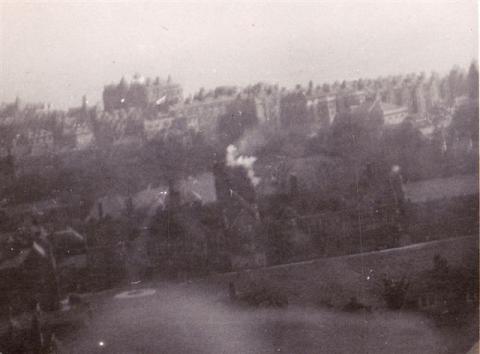
We finally got magnificent spring weather today, very good if you want to go walking, but too good if you have to go on a mission. The park is beautifully green. I wonder what it looks like in Germany? Perhaps I'll make it home again in the summer, what do you think?
8 April 1943: It was really hot during the last few missions, every time. We attacked the biggest city on the Isle of Wight yesterday, Newport. But we dropped all our bombs under heavy flak, and they all scored direct hits. Unfortunately, another two of us got shot down. (According to the casualty list, it must have been Uffz. Günter Eschenhorn and Uffz. Rudolf Radlewski). On the way back, we had to deal with a few English fighters (Typhoons) and came home bathed in sweat. The missions aren’t getting any easier, quite the contrary, but our reprisals are making themselves felt, as the English themselves admit.
14 April 1943: We’re receiving frequent visits from "the other side" now. They attacked us twice yesterday afternoon, in two equal attacks. But apart from a few window panes, there wasn’t much damage. At the same, some pretty fierce and hectic dogfights between English and German escorting fighter planes took place right over our heads. This was the first time I was able to observe planes getting shot down while watching from the ground. For our ground personnel it was really something. They do nothing but get our planes ready for action, after all, and they take great care to make sure everything is working as it should. But they were never able to participate in our successes personally. So they cheered like mad at every Spitfire they saw spiralling down and exploding in flames.
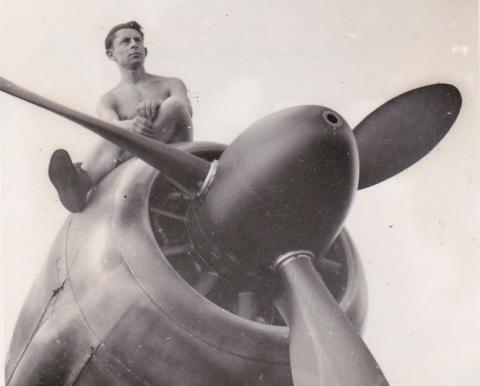
Poldi's mechanic Gefreiter (Aircraftman 1st Class) Thielen, affectionately known as "Pipifax."
10 May 1943: We haven’t flown any missions in the last few days, but we’ve been in the air a lot, mostly practice missions, testing various kinds of new and different and smaller bombs, almost always dropping them at low altitude or practice attacks on paratroopers; a type of maneuver. The weather is sometimes very good, but there’s a big storm going on now, sometimes with gusts of about 100 km per hour wind. It’s unbelievable the way you get knocked around by these gusts in a plane.
I had to go pick up my squadron pullover today. That’s a white woolen sweater with our squadron insignia, the red fox, on the left breast; they look very good. At any rate, only four of us are supposed to wear it at first, since they were lent to us by a committee. You’d think they had nothing better to do, but it‘s great fun anyway.
One of us got the German cross in gold today, naturally it had to be celebrated as it deserved, and did we!
16 May 1943: Nothing new on the Western front, you might say. That’s the way it’s been with us; in any case, we haven’t flown any missions. But in exchange we went through several aerial attacks recently. Just yesterday, I had just gotten to town and was at the Front book shop, when our position was attacked again. My office looks like hell. But overall most of the damage is slight. We’ve been having up to three air alerts a day sometimes; mostly false alarms. But whatever we’re not doing now, we’ll make up for it when the time comes.
18 May 1943: We had to endure a whole series of heavy attacks in the past few days. We were lucky nothing worse happened, but it’s a miserable feeling to lie there in the dirt and be unable to defend yourself when they’re shooting all around you.
23 May 1943: After a long period of inactivity we flew a few large-scale attacks again today and I was one of the first ones there with my squadron (I’ve been made squadron leader in the meantime). The attack on the city of Bournemouth was very effective, we dropped large numbers of bombs and did a lot of damage. Of course, the English flak tried to get a word in edgewise but we answered back smartly with our cannons and machine guns. We were pursued by four Spitfires but there was no aerial combat. This attack made a big impression on our young aviators in particular, and they were appropriately enthusiastic. We were unfortunately not in a position to celebrate properly with cakes and coffee, because we’ve got to be ready for action, but we’ll make up for it when we get a chance.
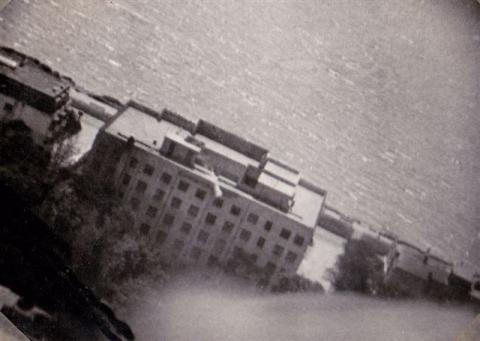
Attack on Bournemouth on May 23rd (above and below) - notice the smoke.
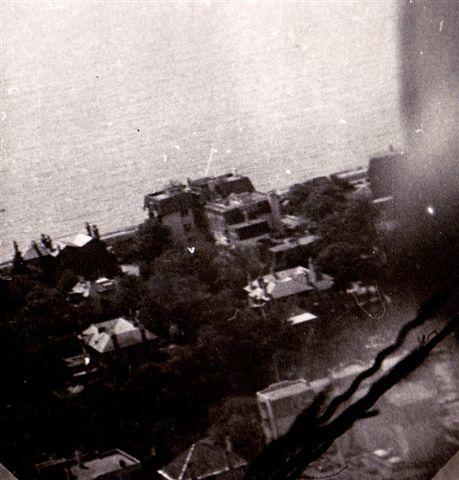
I got a magnificent fur vest as a present from a well-known major (Heinz Schumann) a short time ago. I’ll send it home some time.
25 May 1943: We made a surprise appearance back over on the other side of the Channel with a big squadron of planes today about noontime, and attacked the city of Brighton with heavy bombs. In doing so we blew up two gas works with a total of five gas containers. Those were some real fireworks, I can tell you! You could see the black pall of smoke far out over the ocean. The flak was very accurate though, but we got off with surprisingly little damage and we shot them up quite nicely with our cannons.
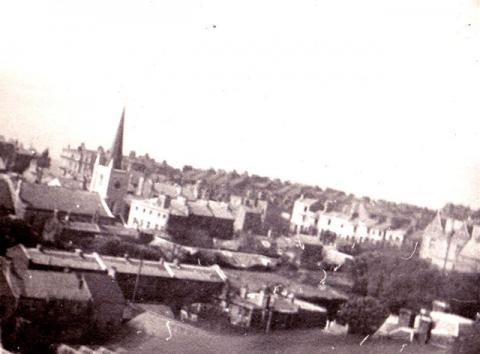
The city of Brighton on May 25th (above) and the Gas Works (below) which Poldi and his squadron blew up.
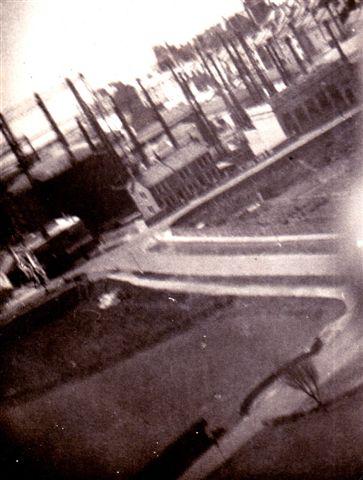
29 May 1943: The 25th of May attack on Brighton must have done a lot of damage, since the English are still screaming about it today. They paid us a return visit today, we really had to hit the dirt. It made a lot of noise, of course, but when it was all over the damage wasn’t half as bad as we had feared at first. In any case, we suffered no casualties and that’s the main thing. Next time we pay them a visit, it’ll be a different story, we’ll really give it to them.
1 June 1943: About noon day before yesterday we carried out a very heavy attack against Torquay. As with every large-scale attack, we really gave it to them. The English flak was really up to scratch, and gave us a hard time. Then we had some aerial combat, first with English, and then American, fighters. I left a good comrade behind on this mission, too. We’ve taken our revenge, though! Yesterday morning, the tommies tried to tear up our position. Once again, we hit the dirt, and when everything was all right again and we had put out the fires, we could see that really there wasn’t too much damage.
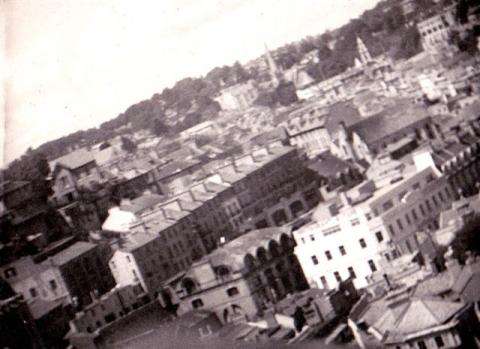
The pictures from Torquay on May 30th (above and below) are very clear but don't show the damage done.
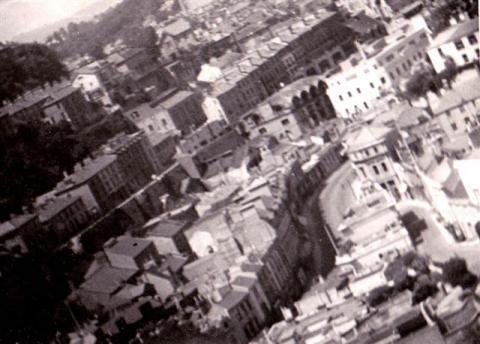
So to pay them back for their little visit, we paid them another courtesy call, with a big squadron, just for company. Just as we got to the English coast I saw a 4-motored flying boat. We shot at it, but didn’t have any time to stick around, otherwise we would have given them a good hiding. We had our bombs to drop, after all. Then the fun started. At St. Catherinas Point (Isle of Wight) I scored a direct hit on a fuel or ammunition warehouse. In any case, the whole kit and kaboodle blew up with huge jets of flame. We then attacked a couple of targets with cannon and machine gun, and raked a radio station. The flak was a bit lively and shot at us as we flew away. English fighter planes came up after us, but were too late. In any case, this mission was one we all enjoyed; anyhow we did our job for today.
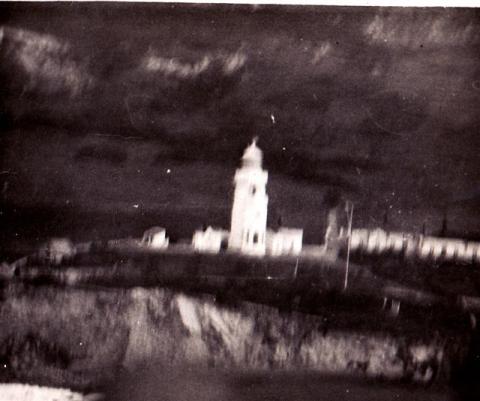
Encountering the lighthouse at St. Catherine's Point (above) on June 1st mission, and also a British plane (below).
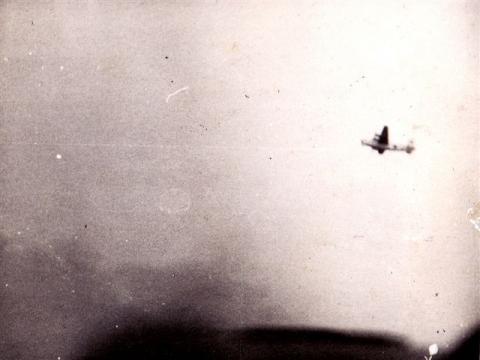
4 June 1943: We attacked Eastbourne again about noon today, with heavy forces, flying low level, doing considerable damage, although the flak was shooting significantly better than usual. I received a 2 cm direct hit behind the motor, putting a hole all the way through the plane. Several of my instruments quit working and I got a little splinter in my right lower thigh which remains there, someplace. First I felt a violent impact, and after that I had enough to worry about just with my wound, but I was able to get home safely.
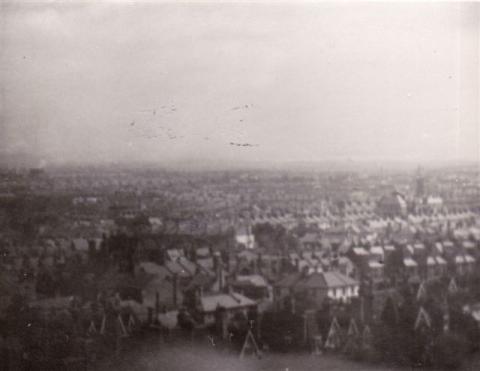
A 2nd mission against Eastbourne on June 4th; in the picture below smoke can be seen rising in several locations.
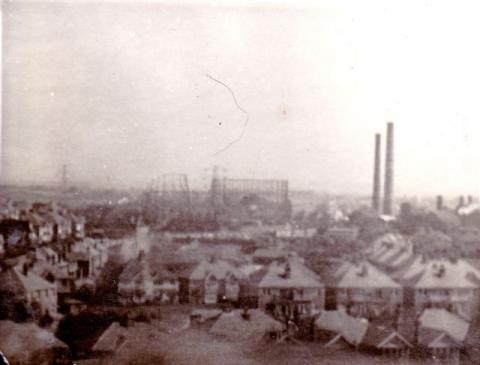
I’m taking photographs on each mission now, and will send the pictures home when I get a chance. Our park is very beautiful now, only the grass has grown too high, but nobody around here cares about that.
14 June 1943: Dear Mother! I would like to wish you all my love and fondest greetings, and I hope you will be able to celebrate this birthday very many times yet and in good health. I would also like to express my belated best wishes to my little brother [Gerhard Adolf], who proudly celebrated his “Fourth Jubilee” a few days ago. I completely forgot to wish you a joyful Pentecost, but I only noticed it was Pentecost when other people told me about it. Anyway I hope you enjoyed a very happy couple of days during the holiday.
Everything is all right with me here, only there’s a lot to do. Day before yesterday, we had yet another heavy English air attack. Two English bombers were shot down in flames by our flak. No casualties here. I hope all is well with you. Now, dear parents, heart-felt greetings from your Bibi.
N.B (last letter from France).
****************************************
The mission on 4 June 1943 was also Poldi’s last combat flight on the Channel coast and the letter to his mother dated 14 June 1943 was the last one from France, since he was transferred to Sicily on 15 June 1943. To be continued ....
Category
European History, Germany, Leopold Wenger, World War IILeopold Wenger's letters from Sicily and Lake Constance, June-Nov. 1943
- 4539 reads
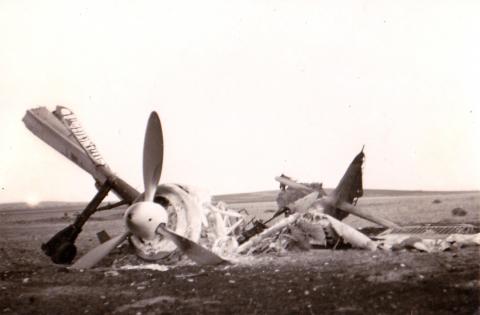
Poldi Wenger's "beautiful" plane after being destroyed in an air attack and fire while parked in Marsa del Oro, Sicily on July 7, 1943
copyright 2014 Wilhelm Wenger and Carolyn Yeager
Translated from the German by Carlos Whitlock Porter
Notes from Poldi's brother, Willy Wenger:
The mission on 4 June 1943 was also Poldi’s last combat flight on the Channel coast and the letter to his mother dated 14 June 1943 was the last one from France, since he was transferred to Sicily on 15 June1943.
After the death of Hauptmann Frank LIESENDAHL, Oberleutnant Fritz SCHRÖTER took over command of the 10th Jagdgeschwader (Day Fighter Wing) JG 2 until 31 December 1942, after which Hauptmann Heinz SCHUMANN took over in April 1943 following SCHRÖTER’s transfer to Tunisia. In the meantime, the following name changes were made:
The 10th /JG 2 (Jagdgeschwader–Fighter-Bomber Wing) was renamed the 13th/ SKG10 (Schnellkampfgeschwader - Fast Bomber Wing) Squadron Commander - Lieutenant Poldi WENGER
The 10th /JG 26 and the 10th /JG 54 were renamed the 14th/ SKG10
Squadron Commander – Lieutenant Colonel Erwin BUSCH
The newly appointed 15th/SKG10 -- Squadron Commander - Lieutenant Erhard NIPPA
The three squadrons formed the Second Group (Gruppe) of SKG10, the name of which was changed, as of December 1942, over the course of a reorganisation of the close combat flier units, to SG10 (Schlachtgeschwader – Ground Attack Wing) --- Group Commander – Hauptmann Heinz SCHUMANN
Transfer to SICILY
Take-off on 15.6.1943 at 13h53 with stopovers in Bourges, Istres and Albenga (near Allassio, Italy) on 16.6. to Pratrica di Mare near Rome. After refuelling, off to Capodichino near Naples on 17.6 over the Straits of Messina and Catania to Gerbini-West.
Throughout the entire stretch of 2,270 kilometers, Poldi’s first maintenance engineer Thielen had to sit crammed into the baggage compartment directly behind the pilot’s seat and must have needed a lot of endurance to sit hunched up in this cramped compartment for hours.
Taking off from the foot of Mount Aetna, they flew the first dive bomber and high-altitude bombing attacks against large Allied convoys in the Mediterranean and achieved great results. They bombed harbor installations on the island of Pantelleria from a VERY high altitude. The whole group flew hard missions against Allied invasion troops, particularly around Gela, achieving the first tank kill and damaging several landing craft. -WW
___________________________
17 June 1943 : I’m now sitting at the foot of Mount Aetna. So I’ve really left the land of the great flesh pots now, at least temporarily. I have a wonderful journey behind me and I’ve already seen a lot of new and interesting things. I was able to see the Leaning Tower of Pisa from the air, even if only very briefly. In Naples, on the other hand, I was able to spend more time, lived in a first-class hotel there. I didn’t find it as beautiful as people always described it as being, though. Vesuvius, as usual, had its peak hidden in the clouds.
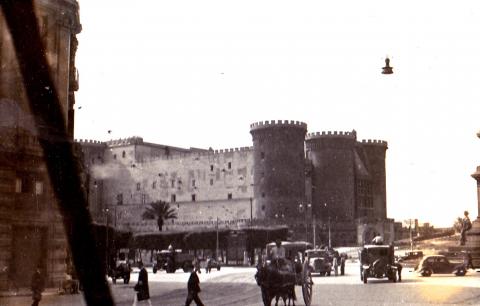
Naples, Italy - Different, but not as beautiful as Poldi expected.
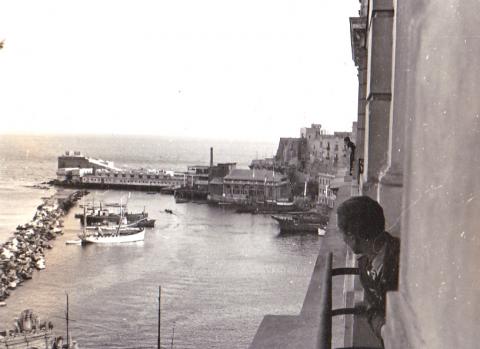
Group Commander Hptm. Schumann looks out at the harbor.
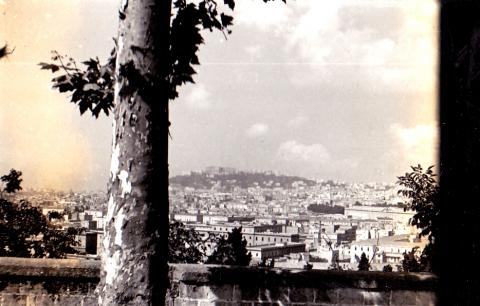
View of Naples as seen from a picture-taking location, in June 1943.
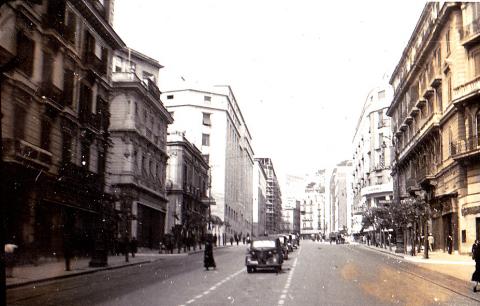
A street in Naples, in June 1943
On the 15th, that is, yesterday, I flew from Caen to Bourges (310 Km). After lunch, around 14h53, I took off again and landed 490 km away in Istres. Along the way, I flew over the exact same spot where I smashed my plane to pieces in an emergency landing in a mountain meadow 7 months before.
Around 17h52, I took off from southern France over the Cote d’Azur and landed 262 km [away] near San Remo. The very next morning I was off again, along the Italian Riviera, past Genoa, and southwards along the boot, past Pisa, Grosetto, to Pratica di mare near Rome, where I landed at 11h53, after flying 523 km, after a 70 minute flight. Towards evening I flew back to Capodichino, near Naples, 180 km away, where I landed around 7h30 in the evening.
This afternoon, we flew from Naples to Gerbini West, where I landed after an 85-minute flight, a distance of 505 km, over the Strait of Messina and Catania.
So I got here yesterday, on the 16th. It’s Mom’s birthday today. I sent her my best wishes in a letter a few days ago, I hope she got to Gleichenberg safely.
It’s fiendishly hot here and, at the same time, people say it ought to be cool. Good job, we got light-weight tropical clothing. Nobody lives around here, for miles around. A good thing in a way, but there’s a water shortage. There’s nowhere near enough water for us. I live in a barracks in the middle of an olive grove, but I’ll have to move into a tent soon, since it’s too hot in the barracks.
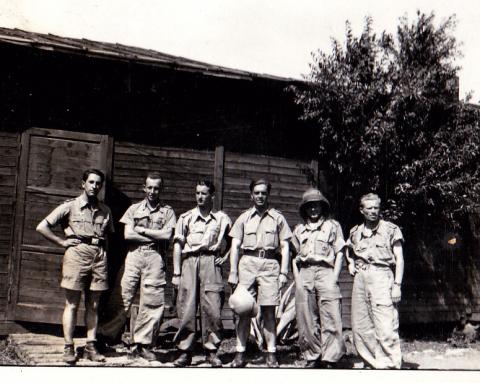 The pilots in their tropical uniforms (Poldi 3rd from left), June 17, 1943 (above) and living among the Almond trees (below)
The pilots in their tropical uniforms (Poldi 3rd from left), June 17, 1943 (above) and living among the Almond trees (below)
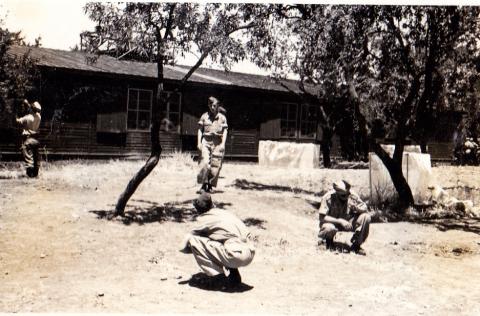
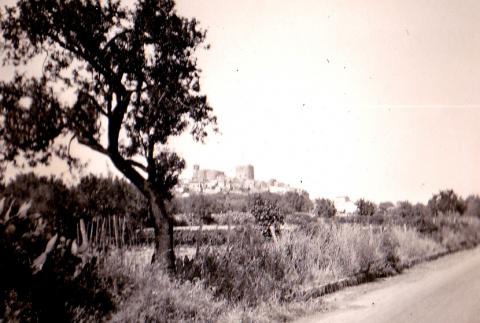
Sicilian landscape near Gerbini, Sicily in June 1943.
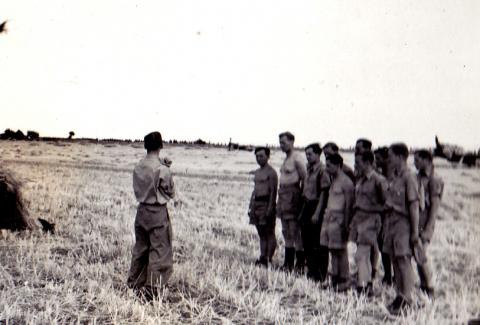
Poldi Wenger talks to a group on the airfield in Sicily in June 1943.
19 June 1943: It’s a little cooler in my little hut this afternoon. It’s monstrously boring for the moment. So here I am, sitting in my little shack in the semi-darkness, because if you went outside you’d get heatstroke. It’s dusty, too. The transition from the climate on the Channel coast to what we’ve got here was probably too sudden for me.
____________
[Transfer to another location always causes a few problems. If the whole unit gets transferred, the pilots don’t have so many problems, because they’ve got their planes there, right where they’re supposed to be. But the technical ground personnel have a harder time of it, who have to travel overland, which often takes days, by train or by truck. A pilot can’t fly without his maintenance engineers and mechanics—the availability of a maintenance engineer is the one single most important thing in keeping the plane in good condition and ready for action. That’s the alpha and omega of flying, so to speak. After the transfer from northern France to Sicily, though, it still took a long time for the ground personnel to get here. Of course, a new location almost always has some technical personnel from another unit, but every pilot swears by his own maintenance engineer.
So Poldi, without further ado, simply crammed his 1st maintenance engineer, Obergreiter Thielen—affectionately known as “Pipifax”—into the small luggage compartment behind his pilot’s seat, where he sat all hunched up throughout the entire duration of the 2,270 km journey. One would require the patience of a fakir to sit in this cramped position for hours. Fortunately, Poldi had already performed this experiment on a 300 km flight during a transfer from Caen to Coxyed. Later, in Sicily, Poldi took his 1st maintenance engineer with him in precisely this same way on all his transfer flights. -WW]
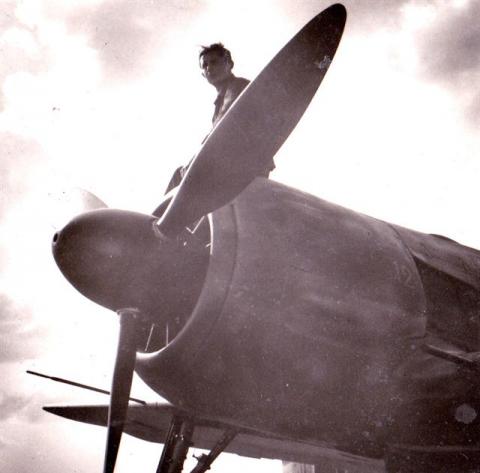
"Pipifax"(Thielen), who took care of Poldi's plane, traveled with him whenever he changed locations, crammed into the baggage compartment.
22 June 1943: The climate here is said to be worse than in North Africa. So it caught us all by surprise, in some cases with serious consequences. Some of us spend a lot of time in bed with fever and stomach cramps. I’m feeling better today. But I can’ t eat anything except cakes, chocolate and tea. I can’t keep anything else down. And this murderous heat is really enough to finish you off. It’s already 80 or 90 degrees in the plane. The first few times I felt faint as soon as I got out of my plane after flying. I know the island pretty well now. I’ve been getting around quite a bit. It’s barren, mountainous country; there aren’t this many savage, arid mountains even in the Alps.
Happily, I’ve just about gotten over my tropical staggers. I’ve gotten over my rubber knees and dizzy feeling since yesterday and I’m getting ravenously hungry. The heat hasn’t let up in the slightest and reaches incredible temperatures around noon, so that it’s impossible to leave the shadows of the olive and almond trees.
I flew my first mission here yesterday afternoon. We attacked an American convoy off the North African coast, off Cape Mostafa (near Bone) with everything we had. We were quite successful. I personally attacked a 7,000 British ton freighter, got it right in my sights and hit it hard. The flak was just like what you often see in the newsreels. So I saw the African coast yesterday for the first time. I also saw the Italian island of Pantelleria from the air yesterday.
29 June 1943: We were very busy again yesterday. Around noon I flew a reconnaissance mission in the Gulf of Tunis and towards Pantelleria, and in the afternoon we attacked the harbor and landing strip of Pantelleria with heavy forces. Again, it was a proud feeling for us when we saw nothing but our own fighters and bombers all around us. The English fighters kept a careful distance and did not attack us although we were flying very boldly.
And then all hell broke loose. We dove on our targets from a great height (5,000 meters) and hit all our targets. But the flak was very heavy and quite accurate. We got used to that a long time ago and we don’t let it bother us. I hope the English will land soon, so we can give them a good hiding.
8 July 1943: Once again I am able to say that we’ve just had another couple of exciting days. We got attacked from the air in a way you really can’t begin to imagine. They gave us no rest, either day or night. On 6 July, I took a direct hit in aerial combat with American fighter and bomber units and had to change planes. The next morning, as I was flying another mission, my good old plane was completely destroyed in a low-level attack on our position. My plane got burned, including my fur jacket. I’m back on the mainland now, in southern Italy.
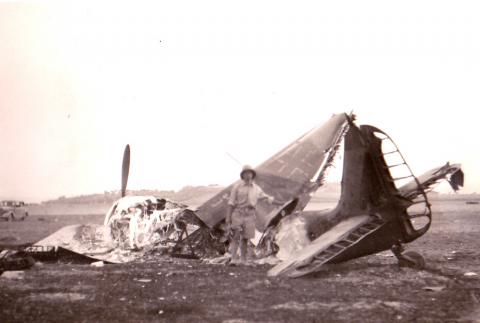
Poldi's Fw 190 destroyed in an air attack on 7-7-43, during which it caught on fire. The plane was damaged on the 6th in combat, thus he was flying another plane while this one was parked.
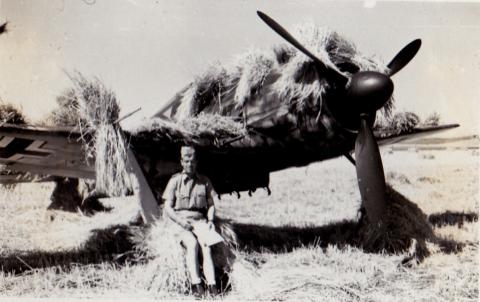
Oberleutnant Holzapfel sitting by his grass-covered plane two days before he was killed. July 1943, Sicily.
12 July 1943: (Marsa del Oro) We’ve been fighting all around the island for three days now! Our troops have been involved in heavy fighting and we are supporting them as best we can, with everything we have. We’ve been flying continuous missions against the Americans and giving it to them in the neck. This morning, once again, we tore hell out of an American tank column. It makes you feel good to think how much we’re helping our own infantry. I got hit hard, a direct hit, but got back to base safely despite everything. The English ground troops are getting worn down almost everywhere.
I’m quite glad to be back in good health. I had a beautiful tent camp built and I’m living there quite comfortably. I am very glad to get out of those miserable barracks. But the English air attacks have left things in a bit of a mess for the moment.
_______________________________________
[Among other things, one gathers from Poldi’s flight log book that he flew 4 missions on 7 July against Allied landing craft near Cape Muro, one of them towards evening near Gela, where the Americans succeeded in establishing a bridgehead. On 11 July, he flew 6 missions in the area near and around Gela, destroying the first tank, a railway bridge and shooting up units in the Straits, near Floridia. There was heavy aerial combat.
They were all flying again the next day, before 6 in the morning. The American landing parties were marching with heavy tank units from Gela in the direction of Ragusa. Light anti-aircraft guns were firing heavily. The second attack took place at 8 hours against vehicles in the railway station at Vittoria, during which his plane received 3 direct machine-gun hits. After all these attacks there was repeated aerial combat against Spitfires and Lightnings. Poldi lost his FW 190 when it was destroyed by American low-level fliers on 12 or 13 July.
The Allies were advancing with such superior numbers that they were gaining ground very quickly, despite heavy defensive action by German and Italian units. American air superiority was very hard to deal with and the bombardments went on around the clock. So the order came to vacate the island on 13 July. Poldi must have already been on his way to Munich by this time, where he had to remain for several days (presumably because of bad weather). He appears to have been given a new fighter plane at around this time. -WW]
________________
17 July 1943: I visited the House of German Art yesterday and wandered around town a little bit. My lodgings in the “Bayrischer Hof“ Hotel are perfectly magnificent. But I’ve already got to go back down south this afternoon.
20 July 1943: My beautiful days in Munich are over. I took off from Munich on Saturday, 17 July and flew over the Alps with very good visibility. I also got good views of Innsbruck, the Brenner Pass, and Bozen from the air. When I got to my destination, I was having pain in my left knee. It soon got so bad that I couldn’t sleep, so I went limping to the Doctor late in the afternoon.
But he couldn’t tell me much about what was wrong, so he bandaged it and ordered me to go to bed and rest. Today, my leg, from the foot to the knee was so badly swollen that I could no longer straighten my leg. I can no longer walk except by hopping on one leg. Nobody can tell me what’s wrong. Now they want to send me to a military hospital in Rome. And all this at a time when every man is urgently needed!
Last night I went through what was the toughest and most violent air attack I ever experienced. Hopping on one leg, I managed to reach a rubbish pit where I dug myself into the rubbish and filth as best I could with the help of an old tin can I found. The bombs were dropping so thick and fast all around me that I had the impression that I could no longer hear them when they hit the dirt nearby; rather, I could only feel the tremendous, appalling shock waves churning the air. I got thrown into a stone wall. When it was all over I looked like a pig and stank like mad; my clothes were torn completely to pieces, and I was covered with cuts. Of course, this wasn’t so good for my foot, either.
Now I’m lying in bed and hope the shamans can fix me up soon so I can be back in action. I’m waiting for the mail and feeling increasingly impatient. I hope it hasn’t all been destroyed.
__________________________________________
[Poldi told me that it was unbearably hot in the cockpit, so he had his technician install a small ventilation flap, enabling him to regulate the amount of fresh air by means of a small slider. This must have had the effect, however, of exposing the knee to too much cold air, causing his disability.
A telegram caused some confusion in the family. The telegram confirmed that Poldi had been confined to a military hospital in KONSTANZA, which, as everybody knows, is on the Black Sea. It was a mistake in the address, and it soon turned out that he was in Constance, on the Bodensee. -WW]
_____________________________
In the military hospital at Konstanz am Bodensee
28 July 1943: After a short stay in the military hospital in Rome, and after an aspiration of the joint, I was put on a hospital train to Germany and ended up here, in Konstanz. The 48-hour journey was horrible and I’m glad to have a little peace here. The pain has eased somewhat, except that the leg is still very badly swollen all the way up to the knee, and I can hardly move.
Otherwise, it’s quite beautiful here, but for the time being I won’t be able to see much of it. I’ve got a double room with a lieutenant, but I’m alone a lot, so I get a lot of rest, which is what I need.
1 August 1943: Not much has changed in my situation. I’m still lying in bed with a splint on my leg, and underwent aspiration of the joint day before yesterday, for the third time. I’ve had all sorts of medications and injections Every time I ask the head doctor what’s wrong with me, he shrugs his shoulders and says I must wait a while and leave my leg alone, don’t strain it, but let it rest. And in actual fact, when I lie perfectly still, I don’t feel any pain at all, only I mustn’t touch the knee or even bend it. I can get up but I can’t use my left leg for anything.
So I’ve been lying here in my hospital bed for days, and every day is like every other: breakfast at 6 hours, then it’s visiting time. Around 10 hours we get something to eat again, and 12 hours it’s lunch, after which my roommate leaves the hospital to visit his family, who live around here; he only gets back about 22 hours. He got shot in the pelvis and he’s been here six months and is now allowed to walk a little bit.
The monotony is broken by a snack in the afternoon and dinner around 18 hours; then comes the endless night. I can hardly sleep. So I doze until morning with the help of a few morphium injections. And then it starts all over again: lying still, eating, drinking, and doing nothing. I don’t think I’ll be able to stand it if this goes on much longer. I already told the doctor that. In the meantime, it’s magnificent summer weather outside. Grumbling won’t help, though. When I get out of here, I’m sure they’ll give me a few days off to see my family.
It would be nice if somebody from the family could come visit but it’s probably too inconvenient at this time. It must be rather difficult to find a place to stay around here, because so many families have moved here after being bombed out, to find a new place to live and escape the bombings. –I just talked to a nurse. She could find a room for my family for a few days, she would just have to know when they were coming with enough advance notice.
5 August 1943: I fought a very successful defensive action today. The doctor wanted to put a plaster cast on me, but I started talking and getting a little bit mutinous, until he saw that a split would be just as good, even better, in my case.
Since I’m alone most of the time, I managed to get a radio today, which helps me pass the long days. I’m very dissatisfied with myself, so much so that I could kick myself. It’s all because I have to lie around all the time. I tried to sleep through the night without sleeping medication. It was bad; every ten minutes I was fully awake again. I think the longer I lie here the worse it will get. For the moment, I’m trying to get in touch with my unit again. But I haven’t been able to get through so far. I ought to try to get transferred to a backup unit, but that’s no good for me. Thank God I’ve got good connections, that ought to help me get back to my old unit.
11 August 1943: Willy arrived here safely and he seems to like it a lot in Konstanz. Despite his telegram, I was very surprised that he was still able to make it here, even it was 22 hours. So he’s visiting me every afternoon. I’m also feeling better after my throat inflammation, although I could hardly talk to Willy. The suppuration from my knee joint has abated somewhat. The only thing the doctor won’t let me do is get up. But I hope it will all be over soon.
There’s no question of a transfer to Gleichenberg for the moment, since it takes at least three or four weeks for an application to be processed. I hope to be fit to travel by then, so as to be able to drive to Gleichenberg for my last outpatient treatment. That would help me get out of the military hospital as quickly as possible.
16 August 1943: I just learned that I’m going to be transferred to a Luftwaffe military hospital as soon as I can travel (without assistance). So nothing has come of Gleichenberg. I’ll have to choose between Nuremberg and Munich. I do a little bit of exercise in bed; chest expander, throwing a 5 kg medicine ball around, and so on. So my flabby muscles are getting back in shape again.
18 August 1943: Well, on top of everything else, now I’ve got jaundice! Now I’ll have to lie here even longer!. But I’m doing all I can to get well again.
4 September 1943: For a few days now, when nobody’s looking, I’ve been trying to bend my leg again and take a few steps. I’ve made a lot of progress very quickly, and today, the doctor told me I could try to get out of bed, very slowly and carefully, and sit at the table. I would have laughed if he’d only known! – Now I’m sitting here at the table like an old grandfather and I ate my first meal at the table today!!! I’ve been told that my jaundice is all over now. I almost jumped out of bed from sheer joy. It’s really something to be able to get out of bed again after almost 7 weeks. Of course, I can’t do anything with my leg yet, but I’m very glad to have made as much progress as I have.
6 September 1943: I’m hobbling around the countryside on crutches now. Of course, I’m not supposed to leave my room, but I already wandered around the military hospital a couple of times. I want to see the park first, and I’m very happy to be able to be outside. Hope the weather stays like this. The fall colors are slowly making their appearance.
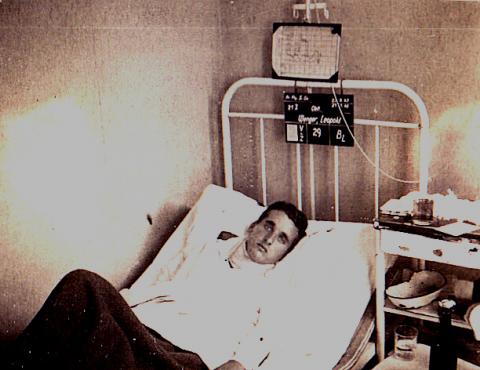
Apparently Mom traveled to see her son during this time and took this picture of the unhappy patient on 9 September, 1943.
10 September 1943: Hopefully Mom will soon have recovered from the hardships of the long journey (Leoben-Konstanz and back). I’d like to hear how she liked Munich. I can easily imagine that the visits were tiring in such a short time.
My leg is gradually getting stronger. Today I tried to stand on just one leg, the bad one. I could only hold the position for a couple of seconds, then my leg got jumpy. Now I’m walking around on one crutch, in order to strengthen the weak leg by main force. I still can’t move my knee, but what I can is enough so I can sit in a plane!
I still don’t know when this will be all over, but I hope, very soon; I might get straight out of here, without having to stay in a Luftwaffe military hospital. Nobody knows exactly. I’ve got a new doctor now. I left the military hospital this afternoon to walk around in the park for an hour (with one crutch). It wasn’t as easy as it looked at first. But it was wonderful anyway, just to see the sky after so many weeks house arrest.
16 September 1943: I’m feeling very well by now. I wanted to see the shore of the lake for once, yesterday evening, but I got lost and suddenly ended up at the Rhein Bridge and saw the town for the first time. It was a bit difficult on crutches, and I’ve got enough calluses and blisters on my hands to prove it.
Despite it all, I was right back outside this afternoon. The little town was just as beautiful as Willy had described it to me. Unfortunately, I’m not making any more progress with my knee. But I hope that I’ll soon be strong enough to be discharged, on my feet and even with a stiff knee, since I’ve had enough of being laid up. I’m getting another room mate tomorrow.
20 September 1943: I got the three little packages just today, the cakes were a little bit moldy after the long journey, but that’s all right. My appetite is as good as ever and I eat tremendous amounts every day. The last time I got weighed, I weighed 56 kilos again. I always get extra portions from the kitchen. People have noticed what a huge appetite I have.
My knee is already worrying me a lot, though. I’m getting short wave radiation treatment now, and a black ointment on it at night. In the morning I get a hot bath first thing, then hot air treatment and finally short wave radiation treatment every other day and underwater massage twice a week. I’m also exercising quite diligently. I’ve actually gotten much stronger; I notice that during my daily chest expansion exercises.
I’ve already been to the lake a couple of times and caught a hearty cold from it. In the meantime I’ve got a new room mate; he was on the Eastern front and is from Konstanz, so he’s at home here. This evening we both want to go to the cinema to the see the “Münchhausen” film, which is in color.
22 September 1943: My pullover finally got here. I got a lot of mail today, all addressed to me in Sicily. Letters from June and July.
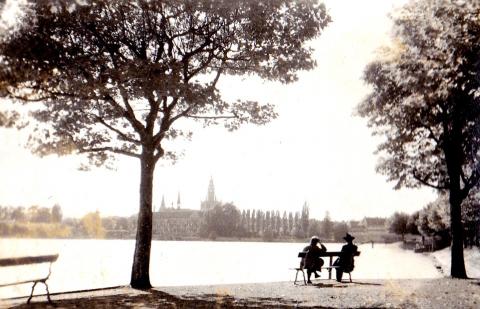
Leaving Lake Constance, September 29, 1943
To be continued ... Officers Hospital in Vienna and then to Lemberg (Lviv)
Category
European History, Germany, Leopold Wenger, World War IILeopold Wenger's letters from the Eastern Front, Nov 1943-Feb 1944
- 4048 reads
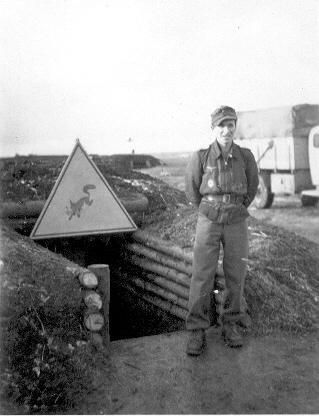
Oberleutnant Poldi Wenger stands at his squadron's [13th/SG10] command bunker at Koskov, in Ukraine, in January 1944. Note their "red fox" insignia above the entrance.
copyright 2014 Wilhelm Wenger and Carolyn Yeager
Translated from the German by Carlos Whitlock Porter
VIENNA - Officers’ military hospital
3 October 1943: I had hardly gotten here when they stuck me in bed again, which didn’t hardly please me. I’m in a military hospital here, officers only. There are four of us to a room, all of them sick; there are no wounded, and it’s nowhere near as beautiful as Constance. Now, once again, I’ve got a thick bandage on my knee and once again, the famous black ointment “Ichtiol” on it.
A few days ago I travelled to Meersburg [on the other side of the Lake Constance], which Mom had described to me as being so beautiful. I’m very glad to have undertaken this short outing; I really didn’t regret it. [Poldi received a visit from a lady friend of some years standing, one of the Luftwaffe auxiliary personnel, whom he had met in France; they travelled together on the trip to Meersberg. -WW]
Here in Vienna, visits are only permitted three times a week; but I very much hope that Father and Mother will be able to make it here together. In other respects our superiors here are rather strict; nevertheless I hope [sentence cut off]
[I myself was in Linz an der Donau at this time, assigned to the anti-aircraft auxiliary personnel as an anti-aircraft gunner, where I also attended grammar school at the Humanities High School at Marburg an der Drau. I was supposed to go to Leoben on holiday in the next few days and wanted to spend the holiday with our parents there together with Bibi (Poldi). -WW]
28 October 1943: a letter to Poldi from Commissioned Officer Unger:
Herr Oberleutnant !
I received the letter dated the 21st of the month; it made everybody cheer when they heard of the forthcoming return of their Oberleutnant. Our joy was unfortunately dampened again by the events of the 23rd., Lieutenant Stelzer got caught in a balloon barrage at Paris during a flight to Vannes. He was able to make it back to base despite serious damage to the aileron (three quarters of the aileron were knocked off); the journey was only shortened by the fact Lt. Stelzer attempted a pancake landing, during which the plane did a half-roll and side-slipped. Lt. Stelzer was killed and we buried him in Paris two days later.
Major Gromaner returned to the group a few days ago, and should, I believe, become IC with the squadron. For the time being he can’t fly, and still walks with a stick. The ULK [Non-Commissioned Officer Training Course] has been extended. Major Schumann had to abandon a written work on Bismarck and furthermore seems to take a rather dim view of [Bismarks’s] military achievements; that’s the reason for the extension. Fips is the worst off, and he would probably never have been promoted if Lt. Klein-Korres hadn’t been made course leader in the last two weeks. As Major Schumann said during a visit: “Well, Fips, that’s not very good, you know, that exam paper you just turned in, but it will have to do!” Schumann obtained some information on Fip’s training background, which was better, though. So it looks like he’ll pass the ULK anyway, as Oberleutnant Schreiner and the Hauptfeldwebel said; his career as an orderly would be finished, but it would cost me a few grey hairs, since we have Gefreiter Borkgrave as orderly for the moment, who is a thoroughly decent guy and also very willing, but who has no organizational talent. Fips is a little rogue, but as an orderly, he’s unique.
We had another little celebration yesterday, to which the Hauptfeldwebel, Oberfeldwebel Müller, Oberfeldwebel Groneberg, Feldwebel Gerkow, Feldwebel Schumacher and Unteroffizier Donath, who took care of the music, were invited. Feldwebel Schumacher, who had not, I believe, written to the Oberleutnant for a long time, is cooking for us, and cooks extremely well; he prepared an excellent evening meal for us. Our guests were totally astonished and very happy about it. The squadron doesn’t do its own cooking at the moment, so Feldwebel Schuhmacher isn’t required for the squadron at the moment, but we were quite worried about it, since Sieß isn’t there yet and there’s nobody else that can cook.
Unteroffizier Böhme has gotten married and is coming back from furlough in two days. Approval of Unteroffizier Ressi’s application for leave to get married is in the pipeline, so he’s coming back as a married man, so he’s bound to show up around mid-November. Unteroffizier Kirsch went to the marriage application hearing, so Unteroffizier Bogisch is still the old man here.
Our fighting preparedness is not as great as we had hoped it would be, that is, that we would be permitted to take off every time, on another mission. Things turned out otherwise; we’re in a state of constant battle readiness, but we’re only supposed to take off when it’s a really big deal and they need every man.
The group is supposed to report ready for action by mid-November. But for the moment we’re just flying practice flights with the new pilots in Cognac or someplace else in the south, where we’re supposed to teach them how to fly over the ocean; so until that’s done we won’t be doing much of anything. First we‘re supposed to fly a few missions Caen-style, after which any further missions will depend on the casualty rate.
In conclusion, I’d like to wish all the best to our Oberleutnant and we look forward to celebrating a happy reunion with our Oberleutnant.
Best wishes,
Unteruffizier Unger
1 November 1943: Dear Willy, We were lucky to able to get a holiday together, both at the same time. I am to be discharged on 3 November, and I plan to come home as soon as I can pack the few things I have. The best thing would be for you to be in Vienna on 3 November, in the afternoon. Meet me at the Southern Rail Station or at Uncle Karl’s! [Uncle Karl and Aunt Maria lived next to the train station.]
[We were indeed fortunate enough to get a furlough in November 1943 both at the same time, which we spent together with our parents and sister in Leoben. 'Bibi' was already feeling much better, relatively speaking, and took off from Leoben, where he spent a few more days after my departure, to rejoin his old unit in France. The intended destination was Caen, He was happy that he was going to be reunited with his old squadron after an absence of several months. But nothing came of it, since his unit was suddenly ordered East, and was already on its way to Russia by the time he arrived in Paris.
'Bibi' had to change trains in Linz, in the middle of his journey from Leoben to Paris; this was on 18 November 1943, the day before his 22nd birthday. I was informed of this, and was at the railway station in Linz to see him. 'Bibi' gave me a small package from our parents. We spent the few minutes of his brief stopover chatting happily and exuberantly. It was a cold day and you could really feel it. I was wearing the overcoat from my uniform, while Bibi was dressed only in uniform, without a coat; he was really freezing. When his train took off again, he leaned out of the window and waved at me for a long time, as he always did. It did not occur to me that I might never see him again. -WW]
21 November 1943: (on the way from France to Russia, at a stopover in Vienna): Listen and be astonished! I met Willy at the rail station in Linz and gave him the package. I then got a good connection to Paris and arrived there with a two-hour delay. I had no connection to Caen so I called my Standort and learned that there was nobody there, everyone was already gone. So I had to go all the way back the way I came. This afternoon I went through Linz and got a good view of Willy’s anti-aircraft position from the train. Unfortunately. I had been unable to notify him in advance that I would be passing through. I got back to Vienna around 14 hours and am travelling to Lemberg today. Thank God I'm no longer alone, I met a few stragglers.
RUSSIA - Fighter Pilot on the Eastern Front
24 November 1943: On 21 November I travelled from Vienna onwards with the furlough train and only woke up in the middle of ex-Poland. A desolate region—a filthy wasteland where it rains all the time. In Przemysl, we had to travel through the town from the west to the main railway station. And in the evening I arrived in Lemberg [Lviv]. There I was picked up by car and soon I was with people I knew again. I was now waiting for good weather, so as to be reunited with my squadron.
I got my winter clothing today. I can only say: “They’re really great!”. We are so well equipped, that it’s certain that nobody is going to freeze. I was issued real mountain climbing boots, just like I always wanted. Fur trousers, fur jacket, fur vest, fur cap, angora wool underwear, socks, wristlet, scarves, abdominal bandage, and a rubber raincoat constitute the principal articles of my wardrobe. But then every driver has his own special equipment, just like every technician or ordinary or flying personnel. You wouldn’t think it possible to manufacture these things at all in the 5th year of the war.
Morale is very good wherever you look and we‘re only hoping for better weather soon, so we get going again. One thing I find quite strange in this region is how early it gets dark. At 3 in the afternoon it’s already so dark that you have to turn on a light.
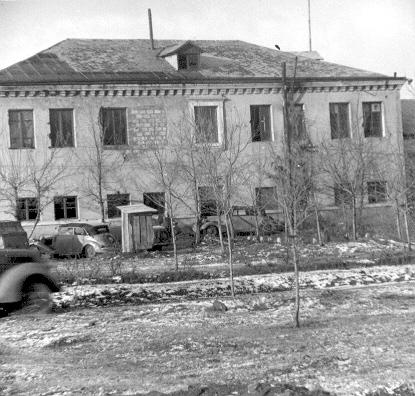
Poldi arrives at his final destination: the command post at Berditschew in the Ukraine
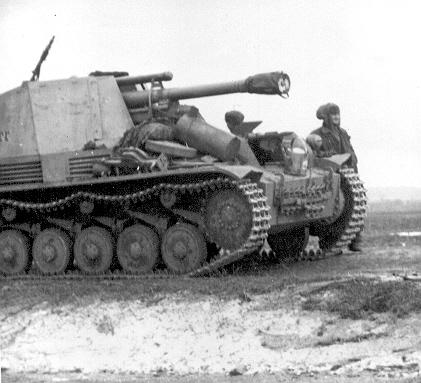
Storm artillery and tank at Berditschew December 1943
1 December 1943: I’ll try sending an air mail letter today and I’m curious to see just how long it takes to get to its destination. I’ll also send a couple of marks for Willy at the same time (for letters, 2 marks; for postcards and letter cards, 1 mark).
We’ve gotten a bit further into the “Soviet Paradise” since yesterday, and have achieved our immediate objective. So I flew yesterday for the first time in a long time [his last flight was in mid-July in Sicily and southern Italy -WW] and got my squadron to the correct position after one and a half hours. At first it seemed like everything was happening too fast for me, but I soon got used to it.
I was issued a rubber knee bandage today, which saves me the trouble of putting on an ordinary bandage every day and I’m really feeling OK.
I just heard that I was promoted to squadron commander just before they put me in the military hospital.
Otherwise I’m feeling quite well, and I’m getting used to the usual living conditions. We’re living on the edge of a ruined city [presumably Berdychev] and have had ample opportunity to be astonished at the inconceivable filth of the place over the past few days. I’ve installed a table and chair in my little room and will start real house-keeping in the next few days. There’s even electric light here, which is a real necessity since the sun goes down at 3 in the afternoon. There’s no more snow, but there’s rain enough to suit anybody, plus wind and cold, and plenty of mud and filth as a result.
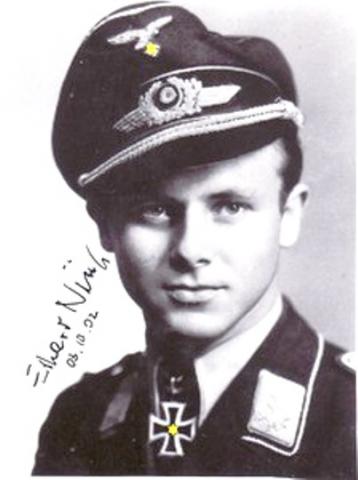
[A tragic accident occurred around this same time. The accident is recalled by Erhard Nippa (right, as a lieutenant during the war) in a letter dated Jan. 16, 1999:
“During the transfer to the Eastern Front in November or December 1943, Oberleutnant Kurt Eckleben, squad adjutant of Group II of SG 10 (under Hautptmann Götz Baumann) collided with the squadron commander of the 5th Squadron, Oberleutnant Busch near Mielec. Busch’s plane was cut completely in half by the propeller just behind the cabin, after which both cabin and motor naturally spiraled downwards to earth. Eckleben failed to get free of the plane in time and his parachute did not open completely. His death was especially tragic for us, because he had married young and was expecting his first child. Since we were flying in squadron formation and I was flying directly behind him and to the right with my squadron over the staff flight and the 5th squadron, I saw the whole accident from close up. Busch never recovered from this experience... and was correctly transferred back to Germany.” -WW]
6 December 1943: After an eventful day I’d like to send you a brief report of what happened.
Things really started happening on our section of the front early today. After our army commands reported for duty we flew mission after mission attacking retreating Soviet troops. Even during these first few short days, we achieved some great results, and we hope it will stay that way. You’ll probably hear something about it in tomorrow’s Armed Forces Report. From what we could see, it was already something tremendous. In the three low-level missions I flew today, I destroyed two guns and many horse-drawn and motorised vehicles and knocked over a whole load of Soviet infantry men to boot—despite bad weather. Our army was enthusiastic, so that this afternoon our commanding general expressed his appreciation for what we had done.
One of my pilots was shot down, did an emergency landing, got away and made his way back to our lines and reported to me this evening. We were overjoyed to see him again, I can tell you that. Now I’m catching up on my sleep. Otherwise everything is going very well for me and even my foot feels great. The air at high altitudes seems to do it good.
7 December 1943: Low-level attacks in the region east of Turtschinka, where we already bombarded artillery positions and horse-drawn vehicles yesterday. We’re providing good cover for our ground troops and we were mentioned again in the Armed Forces Report.
8 December 1943: (Letter to Willy in Linz, where he was serving as an anti-aircraft auxiliary) I got your letter yesterday evening, for which I thank you, except that it could have been a little bit longer.
In any case I’m happy to hear from you again at all. Can you make it home at Christmas? Can you get a furlough soon? You didn’t say whether you got to Neusiedlersee. [We often did target practice there with live ammunition, aiming at air bags pulled by airplanes. -WW]
I’m writing to you from our command post. The weather outside is absolutely impossible, as a result of which, of course, I shall not be flying today. When the weather’s good, all hell will break out, and
it’ll be just like old times: simply magnificent! The troops on our section of the front have been engaged in a heavy offensive since day before yesterday. The Bolsheviks were falling back in huge swarms and we’re giving them hell as best we can, with bombs, cannon and machine guns in low level-attacks, so the sparks are really flying. It’s like Sicily all over again, except that we have far more attractive targets and plenty of Bolsheviks to shoot at.
As I said, we’ve been waiting the whole morning but the fog is too thick, not to mention the snow, mixed with rain, so that it’s just endless. All we can do is hope for better weather, so as to get back on the job again.
You’re probably wondering how things look over here. Well, it’s just like the pictures you see in the Wochenschau [newsreels]. Filth, vermin and filthy Bolsheviks everywhere. But we’ve made ourselves at home here, even if it is a bit primitive compared to what we’re used to back home; it didn’t take us long to get set up and we feel alright. There are two soldiers‘ cinemas in our locality; they’re usually filled to the rafters an hour before the show even starts, but if you can squeeze yourself in there most of the films you see are quite good. We’re certainly standing up well to the cold, and unless there’s an unusually icy wind we don’t feel so bad most of the time.
When I get time I’ll send you the purchase confirmation for a German Cross in gold, and the money for it, too. In the meantime I’ve been issued a beautiful cloth emblem.
9 December 1943: I just heard that a mail plane is taking off for Germany and I want to take this quick opportunity to send you this. Since we’re having bad weather again and have to sit around prepared for combat all the time, this is the second day we’ve been sitting around doing nothing.
Day before yesterday, we had magnificent weather and did some really good work supporting our ground troops. The operation we’re on was also mentioned in the Armed Forces Report: in the region northeast of Zhitomir, etc... I even flew another two missions on the same day myself. Otherwise there’s really not much new to tell you. Willy wrote to me yesterday—a very brief letter, as always!
14 December 1943: Just flew 2 combat missions: low-level attacks with bombs, cannon and machine guns at artillery and gun positions, near Federowa, very heavy flak and machine gun fire. Also flew high-altitude and dive bombing attacks against Soviet infantry positions east of Malaya Ratschka.
15 December 1943: I flew my 100th combat mission on 12 December, flying 4 missions in the same day, first near Radomyschl and then near Zhitomir on the Tetrev river, etc. Low-level attacks against vehicles and artillery positions: during one of these combat missions I shot down an IL2 [armored Soviet combat fighter]. Since it was very tough aerial combat, I could no longer see the impact; another pilot said he also shot at it and claimed credit for shooting it down, although three men from my staff confirmed everything I said. So I gave up arguing about it since the lieutenant hadn’t gotten anything adjudicated yet. By that time we had achieved 3 kills in 5 days with the squadron. I hope it continues like that.
The Soviet fighter planes always do a bunk whenever they see us, even when they outnumber us. That’s because we always go on the offensive, whatever the position.
20 December 1943: Took off in Berditchew and landed in Kalinovka. Low-level attack with bombs, cannon and machine guns against motorized troops and artillery positions in the region of Gardichevka. One gun destroyed.
25 December 1943: Passed Christmas Eve very happily and I hope everybody in the family had a really nice time celebrating back home. Since the weather has been so bad that you couldn’t even see the other side of the central square, everybody spent the time busily preparing for the Holy Night before Christmas in a variety of ways. It was really a pleasure to watch all this feverish activity. And then it was time to celebrate. We all celebrated together, with the whole squadron. Several people divided up the big dormitory room for the purpose. They pushed all the tables and chairs together and set up Christmas trees, so the whole room—which is usually very ugly—would look pretty for Christmas.
Our field kitchen really did itself proud, and they distributed so much alcohol to the men that one could have stayed drunk for a week. Two NCOs played the accordion to provide some music. We read out a Christmas newsletter which we had printed for ourselves, and soon everybody was in a good mood. I was also able to announce the promotion of two sergeants and a couple of aircraftsmen first class, which naturally made everybody even happier. I was also able to produce ten bottles of wine and hard liquor from my chef’s allocation, which were then distributed to especially deserving persons.
And then the Commodore appeared (Wing Commander G. Jakob) and awarded me the front line flying clasp, which caused the whole squadron to give three cheers, which I answered with a bottle of cognac. Our commander (Hauptmann G. Baumann) also paid us a short visit during the celebration. I also received a beautiful model of my plane, a precise imitation, with movable propellers, Pitot tube and cannons, as a gift from the squadron.
Our Christmas Eve celebrations would have been really beautiful, a lotmore beautiful than it was, if the field post had gotten through to us. Sending things by air mail in this weather doesn’t make a lot of sense; at the most it takes a lot longer by air [than by land].
27 December 1943: I flew two additional missions today, but the weather was so bad you could hardly see your hand in front of your face, and I got so badly lost that I could only find my way back to the landing strip after an hour and a quarter. Apart from that, the whole mission only lasted between 20 and 40 minutes.
Unfortunately, our squadron lost another plane due to anti-aircraft fire today. I flew the first mission in the region of Gardyshevka. I destroyed a gun there; the second attack was a low-level bombing, cannon and machine-gun attack against Soviet infantry and occupied localities in the region around Andrushevka.
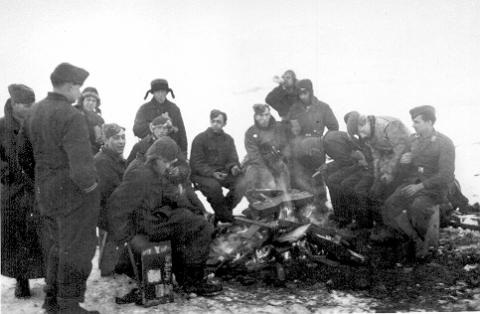 German troops on way back west stop at Berditschew, Ukraine and warm up around a fire on Dec. 29, 1943.
German troops on way back west stop at Berditschew, Ukraine and warm up around a fire on Dec. 29, 1943.
1 January 1944: High-altitude bombing attack with dive bombers against the enemy-occupied village of Kodnya. Heavy anti-artillery fire. Second mission: high-altitude bombing attack against Soviet columns on the Saiguri-Troyanov road.
3 January 1944: High-altitude bombing attack against Soviet trucks at the occupied locality of Bobrik (these attacks were flown from Koskov starting on 1 January.)

Planes in readiness at frozen airfield at Koskov, Ukraine on 1 January 1944.
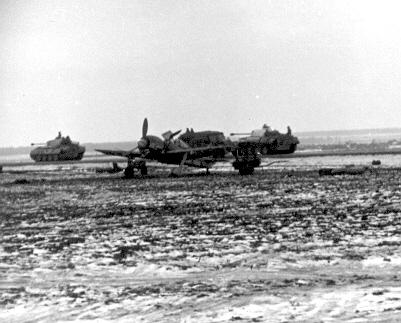
A week later on Koskov field: Panzers and planes together. With the thaw comes the mud.
5 January 1944: Congratulations on Dad’s War Service Cross.
I was really lucky today! During my mission, my steering cable was shot through and I was still able to bring my plane straight back to our landing field. Since I had to do a belly-flop landing at high speed, my plane was totally destroyed; I escaped without a scratch. Only my knee got a bit bumped about. It was no longer possible to steer the plane using the stick, but I kept it in the air using the electrical trimming and could only land at high velocity.
[Lt. Erhard Nippa witnessed Poldi’s high-speed belly-flop landing and estimated that the landing strip was not long enough to come to a stop without hitting anything, as a result of which Poldi crashed through the barrier along the edge of the field and disappeared in a gigantic cloud of smoke. Nobody thought his life was worth a plugged nickel at that point, but Poldi’s ghostly form suddenly appeared, crawling out of the billows of dust and smoke practically uninjured, while the plane was completely smashed. The very next day Poldi was already at it again, flying two more bombing, cannon and machine gun attacks in a new FW 190 against Soviet troops near Korovintsy, during which he seriously damaged a Soviet IL-2 aircraft and received a direct hit himself. The second mission was a high-altitude bombing attack in the same locality. -WW]
7 January 1944: Flew two missions today: a dive-bombing attack from high-altitude against the Soviet-occupied city of Yanushpol; plus a second low-level bombing mission against the same armed forces.
11 January 1944: We took off from Proskurov this time, dive-bombing attacks against the locality of Voronovitsa.
12 January 1944: We’ve been flying mission after mission, steadily, over the past few days. The weather is often too bad to fly, so we just waste time doing more or less nothing, waiting around and passing the time with this and that. This time I was stationed in a stinking little shack near Kashubiya, but at least now I’ve got a nice room with another Oberleutnant in a real house with electric light. We can listen to the radio again, so for the moment we know what’s going on along other sections of the front; so far, so good. [According to the flight log book he was taking off from Vinnitsa -WW]
Flew four missions today: high-altitude and dive-bombing attacks against the heavily Soviet-occupied position of Rossosh. Heavy flak, not only there, but around Berezovka and Yasenki as well (with heavy fighter defenses, too) and high-altitude attacks against the enemy-occupied locality of Strutinka.
We’re not getting mail anymore. The last time I received a letter was some time before Christmas, so I don’t know what’s going on at home or, above all, how you are. I hope Dad is still home and that Willy is still around Leoben [yes!]. The best thing, of course, would be for Mom to go to Gleichenberg with the children right away. I hope you‘ve been getting my letters regularly. I’m anxious to know whether all the news I’ve been sending you has actually reached you. I also sent my original German Cross in gold home to Germany with a non-commissioned officer. It occurs to me that I also sent you two flight log books by registered mail, the delivery of which has now been confirmed. I haven’t written to the Gauleiter yet. Should I really answer him?
Somebody gave me the stick from my destroyed plane as a present; wasn’t that a nice thing to do?
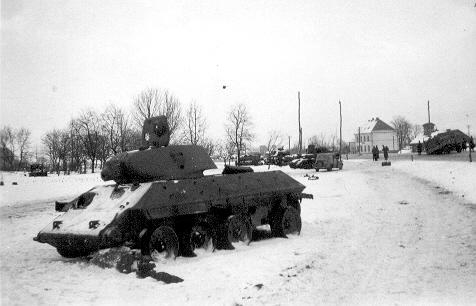
A disabled T34 Russian tank near Gramowka, Ukraine in January 1944.
19 January 1944: We finally got our mail today, to our great joy. We didn’t get any letters, but we got a whole load of Christmas presents. I was transferred to a new location today [Gramowka?]; I’ve already changed locations six times during my stay in Russia.
We’ve had very bad weather for two days now, with fog, black ice, rain, snow and very low temperatures. My living quarters, in which I’m spending the day today, since I have a day off, is quite nice and was made a lot homier by the arrival of all the magnificent Christmas presents. The tiled stove in our room doesn’t get very hot but when it gets dark and we have nothing in particular to do, we go straight to bed anyway. I got my hands on another padded sleeping bag with zipper fastening, and hitting the sack is just about the most beautiful thing in the world right now.
A film group was here a few days ago and showed us a few films. We saw two films right away, the same evening, a sort of down payment against future deliveries. The region around here is absolutely miserable; no bigger villages anywhere for miles around, just these horrible Russian cottages...... and a lot of snow. As far as the landscape is concerned, it’s already very beautiful around here and very fertile (we killed a calf again today).
I gave a package with chocolate and other stuff to somebody going on furlough, to take back to Germany. I hope these things arrive safely and you like them. Finally, I hope to hear from you again soon.
22 January 1944: Today was another big day: we got our mail at last! So at last I know how you spent Christmas at home in my absence. I’m especially happy to hear that Willy was able to be with you and that his wish to get home and be with you came true.
I’m doing very well, feeling like a million dollars. I don’t hardly need my walking stick at all any more, and I haven’t even gotten lice-infested yet! Things are going great and we’re able to fly again, just as we wanted. So morale is way up again. I’m going to write to Willy now. I’ve already written to the Gauleiter and [Hitler Youth] Bannführer; written like a soldier: terse and laconic.
22 January 1944: Dear Little Brother! I got a letter from Mother today and learned all about the Christmas celebrations. I was glad to hear that you were able to make it home, that really made me happy. Couldn’t you get transferred closer to Leoben? That would be even better, if you could be closer to home.
Did you ever find out when you’ll be called up for the RAD [Reichs Labor Service] or the Air Force? You could easily tell me a bit more about it. I hope you’ll have enough time to do that for me. For my part, I can tell you all kinds of things about how we spent Christmas here, and so on ….
I don’t know whether you know that I went through another belly-flop landing as the result of a single direct hit with a machine gun bullet that damaged my steering cable. That is, the cable that activates the elevator was shot clean through and was inoperable, but I was still able to reach the landing field at high speed using the electrical trimming. Of course, the plane ended up in the fields far off the end of the runway. I just received the stick as a souvenir.
Well, since there was good weather in the past few days we’ve flown a lot of missions. Today, for example, we convoyed a squadron of Junker Ju 88 planes and then we all attacked a Soviet divisional headquarters together. I can tell you: we really stirred up some dust! I flew an even longer mission the same afternoon. At one point, I surprised an armored Soviet ground attack plane. Since I hadn’t dropped my bombs yet it wasn’t easy dodging around in aerial combat but I managed to score a direct hit on the cabin. You don’t see those guys very often, and unless they’ve really got you outnumbered they usually avoid you like the plague.
4 February 1944: Since I got two letters from you yesterday evening as well as one from Willy, I want to answer right away. Thanks for the pictures, which are really nice. I think I’ve received all your letters now, at long last. The reason for the delays is that the flying squadrons, that’s us, are always away whenever there’s good weather and we have to depend on liaison aircraft; they carry mail, but they’re stationed at support points far behind us. So it sometimes happens that by the time the mail gets to the front line airstrip where they think we are, we’ve already been someplace else for a long time. In any case, I’m especially happy to say that the mail is getting to us at regular intervals now – or what you might call regular intervals.
I stopped writing just now because it was time for dinner and we had a film presentation right afterwards. Now to your letter: I can’t send Dad the Christmas reports since we rarely get a chance to listen to the radio and there are no newspapers here. You asked me what the region around here looks like. Well, it looks like spring. There’s no more snow, just water, and a lot of mud and filth; I can’t really describe it. You can’t imagine how much filth there is around here.
In bad weather we catch up on our sleep, which we don‘t usually get enough of. I think you asked how things are going generally. Well, there‘s a lot of lead and iron flying around, the air is full of it. The Soviets have been catching a lot of hell again since this morning. They got all their aircraft together against us and we’re having rather a lot of aerial combat. I got a Red fighter plane in my sights yesterday and just as I was about to start shooting, all my guns jammed. It makes you really mad to get in such a pickle, just when you’ve got one of them in your sights.
Our position was attacked today, but we were ready for them. We had a bit of a celebration again yesterday: it was my 150th combat flight mission. We flew some beautiful missions again today, together with the dive bombers. But there was so much water all over the place that you practically needed a sea plane just to land. I’m fit as a fiddle, just as well as ever. I almost never have any problems with my knee. I also got vaccinated against typhus, which is carried by fleas – the dear little bastards can come get me now if they want (but I hope they’re slow about it).
Otherwise the days are passing quickly. It gets dark at 4 in the afternoon, so there’s nothing to do but eat and hit the sack. I’m usually fast asleep by 7 in the evening and wake up at 5, fresh and lively again. So, now you know enough about me. Please write soon and let me know how it’s going with the two little ones, and how things are going where Willy is concerned. I get all the mail, even if it’s a bit irregular.
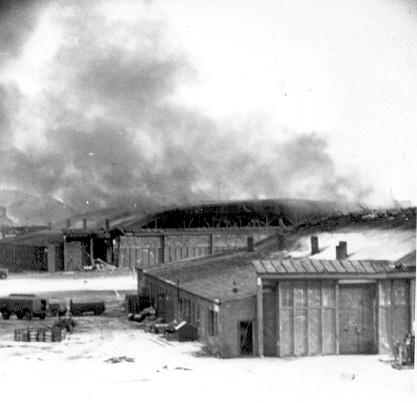 An air attack on Uman in the Cherkasy province in central Ukraine, Jan. 1944
An air attack on Uman in the Cherkasy province in central Ukraine, Jan. 1944
[From Poldi’s Flight Log Book:
Takeoff from Uman since the 25th January. 3 missions flown on 27 January as convoy for an HS 123 dive-bomber unit; dive-bombing attacks against vehicles on the north side of Istaiki; one Stuka attack with bombs, cannon and machine guns against vehicles east of the exit from the village of Medvin. And one dive-bombing attack against Soviet tanks east of Pistarienska. Successful attack carried out by Poldi against Soviet tank, which exploded.
29 January: flew escort for Henschel HS 123 biplane dive bomber unit involving dive-bombing attack against truck column south of Zvenigorodka. (Large numbers of trucks destroyed by direct hits, followed by another dive-bombing attack south of Zvenigorodka; 3 trucks destroyed by bombs, slight anti-aircraft fire. 3rd attack in the same sector against truck columns with satisfactory results.
30-31 January: 3 missions per day, all of them dive-bombing attacks against tanks and trucks near Tikhonovka and Ryzhanovka. Protective escort duty for Henschel HS 123 units near Ryzhanovka .
31 January: In addition, protective escort duty for Junkers JU 52 units in the encirclement battle of Korsun, with dive-bombing attacks against Soviet-occupied Knyazhya and Kvitki; ditto against tanks at Yazvitskaya north of Tsibulev. Enemy contact with two Soviet Lavochkin LaGG-3. Light anti-aircraft fire.
4 February: Another dive-bombing and low-attack with dive bombers, jointly, against Kosakovka; light anti-aircraft fire.
11 February: Dive-bombing attack against truck colums south of Tolstoye. Protective escort for JU 87 and HS 123 units and dive bombing attack against enemy-occupied locality of Sychevka; light anti-aircraft fire. Second mission, likewise with dive-bomber units in the same locality, aerial combat against two Polikarpov I-16 fighter planes. Ammo dump blown up, light anti-aircraft fire.
It seems that with the new commander, Commodore Georg JAKOB, who was trained in the dive bombers and was used to attacking his targets very aggressively in Stuka JU 87 planes from greater heights, our attack tactics are now supposed to be adapted and applied using the FW 190 as well, which is faster, naturally arousing some discontentment among fighter-bomber pilots. After all, they were combat-tested pilots, experienced in low-level surprise attack tactics, in which they themselves were only exposed to anti-aircraft fire for very short periods of time. -WW]
7 February 1944: Very bad weather again, with steady fog for three days now. The Bolshies are so lucky with the weather, you could cry. So we’ve been condemned to sit around for days now, doing nothing. If the sun decides to make a return appearance, I hope to learn to find my way around the Black Sea.
We don’t even get any films to watch anymore. They show the same film all the time, and there are no more newsreels, which is what most interests most of us.
I‘m glad I wore mountain climbing shoes instead of fur boots. With all the mud around here, the other guys are always suffering from wet feet, but my footwear works great.
14 February 1944: Taking off from Nikolayev, we flew several dive-bombing missions against Soviet ammunition dumps and positions east of Apostolovo.
[13 February: low-level attacks with bombs, cannon and machine guns against the Soviet bridgehead of Zolotaya Laka. Very heavy anti-aircraft fire from infantry and anti-tank cannon positions.
Bibi learns that half of all his old school mates from Köslin-NAPOLA have already been killed. -WW]
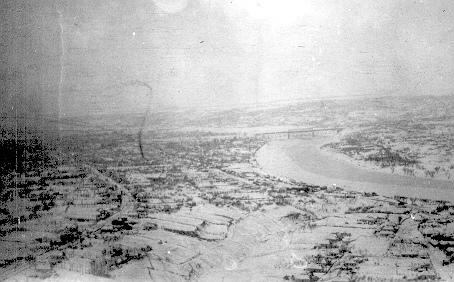
A view from the air of Pervomaisk, Ukraine in February 1944.
18 February 1944: After a short guest appearance on the Black Sea, we’ve withdrawn inland again. So I’ve gotten acquainted with a new country. Unfortunately, the past few weeks have been blessed with fewer missions, since the continuously horrible weather makes flying impossible and then there was all the mud and filth to contend with. Then it froze for three days and now it appears to be thawing a bit.
I just learned that the region around here is really quite fertile and is extensively cultivated, so we took advantage of the opportunity and had a gigantic breakfast today (5 eggs). I’ve been sitting here for three days doing nothing in a strange place because the weather makes it impossible to do anything. But I hope there are a few letters from you waiting for me at my next billet.
23 February 1944: I want to take the opportunity today to write you a very quick letter; I hope it reaches you somewhat more quickly than usual, since I’m a bit closer to home now, that is, I’m with the supply unit. Since I’ve got to take off again tomorrow, I’ll have to finish this quickly. In the meantime, winter has drawn in again. The knee-deep mud and filth have disappeared, so everything looks desolate. This kind of weather is much more comfortable for us, we just hope that the muddy season would finish once and for all, and there would be more action, that’s for sure.
You must have heard what’s going on around here from the Christmas newsreels. We played a big part in breaking out of the Cherkassy pocket, and I flew a lot of missions. Unfortunately, the weather wasn’t exactly allied with us, and we were really happy when we heard that our relief efforts had finally been successful.
To be continued: The Battle on the Dneipr and Sevastopol
Tags
Ukraine, Vienna Luftwaffe officers hospital, Lemberg, Berditschev, Lt. Erhard Nippa, Bolsheviks, Wochenschau, Armed Forces Report, Christmas Eve celebration on Eastern Front, belly flop landing, Commodore Georg Jakob, dive bombing tactics, Cherkasy pocket yCategory
Germany, Leopold Wenger, World War IILeopold Wenger's letters from Ukraine-Bessarabia, March-June 1944
- 25331 reads
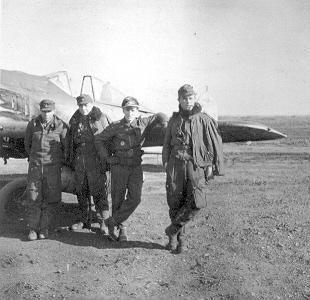
Oberleutnant Poldi Wenger, 2nd from right, stands by his plane in Tiraspul, Moldova with some technicians, on 20th March, 1944.
copyright 2014 Wilhelm Wenger and Carolyn Yeager
Translated from the German by Carlos Whitlock Porter
The following is a neutral account assembled by Willy Wenger describing the situation at the southern portion of the Eastern Front where his brother Oblt. Leopold Wenger was active. The events described here preceded the March to June 1944 letters Willy and his parents received from Poldi, and help to explain them.
The Battle of the Dnieper
From Smolensk to Kherson, that is, from the source to the mouth of the Dneiper, both sides of the river were the scene of a bitter struggle. Stalin had announced the beginning of the Liberation Offensive on 7 October 1943. This was preceded by a reorganization of the Russian armies. The Russian army groups, not including reserves, which were available in abundance, now consisted of 69 armies with 330 divisions, compared to 197 German divisions and a few units of troops allied with Germany. The Germans now had three million soldiers committed to defending the West from the threat of Soviet invasion, in the face of clear Soviet superiority in numbers.
In the South, the Russians claimed their first military victory on 14 October, compelling the 1st German Tank Division to abandon the bridgehead of Zaporizhia. The next day, Soviet infantry divisions and tank brigades went on the offensive between the city of Krementschug and the big bend in the Dneiper River, reaching the major iron-producing center of Kriworog and threatening to encircle the 1st German Tank Division. The Russians now shifted the main thrust of the offensive against the stretch of coastline along the Assowschen Sea. Melitopol fell on 22 October 1943 and reaching the strait of Perekop on 1 November. The 17th German Army entrenched itself in Crimea, while the 6th Army withdrew across the Dneiper and now held only a small bridgehead east of Kherson.
In early November, the Soviets turned their attention to the northern Ukraine. In a change in tactics, Marshal Vatutin withdrew the main part of his armed forces back across the Dneiper, brought them from the southern wing, ferried them back over across the river, and recommenced the attack from the other side. The breakthrough was successful, cutting off the road from Kiev to Shitomir. As a result, Kiev was retaken on 6 November 1943. The majority of German troops nevertheless escaped the encirclement manœuver. On 15 November, German troops succeeded in retaking the city of Shitomir and in restoring the connection to the German front. The German push towards Kiev, on the other hand, was a failure: a sudden early thaw caused the attacking German tanks to sink into the mud, up to the treads and above, putting a sudden end to the German counter-offensive. Kiev remained in Russian hands, but the general situation as regards the German armed forces had improved. In late 1943, the German armed forces were still in possession of large parts of the Dneiper river banks and the major manganese and iron ore deposits of Nikopol and Kriwoj-Rog.
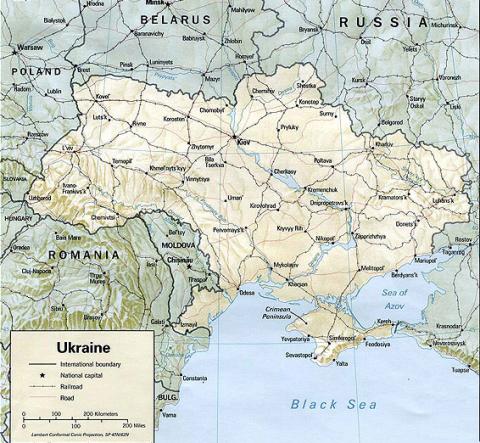 Map of Ukraine showing the Dneiper River which saw many fiercely contested battles. Note Cherkassy, below Kiev, almost directly in the center of the Ukraine territory; further to the west the Bug River, the Dniester, and Moldova, also called Bessarabia. (click to slightly enlarge)
Map of Ukraine showing the Dneiper River which saw many fiercely contested battles. Note Cherkassy, below Kiev, almost directly in the center of the Ukraine territory; further to the west the Bug River, the Dniester, and Moldova, also called Bessarabia. (click to slightly enlarge)
From the Dneiper to the Dniester
Withdrawal into the Ukraine, the Encirclement of Cherkassy
The pause in the Soviet offensive achieved through the Kiev counteroffensive, was of short duration. Marshal Vatutin resumed the offensive around Christmas time. The Russian offensive came from both sides of the Kiev-Shitomir military field railway, which had already been retaken by the Russians on 1 January 1944.
The Russian offensive units were not exactly in great shape. The so-called guard units and mechanized troops were just as aggressive as ever, but most of the Soviet divisions were, to say the least, most unusual. According to reports from the 1st Tank Division, half of the Soviet soldiers captured by them were under the age of 18, and in some cases as young as 13; there were even reports of Russian women’s battalions charging the German lines in frontal attacks. They were described as a huge horde of badly trained, or completely untrained, amateurs, hardly even equipped with uniforms. Of the one thousand prisoners brought in by the German army corps, fewer than twenty were even equipped with weapons, and over half didn’t even have any shoes. Whenever these untrained mobs ran into a German unit that was still halfway intact, they suffered huge, inconceivable, casualty rates. But they were always followed by even more, like the waves of the sea.
The rapidity with which the Russians advanced reminded the Germans of the Blitzkrieg of 1940 in France, 30 to 40 kilometers per day. The offensive expanded in the shape of a fan, driving forward with unparalleled boldness. The southern edge of the wedge overran Berdichev and marched towards the Bug. The German counteroffensive with two army corps reached the Russian lines just as two other wedges were already threatening Vinnytsa and Uman. The most astonishing thing was that the Soviet forces were in no way exhausted.
Although the German army had lost the greater part of the Dnieper line, it still held fast to the region of Cherkassy, in a pocket 50 kilometers wide along the river. From Kirovohrad and Krivoy Rog, the Front formed a deep arc, meeting the river again at Zaporizhia, after which it ran back over onto the eastern bank of the river, forming a front in the shape of an arc, protecting the nickel mines of Nikopol. Further to the south, the front jumped back over the river and followed the course of the river to its outlet at Kherson. According to Hitler‘s orders, this confusing, dangerous line was to be held at all costs. This task was assigned to three armies operating jointly. The southernmost, the 6th Army, covered Nikopol; the northernmost, the 1st Tank Army, kept in loose contact with the 4th Tank Army. The two armies formed a type of pocket, the extent of which extended to the Dneiper, with the 8th Army standing in the middle. Just as Hitler had not wished to lose Stalingrad, he now wanted to hold the Dnieper and Cherkassy.
The capture of Kirovohrad by the Russians in early January 1944 made the German situation even worse. The frontal advance was now over 400 kilometers wide. The casualties among German troops were devastating, enormously reducing their fighting effectiveness as a result of constant fighting. For example, one German tank regiment now consisted of no more than 7 tanks, 4 assault guns, reflecting the strength of a single company. Grenadier regiments with a nominal strength of 1100 men now consisted of no more than 500. The individual divisions defended sections of front from 18 to 25 kilometers in length with only 3,000 soldiers. But any straightening of the front was prohibited without Hitler’s express consent.
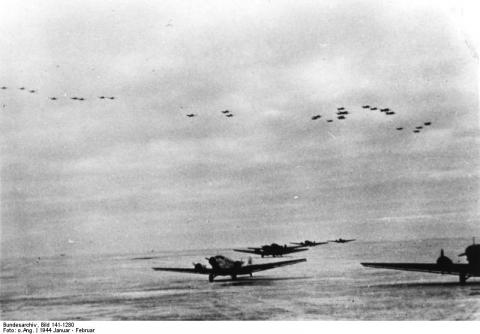
Above: Ju 52 supply planes at Korsun airfield, Ju 87s in formation above in January 1944.
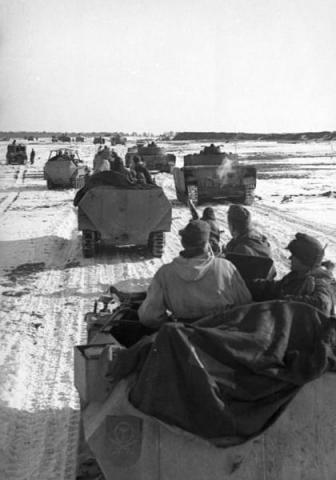
The relief attempt begins. Tanks and halftracks of 1st Panzer Division begin movements towards the Cherkassy pocket, early February 1944.
On 25 January 1944, the 1st and 2nd Ukrainian Front combined their forces on both sides of the frontal advance, thus encircling two German army groups. The commanders of the encircled troops were ordered to defend the entire length of the pocket. The two army groups were to be supplied through the air field at Korsun; they were to be relieved through a large-scale military operation involving 8 tank divisions, in a war of attrition. But operations proved far more difficult on the ground than on a map. The concentration of tank divisions ran into the utmost difficulties. By day, the ground thawed, causing the vehicles to bog down in a bottomless morass; at night, it froze again, holding the sunken vehicles fast in the frozen mud, which was as hard as stone. On 3 February 1944, only a fraction of the anticipated units had reached their intended destination. But it was no longer possible to put off the attack. The troops inside the encirclement were exhausted. The principal necessities could be provided by airlift to the airfield of Korsun, but the airfield itself was already under threat. The two German tank divisions spent ten days attempting to break through to their encircled comrades. The tank corps attacking from the right were compelled to abandon the attempt thirty kilometers away from their encircled comrades. The tank corps attacking from the left got to within thirty kilometers of the encirclement, but was also brought to a standstill. The commander of the encircled forces, General Stemmemann, disobeyed Hitler‘s orders, withdrew from the Dnieper and moved his forces westwards, where relief was expected. But his men were already dying of hunger; ammunition supplies were as good as exhausted. The Russians called upon the German units to surrender. The encircled forces didn’t answer, but they were at the end of their tether. The encircled forces were crammed together in three quarters of the original area; the airfield of Korsun was lost.
On the evening of 17 February, German guns fired their last shell. The remaining able-bodied men formed two columns behind the last tanks. The night was dark and the night frost had solidified the mud into a weight-bearing mass. The breakthrough was achieved using side arms only. The Russians were completely surprised by the sudden desperate German attack. But the Germans broke through, although there was such great confusion that the survivors were hardly able to describe what happened. General Stemmermann died during the fighting. But 30 – 50 thousand encircled German soldiers succeeded in breaking through to the 3rd Tank Corps.
The battle of Cherkassy enabled the Soviets to isolate the German armies deployed in the southern part of the country, pushing them to the Black Sea and destroying them there. From the mouth of the Dnieper to the Carpathian Mountains, four Soviet fronts formed a half-moon around two German army groups. The 1st Ukrainian front facing the south, the 4th Tank Group, the 2nd and 3rd put constant pressure on the German 8th army, which was already bleeding to death, while the fourth front cut off escape to the Crimea.
The battle of Cherkassy was not even finished yet when the German 6th Army was defeated; Nikopol, which had cost such sacrifices, was captured by the Soviets on 8 February. The German 24th Tank Division encircled in the Cherkassy pocket was redirected southwards, but, as a result of the early thaw, which softened the terrain, arrived too late to save the nickel-producing city. The iron-producing city of Krivoy Rogwar was also lost, being captured on 22 February following the Russian breakthrough in the German lines at Apostolowo. Turning southwards, the advancing Soviets then pushed the German 6th Army against the Dnieper in the region of Kherson. It was able to extricate itself with great difficulty, fighting on two parallel watercourses, the Ingulez and the Ingul, but did not succeed in stabilizing the front. Irresistibly, the Soviets were now approaching Odessa, where 10,000 partisans had taken refuge in the huge underground sewer system.
In the northern Ukraine, a new phase of the struggle was already beginning. Marshall Zhukhov began the offensive on 4 March, in a thrust against Tschernowitz, the capital city of Bukovina, which had belonged to Rumania between 1919 and 1939. Here as well, the Russians broke through, and were already threatening the major Lemberg-Odessa rail line, the only transport link to the Black Sea. The German counter-offensive, with only three tank divisions, was unable to stop the Russians in their attempt to cut off the major rail line at Tarnopol.
The muddy season had started. If the Russians had behaved as they had during the spring of the past two years, operations would have been interrupted for weeks. But this time, they refused to halt, but rather, recovered immediately, in a new offensive, very much to the surprise of the German High Command, who had been counting on the yearly pause for rest in the spring of the year. The withdrawal through the mud, which reached up to the thighs, was a nightmare. The men were able to advance only with indescribable difficulty, constantly fearing encirclement and capture. Naturally, the Russians had great transport difficulties, as well; they were repeatedly compelled to delay their advance and operational objectives due to the exhausted condition of their men. But they were much more mobile than their adversaries, and were also less likely to get lost in the mud, which concealed the roads. Russian transport vehicles were lighter and Russian caterpillar-tread vehicles* were able to move along the very worst roads, and were still effective where the German tanks and tractor-tread vehicles got stuck in the mud.
*During World War II, Caterpillar Tractor Co. made the diesel engines that powered the Sherman (M4) tank. Caterpillar products also found fame with the Seabees, Construction Battalions of the United States Navy, who built airfields and other facilities in the Pacific Theater of Operations. They found their way into Russia too, via the U.S. Lend Lease program.
A Caterpillar D2, introduced in 1938, on display in 2007 at Belvoir, UK shows the unique tread design
On 6 March, the 2nd Ukrainian Front threw itself against the German 8th Army and marched against Uman. After capturing the city, the advance continued towards the Bug, which was reached and even crossed on 20 March. Once again, Zhukov went on the offensive, overrunning the German 4th Tank Division, crossing the Dneiper and capturing Tschernowitz on 24 March. The extent of the territory captured by the 1st and 2nd Ukrainian Fronts in 3 weeks now amounted to over 200 kilometer. But what was even worse: the 1st German Tank Army was now encircled.
Poldi, as he stated in his letter of 23 February, was very proud to have assisted the troops caught in the Cherkassy encirclement and was also of the opinion that the operation had been a success. Only some of the courageous, half-starved German soldiers still able to fight broke through the encirclement, while German propaganda portrayed their performance that night as proof of German heroism. But the men, with bitter mockery, said they were astonished to hear of their great victory in the Armed Forces news reports. -WW
1 March 1944: Dear Willy, when I got your beautiful and kind cards and letters among a large quantity of mail a few days ago, I was really astonished to hear that our half-soldier (former anti-aircraft gun assistant) has now become a “working soldier” [member of the Reichs Labor Service]. And when this period of time is over and a thing of the past, then real soldiering will be much more enjoyable for you. In any case I’m glad to hear that you’ve gotten another step forward in your chosen career. I’m really sorry that I couldn’t serve a few months with the RAD, too, since, from what I gather from the tales told by others, this very short time is a valuable experience for everyone. Of course, there are some difficult and hard times, but it’s all just intended to give you a little preliminary practice for real soldiering, during which things that are difficult won’t seem so difficult any more, and in the end you’ll only remember the most beautiful times in the whole experience.
While you’ve been doing your service over there in Silesia, I’ve been doing a lot of traveling. For the moment, I’m in the region around the coast of the Black Sea, I’ve flown a few missions, but mostly ”long stretches.” Besides that, the weather has not been exactly favorable recently. Once again, you sink fast in the ooze and filth, you really can’t imagine what a filthy pig your brother looks like half the time. Today, on a mission in the vicinity of Krivoy Rog I had bad luck again. Just was I was starting up I got a piston seizure, and had to land again right away. Otherwise, I’m doing well and I’m well, it’s just that we get so little mail. I rarely hear anything from Dad. Since Gerhard and Gretl have been in Gleichenberg, Mom has only written once. But I hope to hear something from all of you soon.
7 March 1944: Since the Bolsheviks made their appearance again, there’s been a lot of work for us. It’s just that the weather is not exactly helping us. A lot of things would be different if the weather gods were on our side. During my last few missions, we really had to do a bit of dodging around and had to do a lot of the “flak-dancing”. An officer cadet from our squadron was shot down a few days ago, but we’re hoping he succeeds in finding his way back to us...on foot.
14 March 1944: To keep you from getting the impression that I‘m already dead and buried, I thought I would report to you once again. I wanted to write to you more often, but even if I had time to do so in the evenings, I was so tired that I was unable to get anything off to you. For some time now, the weather has been better and we’ve been able to fly again, so the first missions take off at dawn and they only stop at night. You can easily imagine that we often get weak in the knees. There were days in which I flew six missions. But it’s all necessary because the Kaschubians from the Masurian/Pomeranian area around the Baltic Sea attack our positions in frontal charges with such persistence that you would never have believed it possible.
I’m completely cut off from the world for the moment. There are no cities here for miles around, and we never see any newspapers. Since there’s no electrical light (electricity), we can’t listen to the news either.
Since 12 February, we’ve been taking off from Nikolayev, usually the southern section [im Südabschnitt], in the big bend of the Dnieper, against Soviet bridgeheads on the Dnieper [writes Bibi]. Starting on 11 March, Bibi was transferred to his new, bleak station in Rauchowka.
15 March 1944: I flew a lot of missions in the past few days and had quite a decent success rate. Two transport planes attempting to resupply a Soviet division that had broken through, were shot down by my squadron. But unfortunately, I wasn’t able to participate, I could only witness it. Combat flying is really the most important thing right now, and I’m sorry I didn’t start with it earlier. I’m looking forward to hearing about your experiences in the Reichs Labor Service. I’m still well and I’m always healthy. My leg has gotten used to a great many things by now, so I’m doing all right and I’m satisfied. Whatever else is happening to us along the Bug river front, you’ll hear from the Armed Forces reports. There’s a lot going on here; you can be sure of that.
23 March 1944: Apart from snappy missions, during which there was usually a lot of iron flying around in the air, very little has changed. I flew my 100th Russian mission yesterday, and got a beautiful 2cm direct hit in my wing panel. You get assigned to combat missions here a lot quicker than you do against England. Everything is swimming in mud again, since it’s rained a little bit. But we’re already used to all that sort of thing around here. They ought to build a cinema, though. But for the moment, we’re far away from all that here. So we spend our free time in other useful employments... namely sleeping.
26 March 1944: At the same time, you write to me, and say you don’t know what to say. Should I write your letters for you? But at the same time, you want me to tell you everything about what I’m doing. – OK, a few days ago, I flew my 200th combat mission. On my last mission, I was able to blow up a munitions vehicle with just a few shots. On my 201st mission, I got into a dogfight with a Soviet two-motor PE2 bomber and shot it down. It crashed and burned right next to a road. Two crew members were captured by our infantry. I was able to observe this from the air. That was my first confirmed "kill."
28 March 1944: Yesterday evening I received your two letters dated the 18th of this month. They were rather a long time getting here. Now I know how things are going in Gleichenberg and what my two siblings are doing. – I feel less edified about your experiences in Leoben with regards to air attacks. It’s only good that nothing more important got blown up and that nobody was killed. I hope you don’t have to go through any more air attacks.
1 April 1944: Where we are concerned, the fighting has gotten a lot tougher in the last few days. It’s unbelievable how the Soviets throw themselves into the struggle, over and over again. I destroyed a plane on the ground yesterday, and today, with my wingman, during an anti-tank fight, I destroyed a Soviet tank, which caught fire and exploded. Those are the most recent events. My very best wishes to you, and please extend my best wishes to our dear Father; best wishes on your birthday, which will be coming up in a few days, and I hope you will be able to celebrate your day of honor many more times, in good health and happy spirits.
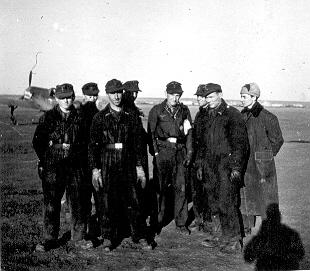
March-April 1944: Men in Black? This appears to be members of the maintainance crew for the squadron's airplanes.
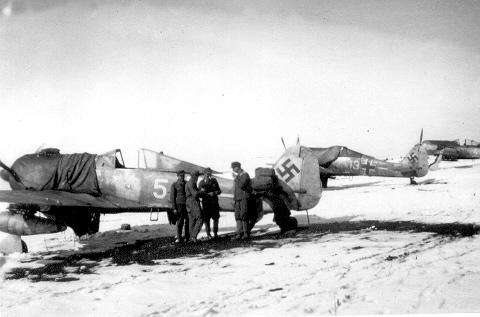
A sudden Arctic snow-storm blows up in April in Leipzig, Bessarabia; notice the warming coverings on the plane's engine sections in this picture taken on April 4th.
3 April 1944: Easter is coming up soon, but around here you wouldn‘t notice it for the moment. After a relatively long period of beautiful, even warm, weather, sometimes, we got a real Arctic-style snow storm that blew up yesterday, like a hurricane, turning a beautiful battleground into a frozen desert. The snow drifts are sometimes so big, that you can’t land or take off in an airplane, and you can’t drive a car either, and horses are the only reliable method of transport left. The Rumanian population is always very friendly and helpful to us. I saw two-humped camels today for the first time; these animals are doing real great service where our grunts and beetlecrushers are concerned. You said you wonder why I’m roving around so much. I’m stationed in the southern sector, and if you look at the map, you’ve got to spend a bit of time in the Black Sea or Bessarabia.
It pleases me to hear what the two little scallywags are getting up to in Gleichenberg. I would be very glad to know how long it will be until Willy is released from his Reichs Labor Service. That he‘s now a Party member was really a big step. I’ve always been very happy about my acceptance into the Party.
When I was fresh out of Aerial Warfare School in 1945, it was repeatedly rammed down our throats how important it is for soldiers to get their rations and mail reliably. Hunger and no news from home are considerably bad for morale. See also Bibi’s answer relating to the mail service. -WW
21 April 1944: Of course, it’s not so long since I last wrote to you, but since I have no idea whether the mail is getting through and whether this will even reach you, I am inclined to write more often, insofar as possible. I usually get "home from work" so late that it’s completely impossible to do anything apart from eating a quick dinner and going to bed. We’ve got to get up so early; and after that, I’ve got to use every minute to get some more sleep, insofar as that’s possible. Just as before, I have no news of what you‘re doing. The last letter I got was dated 16 March. Now we’re all hoping for a big mail bag for once or, better, a whole JU full of mail. That would be the fulfilment of my biggest wish, and the same goes for all of us, because when we get no mail from home it has a noticeable effect on military morale.
Otherwise, it’s going through the roof here. Like everywhere else, the air here in this section of front is full of lead and iron flying around. Over time, the Kaschubians have finally noticed what they’ve got in us [what they face with us] and now they’ve installed an incredible, unbelievable, number of anti-aircraft positions, all over the place. As a result, one of the best pilots in our squadron got shot down by them. But we’ve scored quite a few successes nonetheless.
A few days ago, I was once again able to send Mom a few pictures I took, so Mom’s wish has finally been fulfilled if she gets the aforementioned photos, which were developed by our photographic agency, as per order. Satisfied now?
I’m doing really OK. A few days ago my guts and brain couldn’t take it any more, but after lying down flat for a while, I felt all right again. Otherwise, I’ve got no news to communicate. Have you heard anything from Willy? I would be interested to know what he’s doing and how he feels. Oh well, if the mail ever gets here, which I most fervently hope, hopefully all my questions will be answered.
Since the opening of the large-scale offensive on the Beresina-Bug front, Poldi's 4th squadron was also transferred further north within the framework of the 10th Battle Squadron. The fighter-bombers were also ordered to carry out more frequent fighter missions, particularly, however, and in addition, against American bomber units flying in the Soviet Union under the terms of the American-Soviet Pact and Lend-Lease Agreement, landing there for refuelling. -WW
9 May 1944: Dear Mother: A beautiful Sunday is coming soon, which will also be the Great Day of our Mothers. On that beautiful day, I, too, will be thinking of you and yours most especially and sincerely, and I hope that you will at least be lovingly and happily cared for by our younger sister. I would be glad to send you a bouquet of our magnificent lilacs, which are now beginning to bloom, but that will be impossible.
19 May 1944: I am still in the same section. We visited some other regions further south for just a few days, with a very famous bathing beach (presumably Mamaia). And I was also there during the evacuation of the Crimea, over the water, partly to provide a protective escort for the ships bringing our troops back. That was when I could fly again. Since before that, I was in such bad shape for two weeks that I could hardly gasp for breath. So I had to lie flat for a long time and the doctor didn't even want to let me stand up, but now I'm all right again. I flew a few solid missions in the past few days and had a jolly dogfight back on the front yesterday.
It's gotten really warm here, a bit early. So we changed our winter clothing into our summer suits of blue linen, almost like clothing designed for the tropics. It's also gotten quite comfortable in our
village. The blossoms on the trees have already come out and now everything is beautifully green. Our house has a small veranda which is entirely glassed in. We've decked this area out so it's quite relaxing
and pleasant now, and it's now our relaxation area. There are wild grapes all over the place, just like in Anger in the old days [My birthplace in Eastern Styria, where my parents lived in 1929 and where Bibi spent his youth -WW]. There's a big stork's nest on the roof and they chatter all day long.
Today I'm sending a couple of photographs of my squadron. I don't have a lot to say about myself; of course, I'm quite well, I feel well and everything is all right.
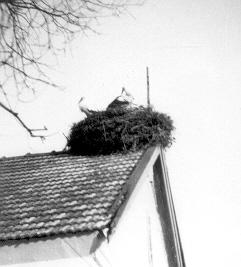
May 1944 in Bessarabia ... "There's a big stork's nest on the roof and they chatter all day long."
23 May1944: ...so, that's really funny, the way Mom imagines my furlough. Only, once again, it's not as simple as all that, the idea that you can just take time off whenever you want to. Planning it ahead of time is simply impossible.
In the meantime I just had a nice short little snack. A piece of bread with cooked ham, a couple of radishes, butter and tea form the frugal meal made possible by the organisational talent of my squadron. But once again, I also noticed that doves taste good when properly roasted. As you can see, everything is going very well, just as before.
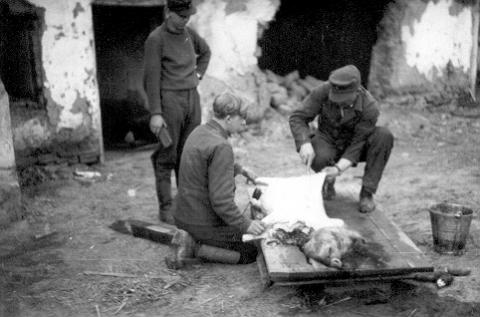
May 1944, Bessarabia: Preparing a meal in primitive conditions.
6 June 1944: Since we had nothing to do again today, although the weather outside is absolutely magnificent, I've once again gotten around to writing to you. Now, I'm always glad to hear that
everything is all right where you're concerned, considering the circumstances. Since when I hear about the enemy aircraft incursions over southern Germany, it gives me unbelievably more courage. As long as the alarms keep going off, I can stand everything. I flew a whole load of missions again during the large-scale fighting north of Jassy, and was able to fly my 300th combat mission in May. As a result, I was presented with a bottle of champagne by my commander (Oberstleutnant G. Jakob) and from the squadron, an ashtray made out of the piston of my old plane, as a souvenir. Take good care of yourself!
Unfortunately, we had some trouble. My two oldest pilots have been lost, one after the other. One of them blew up during an emergency landing and the other was forced to eject by parachute, and ended up in Soviet captivity. This kind of bad luck is naturally a big blow to all of us. Yesterday there was an announcement that the long-awaited invasion is now building up, and this fact has naturally triggered a lot of excitement with regards to anticipated events. I must say, that after waiting so long, a heavy stone has fallen from my heart. I am now curious to see whether this turn of events will finally permit me a return appearance in France. You never know. There's already enough to do here.
I saw a couple of funny films in the last few weeks. But it's a shame they're no longer showing any Wochenschau films [military newsreels].
9 June 1944: Dear Mother! On the occasion of your birthday, which will be in a few days, I want to wish you all the imaginable happiness, good luck and excellent health. Please excuse the „fantastically imaginative“ stationery, but I'm stationed at another position at the moment, and I don't have everything with me that I need.
I would also like to congratulate little Gerhard a belated Happy Fifth Birthday. Once again, I hope that everything is going well for him and that he is also enjoying the very best of health.
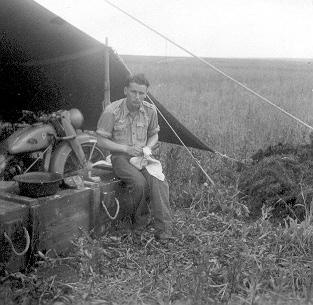
Poldi works on motorcycle maintainance in Culm, Bessarabia on June 6, 1944.
20 June 1944: I also have enough to do at the moment, even if I'm not really doing a lot of flying. There's not much going on to the front of us in our section. In compensation, however, there has been a significant increase in Soviet aerial activity and they paid us a visit almost every night.
Otherwise I've done a lot of travelling around in Rumania in the past few weeks. Last Sunday, I found myself in a halfway European-looking city again for the first time in six months. We were comfortable there. Just as we were leaving the position, we even stopped at an ice-cream parlor and had a first-rate ice cream with whipped cream. From that place, you'd never notice there was a war going on. Even in the guest houses, you can still get everything to eat, even without stamps. The only thing lacking is the necessary leis [Rumanian currency], since we only receive a small fraction of our salary in Rumanian money, but since we had to return to our collection point and take off on another combat mission at 3 hr. 30 min the next morning, this didn't bother us too much.
Unfortunately, one of my squaddies, a midshipman Oberfähnrich from the anti-aircraft artillery service, was shot down and crashed. So we are having one bit of bad luck after another. Only yesterday, an Oberleutnant from my squadron was wounded in an emergency landing. I hope things get better again soon.
What's new with you? How have people taken the news of the starting [Allied] invasion and the [German rocket] reprisals that were just beginning at the same time? According to guys [coming back from furlough], the morale barometer is supposed to have risen fitfully. The English are getting stupid, it's like looking outside to see if the washing is dry just as your house is catching fire (German V1 rocket attacks). The reports from the invasion front are especially interesting for us, since we already know that whole region in great detail. It's a shame we can't be there anymore. What are they showing you in the newsreels? They must be very interesting. We never get to see them, unfortunately.
I haven't heard anything from Willy for a long time, but I hope that everything is going really well for you and that you are all in the best of health.
27 June 1944: Everything is going well for me, only something really crazy happened on 23 June. Our squadron had our share of being there during a run of back luck. During a mission against bomber units on their way to attack Ploesti and Bucharest, I was taken by surprise by American fighter planes and shot down in flames at 7,500 meters altitude. One of the first bullets grazed my head, shot through my glasses, which were on very tight at the time, and tore through my balaclava without even scratching my scalp. I naturally took a quick nose dive, when the plane started to get hot like a blast furnace. I wanted to bail out, but a lot of pilots have been shot to death recently, just trying to descend by parachute, so I thought better of it and got ready for an emergency landing. And just then one of the Americans decided to score a cheap victory and my plane flew into a thousand pieces and there was less and less plane left, right up to behind my armor plating. In the end, I got away, but my poor plane looked like hell. It looked like a sieve, in fact, and was burning so brightly that I could hardly see anything. I quickly jumped out of the cabin, found a field and seconds later, the plane was lying there on its belly and our battle-hardened Oberleutnant pilot did a quick bunk from the plane, which was getting ready to explode. But it didn't seem to want to explode. It burned peacefully and slowly for quite a few hours yet, and finally went out. So there I lay, lonesome and alone about 55 kilometers from Bucharest.
I withdrew to the nearest village riding on an old farm horse, a real nag, followed by a horde of hollering children, where I was very kindly welcomed and invited in by a very respectable family. I then reached the next German service post in a one-horse-drawn landau, and reached Bucharest the next day, where I was picked up by my squadron. So that was the end of my adventure. Unfortunately, I was informed by my squadron that another man had been killed and a second was reported missing.
The war has gotten harder and more brutal; enemy resistance has gotten tougher, and the number of our own casualties has risen dramatically.
To be continued ... Sevastopol falls and last letters
Category
Leopold Wenger, World War IILeopold Wenger's last letters from the Eastern Front, Aug. 1944-Jan. 1945
- 18652 reads
Poldi Wenger receives the Knights Cross from Generaloberst Otto Dessloch, Chief of Luftflotte 4, on 19 January, 1945, assisted by the General's adjutant. (click to enlarge)
copyright 2014 Wilhelm Wenger and Carolyn Yeager
Translated from the German by Carlos Whitlock Porter
First, an account of the fall of Sevastopol and the loss of Ukraine by the end of June 1944, assembled by Willy Wenger. The letters that follow, the last ones Leopold Wenger wrote to his family, spanned August '44 to January '45. Poldi had been in Ukraine since November 1943, relocating only slowly westward, but now his Group begins to move around, first to Poland, finally closer to Vienna.
Sevastopol Falls
In six to eight weeks, the situation looked quite different. The Allies had landed in Normandy. On 5 May, the 2nd [Russian] Guard Army went on the offensive on the west side of Sevastopol. On 7 May, the [Soviet] 51st Army and Coastal Army expanded their offensives to Balaklava and conquered the crest of the Sapun mountains, with which the German commanders, two years before, had sealed the [fate of the] siege. The German commanders now abandoned their lines all the way to Inkerman, where they intended to regroup for a counterattack, after gaining the relative security of the commanding mountain heights. The situation of the defenders was desperate. One German division after the other gave way. On 8 May, General Schörner issued an order to the Navy and Luftwaffe to make the best of a bad job. On 9 May, the Soviets liberated Sevastopol. A single German unit fought a rearguard action for four days on the Kherson peninsula to permit the embarkation of survivors.
Of the 235,000 men of the 17th Army – according to the ration lists of 8 April – approximately 150,000 men were evacuated by sea to Rumania. At this point they carried only their side arms with them. Another German army had ceased to exist. A temporary calm settled over the Eastern front.
The course of the front now presented a unique spectacle. Along the northern and central section stood the German army; despite major withdrawals, still deep inside Russian territory. The Army Group North, now commanded by Colonel-General Lindemann, still held the Northern front. The Army Group Middle stood even further to the East. The Germans still stood 100 km west of Smolensk, as if they had never entirely given up the hope of a renewed offensive against Moscow.
The southern section of the front, however, had been very heavily driven backwards. The Russians had liberated the Ukraine, pushed forward into Poland, and were only 50 km away from Brest-Litowsk. They had reached the foothills of the Carpathian Mountains. They had overwhelmed Dniester and Pruth. Russian soldiers had now penetrated, not only Bukovina and Bessarabia, but even the Kingdom of Rumania. Odessa -- with Sevastopol, one of the last cities in southern Russia still held by the Germans -- was overrun on 10 April.
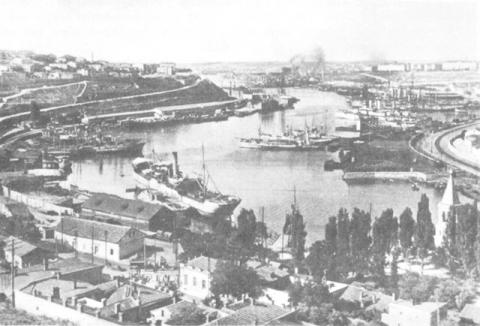 Sevastopol Harbor
Sevastopol Harbor
Due to the heavy fighting in the southern section of the front, the numbers and fighting strength of the German troops were steadily wearing away. Since the divisions had to defend sections of front from 25 to 50 kilometers wide, sometimes there was only one man for every 50 or 80 meters along the foremost front line. There were no reserves, and no relief.
Operations were made even more difficult by increased partisan activity, particularly in the territory of the Army Group Middle. The Soviet Union was full of partisans, everywhere the Germans went, but nowhere so numerous as in White Russia. Every night, listening posts counted between 100 and 200 airplanes, flying in supplies for the 225,000 partisans. The armies had only one supply line left, upon which the Germans concentrated their full attention, without, however, ever entirely eliminating sabotage and partisan attacks. It was war without mercy, which spared neither the wounded nor prisoners, in which uncertainty was answered by terror, shrinking from neither torture nor desecration of the dead. The civilian populations were, almost without exception, bitterly hostile, although there were occasional, very willing and useful German sympathizers.
German measures intended to deal with the increasingly difficult military situation were becoming more and more ineffective. In early 1944, the first German recruits born in 1926 appeared on the Eastern front: soldiers aged 18, of whom anything could be demanded. But this arrogant faith was refuted by Russian realities on a daily basis. One third of all German troops fighting on the Eastern front had already been wounded once and nonetheless declared fit for further service. The destructiveness of the air war on Germany had a depressing effect on soldiers during their rare furloughs at home. The melancholy Russian landscape, the abandoned villages, the impression of emptiness and the uncertainty of links with the rear, as well as the extremely unreliable postal links with home, had a demoralizing effect, under which confidence turned to resignation, resignation to fatalism, and fatalism, finally, turned to despair. The German armies were aware that, basically, they had been defeated once and for all.
Replacement parts and new materiel deteriorated in quality, since raw materials like manganese, nickel, molybdenum and wolfram were no longer available in sufficient quantities. With the destruction of the Rumanian oil fields by the Americans, the monthly fuel deliveries sank to almost half that of the previous month (May1944). Units at the front could often hardly plan from one day to the next; mobile units were threatened with complete paralysis.
Hitler prohibited his generals from evacuating even one single foot of occupied territory, promising his generals a quiet summer. As in past years, the middle section was believed destined to become a secondary theater of war, in which one only need expect occasional local attacks.
It was in the southern section that the Russians could be expected to attempt to expand upon the advantages already gained during the winter months, in an effort to push through to the mouth of the Danube, driving the Germans out of the Balkans, capturing the Rumanian oil fields and threatening Vienna. The Führer had already taken measures to contain the anticipated offensive “blow for blow“, reinforcing the two army groups in the south as much as possible. The offensive was to break up against the steel core of the Wehrmacht. The Red Army was said to be a mass of unreliable stability. A singe push of sufficient violence could bring it to its knees. This was how the Czar’s armies had broken up in its offensive against Germany in 1914, in one single push; the same thing happened to Lenin’s army during its attack on Poland in 1920. The contribution of the Army Group Middle to final victory would consist of holding the front with the forces it had available.
The Army Group Middle was made up of four armies. The 2nd Army, weakened and demoralized, held no less than 500 kilometers of front east of the Pripet Swamps, but had little contact with regular Russian military units. The 9th Army stood on both sides of the Beresina. The 4th Army was attached to the 9th; it crossed the Dnieper twice before it made contact with the 3rd Army.
The month of May was already over; June had just begun. Rome was lost; there was heavy fighting in Normandy, but relative quiet reigned in the East. German reconnaissance troops, however, were becoming increasingly nervous. In the regions occupied by the Army Group North, as well as by the Army Groups North and Southern Ukraine, there were no signs of any preparation for an offensive. At the same time, the Army Group Middle reported considerable concentrations of enemy troops. The major Russian offensive, therefore, was to be played out here, instead of where the German High Command had most effectively prepared for it. It was not aimed at the Rumanian oil fields and iron ore deposits, therefore, at which Hitler stared like a man spellbound. With astonishing organizational skill, the details of which are not known to us, Stalin had succeeded in shifting the bulk of the Soviet forces 500 kilometers northwards.
The Soviet offensive against the Army Group Middle began on 20 June with a large-scale partisan attack. Partisans appeared without warning, everywhere, out of nowhere, attacking roads and rail lines, as well as supply depots, involving the Germans in 3,500 individual combat actions and causing 10,500 explosions on the railway lines.
Forty-eight hours later, at dawn on 22 June 1944, after a muggy night, interrupted by vehement summer storms, Soviet tanks and infantry units went on the offensive against the German 3rd Tank Army, attacking the 9th Army on the very next day, throwing 140 infantry divisions and forty three tank brigades into battle against the thirty-four divisions of the Army Group Middle and the sole remaining German tank division.
The summer offensive was characterized by one menacing innovation. A rolling barrage, including the massive use of Stalin organs, smashing the German front lines, was followed by a preparatory aerial bombing offensive which astonished the Germans with its violence and range. Apart from the 6th Air Fleet, which was assigned to the Army Group Middle, the Werhmacht had practically nothing with which to counter this violent offensive. The Air Fleet had only 40 usable fighter planes on 22 June. The result was an astonishing reversal of the previous conditions, reminiscent of the situation in Normandy: German soldiers in the East were now fighting an enemy in possession of absolute superiority in the air.
* * *
From this point on (summer 1944), several letters are missing. Something must have gone wrong with the postal deliveries, so a few things got lost. In any case, Poldi’s letters became fewer and farther between; he presumably had much less time to write as a result of the intensfied, exhausting combat missions. -WW
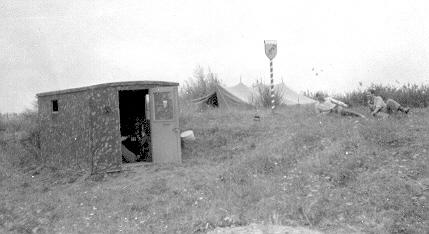
Above: August 1944, the squadron lives out in the open in tents close to where their planes are parked, in Sochazew, Poland.
Below: Poldi looks at the photographer as he and Lt. Heiermann converse while relaxing on the grass.
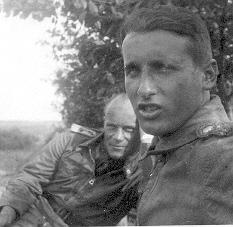
13 August 1944: … I finally got another letter from Dad yesterday; it took a long time getting here, since it was dated 13 July. The main thing is, that it got here at all. You’ve been in our summer house at Gleichenberg for 2 months now, and the two young ones must be enjoying it. Gretl and Gerhard are certainly better off down there than in Leoben. Even if the area did get hit by a couple of bombs, it’s not so bad, since they were probably just dumped by a plane that got shot up and had to jettison its bombs in an emergency.
Otherwise, I like to imagine being with you at this time of year. It’s just a shame that the restrictions on furlough are so strict – they’re not going to be relaxed now. It’s not particularly beautiful where I am now [according to the flight log book, Bielice, Poland -ww]. Especially, living in a barracks is really no fun at all. But it’s better than being quartered in a dump full of bedbugs with some filthy Pole.
I haven’t got a lot to say about myself. It’s all the same here. As usual, I spend most of my time in the “upper air“, I’m in good health and feel good. I got a letter from Willy (from Leoben, still), in which he tells me about his school-leaving examination:
“After approximately 8 years of stubborn fighting and bitter struggle, committing all my forces, including reserves and auxiliaries (“to hell with it”, crib sheets, etc.), I was finally able to bring about a victorious end to the fighting through a quick and decisive victory.“
When I read that, I really had to laugh. I hope he always keeps his sense of humor!
In the meantime, Poldi came home on furlough and built the veranda on our house, together with Dad.
His flight log book ends on 24 August 1944 with the entry of his 368th combat mission, out of Bielice. His very last flight book was lost at the end of the war and the following information was taken from what remains of his letters. -WW
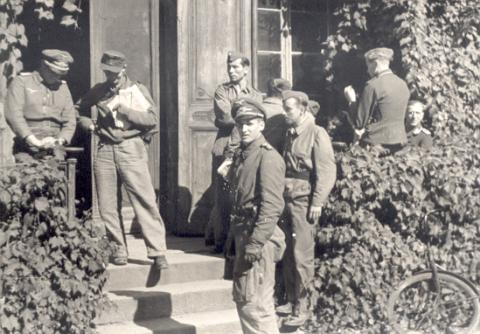
Poldi stands in front of a German Headquarters building in Krosenow, Poland in September 1944.
14 September 1944: After a long, circuitous journey, I finally arrived at my old point of departure yesterday morning, 14 September, was reunited with my unit and flew a mission with them in the afternoon. I had to spend the whole night in Vienna [coming from Leoben -cy], then Breslau, from 17 hours to 5 in the morning, then on to Litzmannstadt [Lodz] where I spent half another night someplace from 14 hours to 21 hours. Things moved a lot faster at home. I only had an express train from Vienna to Breslau, the others were all local trains. It was really no fun.
Otherwise, things are still the same; except that a non-commissioned officer has been killed. Autumn is approaching and it’s quite a bit cooler, but there’s beautiful weather again today. My new LG.P. is Posen now! I went to the cinema twice in Litzmannsstadt, saw “Major als Herr“ and “Der Vetter von Dingsda“,
16 September 1944: You’ll be happy to hear some news from me for the first time since my arrival at my unit. I’ve been here for 4 days now – how time flies! The weather is still good and I’ve had a lot of work to do from the very first day. Of course, I only yesterday flew my first mission since I got here, but they’ve scheduled a lot more for me. Nobody wanted to have to be the one to inform the relatives of our NCO who was killed recently; so the heavy duty fell on me. And a lot of other things, too, so I spent almost two days just at a desk. But I made up for it by flying today. Flying over Warsaw, I was able to see that the city can really be described as entirely destroyed. It looks ghastly. The Soviet positions look the same as ever, but only because they’ve stepped up their air defences like you wouldn’t believe. The whole sky was full of little clouds from the bursting shells.
I’m living in a street maintenance worker’s cottage on the edge of a busy street, and since my other comrades relieved me during my furlough, they took off as soon as I got back, so I’m alone, thank God, in a nice, friendly little room, warmed by a tiled stove.
The rations have gotten better. There’s even a cinema in our little aerie—we saw two films yesterday. Only, we have no electric light. That would make it the ideal winter quarters.
When I got here – I’ve got to tell you this – there was a big celebration in the evening, with roast chicken and so on. So I got back into the old routine in no time.
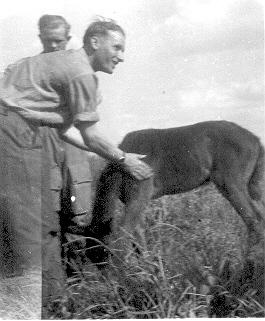
13 October 1944: I’ve been back with my old unit again for two days now. There’s not a lot to do. It’s really very boring. I’m staying in an ethnic German village, quartered with a building contractor. We helped out with the wine harvest yesterday, and then at the corn husking. We didn’t fly at all. The Americans simply flew over us at higher altitudes.
Right: Poldi enjoying some bucolic interaction while quartered in an ethnic German village.
I got to Wiener Neustadt just in time, at precisely 11 hours, although the train only travelled as far as Mürz. But to Gloggnitz [in the Vienna basin] and on to Wiener Neustadt I rode a locomotive, so I got here earlier than I had dared hope. At 16 hours it travelled on further, to Fünfkirchen [in Hungary], where I stayed the night and got to the collection point the next afternoon, since it wasn’t far away. So I’m sitting here and waiting for everything to get put together; till then we can’t do anything.
I was happy to be able to speak to Dad at the railway station, although it was only for a short time.
From letters written home by myself in October 1944 from Oschatz, it appears that Poldi made it to Wiener Neustadt again in the early fall (presumably he was already stationed in Hungary) to pick up a new Fw 190. He was able to notify Dad beforehand, who hurried to Wiener Neustadt to meet him. There, he had an opportunity to admire Bibi’s new plane and even sat in the pilot’s seat. But when Bibi started the motor he jumped out as if he had been bitten by a tarantula and ran away.
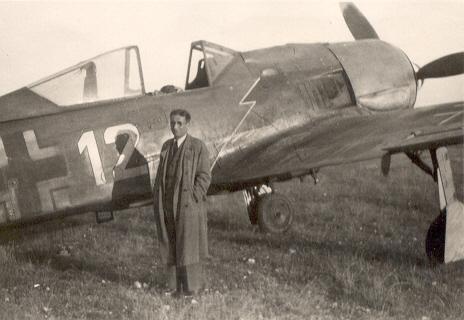
Above: Leopold Wenger Sr. visits with his son in Weiner Neustadt when Poldi comes there to pick up his new Fw 190.
Below: Poldi proudly poses with his brand-new beautiful plane as Dad snaps a picture.
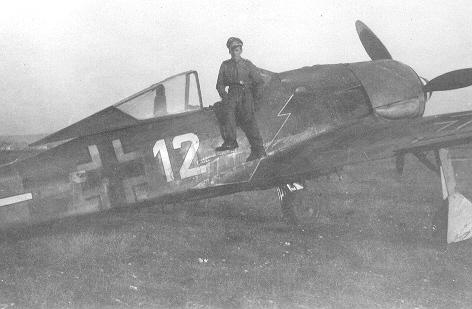
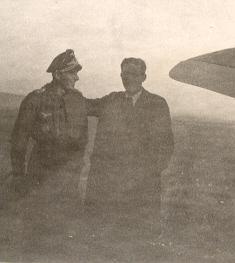
Right: Possibly the last picture of Poldi with his father was taken at Neustadt, in which they uncannily appear to be already communicating in the spirit dimension.
-------------------------------------------
11 November 1944: If everything goes according to plan, Gefreiter Hlavaty is going to give you a ham that’s been salted for eight days now. After another two weeks of salting, it‘s going in the smoke chamber for three days. Or it can be eaten just like ordinary meat. If Gefreiter Hlavaty is unable to travel any further (to Vienna) could he spend the night with us? He is my former wingman.
12 December 1944 (from Hungary): The weather has turned bad again, starting a few days ago. For days, you could hardly see your hand before your face. But the other side has left us alone for the same reason. The weather got better for a few hours again today and we had to watch the squadrons of 4-engine bombers flying towards Germany. When you see that, you feel like exploding with rage.
Once again, today, I participated in the machine-gun defense of our positions against low-level air attacks. Then we paid the other side a visit and showed them a couple of things. We were treated to another film yesterday. For the first time I was able to see a film and a newsreel, but which I had already seen on furlough. Anyway, it made a nice change. Otherwise, there’s nothing new to report.
17 December 1944: Did I already tell you that I was presented with four bottles of champagne by my Commander (Major Götz Baumann) on the occasion of my 400th combat flight? I’m saving them for special occasions.
Since it’s Christmas in a few days, I would like to wish you all the best in this beautiful festivity, and hope you have a few beautiful, comfortable days undisturbed by alarms of any kind. Please let me know how you passed the holy evening. To Gretl and Gerhard, I wish many beautiful hours under the Christmas tree – if everything goes well, as planned, I’ll be able to celebrate the holy evening together with the squadron.
25 December 1944: The holy evening is now over, and we were able to celebrate together with the whole squadron as usual. We fixed up a large room for the purpose and decorated it with Christmas motifs; when I got back from the landing field, everything was ready. Festivities started around 7 in the evening. After a couple of Christmas songs I rose to “address the squadron” and then the Commander appeared, right on time, at the common evening meal. There was a great deal of roast veal to gulp down and we were surprisingly well blessed with “special demand items.”
The evening’s celebrations ended with the reading of the Christmas newspaper and a speech by Dr. Goebbels, and then everyone was left to pursue his own private thoughts. For me, this Christmas holiday brought a special event. I had to do a belly-flop landing due to motor damage on my first mission before reaching the front and only got back to my unit after much hitch-hiking on trucks and changing vehicles many times.
Since two of our people are lucky enough to be leaving on furlough and will be passing through Leoben, I intend to take the opportunity to send you a couple of little things that will make you happy. You’ll find the alcohol very tasty and the leg of pork, too, especially on New Year’s Eve. I wanted to have it smoked here, but due to the uncertainty of staying anywhere in any one place long enough to have time for it, I didn’t think it advisable. The leg of pork has already lain 10 days in salt and I hope to enrich Mom’s larder somewhat with the lard. The two fellows who are going to bring it to you, are my sergeant major and my airman. Now, dear parents, I wouldn’t like to miss my opportunity to wish you all the best at this, the commencement of the beginning of the year 1945, and I hope that this year will produce the long-wished-for and much-aspired victorious conclusion to the war and peace. I would also like to extend my best wishes to my little brother and sister for the coming New Year that is about to begin.
11 January 1945: I don’t know what I’m supposed to think, as to why I have not heard anything from you. Your last letter was dated 6 December and I haven’t had anything since. What’s new at home? If my sergeant major has visited you on his way to St. Anton, as I hope he has, he’ll certainly have a lot to tell me about you when he gets back. But I’d rather hear from you personally! I can’t tell you a great deal of news about myself. I’m healthy and things are going well for me. It’s been snowing a lot for a few days now and we have a really nice winter landscape to look at. Unfortunately, it’s thawed a bit over night and the landing field is a real morass. That is less comforting.
Although the weather was not always very good, I was still able to fly a few really beautiful and successful missions. You can see from the Armed Forces reports how it’s going for us generally. Since I haven’t got anything further to say, I will say good-bye for now, hoping finally to get some news from you soon. Otherwise I’ll have to check up on you myself.
Please accept my best greetings and please write often,
Your Bibi
The letter dated 11 January 1945 is the last one that I could find. Poldi (Bibi to his family) must have written others home, but these were all lost at the end of the war. The letters that I received from my brother were lost, together with my luggage, during my transfer to the Eastern Front in Brandenburg. The following reports are therefore written from memory. -WW
Poldi is awarded the Ritterkreuz (Knights Cross)
In January 1945, towards the end of the month, I received, in Oschatz, at the LKS 3 (Air Warfare School #3), an officer cadet school where Poldi’s military career began, a letter with three photos showing him upon the occasion of his being awarded the Knight’s Cross (Ritterkreuz). This was my last message from him; I was sent to the front and had no further postal contact with either Poldi or my parents, from this time onwards.
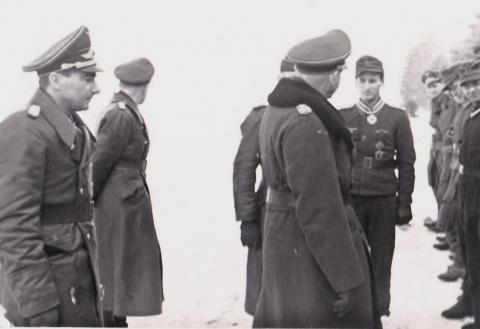
Above: High level visitors arrive at the Squadron's quarters to give Germany's highest military decoration to Oblt. Leopold (Poldi) Wenger for his exceptional bravery and leadership, and his accomplishments. General Dessloch looks toward Poldi as the men of the squadron line up to honor their Capitan.
Below: Hauptman Götz Baumann, far left, Poldi's Group Commander, gets into the joyous spirit of the occasion. Gen. Dessloch in center.
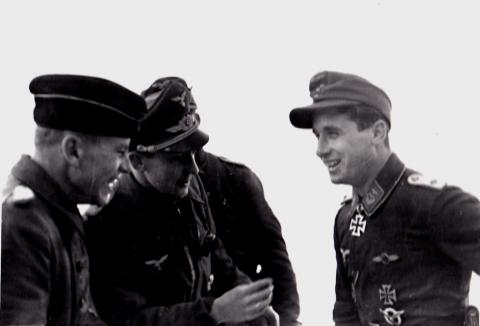
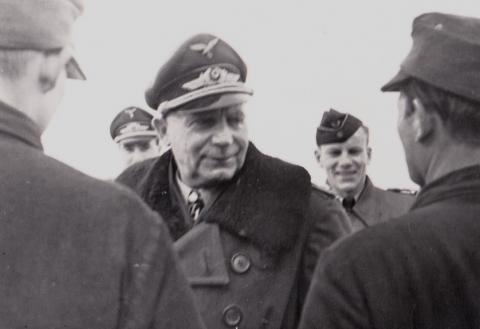
Above: Generaloberst Dessloch listens to Poldi while Commander Baumann beams in the background.
Below: All the men of the 10 Staffel "Red Foxes" pose together in a pretty winter setting; Poldi is 5th from left in front.
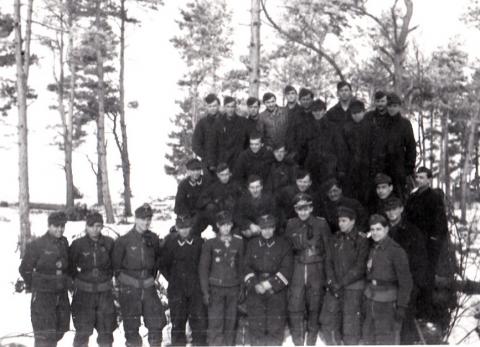
After being awarded the Knight’s Cross, Poldi got a few days furlough. That must have been toward the end of January. It was his last meeting with his parents and his younger siblings Gretl and Gerhard.
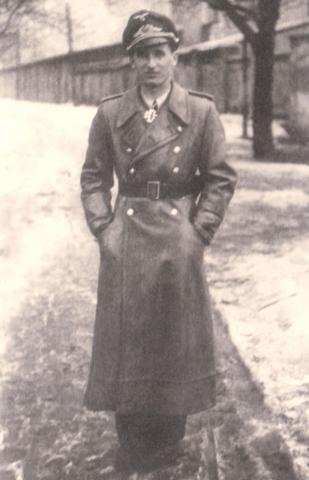
On his last visit with his parents and siblings in Leoben in late January 1945, Poldi looks fit and elegant, as always.
The Soviet advance through Rumania towards Hungary was proceeding with unimaginable fury, involving the commitment of unbelievable masses of soldiers and materiel. Thousands and thousands of tanks attacked relentlessly. Their losses were horrendous, and, what was even stranger, the Russians always succeeded in throwing more and more tanks into the fray despite the high casualty rate; the attacking Russians resembled a column of ants. Bibi’s squadron was compelled to fly a correspondingly large number of missions against this rolling wave of steel. He told me that he had destroyed large numbers of enemy tanks, but almost every letter contained a description of the increasingly higher German fighter pilot casualty rates.
His stay in Hungary was especially friendly, and the food was so good that nothing could compare to it. But the Soviets overran Hungary with unimaginable rapidity, and it sometimes happened that German pilots had to take off from one end of a runway where Soviet tanks were already penetrating the other end of the same runway.
German fighter and ground attack pilots flew constant missions against very fiercely concentrated anti-aircraft fire; it was not unusual for Poldi to be compelled to describe seeing one of his wingmen being shot down, or being blown to pieces by his own bombs as a result of a direct hit in the air. He also described the constantly increasing numbers of modern Russian fighter planes, some of which were superior to German planes.
The Soviets established fortified bridgeheads which put up a stubborn defence, protected by strong flak units, all along the Danube, along with numerous pontoon bridges and large quantities of landing craft which were repeatedly attacked by German FW 190s with bombs, cannon and machine guns during the last few weeks of the war.
Poldi‘s squadron, the erstwhile Red Foxes, was now compelled to change positions repeatedly, fighting a rearguard action: from Semlin-Belgrad, Fünfkirchen, Batasek, Nagy Vaszony, and Bad Vöslau to St.Pölten/Markersdorf.
Last mission
Poldi flew his last mission from St. Pölten. According to his airman, Lt. Loidl from Bad Hofgastein, Poldi shot down several Russian planes on 4th and 5th April. According to other statements by the same pilot, Poldi went to the dentist on the morning of 10 April 1945. He then took off from the region of Gänserndorf to destroy some Soviet tanks which had broken through our lines. As his wingman, he appointed a very young pilot who had only arrived in the unit a few days before. He chose to take this inexperienced pilot under his wing to teach him attack tactics. After hitting the Soviet tanks, they were attacked over Vienna by fighter planes that had the sun behind them. Poldi flew directly at the enemy planes firing everything he had, with German anti-aircraft fire in between them. The young pilot succeeded in escaping from the enemy and landed safe and sound in St. Pölten. Poldi was listed as missing.
It was later discovered he had done a belly-flop crash landing on a railway embankment in the immediate vicinity of the old airport at Aspern and bled to death as the result of a very serious back wound. It was assumed that he had been wounded by a large grenade fragment, which may have been a result of the anti-aircraft fire. Oberleutnant Erhard Nippa, however, reports that for a long time there was talk in the squadron that he had been ambushed by FW 190s captured by the Russians and flown by Russian or Hungarian pilots.
He was buried a few days later, together with an infantryman, at the local cemetery in Hirschstetten near Vienna.
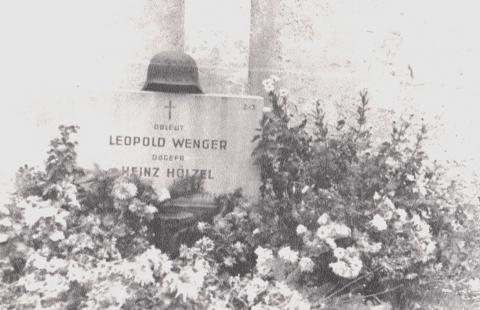
Poldi's grave at the small, well-kept cemetery at Hirschstetten, near Vienna.
Oberleutnant Leopold Wenger (19 November 1921 – 10 April 1945), recipient of the German Cross in Gold and the Knights Cross (Ritterkreutz); Squadron Commander of 4/Schlachtgeschwader 10 of Jagdgeschwader 2, Luftwaffe.
Category
Austria, Germany, Leopold Wenger, World War IIA close encounter between wartime rivals only revealed 74 years later
- 2237 reads
On August 28, 1942, kite-flying four-year-old John Lewthwaite of St. Just, Cornwall got a "cheery wave" from Lt. Poldi Wenger as he flew by at very low level on his way to Penzance.
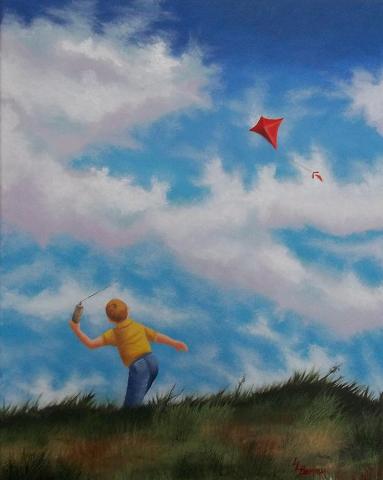
By Carolyn Yeager
copyright 2016 Carolyn Yeager
IT'S A STORY THAT ALWAYS BEGGED TO BE TOLD, but the sensitivities of the English concerning the bombing by Germany in 1940-42 made it one that John Lewthwaite was hesitant to tell. Even today.
So he wrote to me with his tale.
The encounter took place seventy-four years ago this month on August 28, as he remembered it. Lewthwaite was only 4 years old, but he's sure of what he experienced on that summer afternoon while out flying kites with a friend, in a field just north of Lands End.
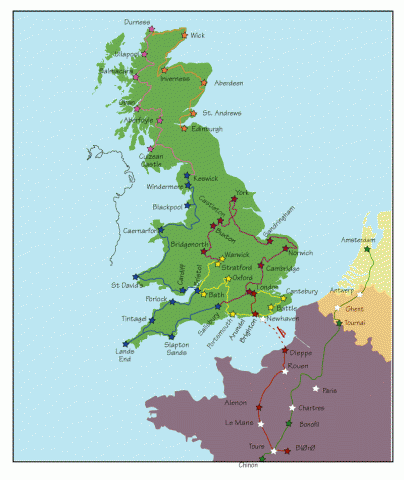 Map shows the relationship between the French and English coastlines, and the location of Lands End at England's southwesterly tip.
Map shows the relationship between the French and English coastlines, and the location of Lands End at England's southwesterly tip.
It was wartime and the members of squadron 10/SG2/JG2 Richthofen had been coming over to shoot up and drop bombs on industrial targets and ships in southwest England since July. Lieutenant Leopold Wenger, just 20 years old, had been transferred to Beaumont le Roger at the end of May 1942. On June 13, he wrote his family that he had been assigned to a new type of plane, the Focke Wulf 190 (A-2), a fighter-bomber. He made his first combat flight with it on June 29, reconnoitering the southern English seacoast between the Isle of Wight and Selsey Bill.
On July 9, his squadron attacked an English convoy of ships west of Portland, in Dorset, sinking a 2,500-ton ship for which he received his first war medal, the Iron Cross 2nd Class. On July 12, Poldi sank an 800-ton watch ship in the harbor of Brixham in the Bay of Torquay. After more successes, on July 21 his unit was transferred again. It wasn't until August 4th that he flew to Cornwall, in the vicinity of Falmouth, what he described as “the western corner of southern England.” A mission beset with difficulties, he commented that the long stretch of water to cross was already enough to wear one out, then he and his wingman ran into very bad weather, plus he lost his altitude control on the way back – managing to arrive intact however at his home port “shook up like never before.”
On August 12, he was awarded the Iron Cross 1st Class for destroying the gas works in Salisbury. Then on 19 August, in the early morning hours he received an emergency report to take off immediately with three planes for an armed reconnaissance mission in Dieppe, where the English were attempting a surprise landing. Leopold ended up flying three successful missions destroying enemy ships at Dieppe. After all that excitement, he didn't write home again until August 30th.
30 August 1942: I was over there again a few days ago, in the vicinity of Falmouth in Cornwall. You couldn’t see any ships, so they must have been keeping to their secondary targets. We blew up a few fine houses according to the motto “Never miss an opportunity”.
This corresponds to August 28th in Leopold's logbook, when he flew to Fowey (in the 'vicinity of Falmouth“), then passed by St Just on his way to Penzance at a very low level (5 to 10 meters) to stay underneath the radar. As Willy confirmed to me, the logbook showed:
28th August 1942 : Order of attack 2 jabos type FW 190
Leader Lt. Poldi Wenger
Departure Morlaix, France at 15h41 - Landing Morlaix, at 16h48 = 67 minutes-flight
weapon: SC500 bomb
Clear up the movement in the sea around Fowey
direct hits on living houses at the town of Penzance
Little John Lewthwaite and his friend happened to be playing in a field and … well, I'll let him tell the story just as he wrote it to me in May 2015.
Dear Carolyn,
On 28 August 1942, at age 4, I was with a friend flying kites in a field just North of Lands End, when two aircraft roared low towards us. We assumed they were RAF Spitfires, then saw their Luftwaffe markings....Terrified, we just stared at them, anticipating a hail of bullets, but instead received a cheery wave from the nearer pilot! Subsequent research has revealed they were FW 190's en route to attack St.Ives and Penzance, and that the leading aircraft (the one nearer me) was flown by young Leopold Wenger. I had hoped he might still be alive, but was saddened to read he was killed not long before the end of that wretched war, and therefore I could not thank him for the apparent humanity which served to influence my thinking thereafter... Is it possible for me to have some means of contacting his family in some way to redress this frustrating situation? Thanks.
____________________________________________________________________
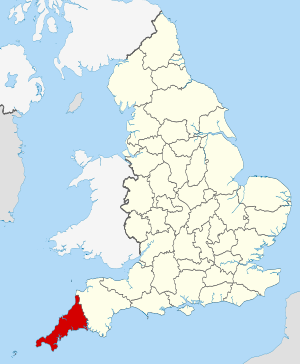
Cornwall is the size of Rhode Island
It's important to keep in mind that Cornwall is only slightly larger than Rhode Island in area – 1,376 sq. miles. The town of St Just is the most westerly town in mainland Britain and is situated only 8 miles (13 km) west of Penzance on the opposite coast.
____________________________________________________________________
I did get Willy and John in touch and they carried on a correspondence that still continues – as Willy has done with so many Englishmen and Canadians from "that wretched war'' who encountered his brother in one way or another.
Wenger assured me: ''This was not a fantasy by the little boy. When you know Poldi, that was just like him - his way to be in a good mood, to show a friendly face for the English boy to remember. I also think that the little boy must have reminded him of his younger brother Gerhard who was about the same age. Bibi loved his brother.''
Indeed, Gerhard Wenger was born in June 1939, his birth inspired by the Anchluss. The fourth child in the family, he was separated from Poldi by 17 years. Poldi was very close to his family, always thinking of them, making sure he brought chocolate to the two young ones when on home leave. Gerhard would have been 3 years old in August 1942, and Leopold would surely have been reminded of his little brother when seeing the two British kiddies with their kite.
The Wenger brothers in summer 1942:
Left: In July 1942, sixteen-year-old Willy received his C license for glider pilots, hoping to follow in his brother's footsteps as an airman; he is pictured seated in a glider. Right: In April 1942 (no pictures from July-August), Leopold was stationed in Le Havre, here on stand-by duty in his Me 109.
So the remembered encounter from so long ago is confirmed as fact … a true story that can warm the heart and instruct the mind today. A young German pilot under orders to fly as low as possible, staying under the radar, has a close encounter with a four-year old child of the 'enemy' who reminded him of his own dearly-loved little brother ... surprising that child with a wave and a smile that cemented in his impressionable mind a likeable image of the legendary 'fearsome Hun' across the Channel.
By sharing his story, John Lewthwaite has given us a valuable gift of REALITY to help counteract the false propaganda of the conflict between cousins, the so-called battle of Britain of 1941-42. New connections have been made, friendships forged, and who knows what yet might come because of it. A good and considerate man, John didn't send me the photograph I requested from him, maybe because, as he confided to me in a second email:
Bizarre world in which we now live....I cannot believe I have now been able to circulate the photo of the glamorous young 'Poldi' Wenger amongst my admiring daughters! But Heaven only knows what my Hun-hating grandparents would have thought of all this...
- Enjoy this video where you can see the Cornwall coastline from the air, as Poldi saw it. You will see Fowey, Penzance, Lands End, and St. Ives named, among many other places.
